Shows
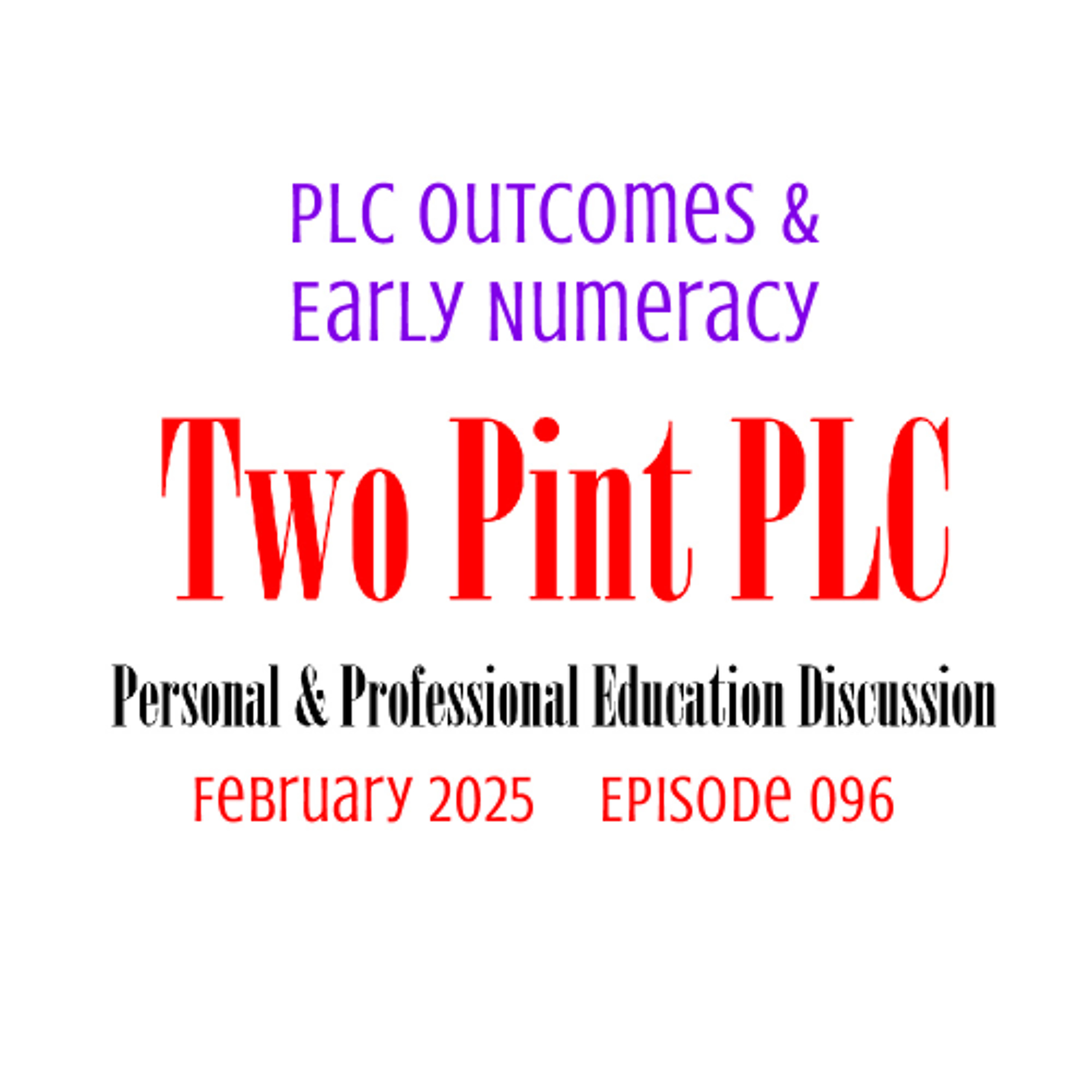 Two Pint PLC096 PLC Outcomes & Early NumeracyProfessional Learning Communities, or PLCs, provide a collegial network for educators to reflect on and improve their practice. We look at an evaluation of a pre-packaged PLC program that did not improve PLCs in schools, and wonder how we can support educators at the building level instead.
Later, we look at how very early math is learned by children. They experience the snowball effect, meaning it is far more important that learners have experiences with math regardless of the specific types of math they may experience. Math is good, m’kay.2025-02-1241 min
Two Pint PLC096 PLC Outcomes & Early NumeracyProfessional Learning Communities, or PLCs, provide a collegial network for educators to reflect on and improve their practice. We look at an evaluation of a pre-packaged PLC program that did not improve PLCs in schools, and wonder how we can support educators at the building level instead.
Later, we look at how very early math is learned by children. They experience the snowball effect, meaning it is far more important that learners have experiences with math regardless of the specific types of math they may experience. Math is good, m’kay.2025-02-1241 min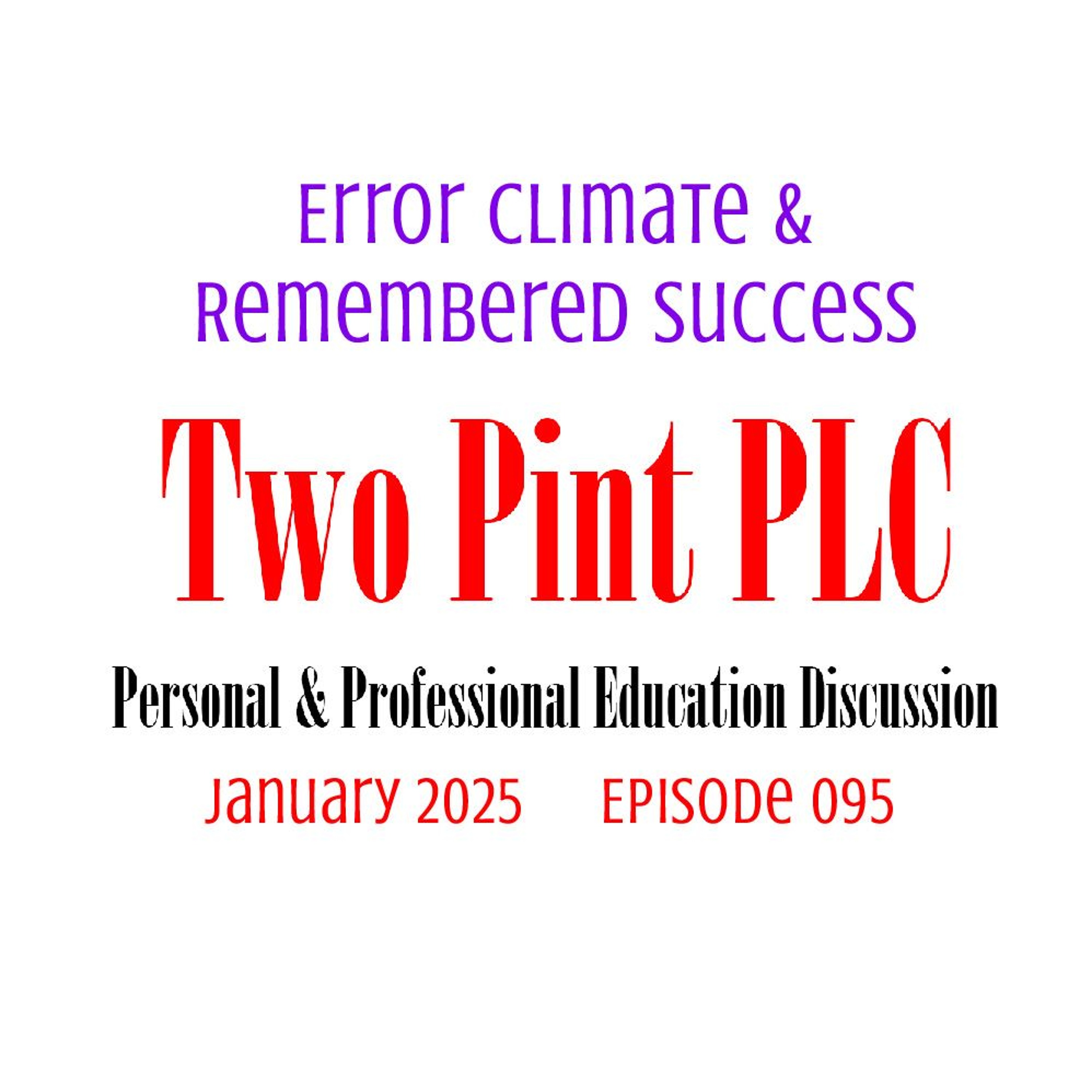 Two Pint PLC095 Error Climate & Remembered SuccessEdutopia did another review of the best research of 2024, and we are here to talk about it. First, discussion of student errors can lead to big gains in student learning. However, those gains only come in an interactive, collaborative class culture.
Later, the remembered success effect shows that ending challenging learning experiences with clear victories on more attainable problems improves student perceptions of their learning in ways that can sustain their motivation long-term.2025-01-1044 min
Two Pint PLC095 Error Climate & Remembered SuccessEdutopia did another review of the best research of 2024, and we are here to talk about it. First, discussion of student errors can lead to big gains in student learning. However, those gains only come in an interactive, collaborative class culture.
Later, the remembered success effect shows that ending challenging learning experiences with clear victories on more attainable problems improves student perceptions of their learning in ways that can sustain their motivation long-term.2025-01-1044 min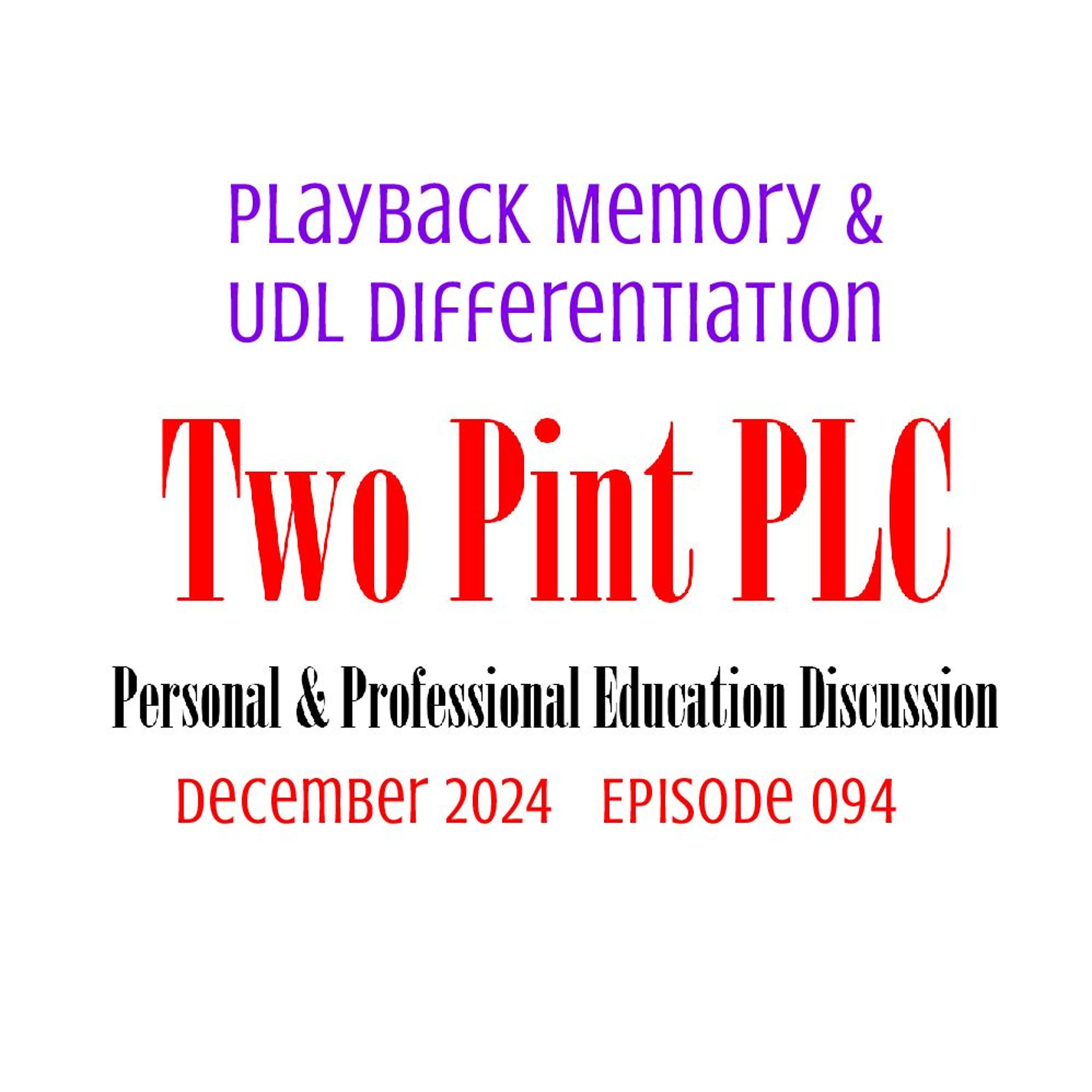 Two Pint PLC094 Playback Memory & UDL DifferentiationTeachers may give lectures or create videos to provide information to students, and the speed of information delivery affects the cognitive load of students. We read a study of video playback speed and support materials that shows speeding up the videos may not be particularly harmful to their usefulness, and that other supportive elements are more important to consider.
Later, we read a study of UDL practices and differentiation that shows formative assessment, adaptive grouping, and growth mindset all have distinct impacts on instructional differentiation.2024-12-1144 min
Two Pint PLC094 Playback Memory & UDL DifferentiationTeachers may give lectures or create videos to provide information to students, and the speed of information delivery affects the cognitive load of students. We read a study of video playback speed and support materials that shows speeding up the videos may not be particularly harmful to their usefulness, and that other supportive elements are more important to consider.
Later, we read a study of UDL practices and differentiation that shows formative assessment, adaptive grouping, and growth mindset all have distinct impacts on instructional differentiation.2024-12-1144 min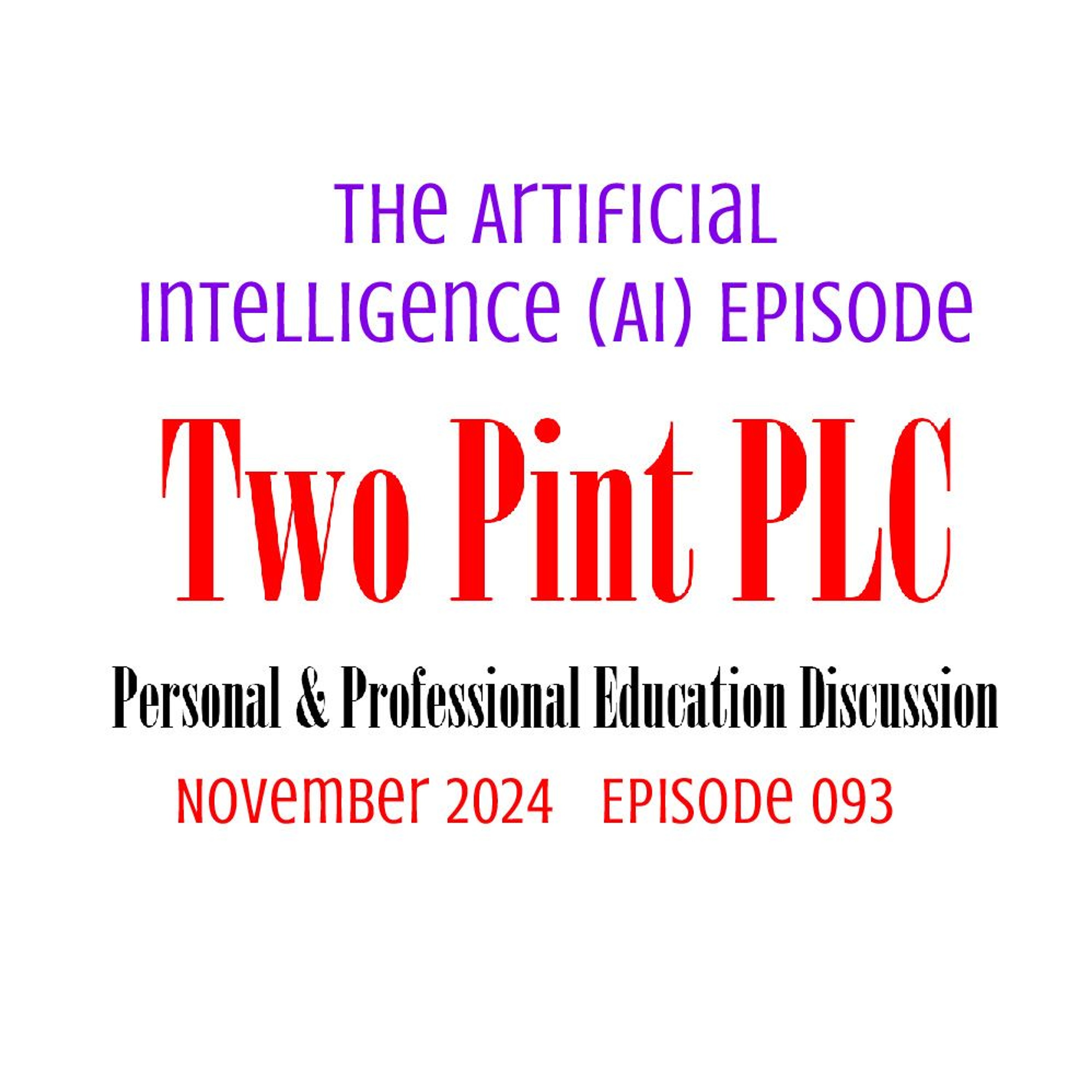 Two Pint PLC093 The Artificial Intelligence (AI) EpisodeThis month is our official “AI episode.” We are joined by Ben Riley, who wrote a guide for considering the use of AI for education. Our discussion considers the tasks for which AI might be useful, and the multiple concerns we have for its use as a substitute for thinking.
Later, we read a study that shows AI can help people produce incrementally more creative task solutions. However, we are unconvinced that is ever the purpose of the educational process.2024-11-1144 min
Two Pint PLC093 The Artificial Intelligence (AI) EpisodeThis month is our official “AI episode.” We are joined by Ben Riley, who wrote a guide for considering the use of AI for education. Our discussion considers the tasks for which AI might be useful, and the multiple concerns we have for its use as a substitute for thinking.
Later, we read a study that shows AI can help people produce incrementally more creative task solutions. However, we are unconvinced that is ever the purpose of the educational process.2024-11-1144 min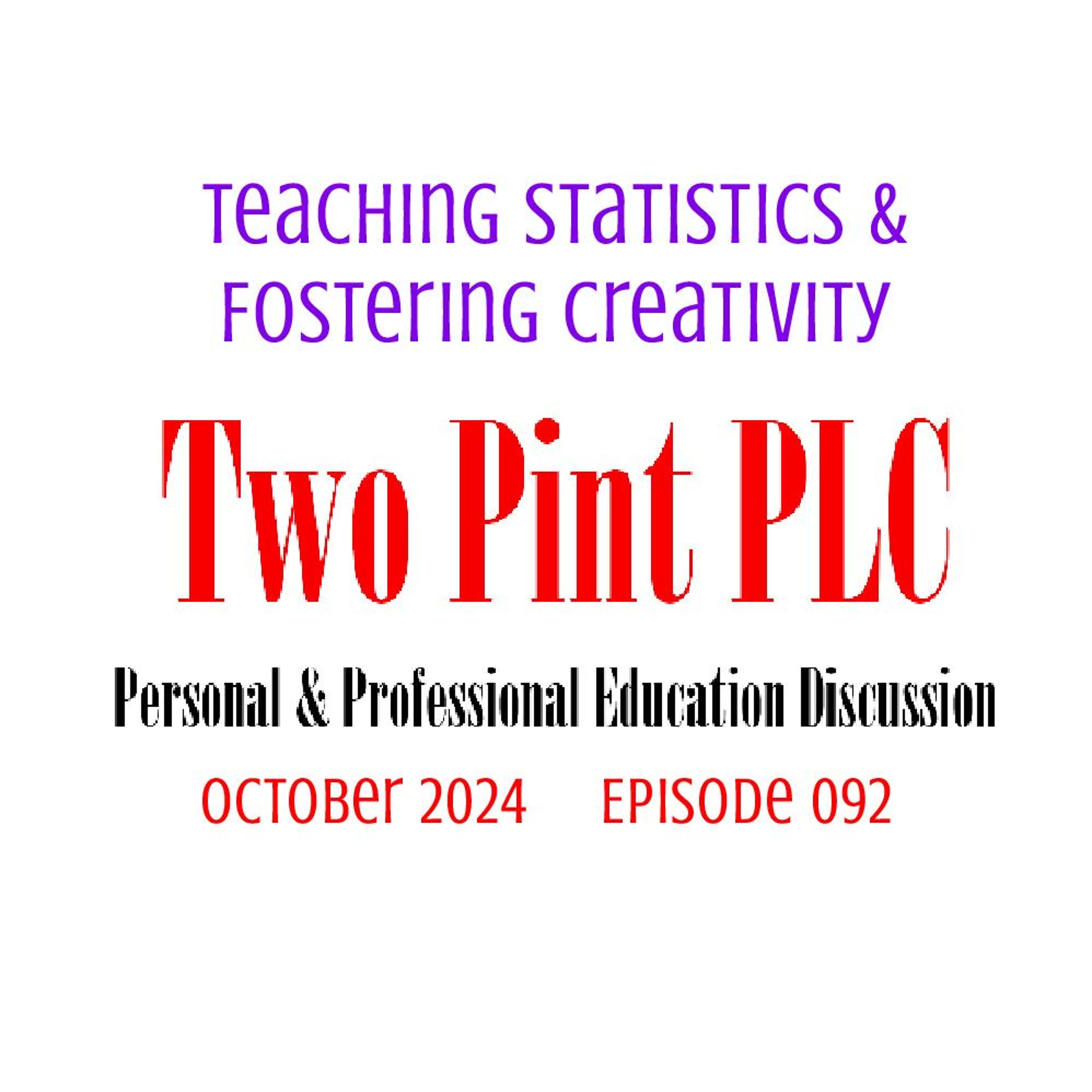 Two Pint PLC092 Teaching Statistics & Fostering CreativityEffective statistics instruction - like many other disciplines - should empower students to ask questions and interrogate data to answer questions. We look at research evaluating the impact of an inquiry-focused statistics curriculum that showed very large gains for student learning by emphasizing statistical practice rather than mathematical routines.
Later, we read a review of creativity research that identified key areas where students need practice with creativity (just like any other skill). We must make space for risk-taking and student exploration.2024-10-1243 min
Two Pint PLC092 Teaching Statistics & Fostering CreativityEffective statistics instruction - like many other disciplines - should empower students to ask questions and interrogate data to answer questions. We look at research evaluating the impact of an inquiry-focused statistics curriculum that showed very large gains for student learning by emphasizing statistical practice rather than mathematical routines.
Later, we read a review of creativity research that identified key areas where students need practice with creativity (just like any other skill). We must make space for risk-taking and student exploration.2024-10-1243 min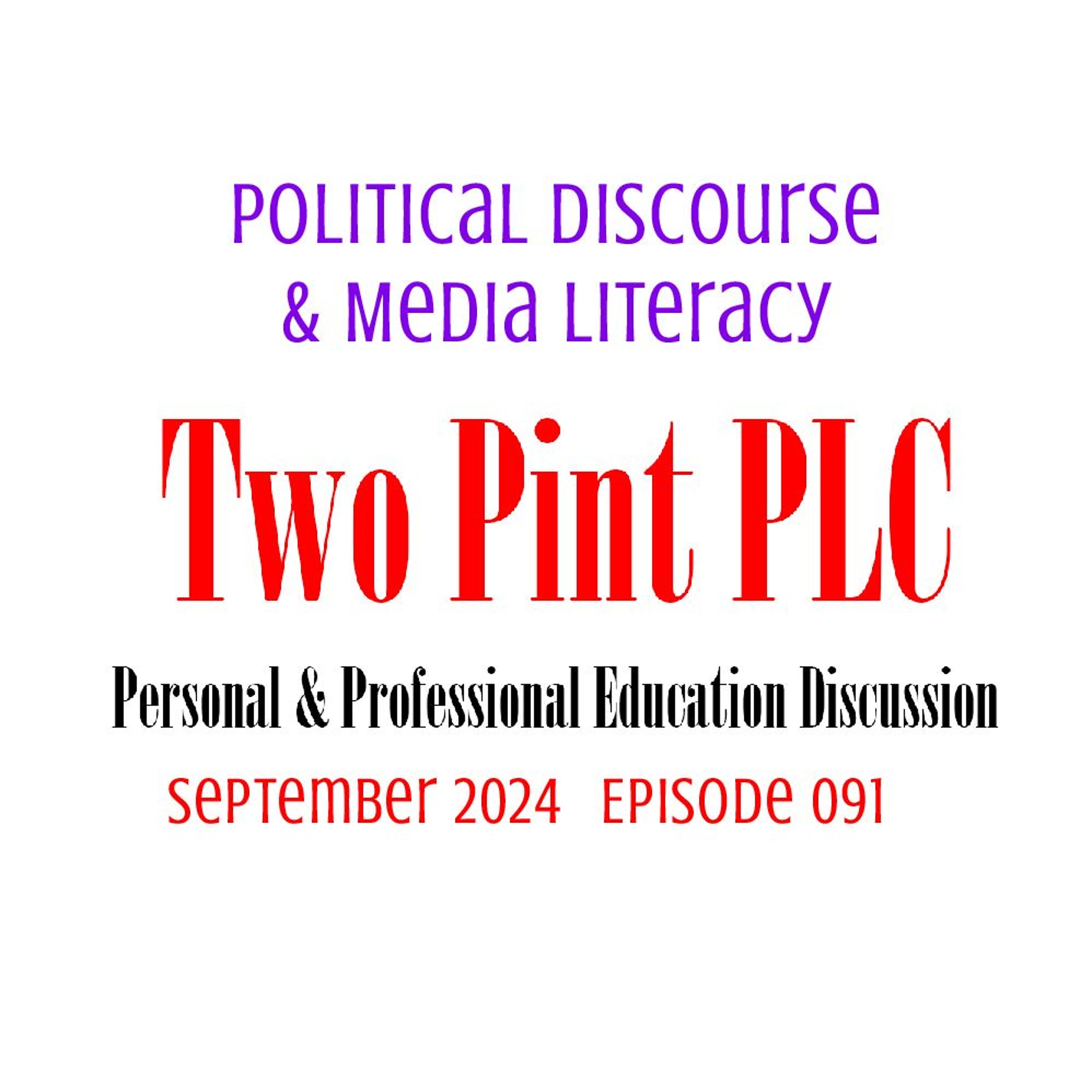 Two Pint PLC091 Political Discourse & Media LiteracyWe start Season 8 in a tempestuous election cycle in the United States. We are joined by guest host Chris Carter to discuss an approach to civic education in today’s political landscape, with a focus on grounded discussions based on essential anchor questions.
Later, we look at the absence of state standards for media literacy in the US. Their research provides a call and roadmap for teachers to prioritize explicit instruction in media literacy for students.2024-09-1243 min
Two Pint PLC091 Political Discourse & Media LiteracyWe start Season 8 in a tempestuous election cycle in the United States. We are joined by guest host Chris Carter to discuss an approach to civic education in today’s political landscape, with a focus on grounded discussions based on essential anchor questions.
Later, we look at the absence of state standards for media literacy in the US. Their research provides a call and roadmap for teachers to prioritize explicit instruction in media literacy for students.2024-09-1243 min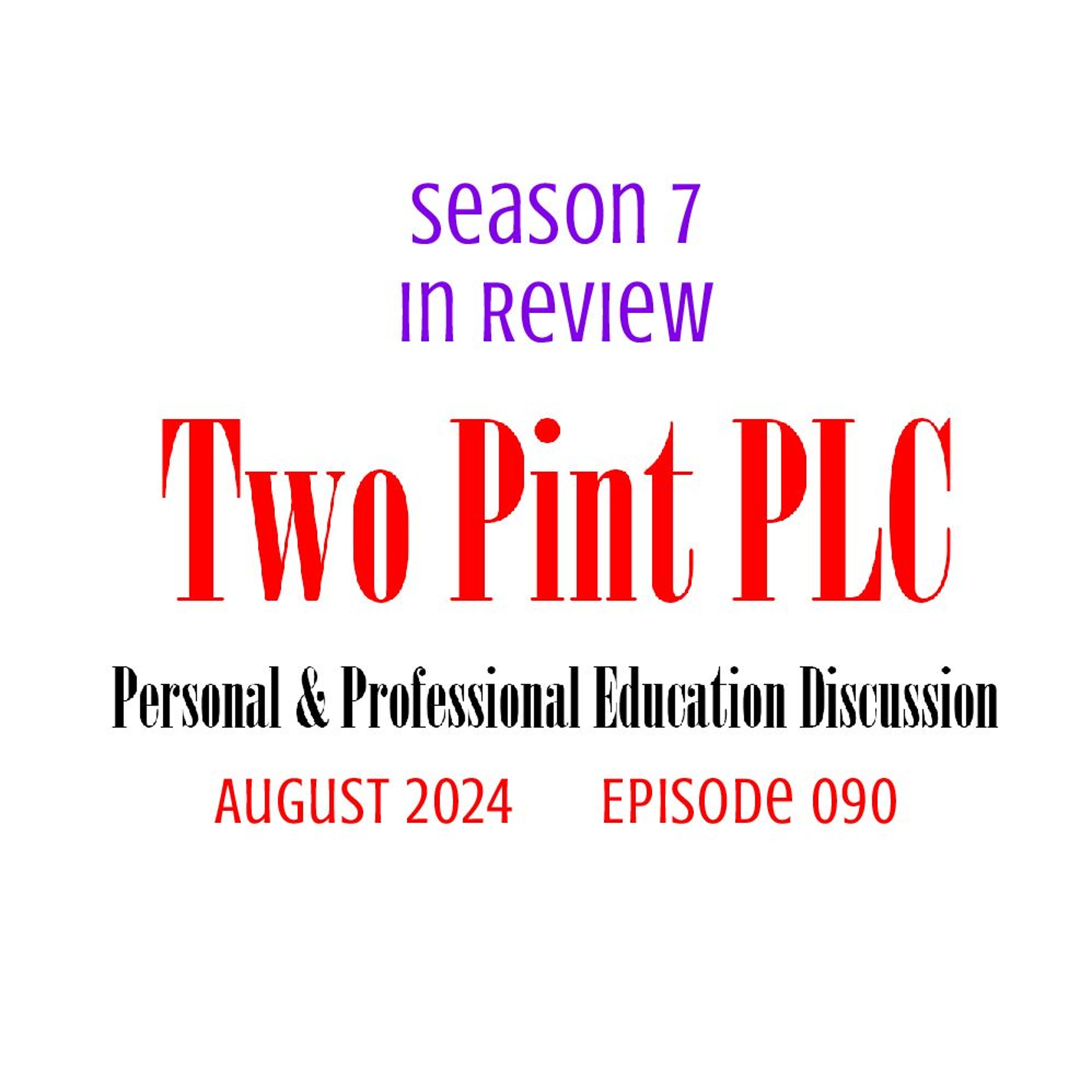 Two Pint PLC090 Season 7 FinaleWe review the most noteworthy papers of the past year, developments in our practice, and the top beers of AY23-24.2024-08-1244 min
Two Pint PLC090 Season 7 FinaleWe review the most noteworthy papers of the past year, developments in our practice, and the top beers of AY23-24.2024-08-1244 min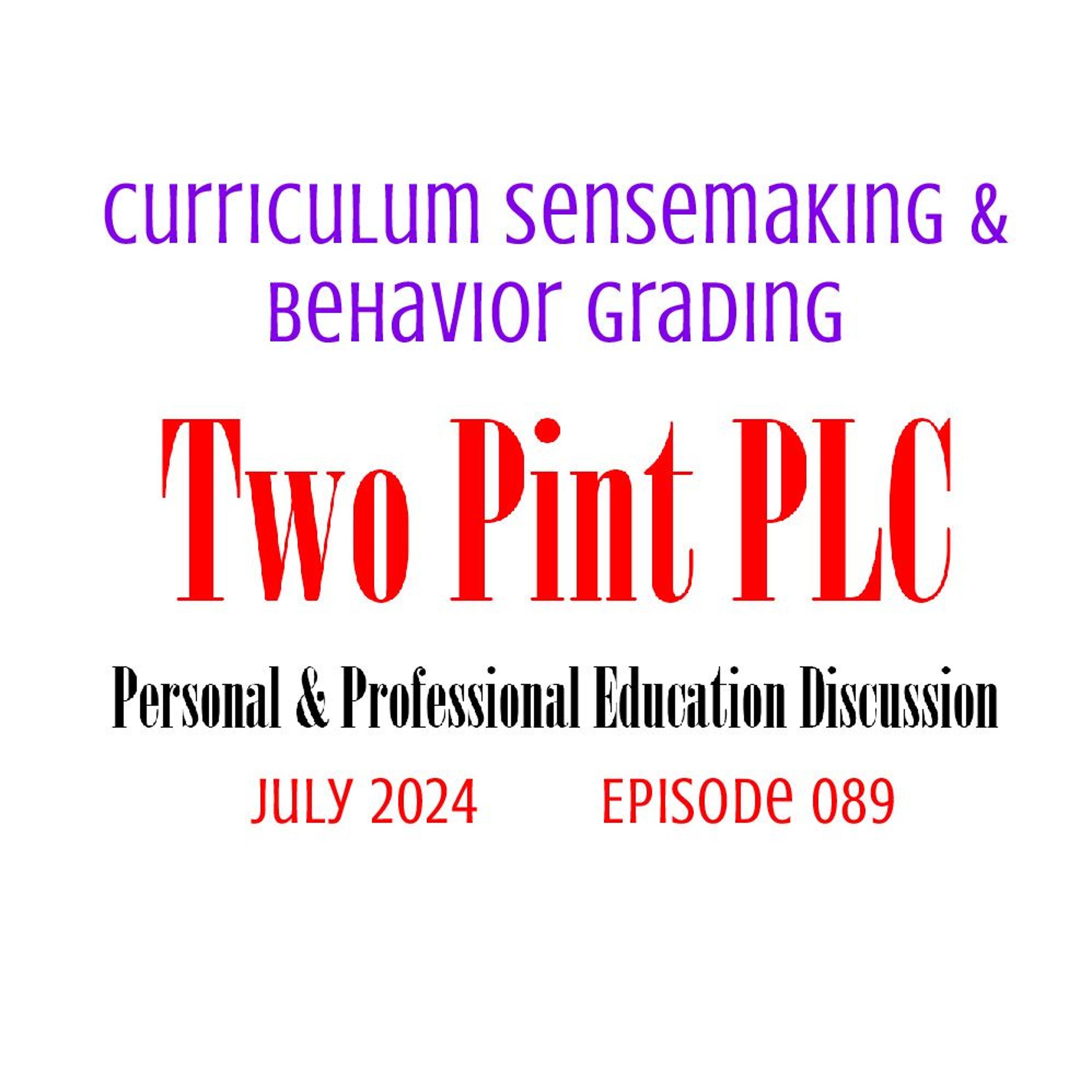 Two Pint PLC089 Curriculum Sensemaking & Behavior GradingMany curriculum decisions are made at the district-level, but each classroom teacher must figure out how to implement those decisions for themselves. We read a study showing how “philosophical fidelity” is far more important than “mechanical fidelity” to the success of district efforts to improve instruction.
Later, we read a study of required behavior grades in Germany that shows those grades have zero positive impact on… well, anything.2024-07-1244 min
Two Pint PLC089 Curriculum Sensemaking & Behavior GradingMany curriculum decisions are made at the district-level, but each classroom teacher must figure out how to implement those decisions for themselves. We read a study showing how “philosophical fidelity” is far more important than “mechanical fidelity” to the success of district efforts to improve instruction.
Later, we read a study of required behavior grades in Germany that shows those grades have zero positive impact on… well, anything.2024-07-1244 min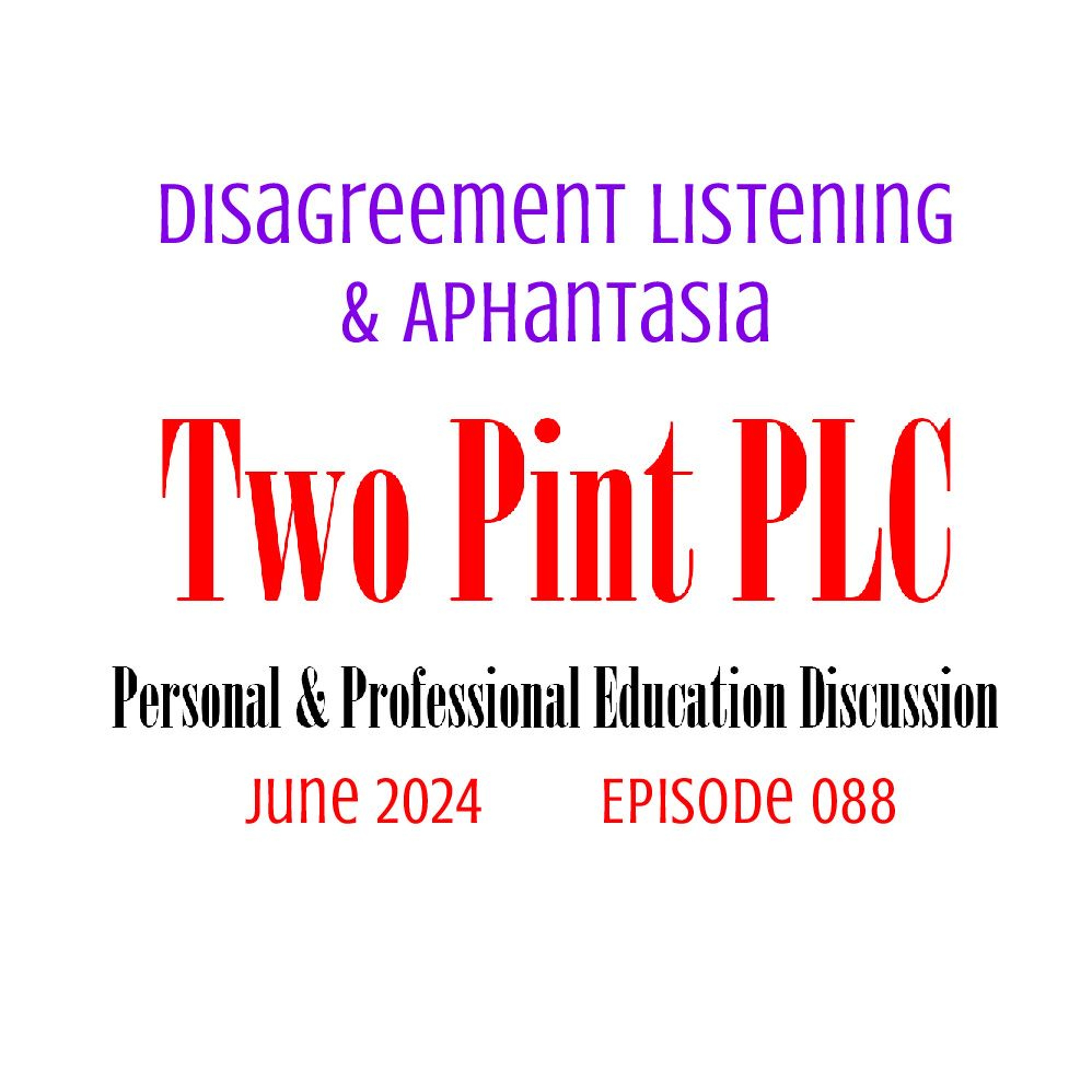 Two Pint PLC088 Disagreement Listening & AphantasiaIt can feel like people in disagreement just aren’t listening to each other. We read a study showing disagreement significantly reduces our perceptions of being listened to, regardless of how well our audience does listen. We discuss takeaways for exhibiting active listening behaviors that reduce the effect.
Later, we read a review of research on aphantasia (or the condition of not seeing concrete images in your mind’s eye). We reflect on how this dimension of neurodiversity is connected to differences in a variety of human outcomes.2024-06-1243 min
Two Pint PLC088 Disagreement Listening & AphantasiaIt can feel like people in disagreement just aren’t listening to each other. We read a study showing disagreement significantly reduces our perceptions of being listened to, regardless of how well our audience does listen. We discuss takeaways for exhibiting active listening behaviors that reduce the effect.
Later, we read a review of research on aphantasia (or the condition of not seeing concrete images in your mind’s eye). We reflect on how this dimension of neurodiversity is connected to differences in a variety of human outcomes.2024-06-1243 min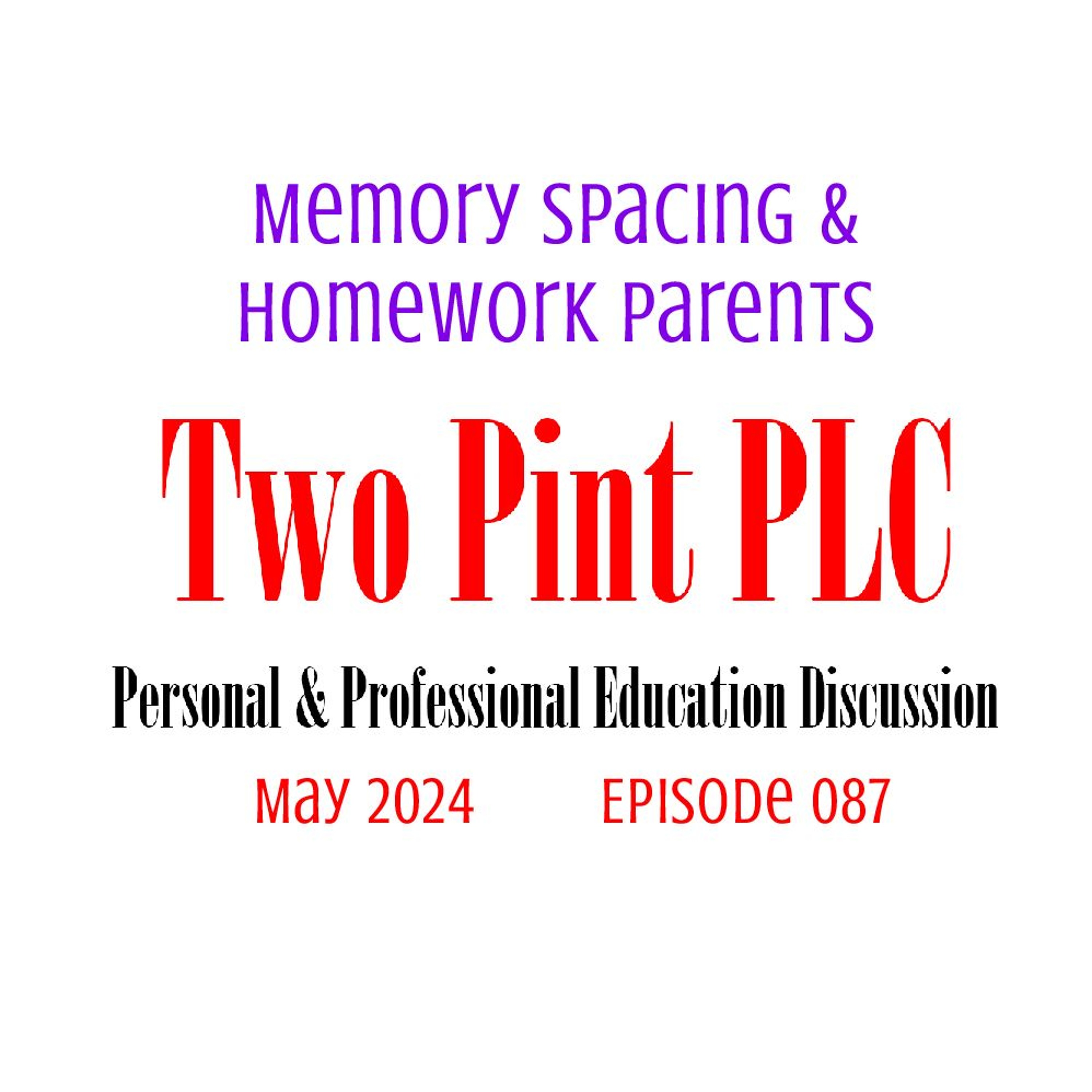 Two Pint PLC087 Memory Spacing & Homework ParentsPractice is more effective when we space it out, rather than doing lots of repetitions all at once. We read research that looked at the effect of varied practice compared to identical practice over time. Their results show subtle variation helps students focus and remember the important elements upon recall.
Later, we read an account of the negative impacts of graded math homework disproportionately affecting mothers in Canada. We see how homework takes away from family time and undermines the development of math identities.2024-05-1344 min
Two Pint PLC087 Memory Spacing & Homework ParentsPractice is more effective when we space it out, rather than doing lots of repetitions all at once. We read research that looked at the effect of varied practice compared to identical practice over time. Their results show subtle variation helps students focus and remember the important elements upon recall.
Later, we read an account of the negative impacts of graded math homework disproportionately affecting mothers in Canada. We see how homework takes away from family time and undermines the development of math identities.2024-05-1344 min Real Photo Show with Michael Chovan-DaltonLinda Troeller | Sex. Death. TranscendenceLinda Troeller joins me to talk about her book, SEX. DEATH. TRANSCENDENCE., published by TBW. Linda has a storied life in photography from her early self-portraiture, to her book, The Erotic Lives of Women, and now to Sex. Death. Transcendence., Linda has been exploring the female gaze since the early 1970’s. We talk about her ideas on self-portraiture, healing waters, and her amazing time at the Chelsea Hotel, all of which have led to their own publications.
https://sites.google.com/view/lindatroeller/sex-death-transcendence?authuser=0
https://tbwbooks.com/collections/single-titles/products/sex-death-transcendence
This podcast is sp...2024-04-1345 min
Real Photo Show with Michael Chovan-DaltonLinda Troeller | Sex. Death. TranscendenceLinda Troeller joins me to talk about her book, SEX. DEATH. TRANSCENDENCE., published by TBW. Linda has a storied life in photography from her early self-portraiture, to her book, The Erotic Lives of Women, and now to Sex. Death. Transcendence., Linda has been exploring the female gaze since the early 1970’s. We talk about her ideas on self-portraiture, healing waters, and her amazing time at the Chelsea Hotel, all of which have led to their own publications.
https://sites.google.com/view/lindatroeller/sex-death-transcendence?authuser=0
https://tbwbooks.com/collections/single-titles/products/sex-death-transcendence
This podcast is sp...2024-04-1345 min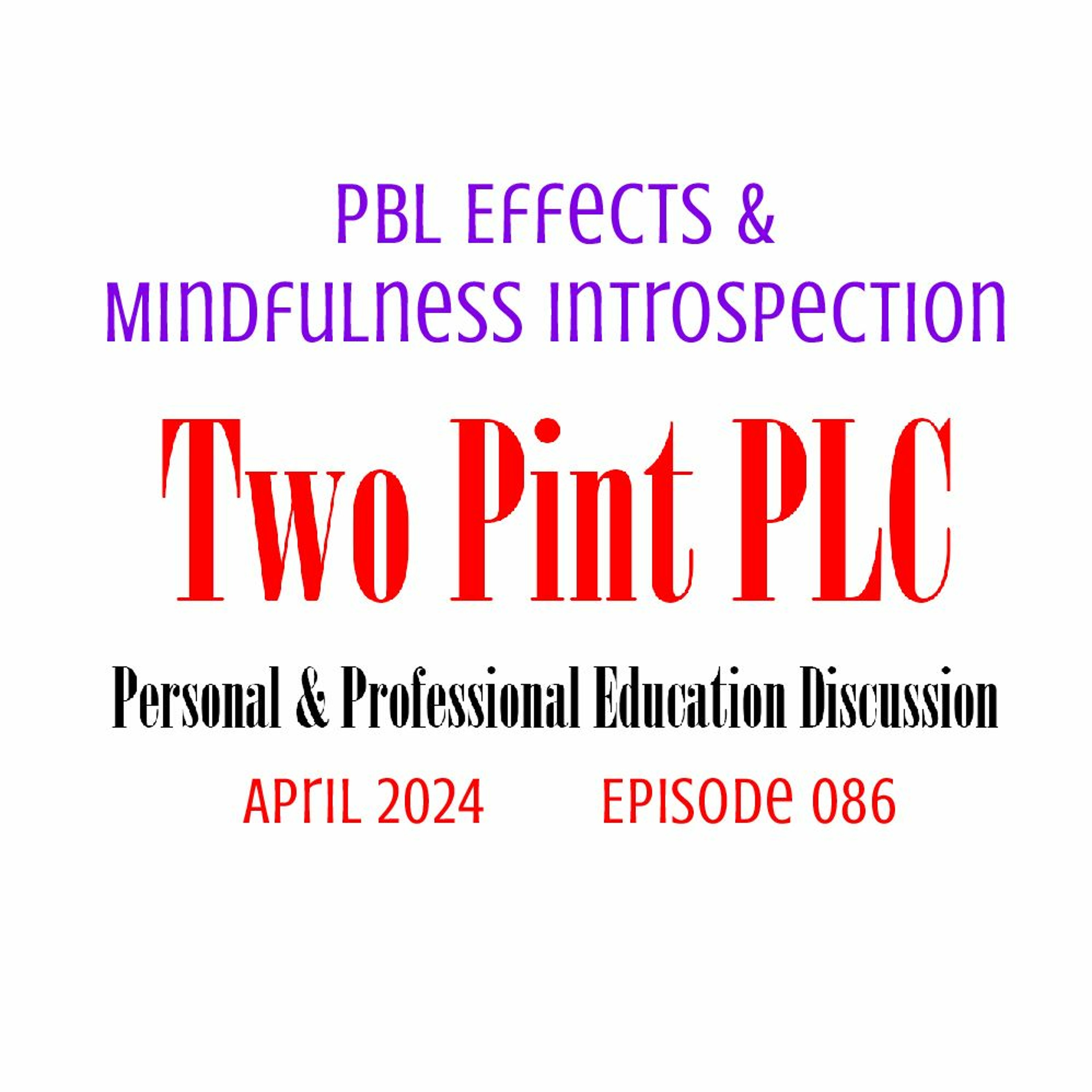 Two Pint PLC086 PBL Effects & Mindfulness IntrospectionProject-Based Learning is a thoroughly researched method of instruction with many benefits. We read a meta-analysis looking specifically at how PBL affects student motivation, and saw data illustrating just how important an excellent project prompt is to project success.
Later, we read a study showing neurofeedback devices can increase the accuracy of students’ understanding of their own emotional state. We consider the responsibility of mindfulness programs to help students respond in healthy ways to their increased emotional engagement.2024-04-1244 min
Two Pint PLC086 PBL Effects & Mindfulness IntrospectionProject-Based Learning is a thoroughly researched method of instruction with many benefits. We read a meta-analysis looking specifically at how PBL affects student motivation, and saw data illustrating just how important an excellent project prompt is to project success.
Later, we read a study showing neurofeedback devices can increase the accuracy of students’ understanding of their own emotional state. We consider the responsibility of mindfulness programs to help students respond in healthy ways to their increased emotional engagement.2024-04-1244 min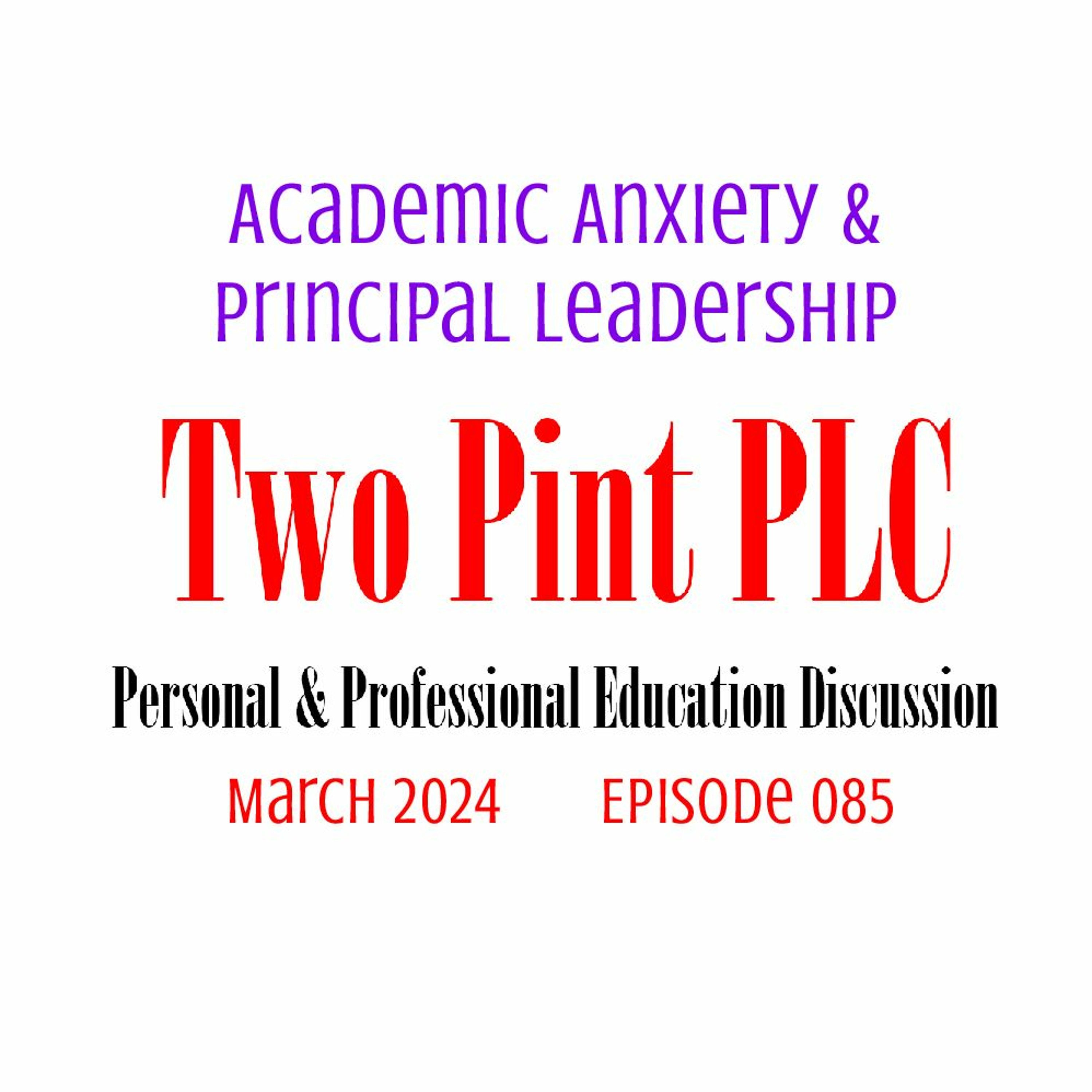 Two Pint PLC085 Academic Anxiety & Principal LeadershipMore schools are looking to address the socio-emotional needs of students, and a key area for that work is helping students manage anxiety in the classroom. We look at a study showing how some accommodations may be reinforcing their anxiety, and how teachers can help students develop healthier strategies for managing it.
Later, we read a study of principal characteristics that support teacher self-efficacy and a shared sense of collective efficacy. Communication and modeling are essential, while coercion is deeply ineffective.2024-03-1244 min
Two Pint PLC085 Academic Anxiety & Principal LeadershipMore schools are looking to address the socio-emotional needs of students, and a key area for that work is helping students manage anxiety in the classroom. We look at a study showing how some accommodations may be reinforcing their anxiety, and how teachers can help students develop healthier strategies for managing it.
Later, we read a study of principal characteristics that support teacher self-efficacy and a shared sense of collective efficacy. Communication and modeling are essential, while coercion is deeply ineffective.2024-03-1244 min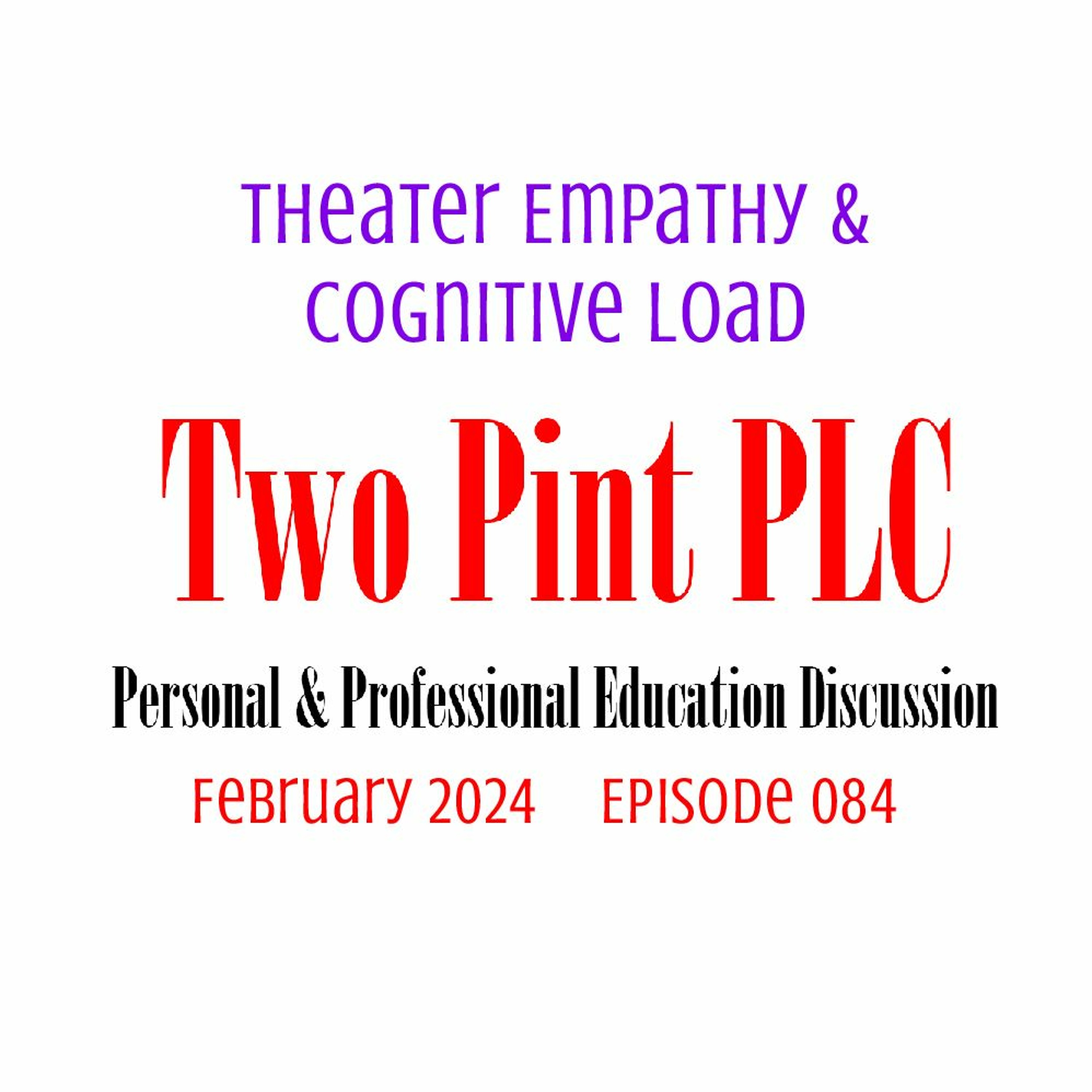 Two Pint PLC084 Theater Empathy & Cognitive LoadField trips to the theater can be memorable opportunities for students to engage in community-based performing arts. Dr. Goldstein joins us to talk about how even a single theater experience can have an impact on socio-emotional outcomes like empathy and perspective-taking for students.
Later, we discuss the intersection of cognitive load theory and motivation. Their method of diagramming teacher practice across both led us to lively reflection on our own tendencies in the classroom.2024-02-1244 min
Two Pint PLC084 Theater Empathy & Cognitive LoadField trips to the theater can be memorable opportunities for students to engage in community-based performing arts. Dr. Goldstein joins us to talk about how even a single theater experience can have an impact on socio-emotional outcomes like empathy and perspective-taking for students.
Later, we discuss the intersection of cognitive load theory and motivation. Their method of diagramming teacher practice across both led us to lively reflection on our own tendencies in the classroom.2024-02-1244 min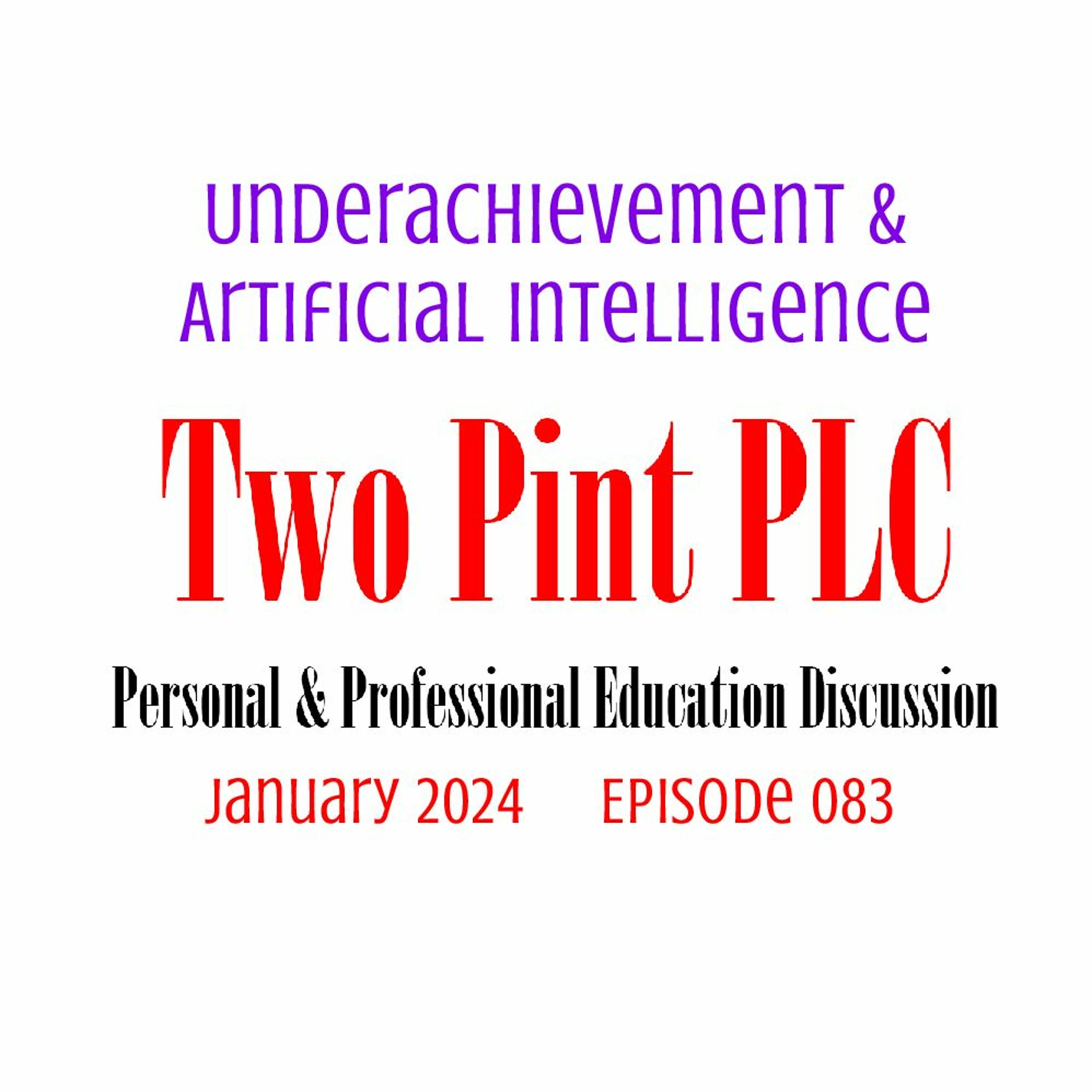 Two Pint PLC083 Underachievement & Artificial IntelligenceStudent underachievement occurs when students’ day-to-day class performance is lower than their test scores predict it should be. We read a review of research that shows the causes of underachievement can vary widely. Still, it gives teachers some useful starting points when trying to help a student reach their full potential.
Later, we discuss some recent coverage of AI and student cheating. We reflect on how student use of artificial intelligence - whether or not it is teacher-approved - may sit in relation to our classroom values.2024-01-1244 min
Two Pint PLC083 Underachievement & Artificial IntelligenceStudent underachievement occurs when students’ day-to-day class performance is lower than their test scores predict it should be. We read a review of research that shows the causes of underachievement can vary widely. Still, it gives teachers some useful starting points when trying to help a student reach their full potential.
Later, we discuss some recent coverage of AI and student cheating. We reflect on how student use of artificial intelligence - whether or not it is teacher-approved - may sit in relation to our classroom values.2024-01-1244 min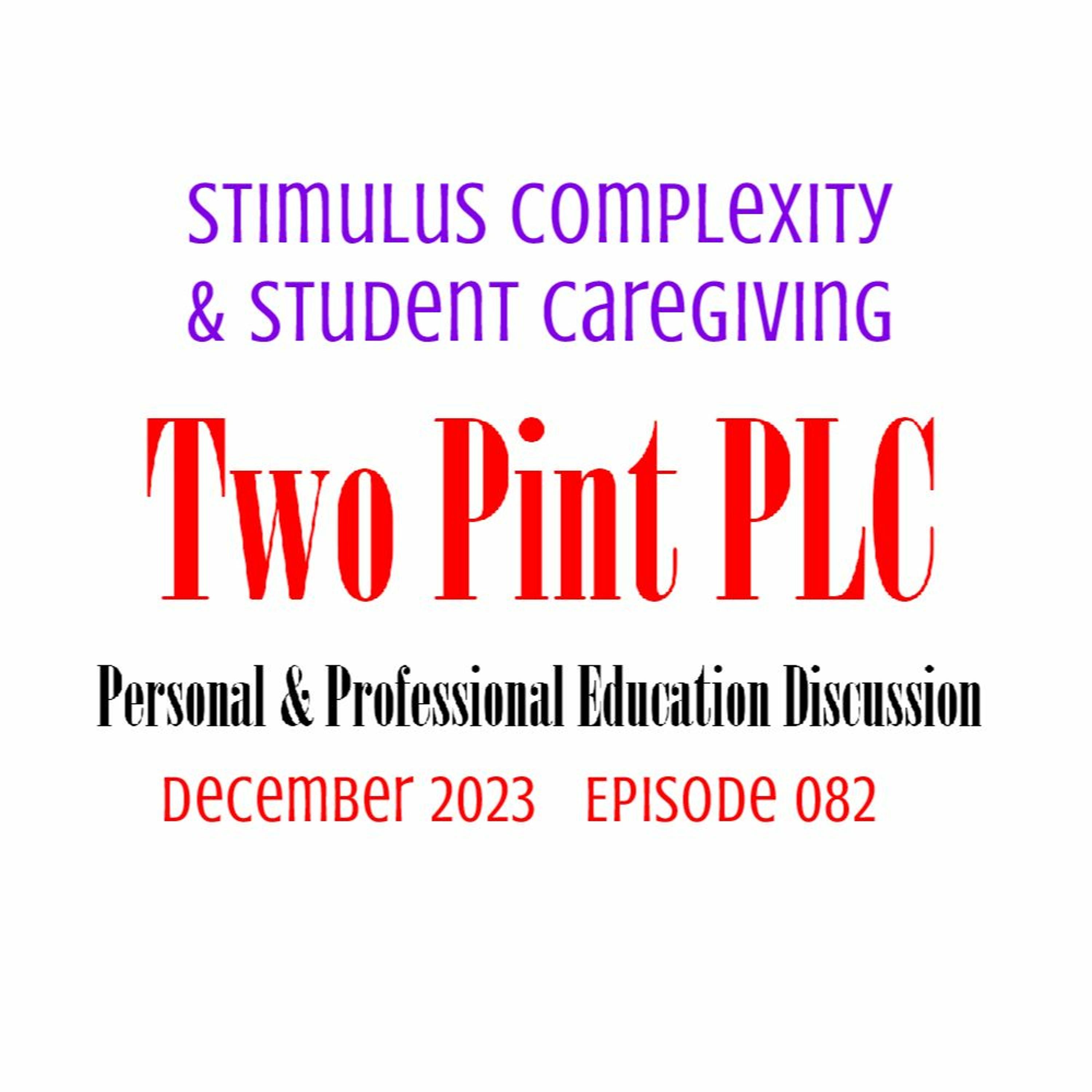 Two Pint PLC082 Stimulus Complexity & Student CaregivingThis month is a collaborative episode with the hosts of the School Spirits podcast. We read a study of pigeon working memory that indicates complex visuals activate substantially more of our brains than simple ones, which can help with memory and processing of information.
Later, we discuss new data that shows how common caregiving responsibilities are among school students. The findings prompt us to think about how schools can be places that support and embrace students as caregivers.2023-12-1244 min
Two Pint PLC082 Stimulus Complexity & Student CaregivingThis month is a collaborative episode with the hosts of the School Spirits podcast. We read a study of pigeon working memory that indicates complex visuals activate substantially more of our brains than simple ones, which can help with memory and processing of information.
Later, we discuss new data that shows how common caregiving responsibilities are among school students. The findings prompt us to think about how schools can be places that support and embrace students as caregivers.2023-12-1244 min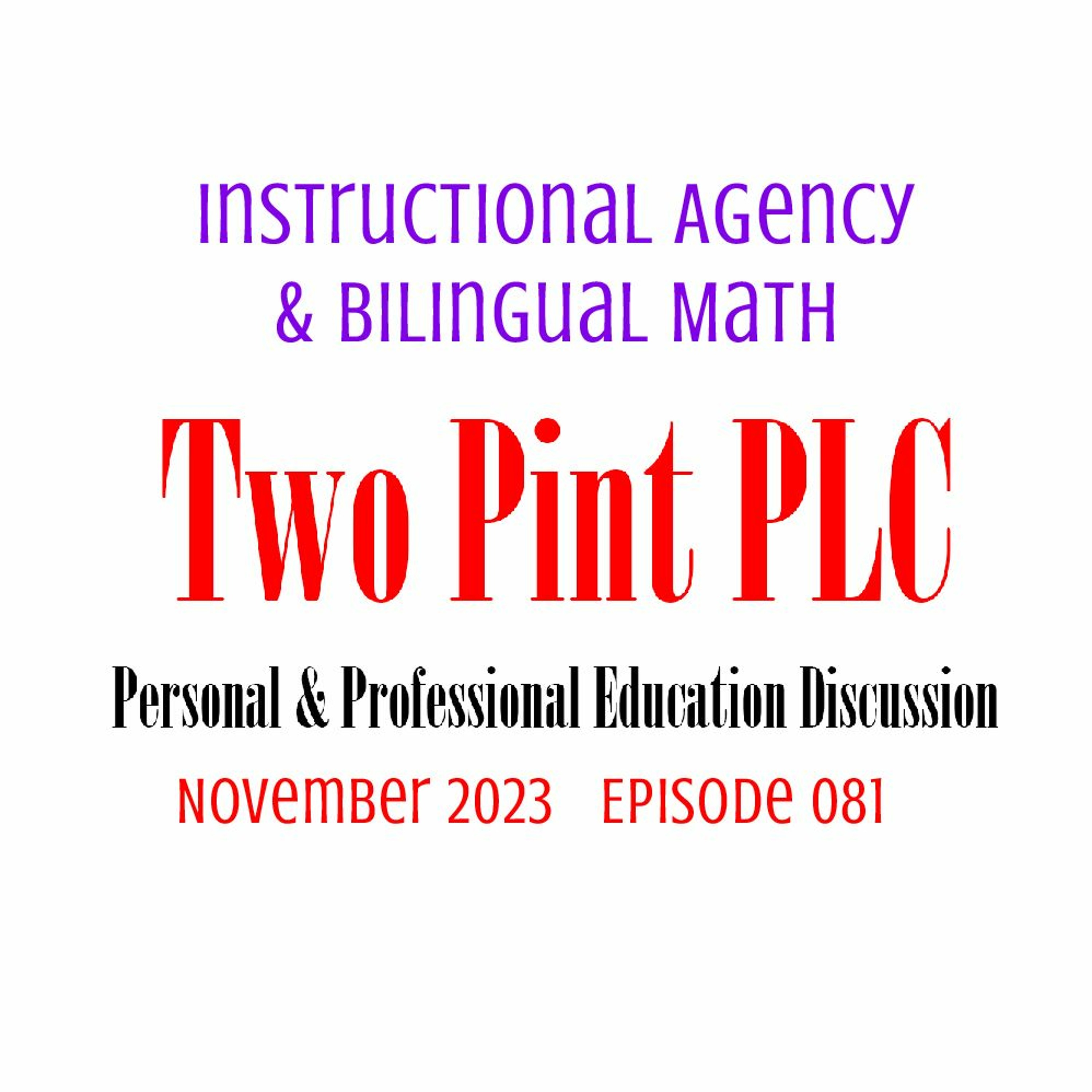 Two Pint PLC081 Instructional Agency & Bilingual MathResearchers measured the impact of student-directed project weeks on their sense of motivation over the course of a school year. We reflect on the importance of consistently prioritizing learner agency throughout the year, rather than sequestering it to a single week of freedom.
Later, we read a review of research on learning math in bilingual settings. Their paper emphasizes the influence of the teaching language on learner processing, and the importance of someone’s multilingual schema as they process mathematical concepts.2023-11-1242 min
Two Pint PLC081 Instructional Agency & Bilingual MathResearchers measured the impact of student-directed project weeks on their sense of motivation over the course of a school year. We reflect on the importance of consistently prioritizing learner agency throughout the year, rather than sequestering it to a single week of freedom.
Later, we read a review of research on learning math in bilingual settings. Their paper emphasizes the influence of the teaching language on learner processing, and the importance of someone’s multilingual schema as they process mathematical concepts.2023-11-1242 min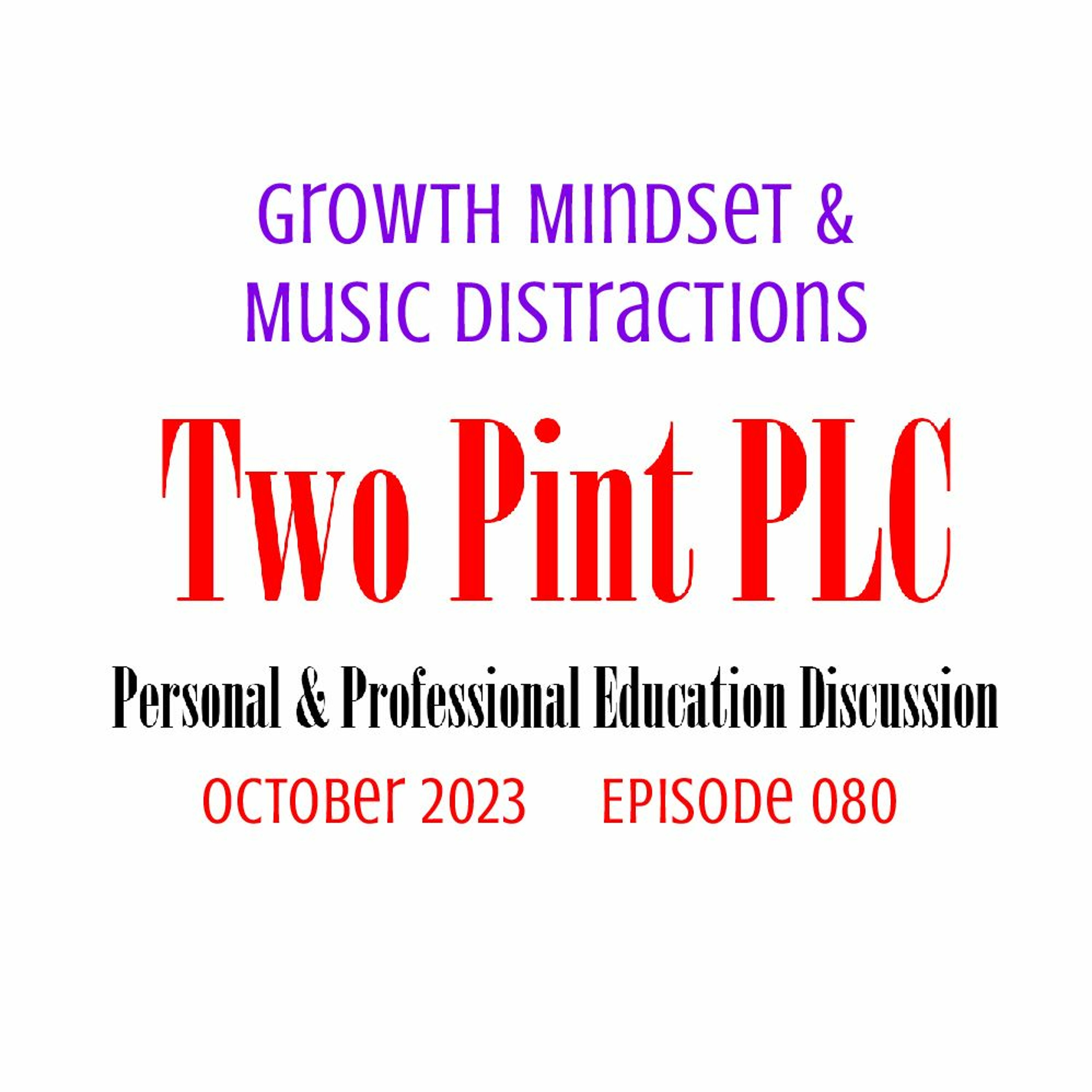 Two Pint PLC080 Growth Mindset & Music DistractionsThis month we talk with Dr. Elisabeth Tipton about the research support for growth mindset interventions, and the flaws in last month’s meta-analysis. Together we consider how growth mindset should be part of a more comprehensive approach to helping students improve.
Later, we read how listening to music reduces our ability to use our working memory for academic tasks. Their laboratory study shows music has a cost, but we wonder whether the cost of background classroom distractions might be higher.2023-10-1244 min
Two Pint PLC080 Growth Mindset & Music DistractionsThis month we talk with Dr. Elisabeth Tipton about the research support for growth mindset interventions, and the flaws in last month’s meta-analysis. Together we consider how growth mindset should be part of a more comprehensive approach to helping students improve.
Later, we read how listening to music reduces our ability to use our working memory for academic tasks. Their laboratory study shows music has a cost, but we wonder whether the cost of background classroom distractions might be higher.2023-10-1244 min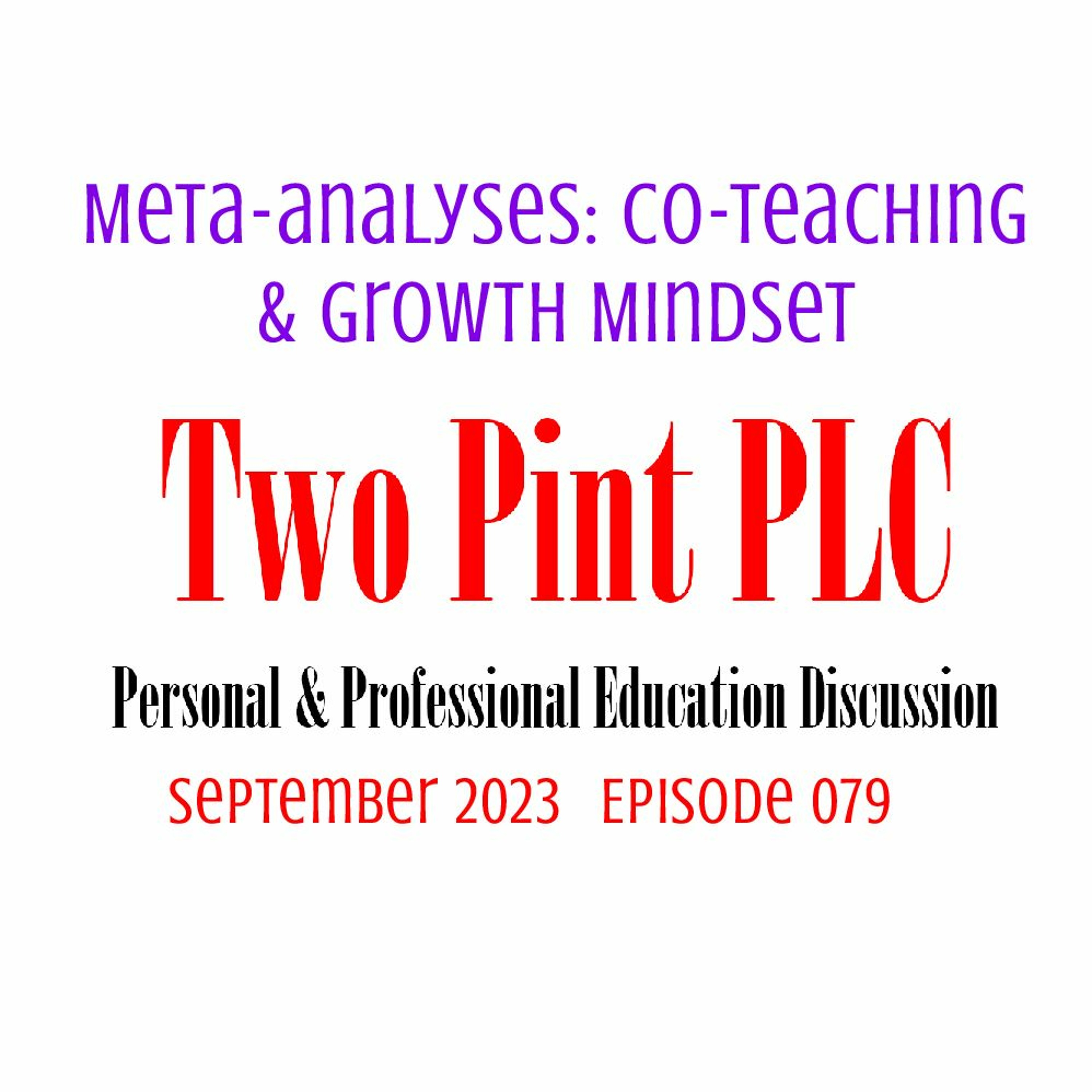 Two Pint PLC079 Meta-Analyses: Co-Teaching & Growth MindsetA meta-analysis of co-teaching showed that it benefits students to have more than one adult in the classroom, regardless of the specifics. We reflect on what it could mean to successfully build a co-teaching classroom based on trust among the teachers and students.
Later, we read another meta-analysis that is sharply critical of the current research on growth mindset. We consider what their critiques mean for our past support of growth mindset research and what elements of growth mindset we want to keep (for now).2023-09-1244 min
Two Pint PLC079 Meta-Analyses: Co-Teaching & Growth MindsetA meta-analysis of co-teaching showed that it benefits students to have more than one adult in the classroom, regardless of the specifics. We reflect on what it could mean to successfully build a co-teaching classroom based on trust among the teachers and students.
Later, we read another meta-analysis that is sharply critical of the current research on growth mindset. We consider what their critiques mean for our past support of growth mindset research and what elements of growth mindset we want to keep (for now).2023-09-1244 min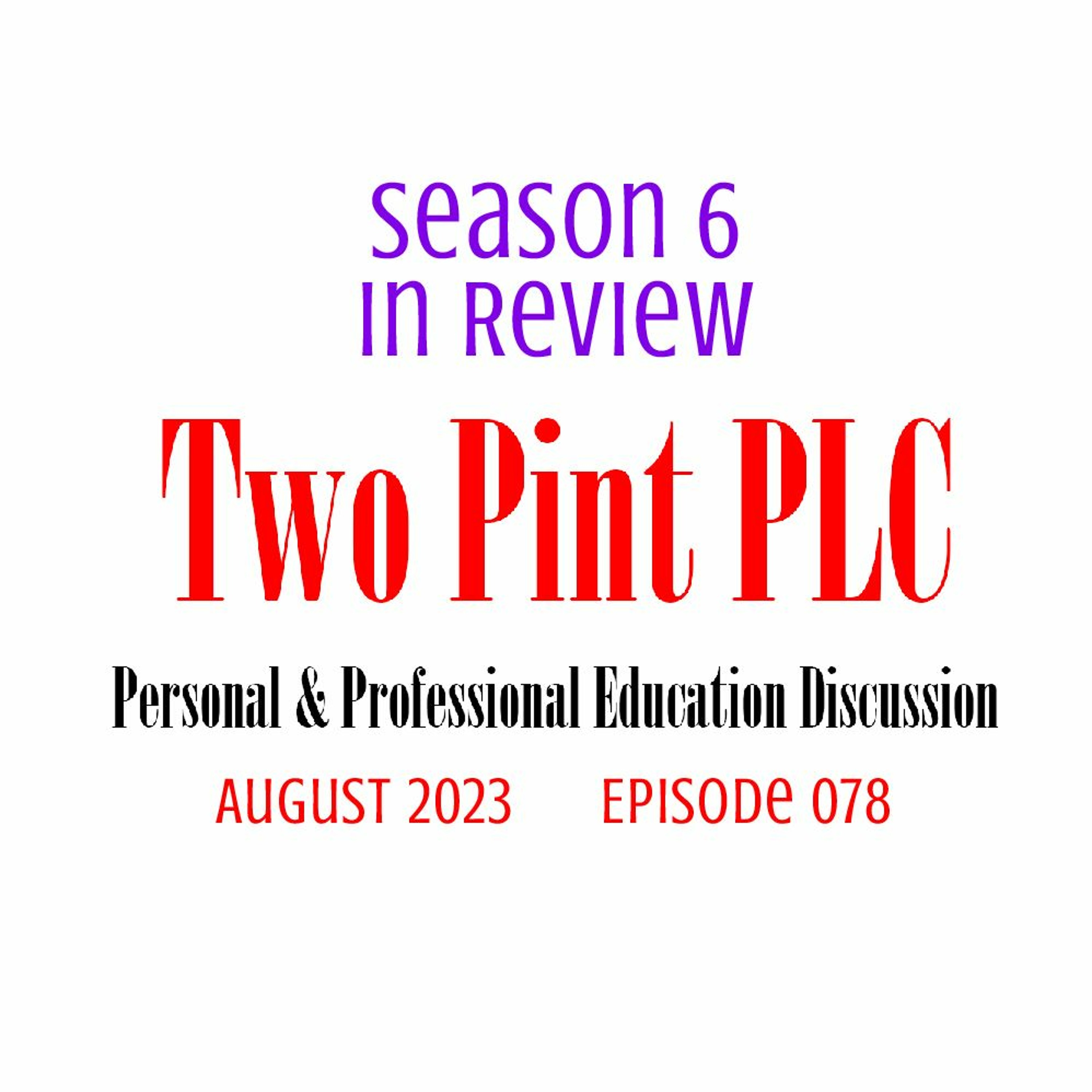 Two Pint PLC078 Season 6 In ReviewThis month we reflect on our year of reading scholarship and growing as humans. First we’ll return to the segments we felt had the greatest impact on our practice and our thinking from the research we read.
Later, we’ll reflect specifically on our praxis. We share some of the changes we’re making in our classroom and in our study that is moving us toward our goals as education practitioners.
Finally, we’ll share a bit about how our lives are changing outside of school… and mark the 2023 recipients of the Mug of Honor.2023-08-1344 min
Two Pint PLC078 Season 6 In ReviewThis month we reflect on our year of reading scholarship and growing as humans. First we’ll return to the segments we felt had the greatest impact on our practice and our thinking from the research we read.
Later, we’ll reflect specifically on our praxis. We share some of the changes we’re making in our classroom and in our study that is moving us toward our goals as education practitioners.
Finally, we’ll share a bit about how our lives are changing outside of school… and mark the 2023 recipients of the Mug of Honor.2023-08-1344 min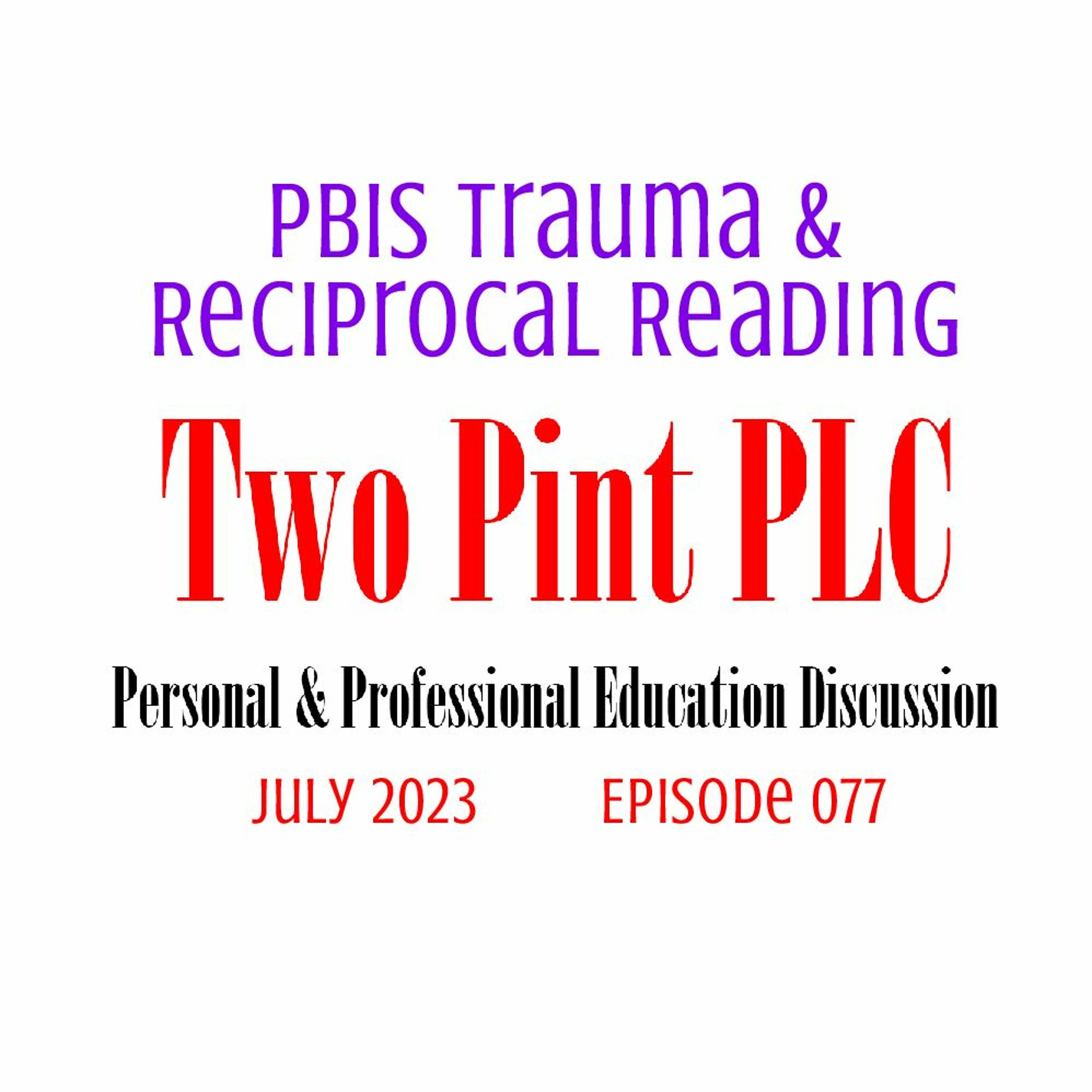 Two Pint PLC077 PBIS Trauma & Reciprocal ReadingPositive Behavioral Interventions and Supports (PBIS) is a framework being adopted by many schools, and some claim it can integrate trauma-informed pedagogies. However, we read scholarship that shows how PBIS is fundamentally incompatible with trauma-informed education.
Later, we discuss a large-scale reciprocal reading study with significant impacts for some students is still not effective for every student. How should this shape our approach to implementing research-informed reading instruction?2023-07-1242 min
Two Pint PLC077 PBIS Trauma & Reciprocal ReadingPositive Behavioral Interventions and Supports (PBIS) is a framework being adopted by many schools, and some claim it can integrate trauma-informed pedagogies. However, we read scholarship that shows how PBIS is fundamentally incompatible with trauma-informed education.
Later, we discuss a large-scale reciprocal reading study with significant impacts for some students is still not effective for every student. How should this shape our approach to implementing research-informed reading instruction?2023-07-1242 min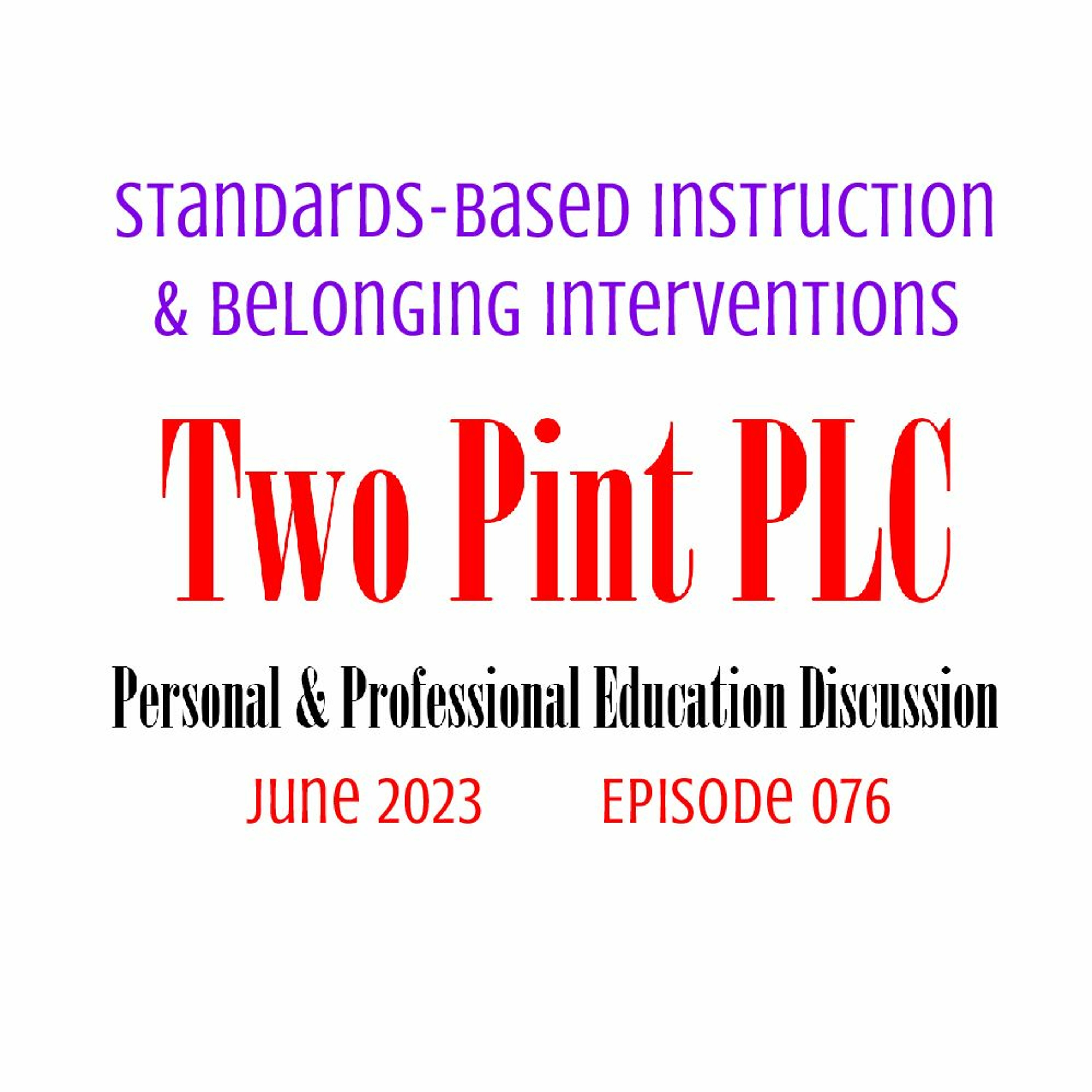 Two Pint PLC076 Standards - Based Instruction & Belonging InterventionsMany schools have adopted new instructional standards in recent years, but some schools have struggled in helping teachers align their instruction. We talk with author Morgan Polikoff about his team’s work studying why flexible specificity is so important for success.
Later, we look at a very large study of a belonging intervention that helps students persist in their first year of college. We consider what that could mean for teachers in both K-12 and higher education settings.2023-06-1244 min
Two Pint PLC076 Standards - Based Instruction & Belonging InterventionsMany schools have adopted new instructional standards in recent years, but some schools have struggled in helping teachers align their instruction. We talk with author Morgan Polikoff about his team’s work studying why flexible specificity is so important for success.
Later, we look at a very large study of a belonging intervention that helps students persist in their first year of college. We consider what that could mean for teachers in both K-12 and higher education settings.2023-06-1244 min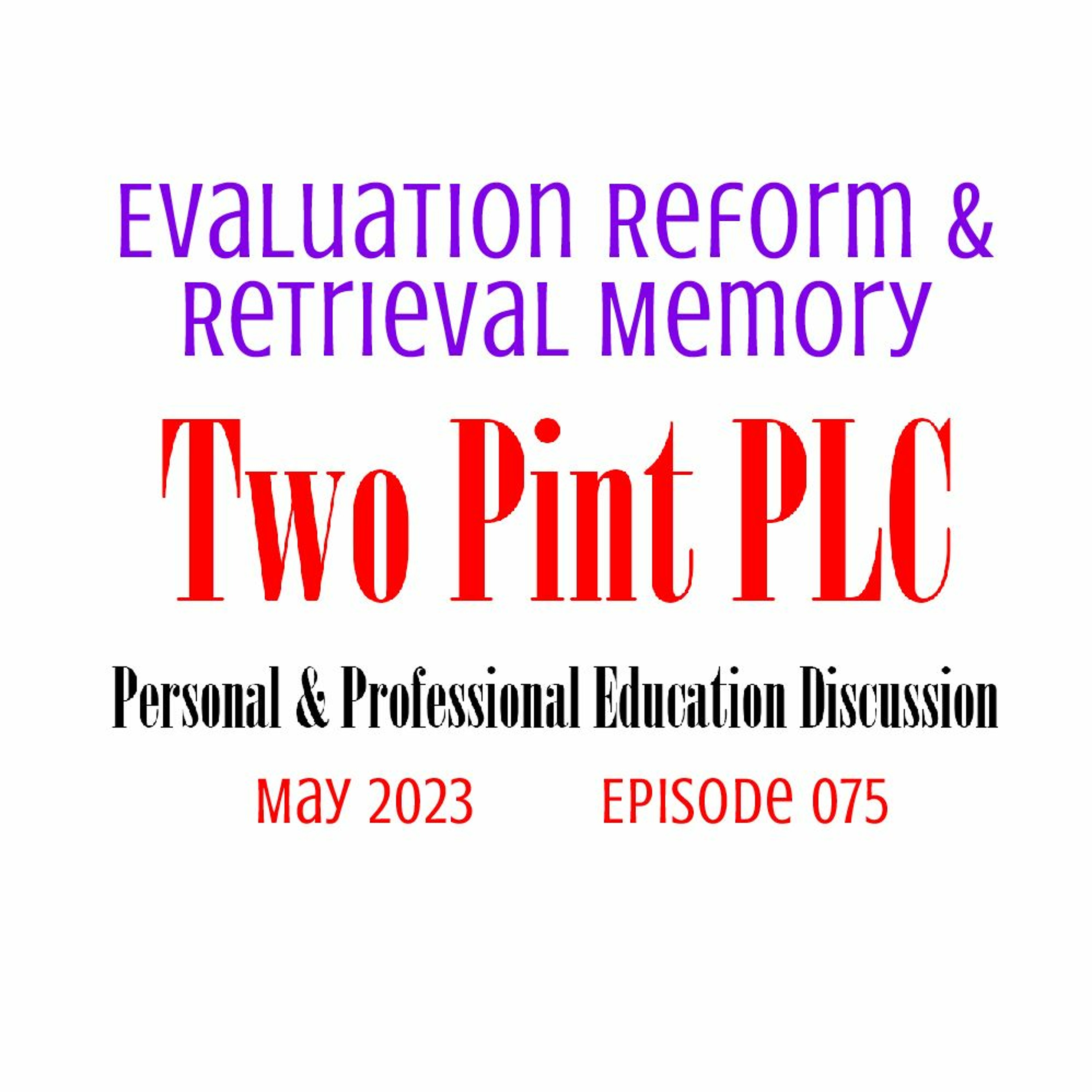 Two Pint PLC075 Evaluation Reform & Retrieval MemoryFeedback is an essential component of professional growth, and teacher evaluation has changed in most places across the US over the last 15 years. What do we actually know about how those changes impacted school performance?
Later, we read a study that showed retrieval practice is only beneficial when we have working memory resources to devote to the process. We reflect on what this means for students who may be stressed or otherwise not able to allocate those resources.2023-05-1242 min
Two Pint PLC075 Evaluation Reform & Retrieval MemoryFeedback is an essential component of professional growth, and teacher evaluation has changed in most places across the US over the last 15 years. What do we actually know about how those changes impacted school performance?
Later, we read a study that showed retrieval practice is only beneficial when we have working memory resources to devote to the process. We reflect on what this means for students who may be stressed or otherwise not able to allocate those resources.2023-05-1242 min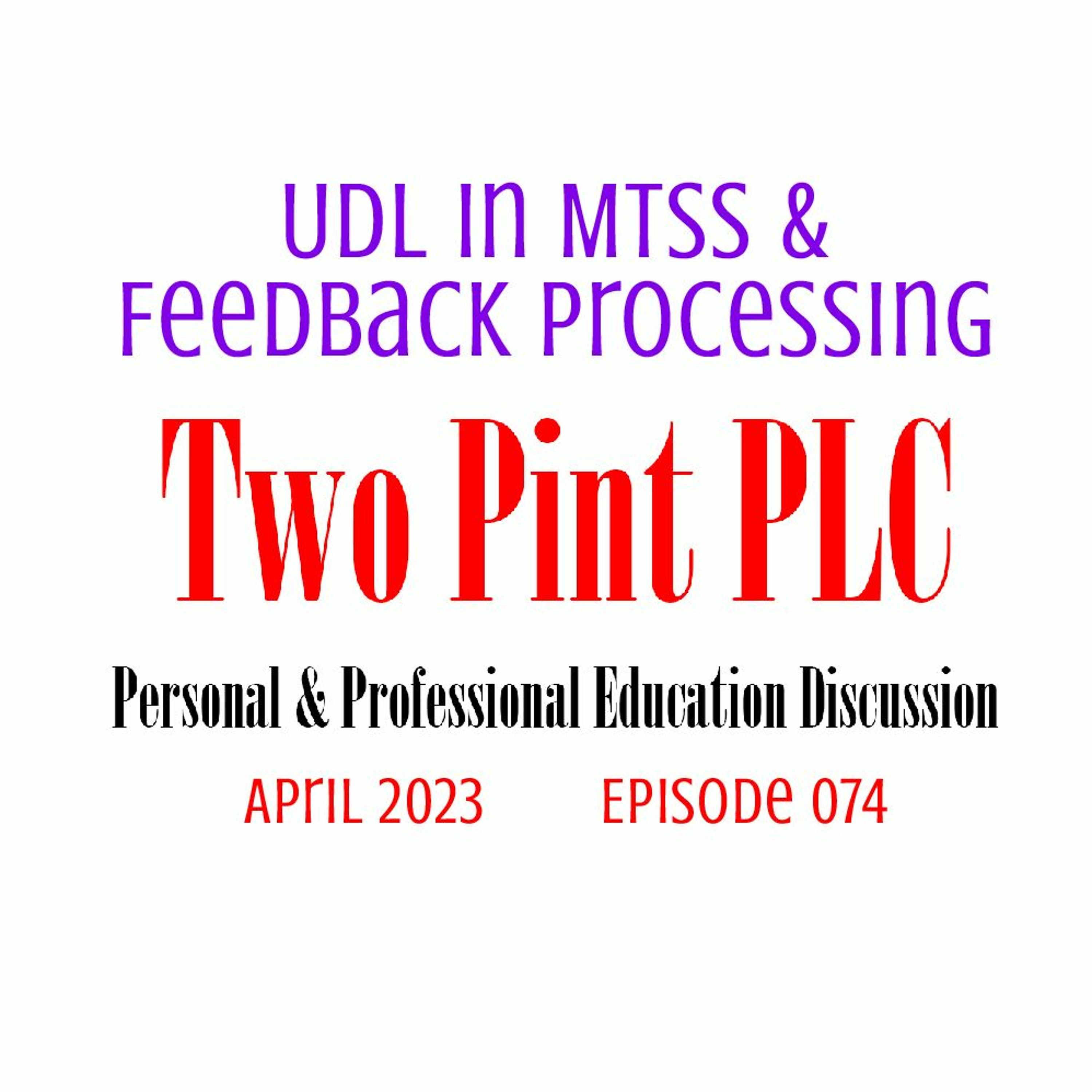 Two Pint PLC074 UDL In MTSS & Feedback ProcessingUniversal Design for Learning represents a framework that can impact every part of the school. We read research looking at how UDL can contribute to more effective MTSS Tier 1 interventions… if teachers have an accurate understanding of UDL.
Later, we look at an eye-tracking study to examine how students process feedback differently. The authors discuss “feedback literacy” and we brainstorm how we could help students become more feedback literate in our classrooms.2023-04-1244 min
Two Pint PLC074 UDL In MTSS & Feedback ProcessingUniversal Design for Learning represents a framework that can impact every part of the school. We read research looking at how UDL can contribute to more effective MTSS Tier 1 interventions… if teachers have an accurate understanding of UDL.
Later, we look at an eye-tracking study to examine how students process feedback differently. The authors discuss “feedback literacy” and we brainstorm how we could help students become more feedback literate in our classrooms.2023-04-1244 min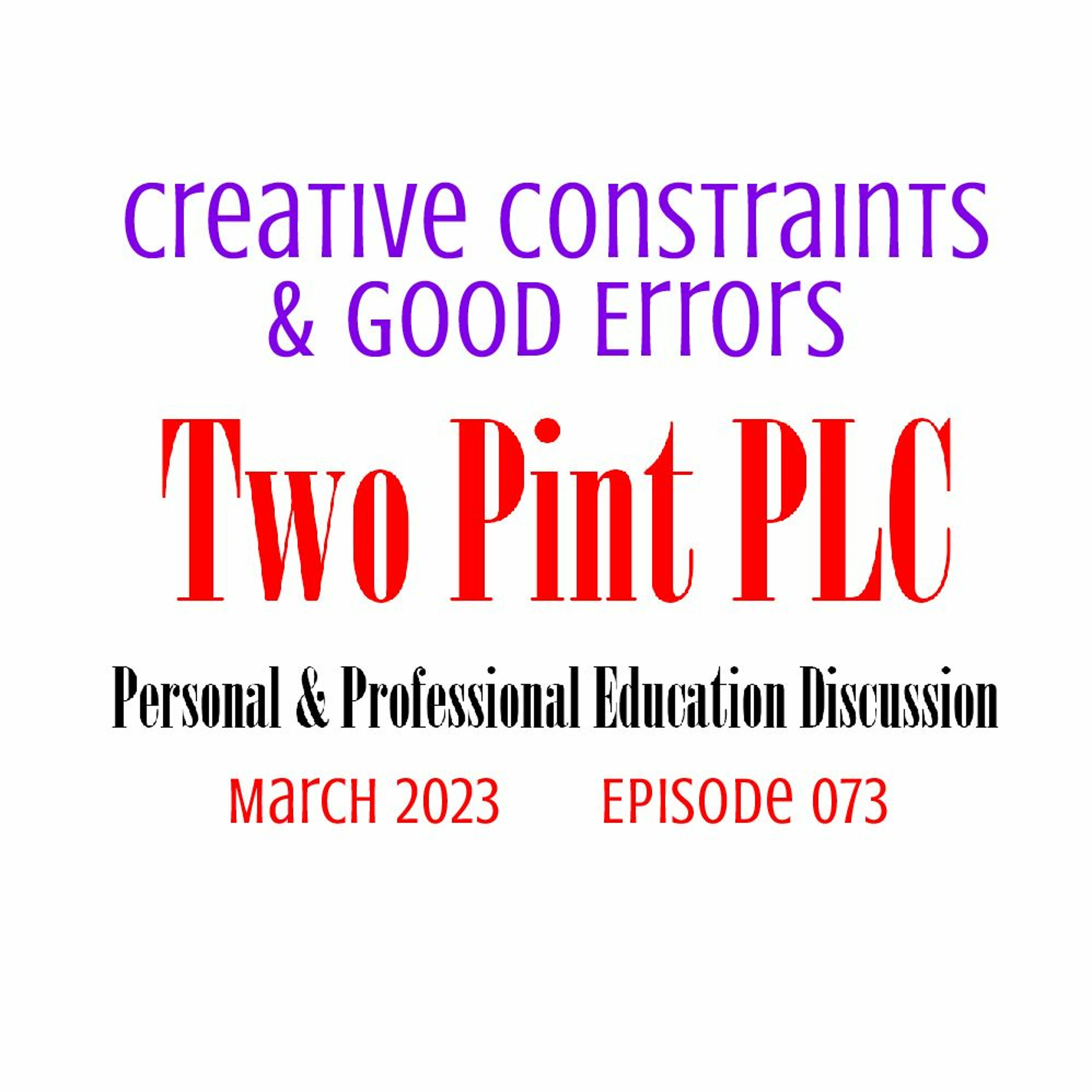 Two Pint PLC073 Creative Constraints & Good ErrorsThis month we are joined by two authors of a piece on constraints that fuel creativity. They share how limits on our writing help us focus on new parts of the writing process and make interesting connections along the way.
Later, we read about how errors are essential to the learning process and what we as teachers can do to make more productive use of the errors students will inevitably make.2023-03-1244 min
Two Pint PLC073 Creative Constraints & Good ErrorsThis month we are joined by two authors of a piece on constraints that fuel creativity. They share how limits on our writing help us focus on new parts of the writing process and make interesting connections along the way.
Later, we read about how errors are essential to the learning process and what we as teachers can do to make more productive use of the errors students will inevitably make.2023-03-1244 min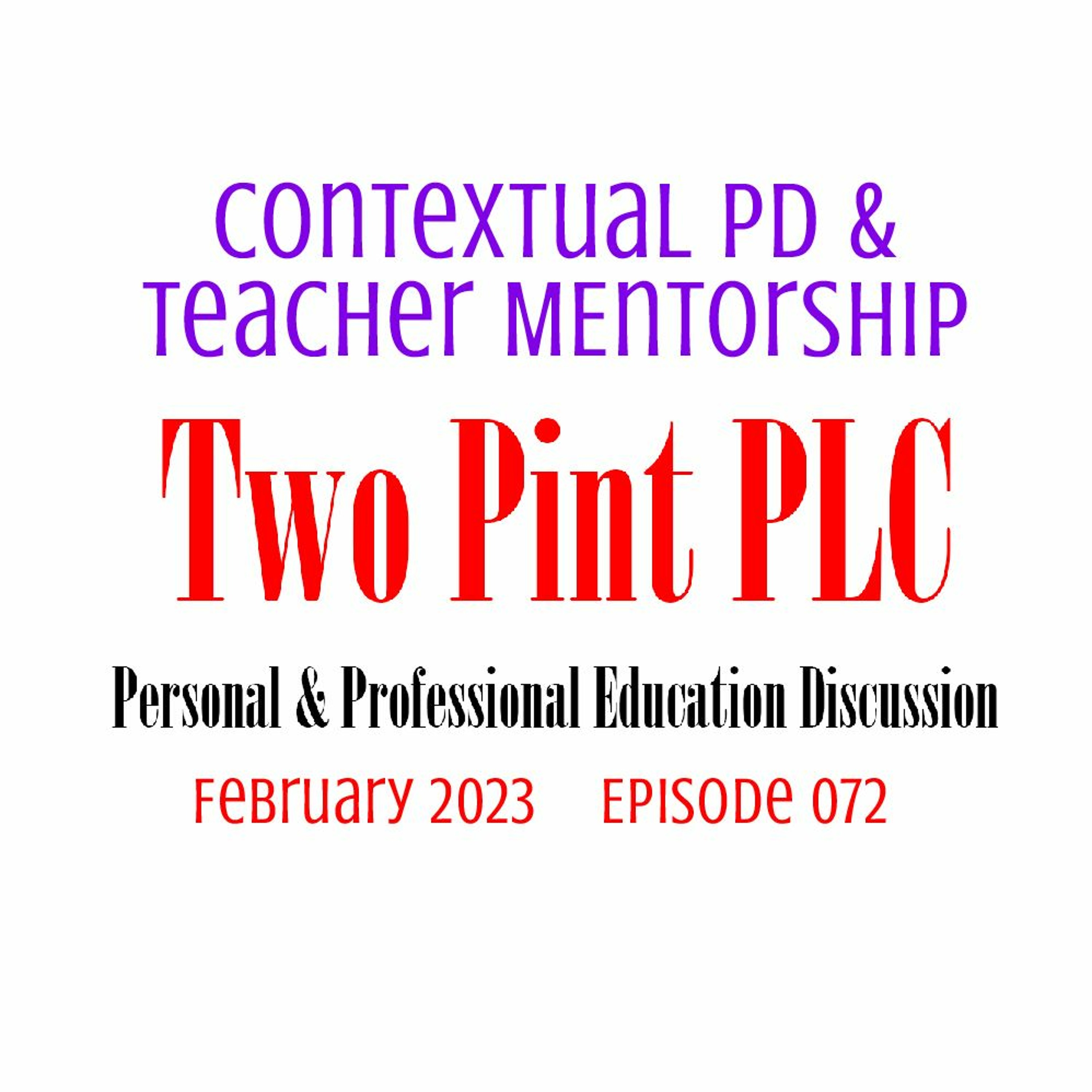 Two Pint PLC072 Contextual PD & Teacher MentorshipThis month we look at professional development. A fresh framework for PD lays out how we need to consider teacher learning in-context, with definite answers to the “for whom” and “when” when discussing whether something works.
Later, we look at norms for co-teaching by examining the role of a mentor teacher while a student teacher works with students. How should the mentor engage or intervene during a lesson?2023-02-1243 min
Two Pint PLC072 Contextual PD & Teacher MentorshipThis month we look at professional development. A fresh framework for PD lays out how we need to consider teacher learning in-context, with definite answers to the “for whom” and “when” when discussing whether something works.
Later, we look at norms for co-teaching by examining the role of a mentor teacher while a student teacher works with students. How should the mentor engage or intervene during a lesson?2023-02-1243 min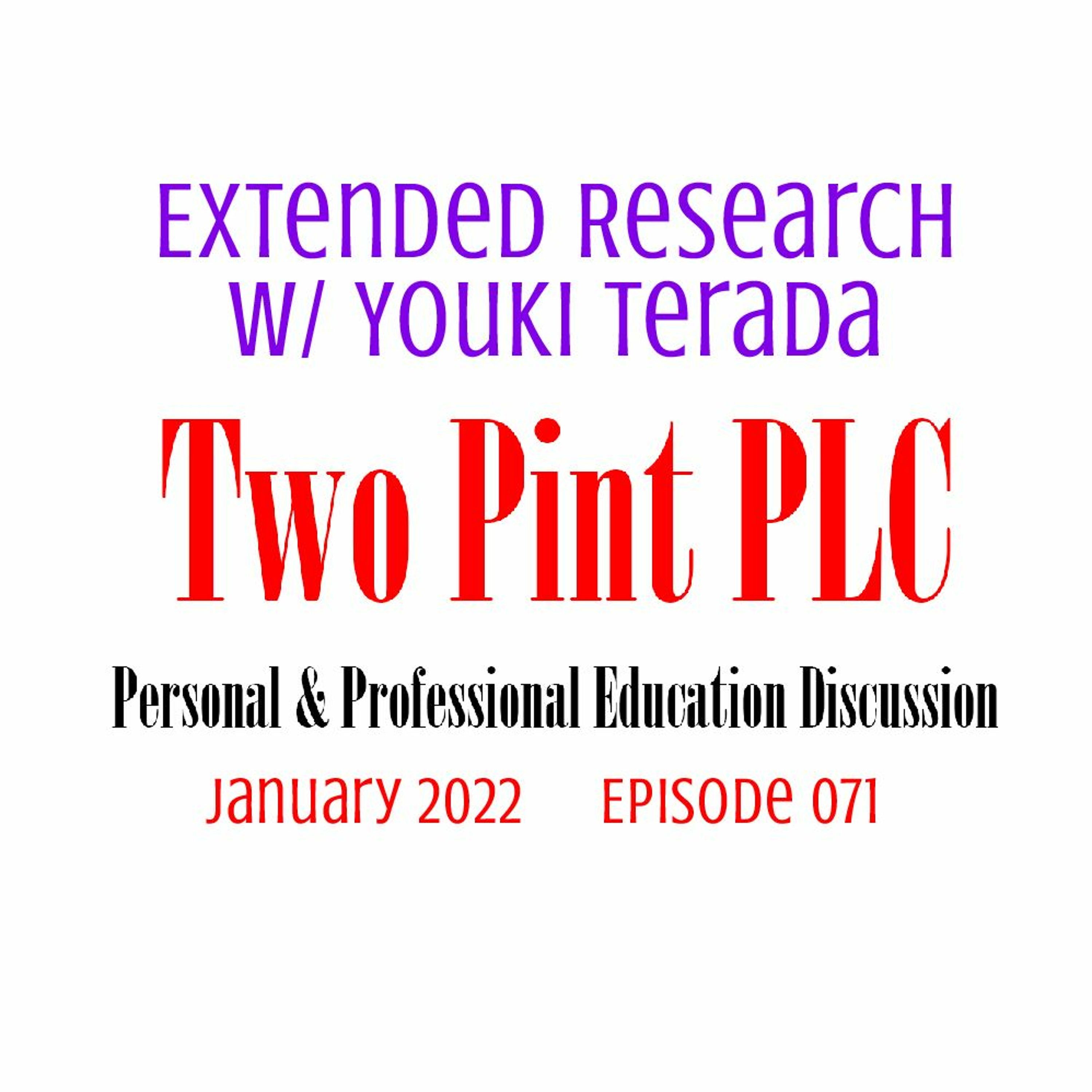 Two Pint PLC071 Extended Research With Youki TeradaThis month we are joined again by guest Youki Terada to discuss his 2022 education research roundup. His team at Edutopia has curated their 10 top studies of the year - from retrieval practice to play-based learning - and we discuss every last one of them in a marathon episode.2023-01-131h 20
Two Pint PLC071 Extended Research With Youki TeradaThis month we are joined again by guest Youki Terada to discuss his 2022 education research roundup. His team at Edutopia has curated their 10 top studies of the year - from retrieval practice to play-based learning - and we discuss every last one of them in a marathon episode.2023-01-131h 20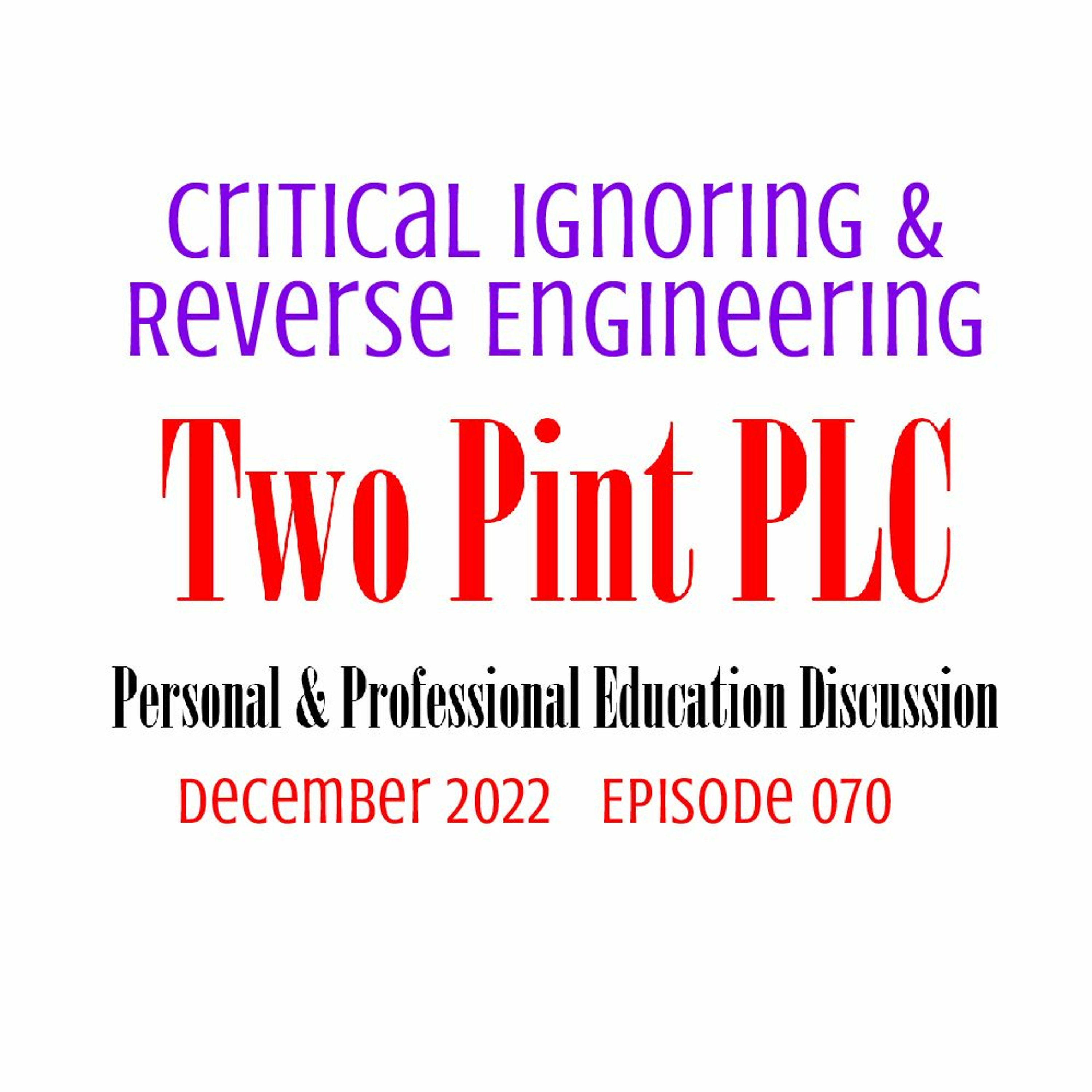 Two Pint PLC070 Critical Ignoring & Reverse EngineeringDigital literacy skills are important for teachers to consider across many teaching contexts. We read about how critical ignoring should be part of what we are teaching to help students manage the information overload of today’s digital landscape.
Later, we read a classroom study of how reverse engineering can help students get more out of their first robotics experiences. The benefits over “forward” designs reached their collaborative skills and what they learned.2022-12-1244 min
Two Pint PLC070 Critical Ignoring & Reverse EngineeringDigital literacy skills are important for teachers to consider across many teaching contexts. We read about how critical ignoring should be part of what we are teaching to help students manage the information overload of today’s digital landscape.
Later, we read a classroom study of how reverse engineering can help students get more out of their first robotics experiences. The benefits over “forward” designs reached their collaborative skills and what they learned.2022-12-1244 min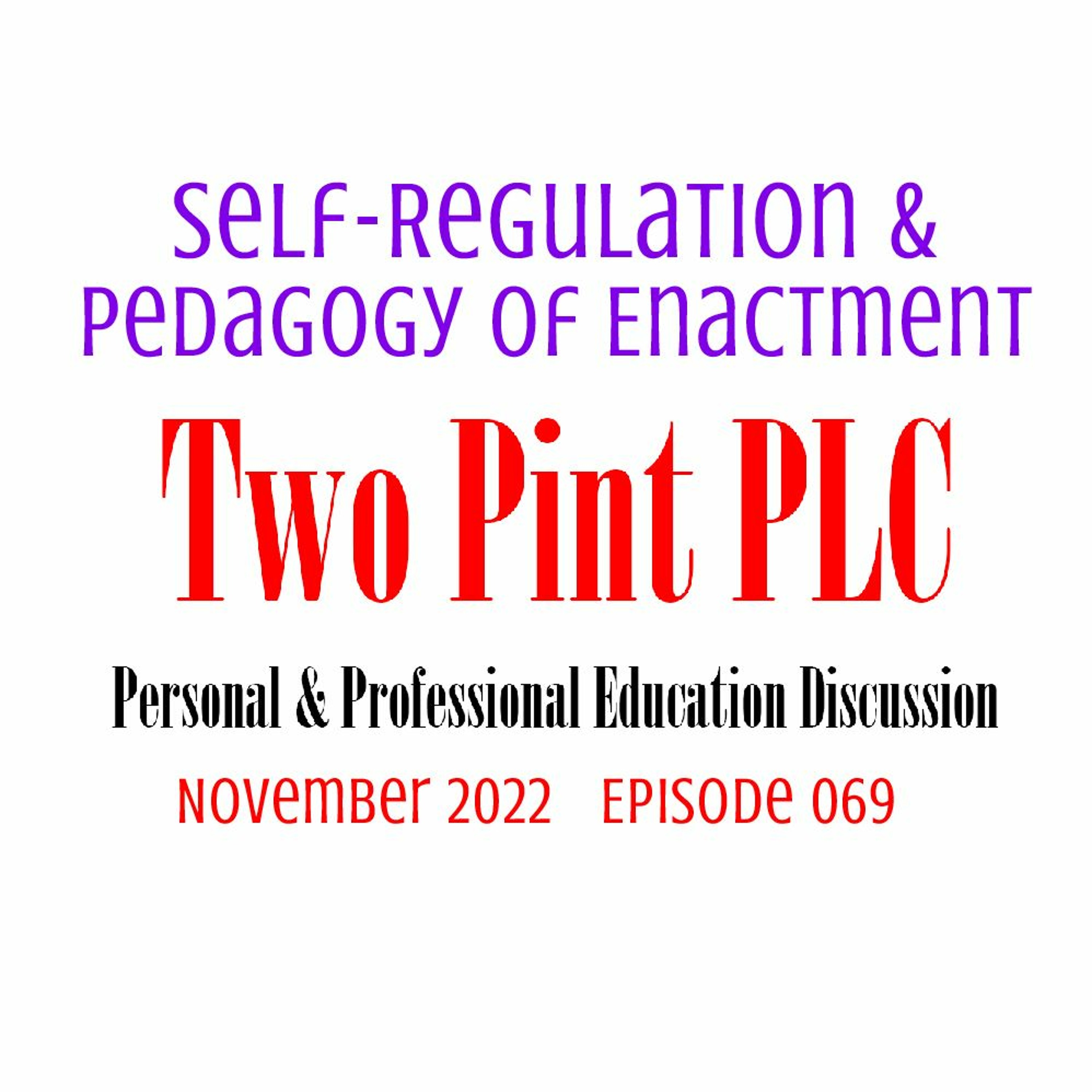 Two Pint PLC069 Self-Regulation & Pedagogy Of EnactmentThis month we read a robust, experimental study on teaching self-regulation and the increasing benefits to students over time. They learn more AND close a key achievement gap.
Later, we read about a pedagogy of enactment - how to learn about teaching through teaching. It underscores the many ways we improve through practice.2022-11-1244 min
Two Pint PLC069 Self-Regulation & Pedagogy Of EnactmentThis month we read a robust, experimental study on teaching self-regulation and the increasing benefits to students over time. They learn more AND close a key achievement gap.
Later, we read about a pedagogy of enactment - how to learn about teaching through teaching. It underscores the many ways we improve through practice.2022-11-1244 min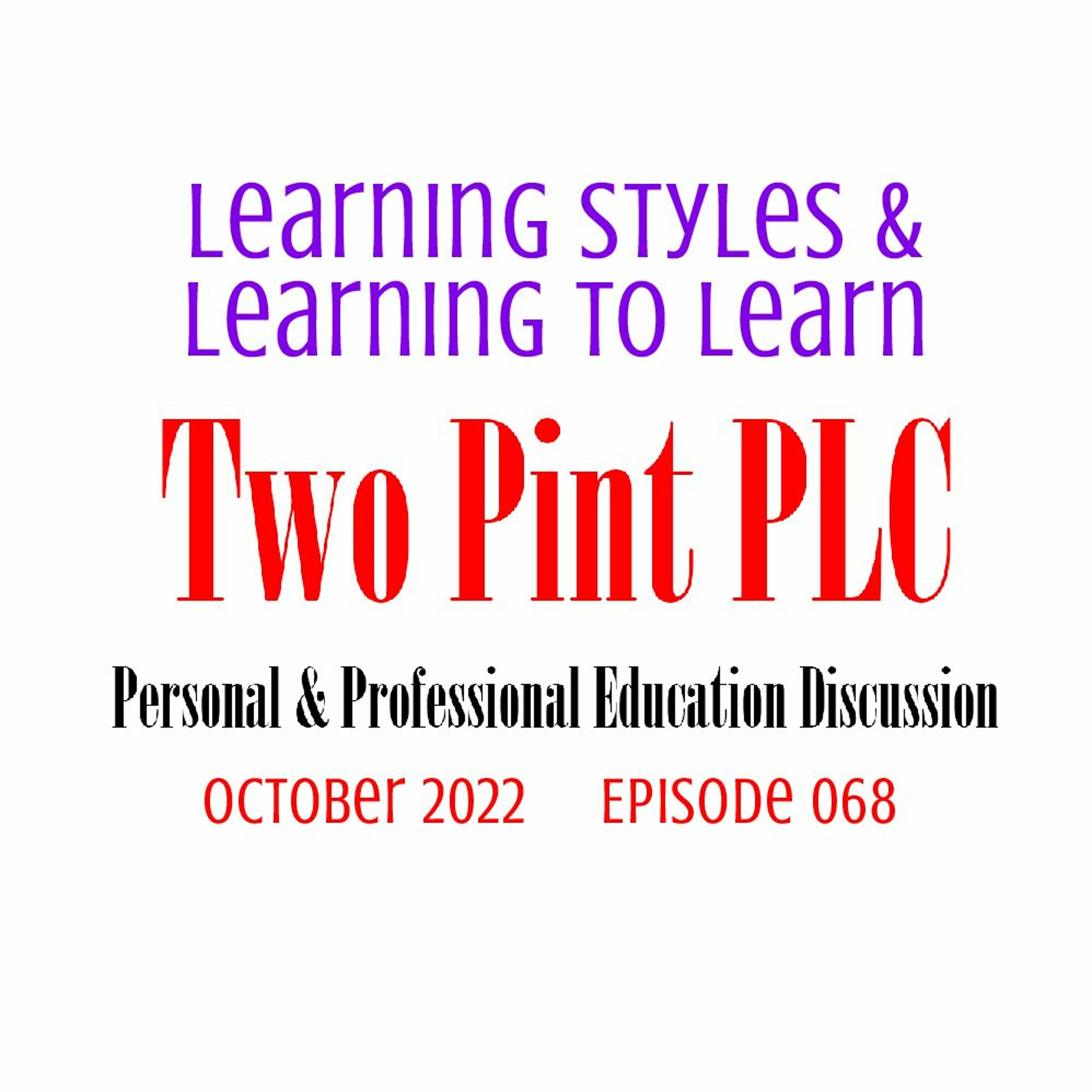 Two Pint PLC068 Learning Styles & Learning To LearnThe theories about teaching students according to learning styles have been debunked in research, but the idea has been difficult to interrupt in practice. We read a new paper focused on helping teachers move on from old thinking related to learning styles with more productive contemporary research.
Later, we look at a listener recommendation focused on helping students think about how they view their own learning, in order to promote more effective practices among students.2022-10-1244 min
Two Pint PLC068 Learning Styles & Learning To LearnThe theories about teaching students according to learning styles have been debunked in research, but the idea has been difficult to interrupt in practice. We read a new paper focused on helping teachers move on from old thinking related to learning styles with more productive contemporary research.
Later, we look at a listener recommendation focused on helping students think about how they view their own learning, in order to promote more effective practices among students.2022-10-1244 min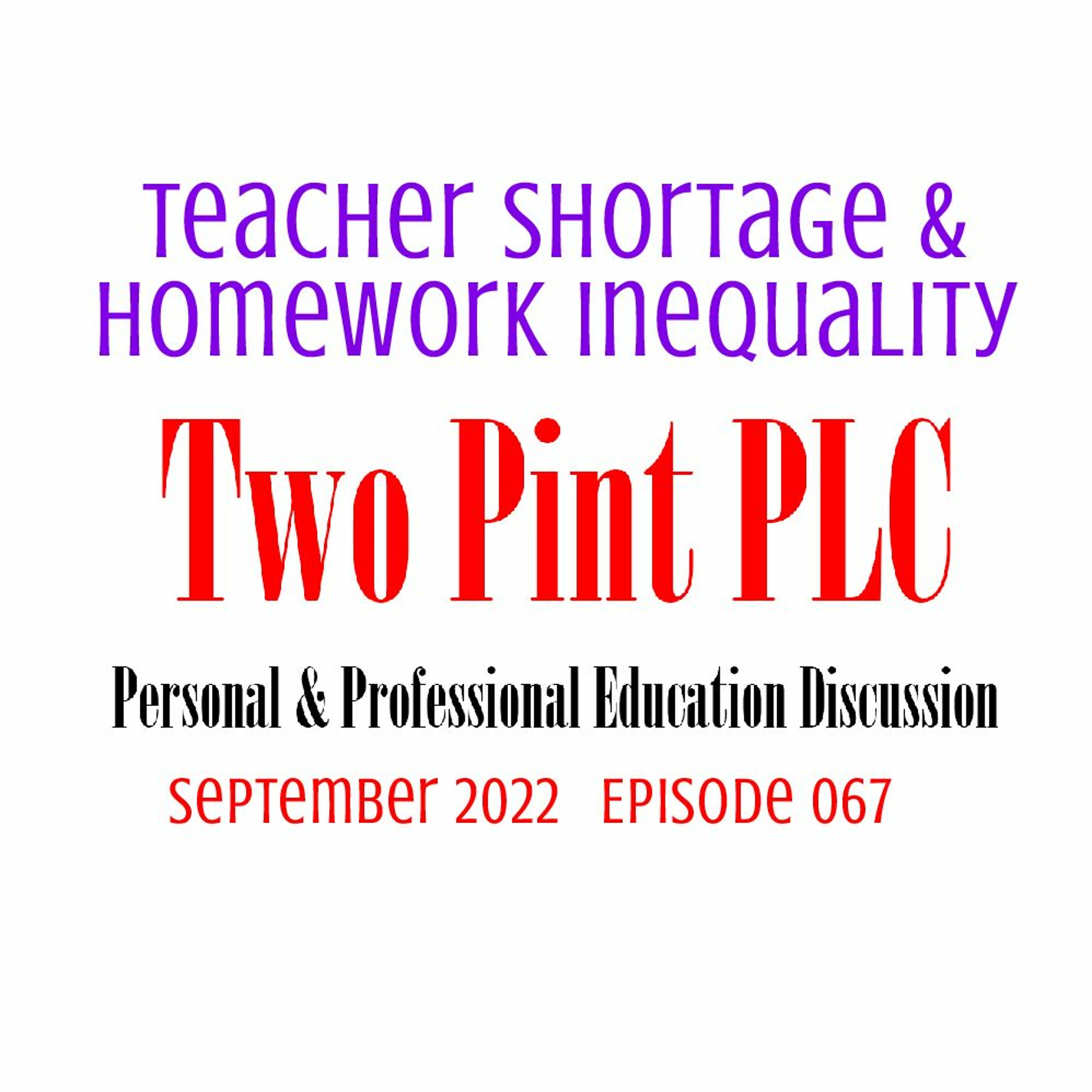 Two Pint PLC067 Teacher Shortage & Homework InequalityStaffing challenges in districts across the United States are fueling a narrative of a nationwide teacher shortage. However, Paul Bruno joins us to talk about his recent work showing there may not be a national shortage… or national anything.
Later, we read a paper showing some of the inequitable impacts of math homework, and the persistence of a meritocracy myth despite teachers’ knowledge of the inequity.2022-09-1244 min
Two Pint PLC067 Teacher Shortage & Homework InequalityStaffing challenges in districts across the United States are fueling a narrative of a nationwide teacher shortage. However, Paul Bruno joins us to talk about his recent work showing there may not be a national shortage… or national anything.
Later, we read a paper showing some of the inequitable impacts of math homework, and the persistence of a meritocracy myth despite teachers’ knowledge of the inequity.2022-09-1244 min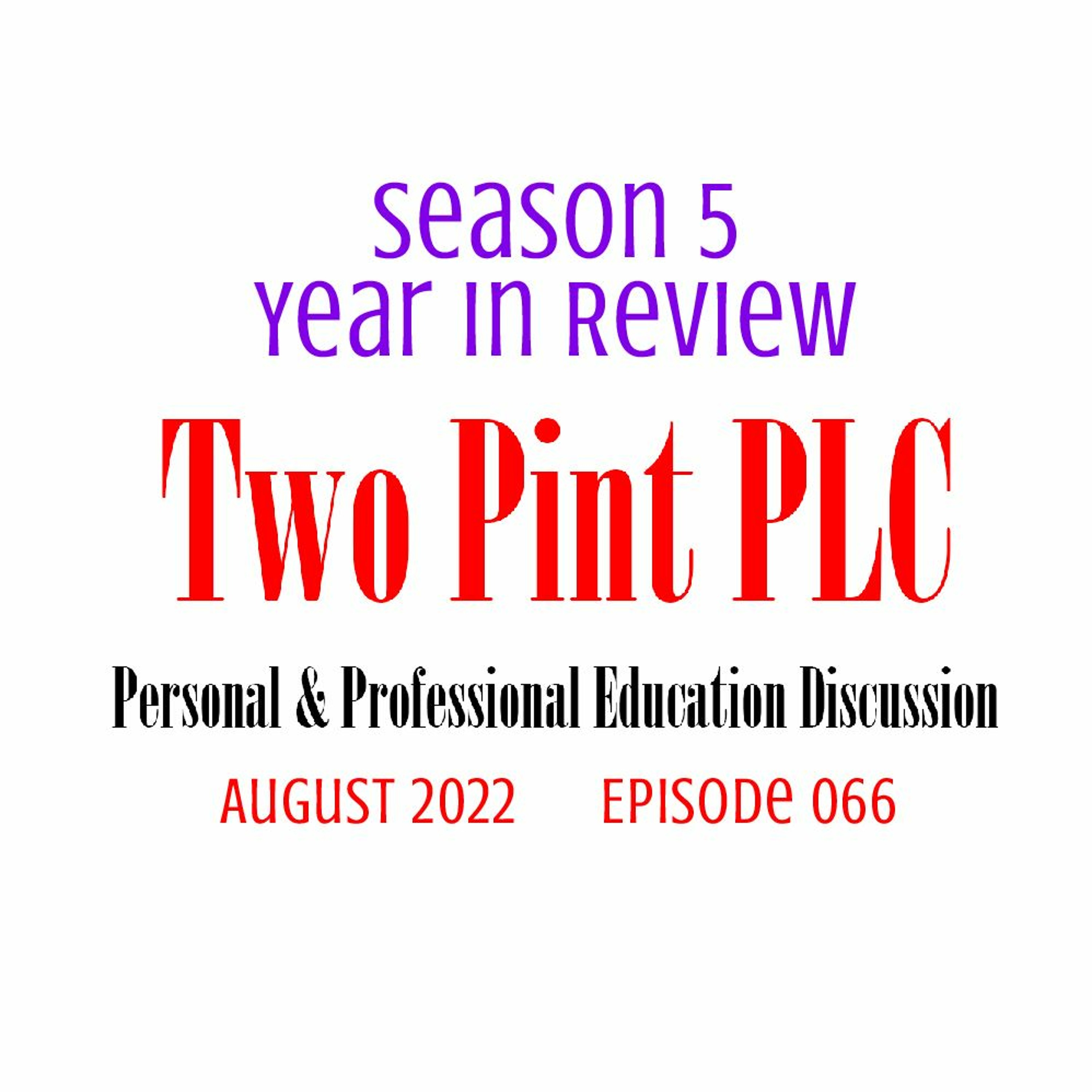 Two Pint PLC066 Season 5 Year in ReviewThis month we reflect on our year of reading scholarship and growing as humans. First we’ll return to the segments we felt had the greatest impact on our practice and our thinking from the research we read.
Later, we’ll reflect specifically on our praxis. We share some of the changes we’re making in our classroom and in our study that is moving us toward our goals as education practitioners.
Finally, we’ll share a bit about how our lives are changing outside of school… and mark the 2022 recipients of the Mug of Honor.2022-08-1244 min
Two Pint PLC066 Season 5 Year in ReviewThis month we reflect on our year of reading scholarship and growing as humans. First we’ll return to the segments we felt had the greatest impact on our practice and our thinking from the research we read.
Later, we’ll reflect specifically on our praxis. We share some of the changes we’re making in our classroom and in our study that is moving us toward our goals as education practitioners.
Finally, we’ll share a bit about how our lives are changing outside of school… and mark the 2022 recipients of the Mug of Honor.2022-08-1244 min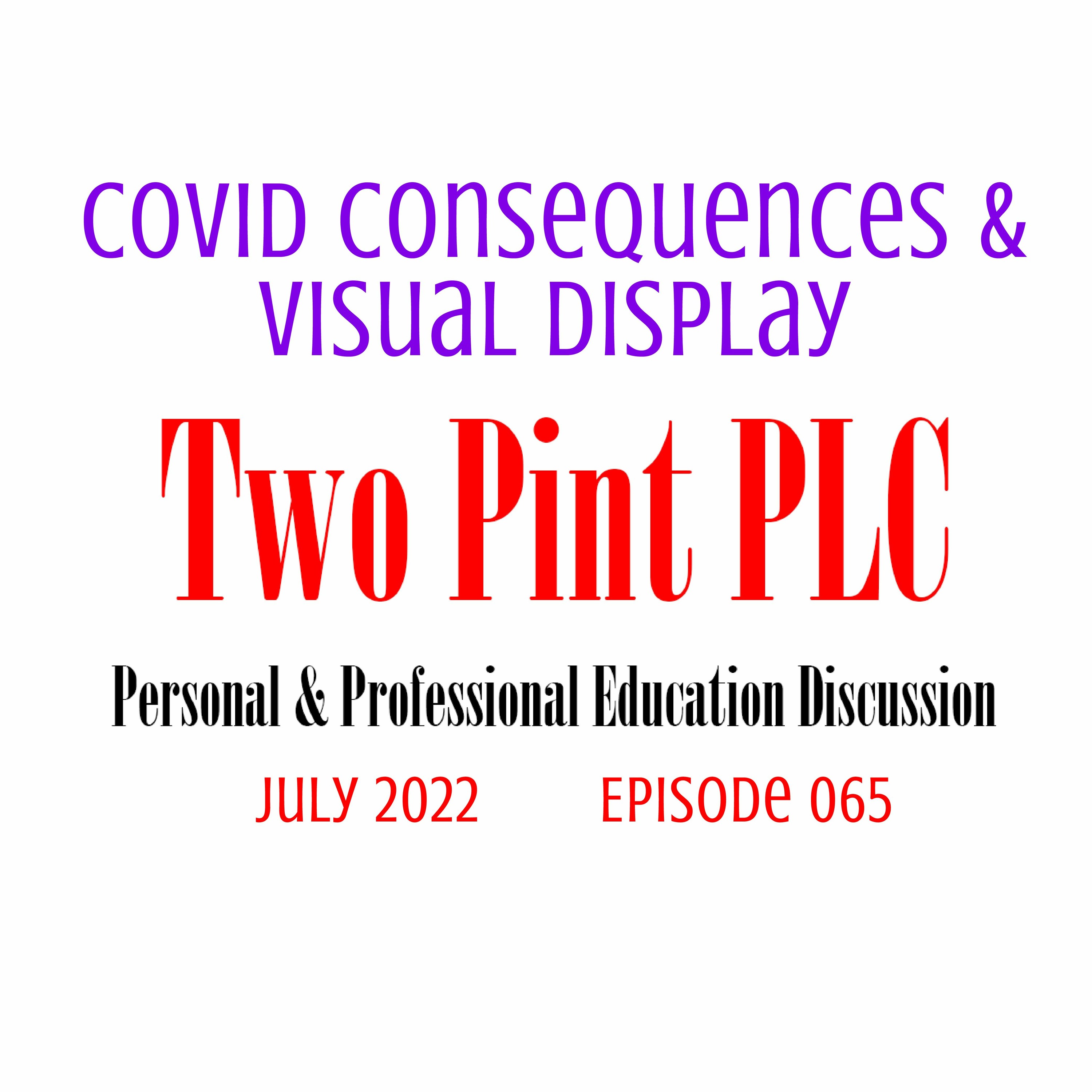 Two Pint PLC065 COVID Consequences & Visual DisplayAs the summer of 2022 wanes, we will spend some time looking at the bigger picture of how education has been affected by COVID-19 these past few years. We read reviews of the current research on COVID impacts on mental health and academic outcomes, with thoughts on how it may impact our prep for the coming year.
Later, we react to a review of research on visual displays and the importance of intentionally developing visual literacy. How can we help students learn to decode visual language?2022-07-1243 min
Two Pint PLC065 COVID Consequences & Visual DisplayAs the summer of 2022 wanes, we will spend some time looking at the bigger picture of how education has been affected by COVID-19 these past few years. We read reviews of the current research on COVID impacts on mental health and academic outcomes, with thoughts on how it may impact our prep for the coming year.
Later, we react to a review of research on visual displays and the importance of intentionally developing visual literacy. How can we help students learn to decode visual language?2022-07-1243 min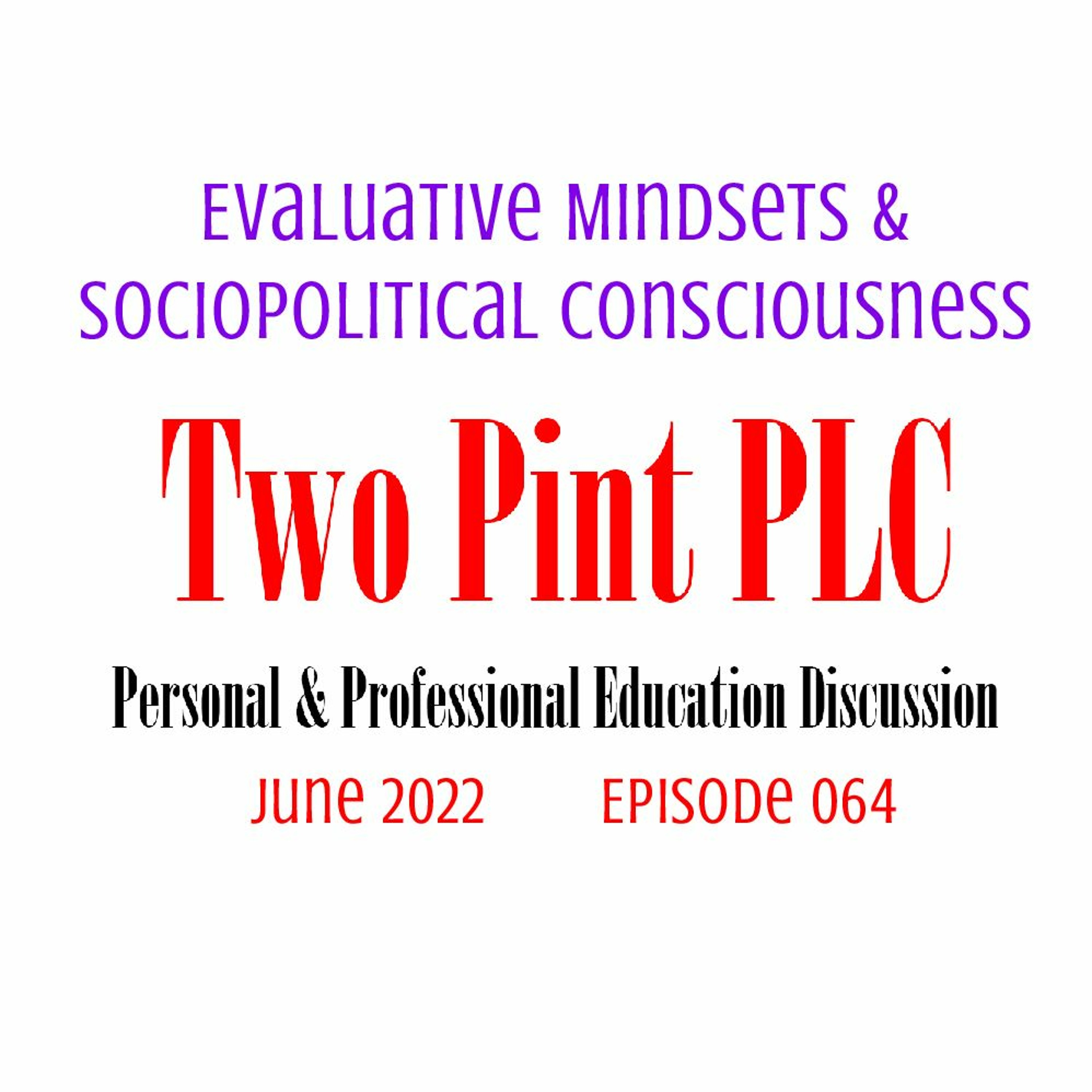 Two Pint PLC064 Evaluative Mindsets & Sociopolitical ConsciousnessWhy are people so influenced by false information, even when they know better? We are joined by researcher Nikita Antonia Salovich to discuss her recent work on evaluative mindsets, and how we can apply on-going work to how we handle information in the classroom.
Later, we discuss Culturally Responsive Science Teaching - and how teachers can better cultivate sociopolitical consciousness with students.2022-06-1244 min
Two Pint PLC064 Evaluative Mindsets & Sociopolitical ConsciousnessWhy are people so influenced by false information, even when they know better? We are joined by researcher Nikita Antonia Salovich to discuss her recent work on evaluative mindsets, and how we can apply on-going work to how we handle information in the classroom.
Later, we discuss Culturally Responsive Science Teaching - and how teachers can better cultivate sociopolitical consciousness with students.2022-06-1244 min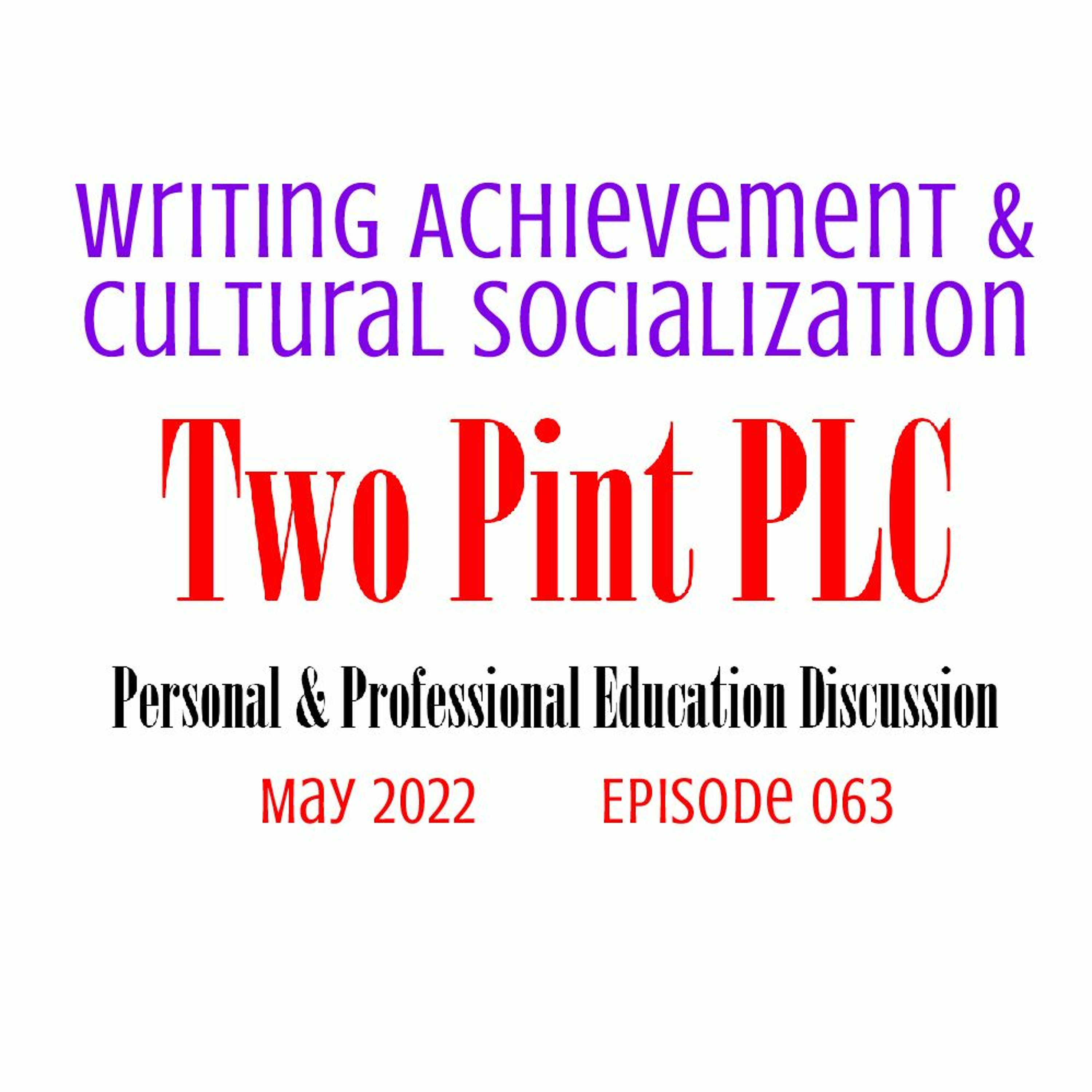 Two Pint PLC063 Writing Achievement & Cultural SocializationWhen professional development programs conflict with overemphasis on test scores, teachers face a precarious tension between their growth and the ever present threat of dubious evaluations. We read about an effort to sustain professional development in writing instruction amid a high-stakes testing environment.
Later, we look at the correlation between increasing cultural socialization and reductions in suspensions for Black students. These findings illustrate the need for a culturally competent teaching workforce.2022-05-1244 min
Two Pint PLC063 Writing Achievement & Cultural SocializationWhen professional development programs conflict with overemphasis on test scores, teachers face a precarious tension between their growth and the ever present threat of dubious evaluations. We read about an effort to sustain professional development in writing instruction amid a high-stakes testing environment.
Later, we look at the correlation between increasing cultural socialization and reductions in suspensions for Black students. These findings illustrate the need for a culturally competent teaching workforce.2022-05-1244 min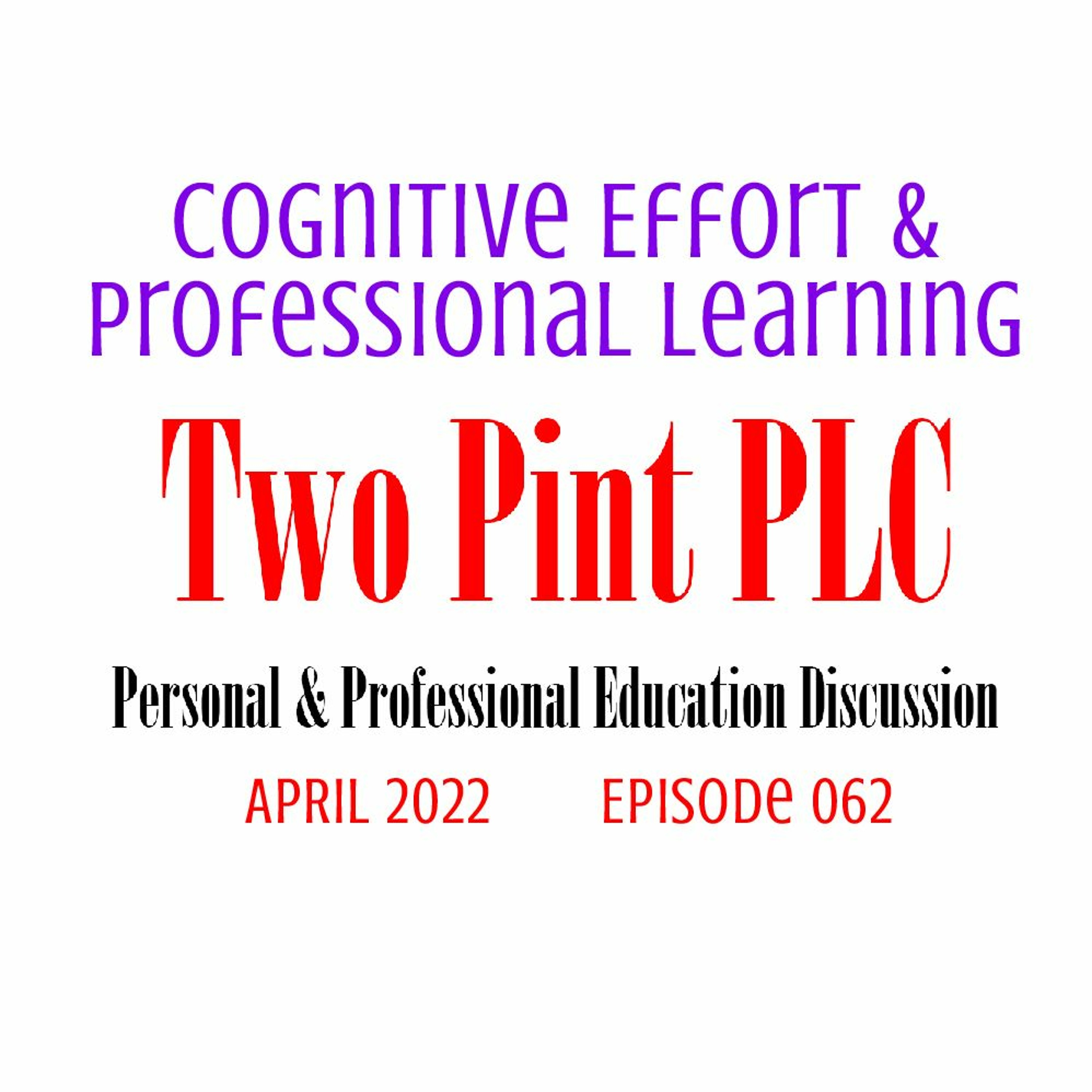 Two Pint PLC062 Cognitive Effort & Professional LearningThe routines, rewards, and incentives we use in the classroom can help students build productive habits they use throughout their lives. We read about a series of studies that found how rewarding cognitive effort can lead to greater intrinsic motivation for participants… even after the rewards. We think about how this could apply in classrooms.
Later, we discuss a recent report promoting research on the positive impacts of professional learning. How can we get the most from our time and energy in PD?2022-04-1244 min
Two Pint PLC062 Cognitive Effort & Professional LearningThe routines, rewards, and incentives we use in the classroom can help students build productive habits they use throughout their lives. We read about a series of studies that found how rewarding cognitive effort can lead to greater intrinsic motivation for participants… even after the rewards. We think about how this could apply in classrooms.
Later, we discuss a recent report promoting research on the positive impacts of professional learning. How can we get the most from our time and energy in PD?2022-04-1244 min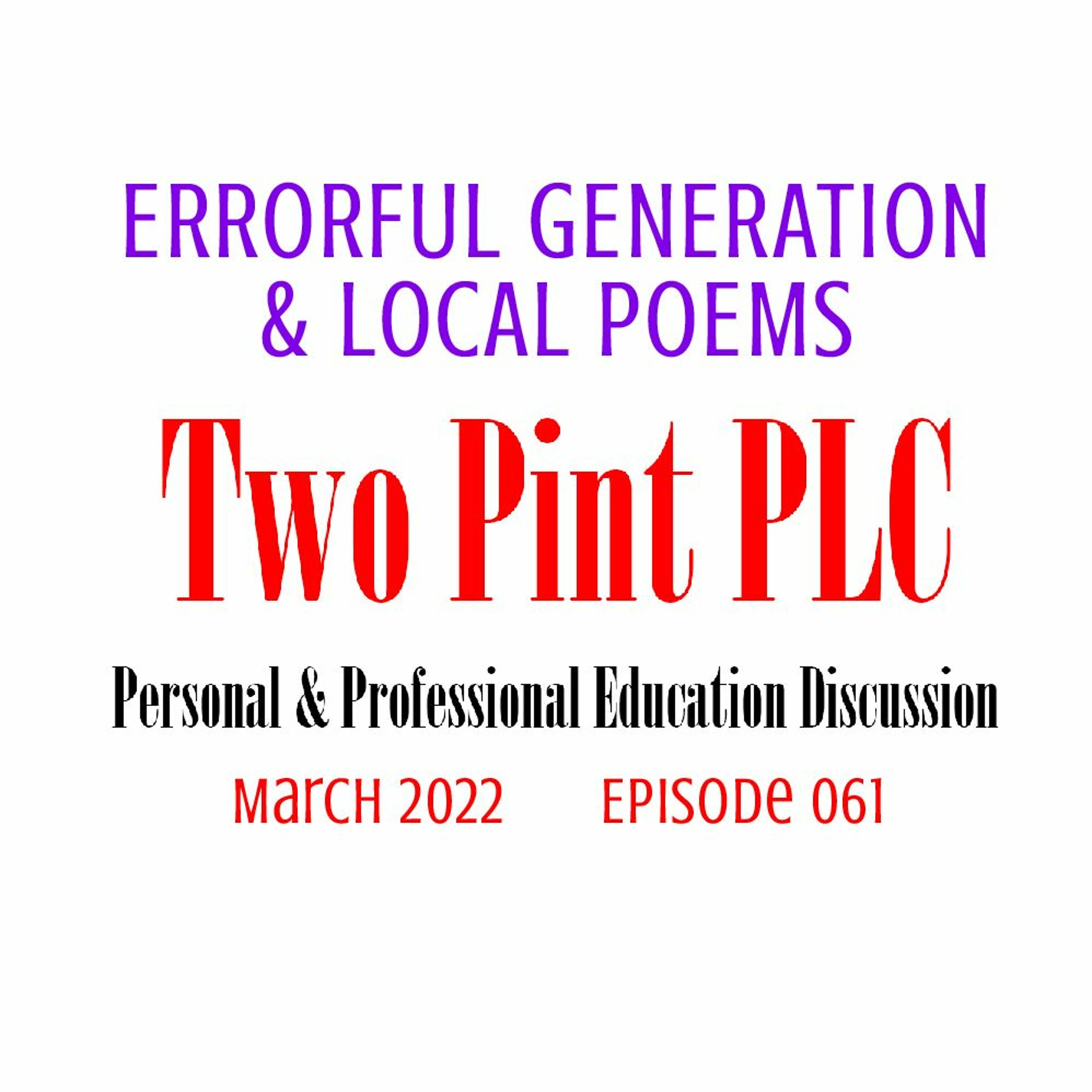 Two Pint PLC061 Errorful Generation & Local PoemsRetrieval practice has a ton of research support, but we’re still figuring out the when and how of its effective use in instruction. We read a series of studies comparing the impacts of post-testing and pre-testing on measures of learning, with the results showing tremendous power in pre-tests.
Later, we read a study showing how local poems and songs provide viable material for reading instruction. The added benefits of local connections for student appreciation offer a powerful tool for facilitating student learning.2022-03-1244 min
Two Pint PLC061 Errorful Generation & Local PoemsRetrieval practice has a ton of research support, but we’re still figuring out the when and how of its effective use in instruction. We read a series of studies comparing the impacts of post-testing and pre-testing on measures of learning, with the results showing tremendous power in pre-tests.
Later, we read a study showing how local poems and songs provide viable material for reading instruction. The added benefits of local connections for student appreciation offer a powerful tool for facilitating student learning.2022-03-1244 min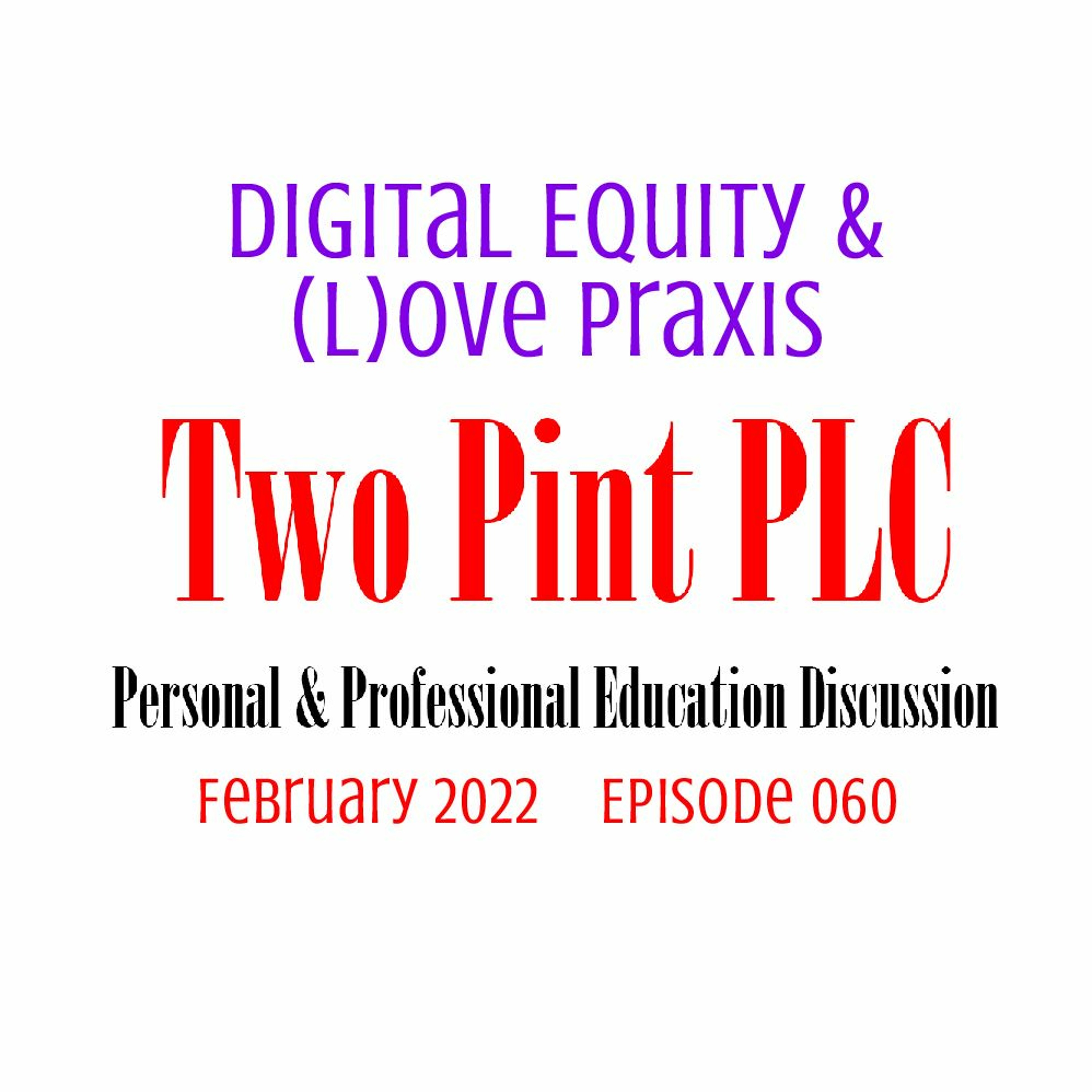 Two Pint PLC060 Digital Equity & (L)ove PraxisTechnology has taken a prominent position in many schools as we have taught these past few years, yet we need to look at who is using what technological tools… and why? We read how technology manifests and reproduces categorical inequalities in education, with some lessons on how to disrupt those means of sorting students.
Later, we read an article critiquing the prominent savior narrative used in education to avoid important conversations about classroom power dynamics and the treatment of teachers in society.2022-02-1244 min
Two Pint PLC060 Digital Equity & (L)ove PraxisTechnology has taken a prominent position in many schools as we have taught these past few years, yet we need to look at who is using what technological tools… and why? We read how technology manifests and reproduces categorical inequalities in education, with some lessons on how to disrupt those means of sorting students.
Later, we read an article critiquing the prominent savior narrative used in education to avoid important conversations about classroom power dynamics and the treatment of teachers in society.2022-02-1244 min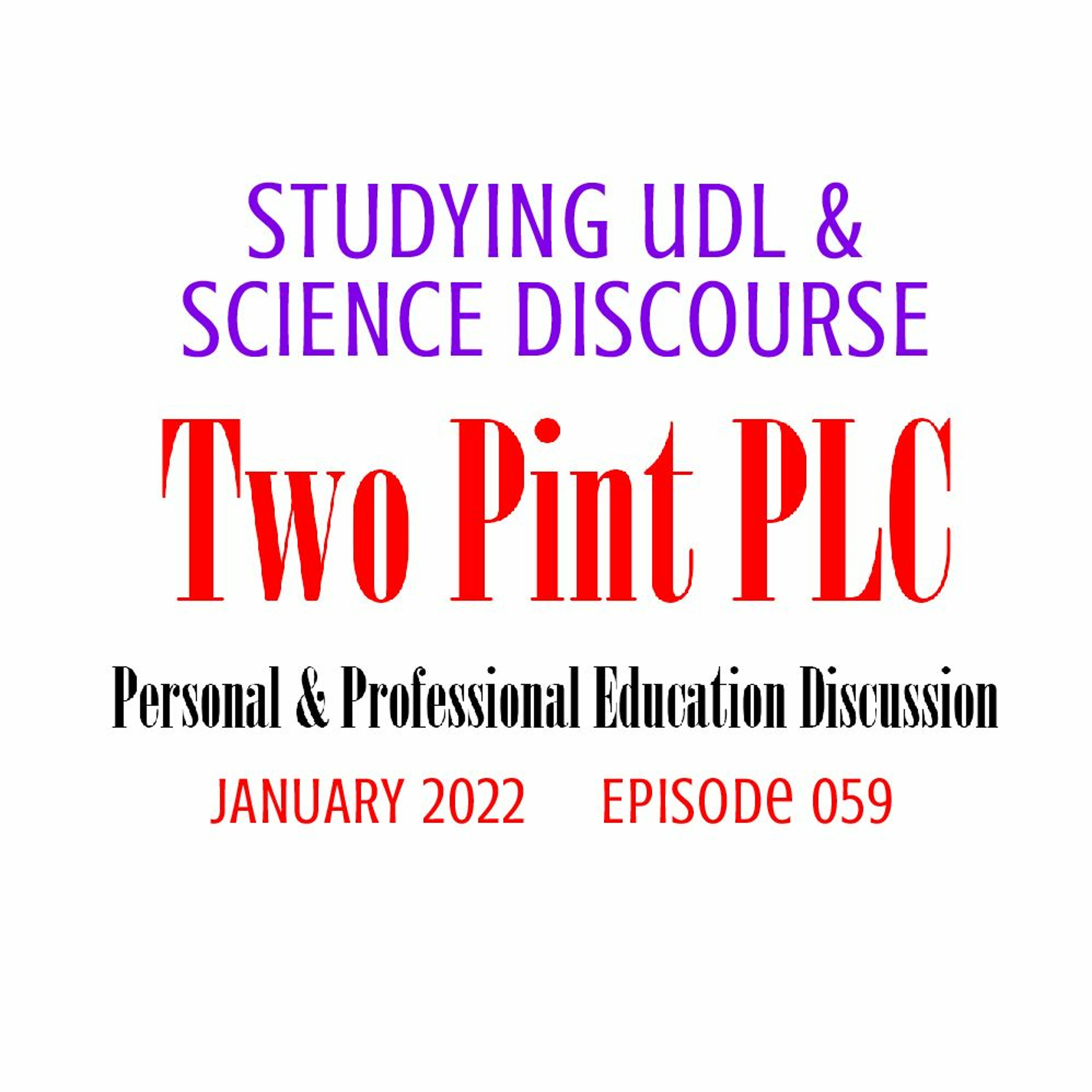 Two Pint PLC059 Studying UDL And Science DiscourseUniversal Design for Learning is an exciting framework to improve accessibility of instruction. However, Dr. Guy Boysen joins us to discuss his critiques of the existing research to support UDL and how future work could improve confidence among scholars.
Later, Lali DeRosier returns to the show to share a paper on science discourse in urban classrooms. We explore why science talk matters, and how to facilitate just & effective discourse among students.2022-01-1258 min
Two Pint PLC059 Studying UDL And Science DiscourseUniversal Design for Learning is an exciting framework to improve accessibility of instruction. However, Dr. Guy Boysen joins us to discuss his critiques of the existing research to support UDL and how future work could improve confidence among scholars.
Later, Lali DeRosier returns to the show to share a paper on science discourse in urban classrooms. We explore why science talk matters, and how to facilitate just & effective discourse among students.2022-01-1258 min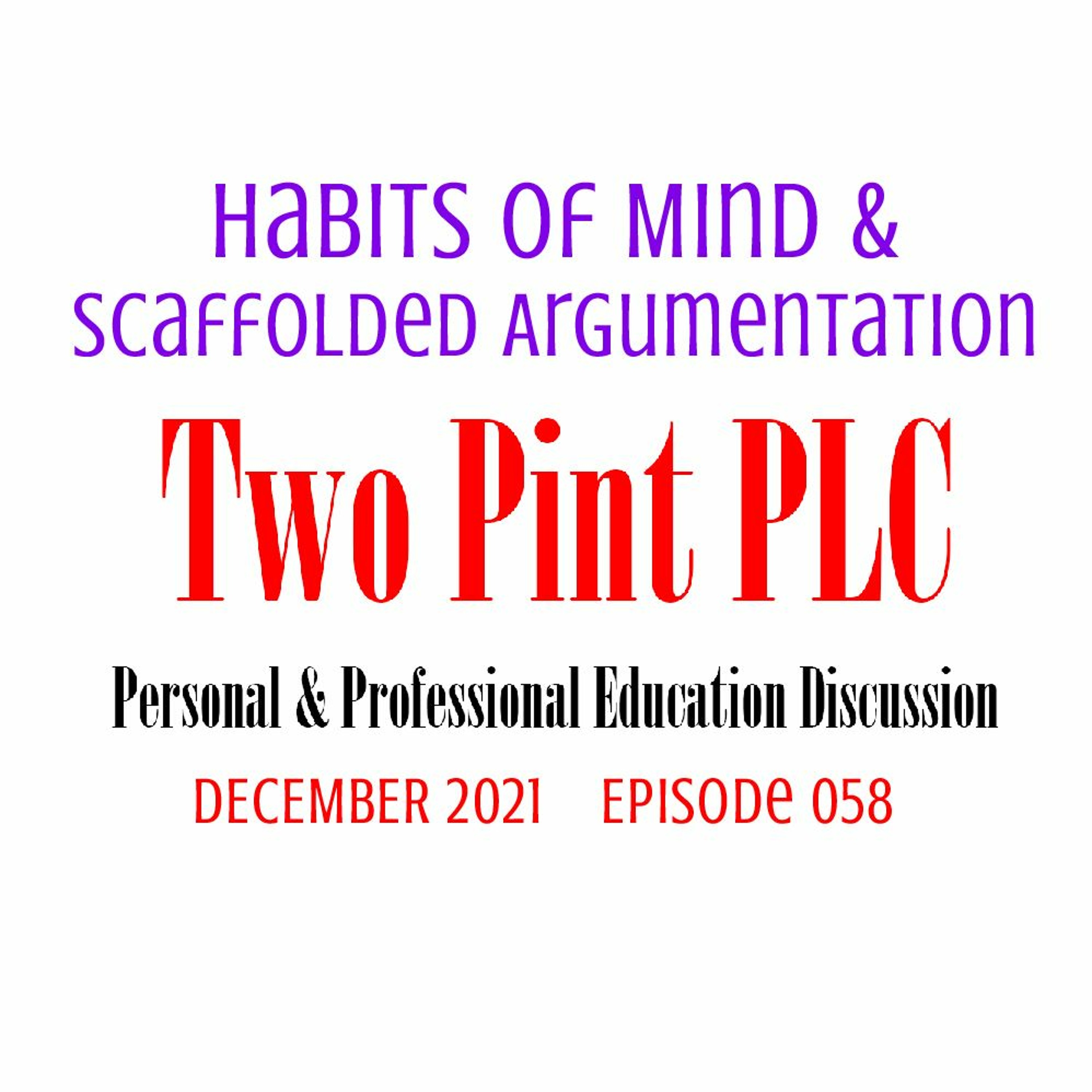 Two Pint PLC058 Habits Of Mind & Scaffolded ArgumentationAll learning is brain-based, which means taking care of our brain is part of a good education. We read a scoping review to look at some examples of how healthy habits can impact learning, motivation, and mental wellness.
Later, we read a study that compared the efficacy of student argumentation when approached collaboratively or adversarially. The results suggest there are specific benefits to helping students argue in parallel.
NOTE: equipment problems have caused some issues with sound quality. Our apologies, and we are making changes for future tapings.2021-12-1442 min
Two Pint PLC058 Habits Of Mind & Scaffolded ArgumentationAll learning is brain-based, which means taking care of our brain is part of a good education. We read a scoping review to look at some examples of how healthy habits can impact learning, motivation, and mental wellness.
Later, we read a study that compared the efficacy of student argumentation when approached collaboratively or adversarially. The results suggest there are specific benefits to helping students argue in parallel.
NOTE: equipment problems have caused some issues with sound quality. Our apologies, and we are making changes for future tapings.2021-12-1442 min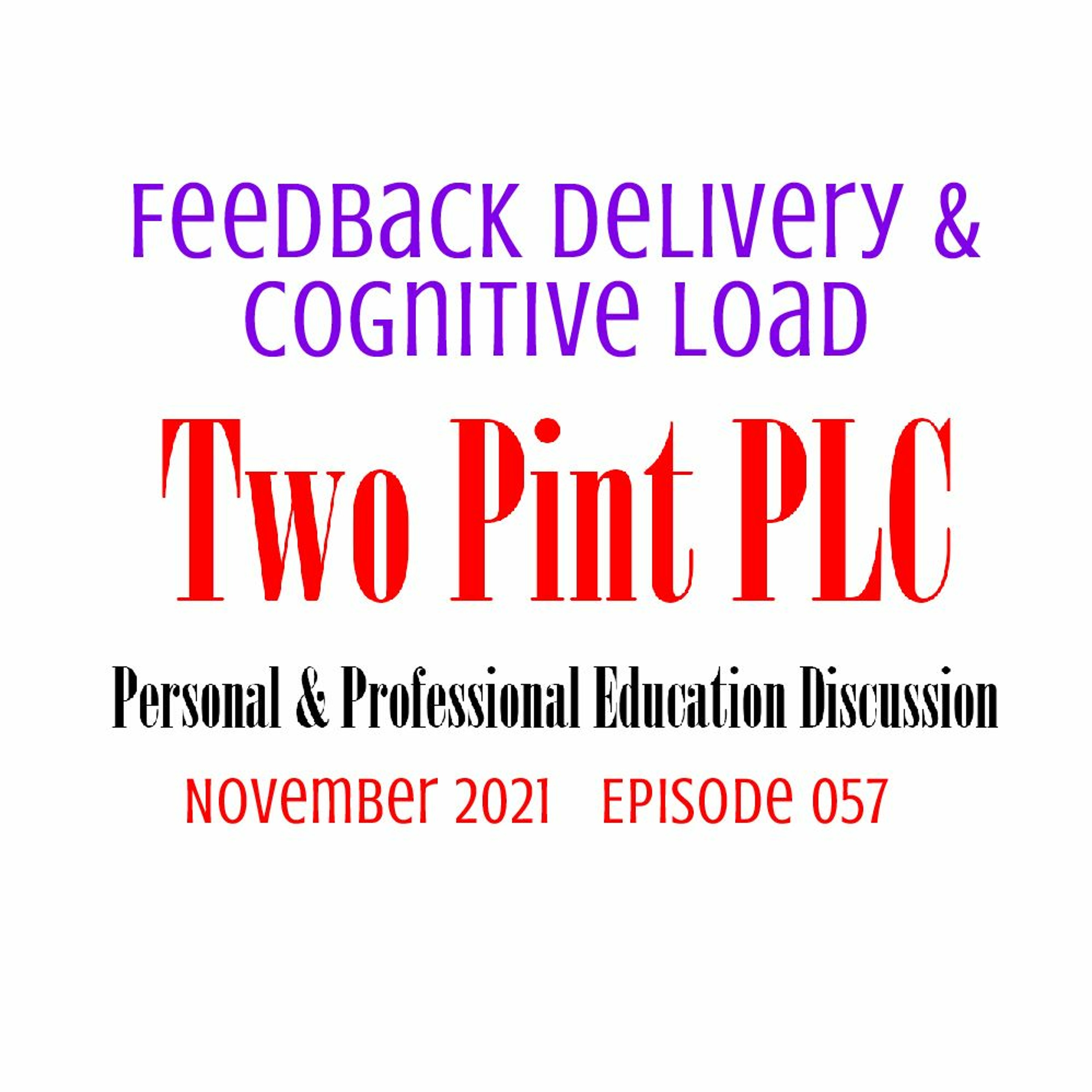 Two Pint PLC057 Feedback Delivery And Cognitive LoadStudents need feedback on their work in order to improve, but what is the impact of different approaches to giving that feedback? We read a study of how students perceive the feedback they get, and how it impacts their motivation and vitality. We see the applications for helping students boost their sense of competency.
Later, we read a teacher-written journal paper on applications of Cognitive Load Theory. We find implications for helping students manage their cognitive resources, especially when applying IEPs and 504 plans.2021-11-1244 min
Two Pint PLC057 Feedback Delivery And Cognitive LoadStudents need feedback on their work in order to improve, but what is the impact of different approaches to giving that feedback? We read a study of how students perceive the feedback they get, and how it impacts their motivation and vitality. We see the applications for helping students boost their sense of competency.
Later, we read a teacher-written journal paper on applications of Cognitive Load Theory. We find implications for helping students manage their cognitive resources, especially when applying IEPs and 504 plans.2021-11-1244 min Beyond the CurtainLuca Dinardo // Manifesting, Music Theatre and Overcoming Mental Health ChallengesWe have hit the half way mark of Season 3 and today I welcome the brilliant, Luca Dinardo!
Luca is a musical theatre performer, dance captain and choreographer whose professional credits include; ensemble and dance captain in the Australian Premiere of Bring It On – The Musical, children ensemble in Billy Elliot the Musical, ensemble and dance captain in Stage Art's NINE The Musical , choreographer for RENT at the Sydney Opera House, Assistant director and assistant choreographer for Kiss of the Spider Woman by the Melbourne Theatre Company, she played the role of Anybodys and was Dance Captain in West Side Sto...2021-10-1244 min
Beyond the CurtainLuca Dinardo // Manifesting, Music Theatre and Overcoming Mental Health ChallengesWe have hit the half way mark of Season 3 and today I welcome the brilliant, Luca Dinardo!
Luca is a musical theatre performer, dance captain and choreographer whose professional credits include; ensemble and dance captain in the Australian Premiere of Bring It On – The Musical, children ensemble in Billy Elliot the Musical, ensemble and dance captain in Stage Art's NINE The Musical , choreographer for RENT at the Sydney Opera House, Assistant director and assistant choreographer for Kiss of the Spider Woman by the Melbourne Theatre Company, she played the role of Anybodys and was Dance Captain in West Side Sto...2021-10-1244 min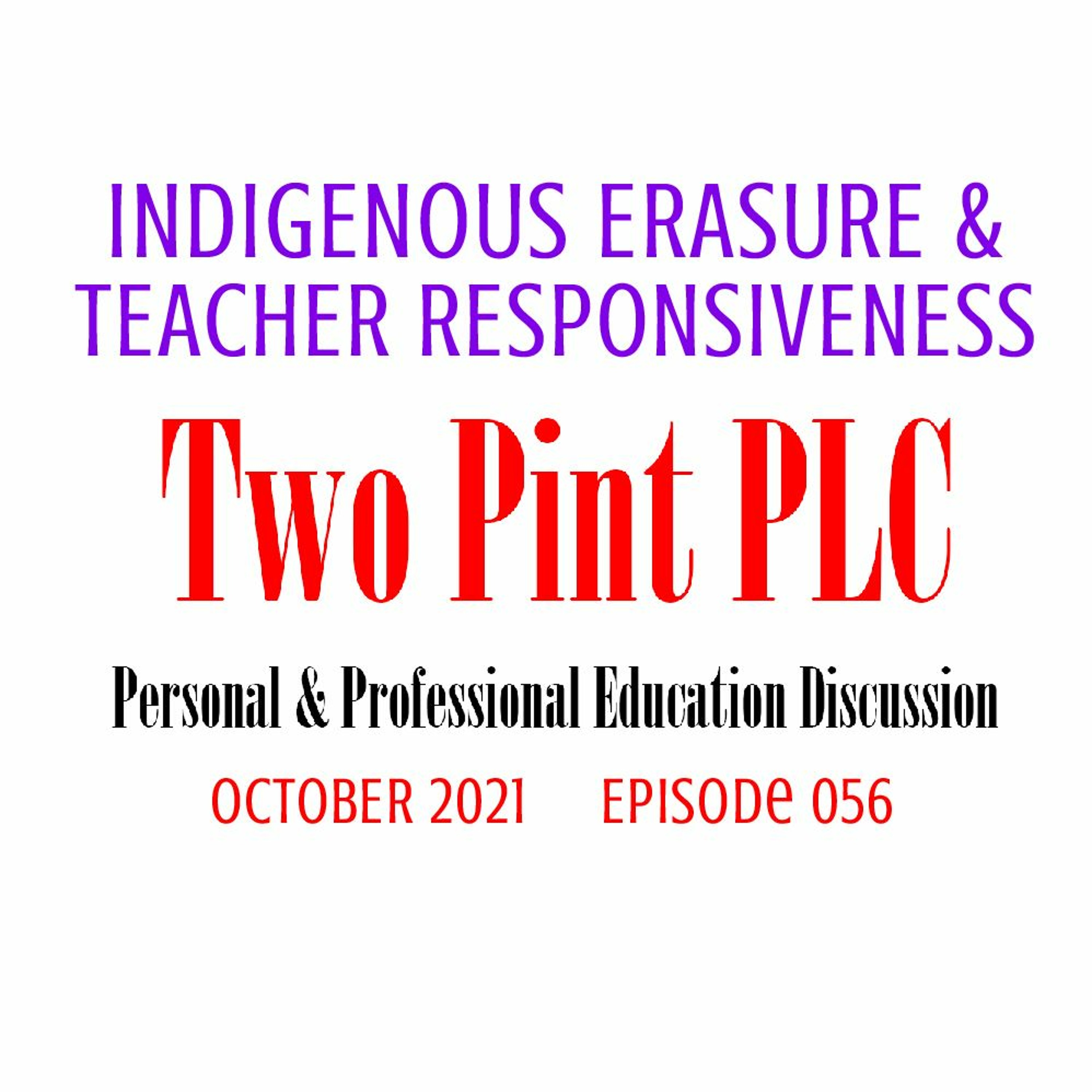 Two Pint PLC056 Indigenous Erasure & Teacher ResponsivenessState standards set the expectations for what teachers teach in the classroom, but we should continue to examine who is represented in those standards… and who is erased? We read a study of state civics standards to analyze where Indigenous nations are represented. We learned from these examples to see how to explicitly include Indigenous nations in instruction.
Later, we read a study of how teacher responsiveness is an essential tool for providing equitable instruction in classrooms. What role do teachers have to use their agency to change the classroom experience to better align to what students need?2021-10-1144 min
Two Pint PLC056 Indigenous Erasure & Teacher ResponsivenessState standards set the expectations for what teachers teach in the classroom, but we should continue to examine who is represented in those standards… and who is erased? We read a study of state civics standards to analyze where Indigenous nations are represented. We learned from these examples to see how to explicitly include Indigenous nations in instruction.
Later, we read a study of how teacher responsiveness is an essential tool for providing equitable instruction in classrooms. What role do teachers have to use their agency to change the classroom experience to better align to what students need?2021-10-1144 min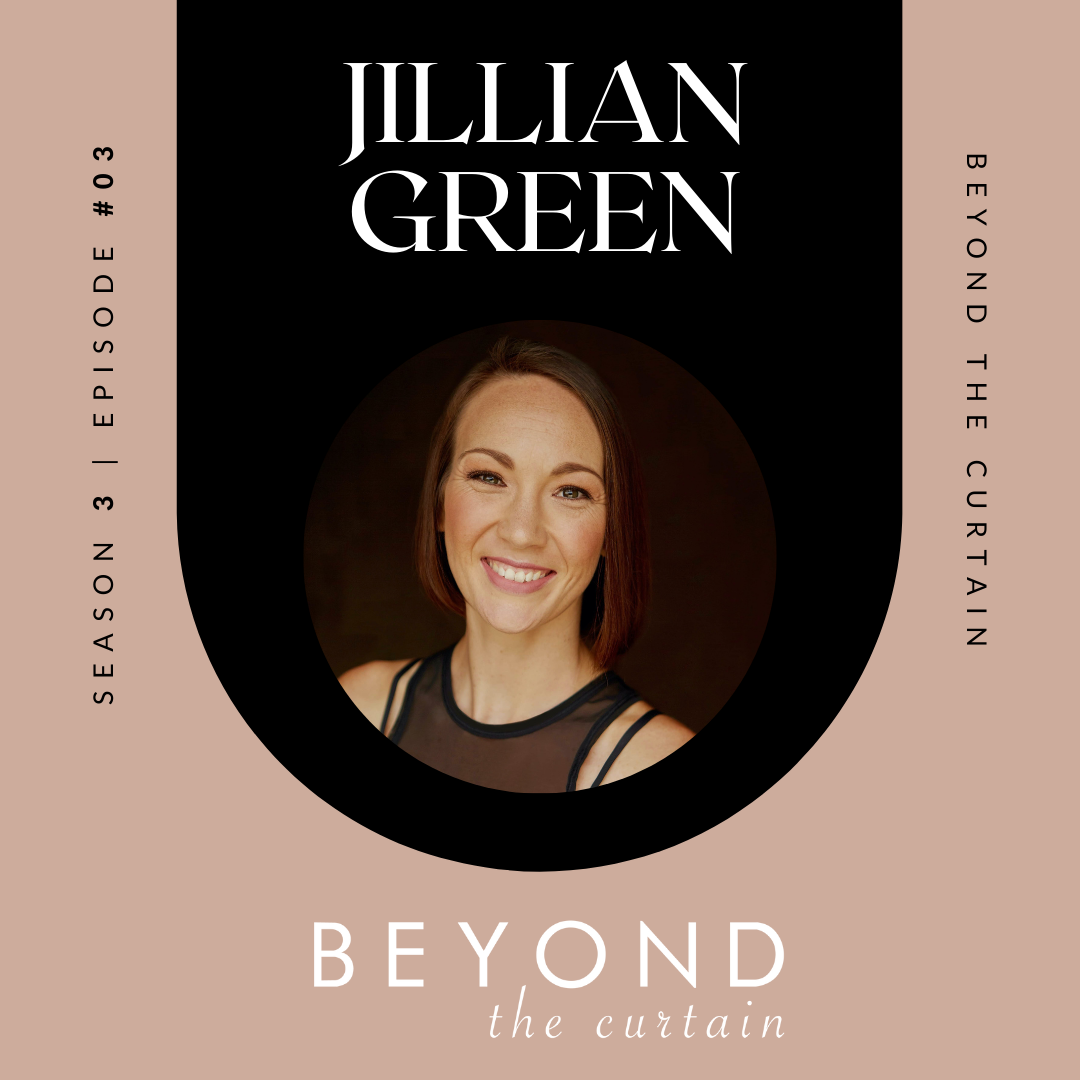 Beyond the CurtainJillian Green // Swinging, Chaperoning and Living with DiabetesToday we welcome the gorgeous, Jillian Green.
Jillian made her professional musical theatre debut as an original Australian cast member in the Queen musical, We Will Rock You, touring Australia & Japan (LWAA).
She was an original cast member and Assistant Dance Captain in Baz Luhrmann’s global premier of Strictly Ballroom - The Musical (Global Creatures) and completed both the Australian and Japan tours of Singin in the Rain (Dainty) where again she took on the role of Assistant Dance Captain.
Other theatre credits include Chess – The Musical (TPC), Wicked (USJ), Now & Then (Michael Ralph), Dirty...2021-09-2835 min
Beyond the CurtainJillian Green // Swinging, Chaperoning and Living with DiabetesToday we welcome the gorgeous, Jillian Green.
Jillian made her professional musical theatre debut as an original Australian cast member in the Queen musical, We Will Rock You, touring Australia & Japan (LWAA).
She was an original cast member and Assistant Dance Captain in Baz Luhrmann’s global premier of Strictly Ballroom - The Musical (Global Creatures) and completed both the Australian and Japan tours of Singin in the Rain (Dainty) where again she took on the role of Assistant Dance Captain.
Other theatre credits include Chess – The Musical (TPC), Wicked (USJ), Now & Then (Michael Ralph), Dirty...2021-09-2835 min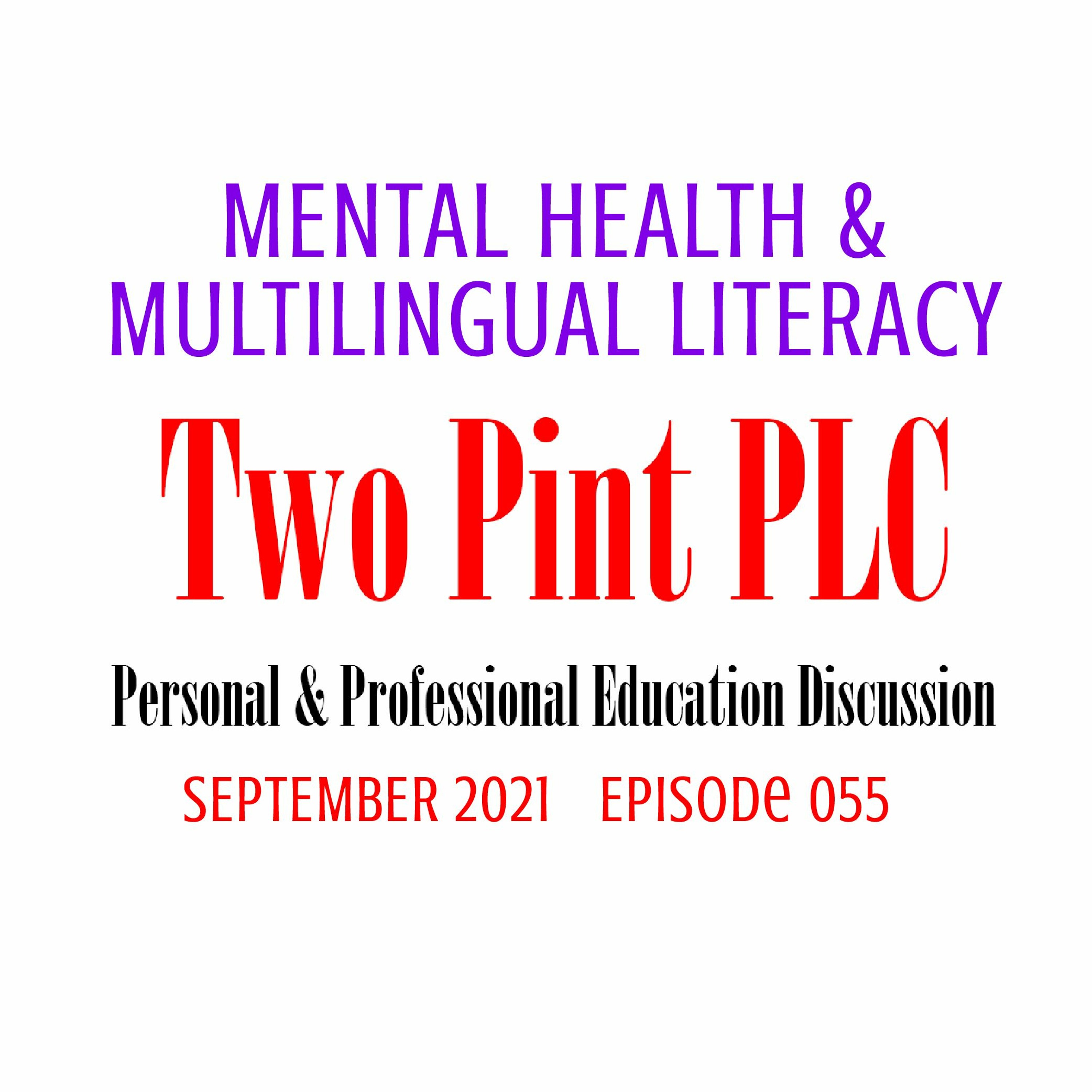 Two Pint PLC055 Mental Health & Multilingual LiteracyStarting another school year with pandemic concerns rising again, it’s important to address student mental wellness as a classroom goal. We read a national survey that asked students how they feel about school, both at the moment and as they remember it. The results give us concrete opportunities to support student wellness this fall.
Later, we read a design-based study that evaluated a culturally sustaining approach to multilingual literacy. This example shows how to help students reach reading AND content goals.2021-09-1344 min
Two Pint PLC055 Mental Health & Multilingual LiteracyStarting another school year with pandemic concerns rising again, it’s important to address student mental wellness as a classroom goal. We read a national survey that asked students how they feel about school, both at the moment and as they remember it. The results give us concrete opportunities to support student wellness this fall.
Later, we read a design-based study that evaluated a culturally sustaining approach to multilingual literacy. This example shows how to help students reach reading AND content goals.2021-09-1344 min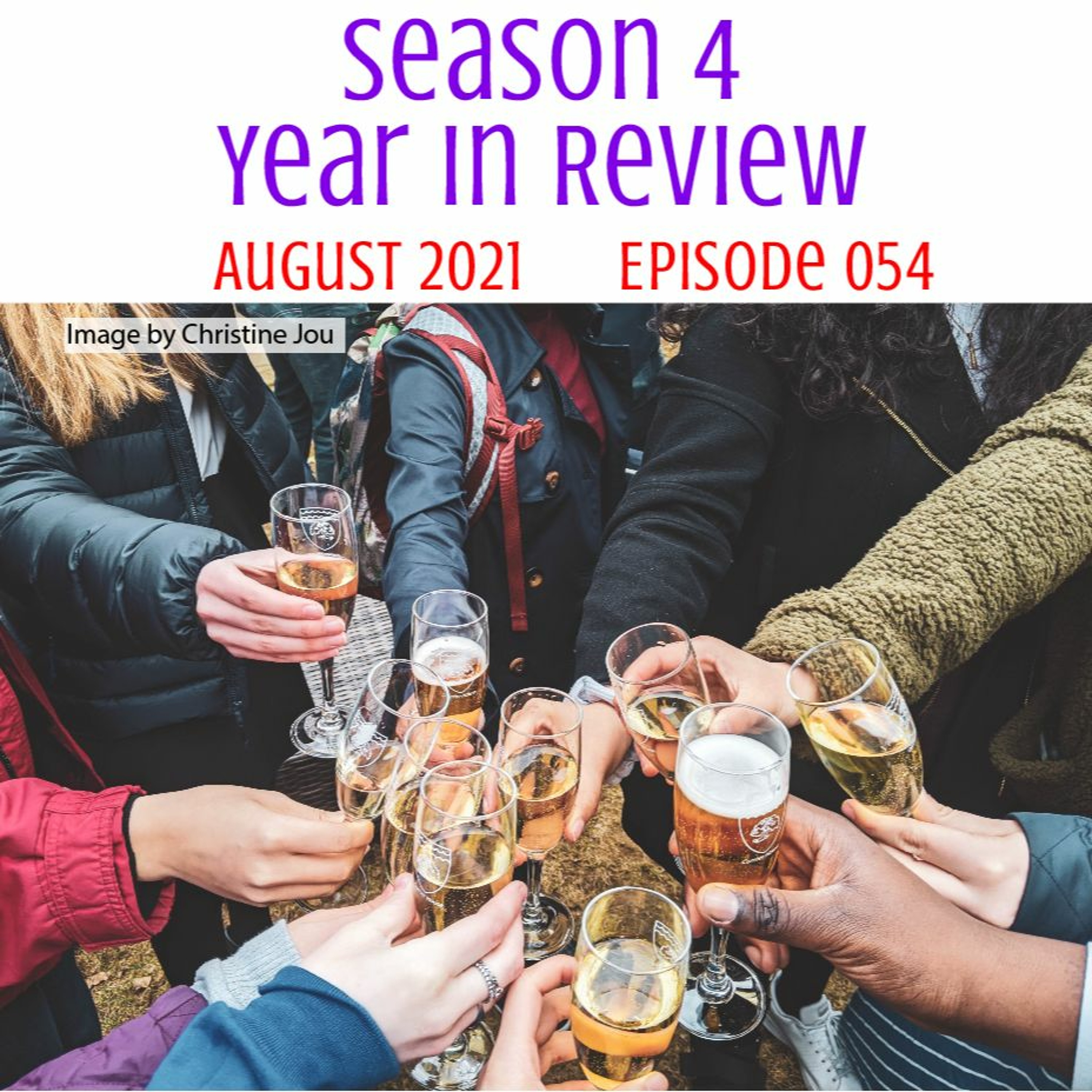 Two Pint PLC054 Season 4 Year In ReviewThis month we reflect on our year of reading scholarship and growing as humans. First we’ll return to the segments we felt had the greatest impact on our practice and our thinking from the research we read.
Later, we’ll reflect specifically on our praxis. We share some of the changes we’re making in our classroom and in our study that is moving us toward our goals as education practitioners.
Finally, we’ll share a bit about how our lives are changing outside of school… and mark the 2021 recipient of the Mug of Honor.2021-08-1244 min
Two Pint PLC054 Season 4 Year In ReviewThis month we reflect on our year of reading scholarship and growing as humans. First we’ll return to the segments we felt had the greatest impact on our practice and our thinking from the research we read.
Later, we’ll reflect specifically on our praxis. We share some of the changes we’re making in our classroom and in our study that is moving us toward our goals as education practitioners.
Finally, we’ll share a bit about how our lives are changing outside of school… and mark the 2021 recipient of the Mug of Honor.2021-08-1244 min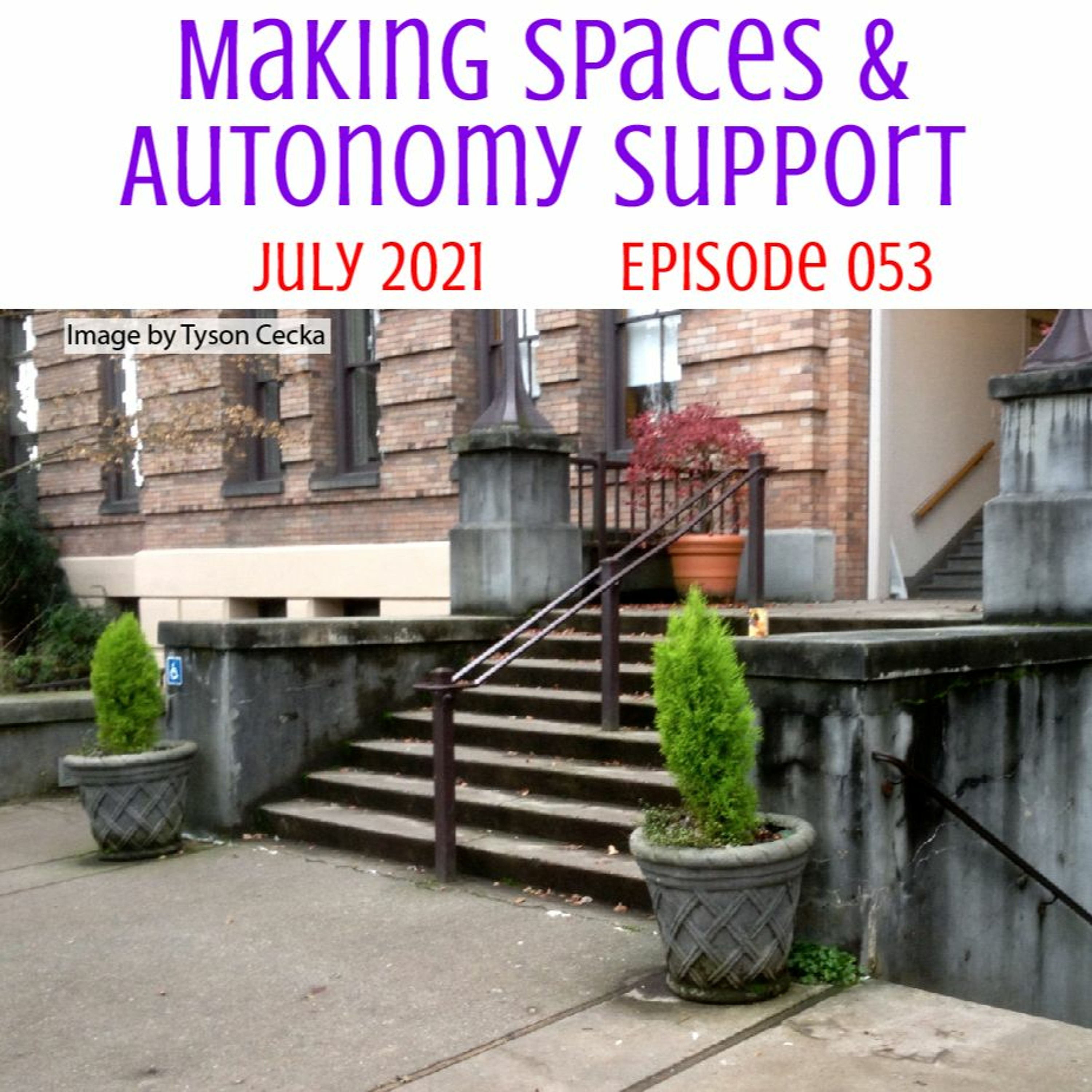 Two Pint PLC053 Making Spaces & Autonomy SupportThis month we are talking about race, and read a series of papers looking at the experience of Black students in US education.
First, we read an article that examined the story of “The Space Traders” as a starting point for imagining what it looks like to create Black Education Spaces for students to express fugitivity and create racial counterspaces.
Later, we read an empirical study that measured associations between autonomy-supportive teaching practices and student self-determination skill expression. They found connections between the way Black students perceive autonomy-support and their engagement & skill development.2021-07-1244 min
Two Pint PLC053 Making Spaces & Autonomy SupportThis month we are talking about race, and read a series of papers looking at the experience of Black students in US education.
First, we read an article that examined the story of “The Space Traders” as a starting point for imagining what it looks like to create Black Education Spaces for students to express fugitivity and create racial counterspaces.
Later, we read an empirical study that measured associations between autonomy-supportive teaching practices and student self-determination skill expression. They found connections between the way Black students perceive autonomy-support and their engagement & skill development.2021-07-1244 min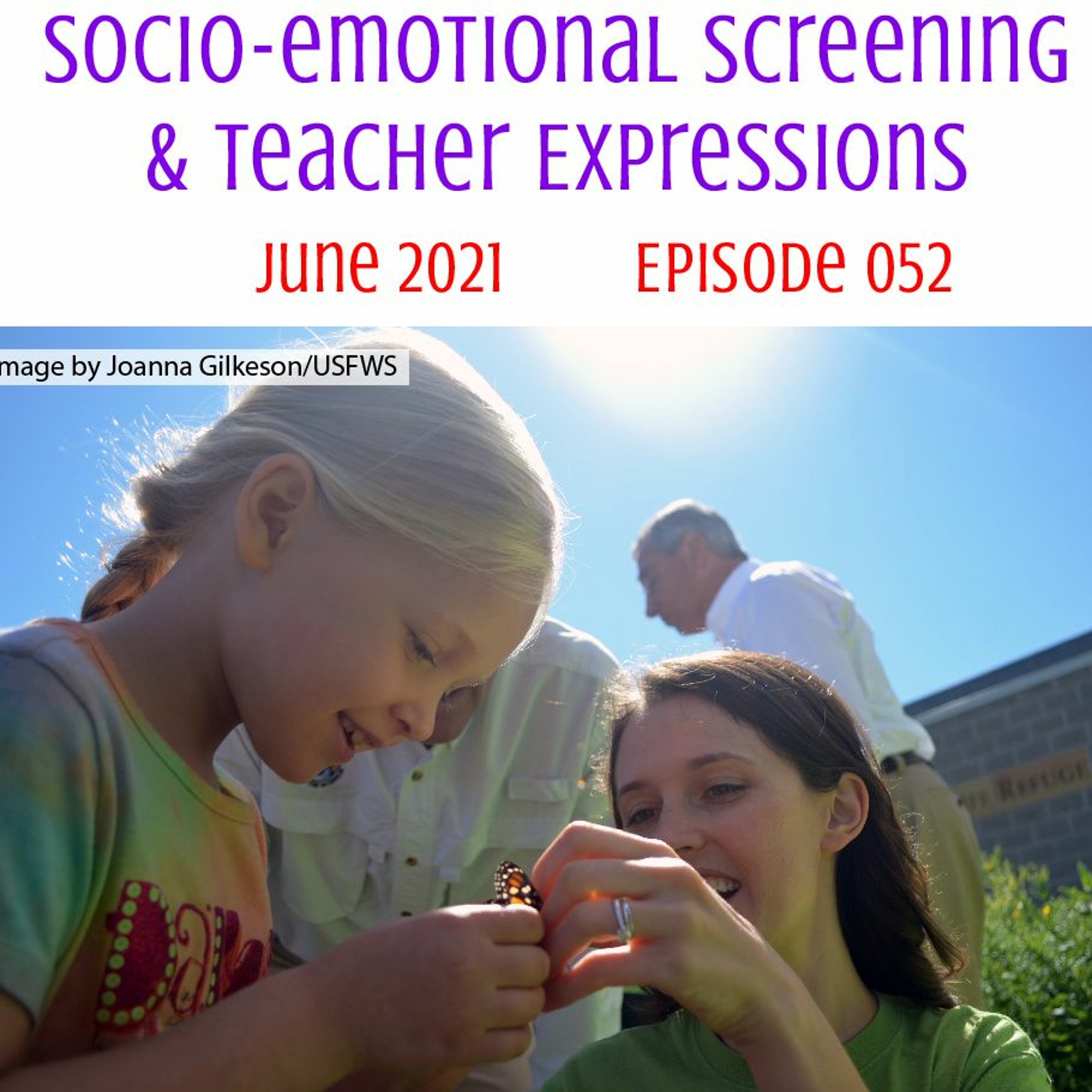 Two Pint PLC052 Socio - Emotional Screening & Teacher ExpressionsStudent social, emotional, and behavior development will be a critical consideration for teachers returning to physical classrooms in the fall. We read a national study examining the various methods schools use to screen students for social, emotional, and behavioral needs. Universal screening is still rare in the US, but its impacts are considerable.
Later, we discuss the emotional display rules for teachers. How are we expected to show, or not show, our emotions with students or colleagues? We read how the rules are not the same for everyone.2021-06-1244 min
Two Pint PLC052 Socio - Emotional Screening & Teacher ExpressionsStudent social, emotional, and behavior development will be a critical consideration for teachers returning to physical classrooms in the fall. We read a national study examining the various methods schools use to screen students for social, emotional, and behavioral needs. Universal screening is still rare in the US, but its impacts are considerable.
Later, we discuss the emotional display rules for teachers. How are we expected to show, or not show, our emotions with students or colleagues? We read how the rules are not the same for everyone.2021-06-1244 min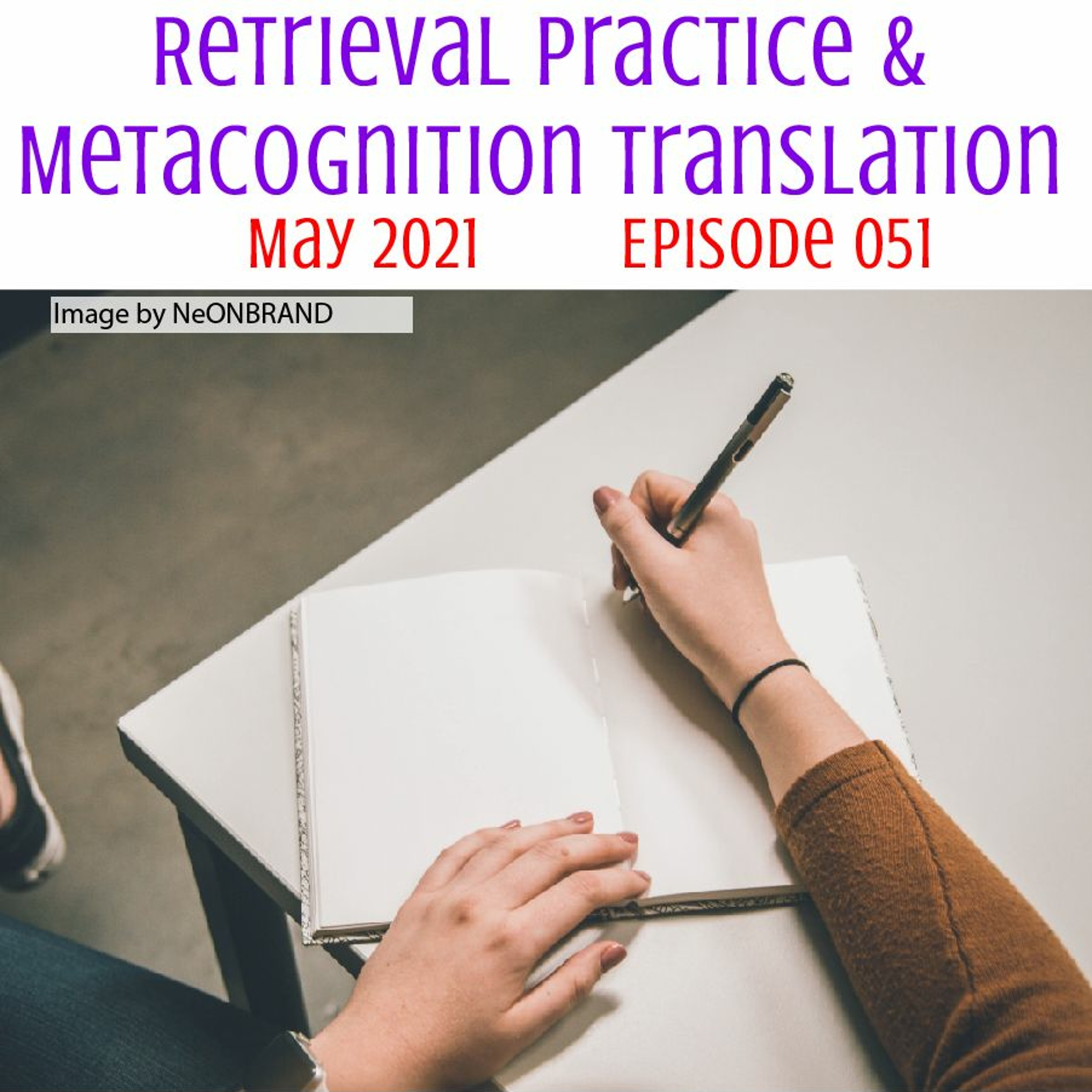 Two Pint PLC051 Retrieval Practice & Metacognition TranslationThis month we are thinking… about thinking. We read a review of the applied research on retrieval practice, which recognizes the difference between “learning” something and “knowing” something. We reflect on the ways this has played out in our classrooms, and what we can learn from recent studies for how to improve our use of the technique.
Later, we read a piece on translational research that makes recommendations for how to help students improve their ability to engage in metacognition.2021-05-1344 min
Two Pint PLC051 Retrieval Practice & Metacognition TranslationThis month we are thinking… about thinking. We read a review of the applied research on retrieval practice, which recognizes the difference between “learning” something and “knowing” something. We reflect on the ways this has played out in our classrooms, and what we can learn from recent studies for how to improve our use of the technique.
Later, we read a piece on translational research that makes recommendations for how to help students improve their ability to engage in metacognition.2021-05-1344 min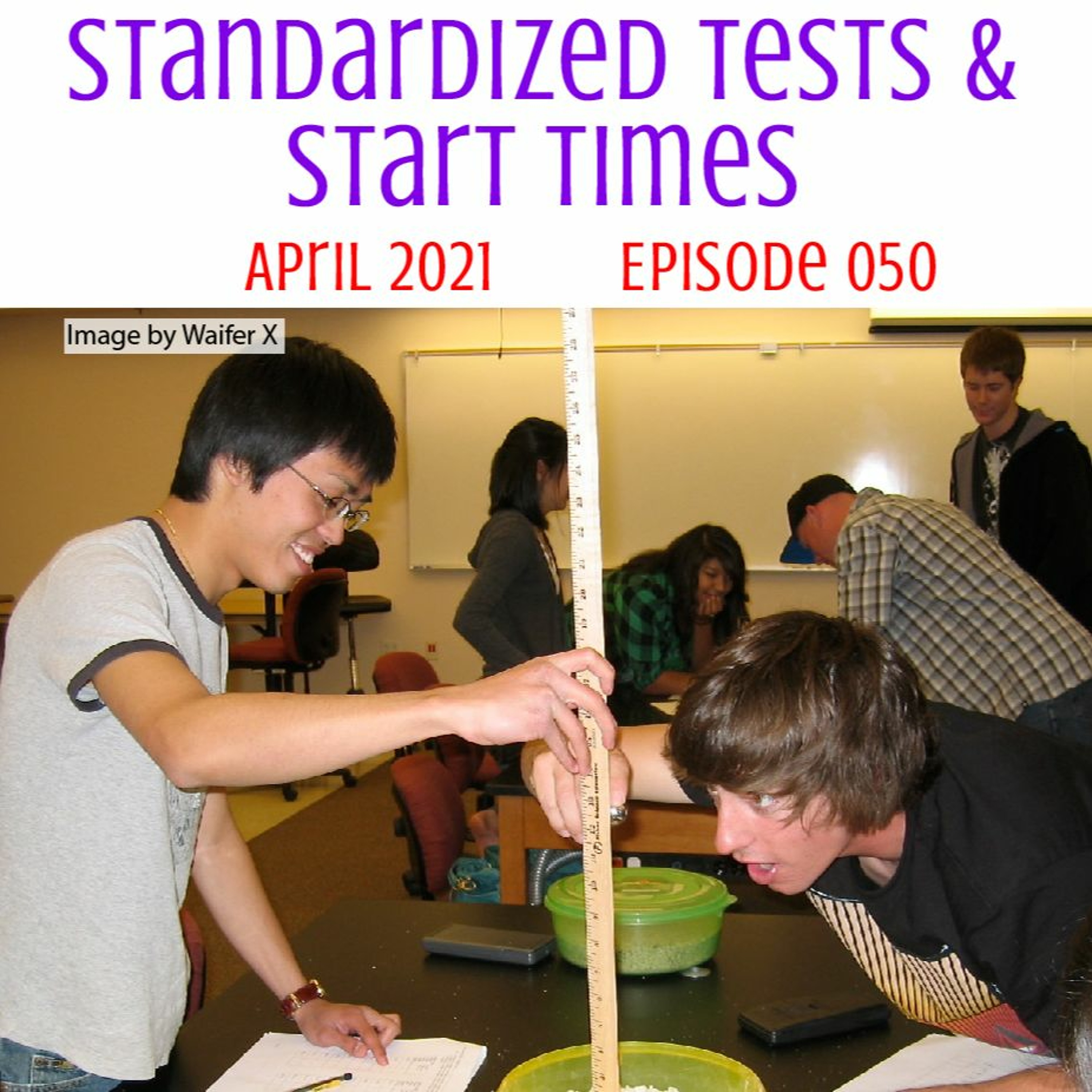 Two Pint PLC050 Standardized Tests & Start TimesStandardized testing is happening again this year. Researchers are talking about how to use the data more responsibly. We read an advising memo that describes some of the common problems with comparing testing data from this year to past years, so we can properly recognize the progress students have made this year.
Later, we discuss several studies that look at the impact later high school start times have on a variety of outcomes for student achievement and community health.
Finally, we talk In Your Classroom to think about our personal definition of success after a very difficult year.2021-04-1344 min
Two Pint PLC050 Standardized Tests & Start TimesStandardized testing is happening again this year. Researchers are talking about how to use the data more responsibly. We read an advising memo that describes some of the common problems with comparing testing data from this year to past years, so we can properly recognize the progress students have made this year.
Later, we discuss several studies that look at the impact later high school start times have on a variety of outcomes for student achievement and community health.
Finally, we talk In Your Classroom to think about our personal definition of success after a very difficult year.2021-04-1344 min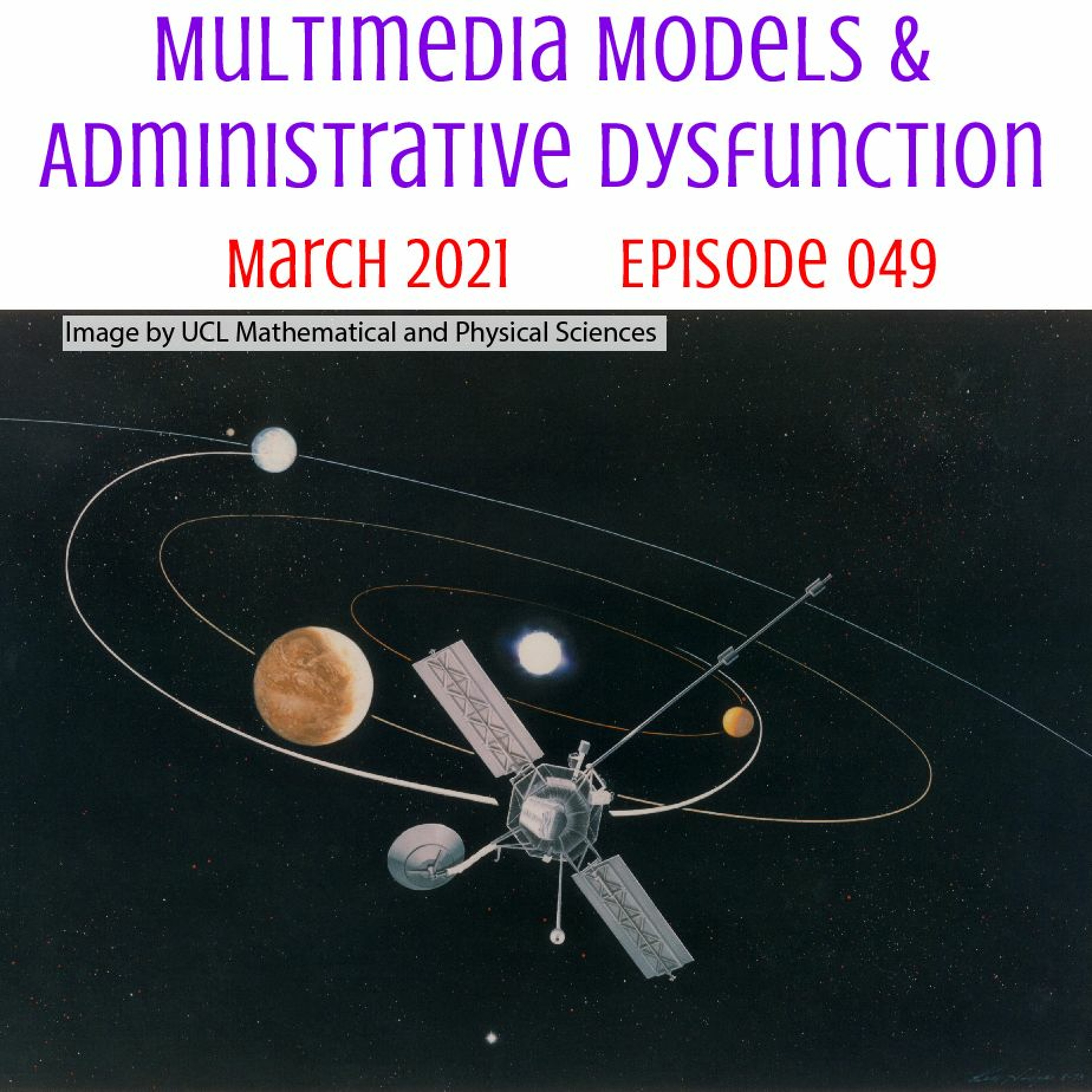 Two Pint PLC049 Multimedia Models & Administrative DysfunctionImages and animations offer tools to visualize our content, but must strike a balance between ease-of-use and ability to prompt thinking. We read a study that tested the impact of prior knowledge and multimedia format on learning outcomes.
Later, we read a case study about an administrator navigating a toxic district culture. Guest Jenn Binis joins us to examine the flaws in how the author presents the story, and how we can approach leadership more just foundation.2021-03-1246 min
Two Pint PLC049 Multimedia Models & Administrative DysfunctionImages and animations offer tools to visualize our content, but must strike a balance between ease-of-use and ability to prompt thinking. We read a study that tested the impact of prior knowledge and multimedia format on learning outcomes.
Later, we read a case study about an administrator navigating a toxic district culture. Guest Jenn Binis joins us to examine the flaws in how the author presents the story, and how we can approach leadership more just foundation.2021-03-1246 min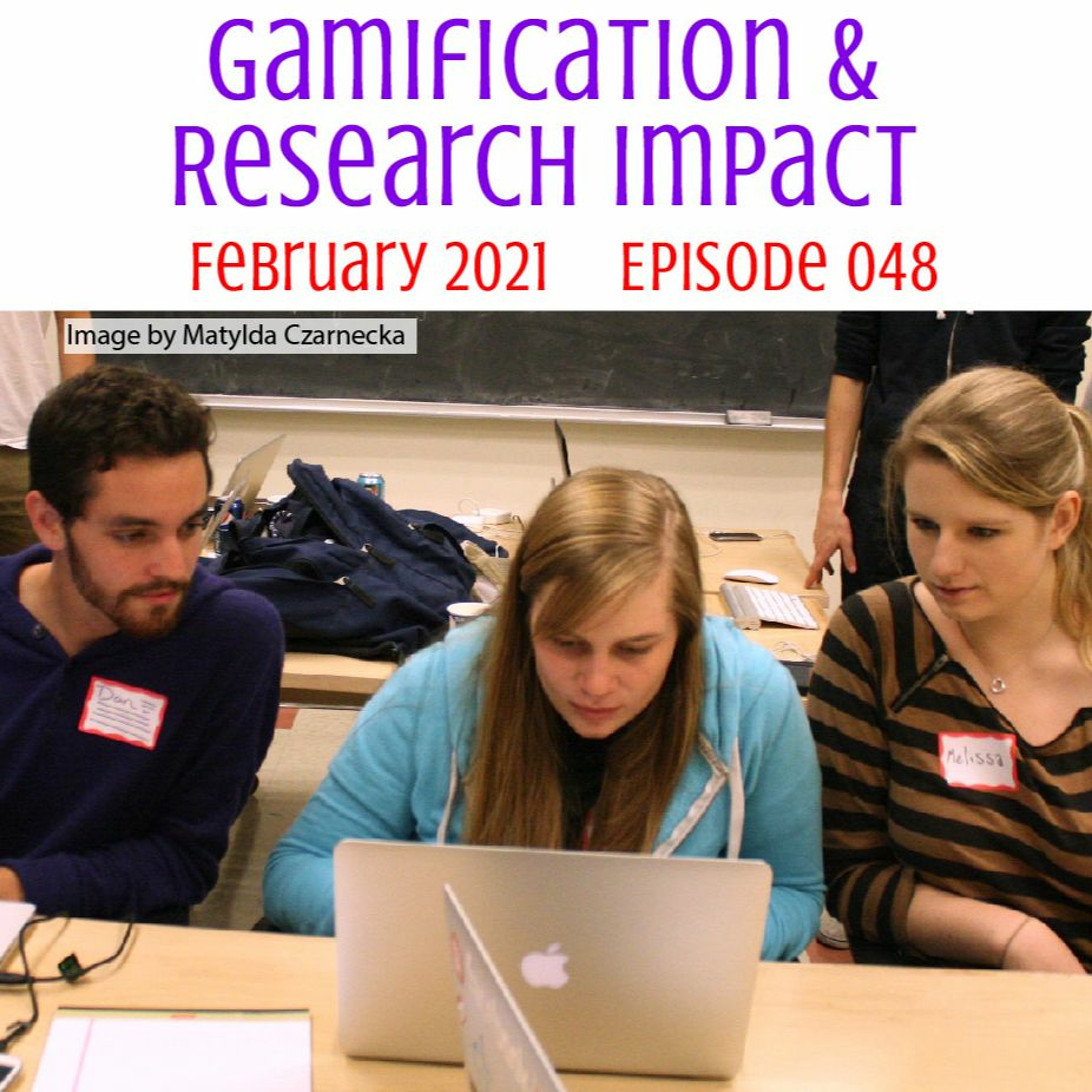 Two Pint PLC048 Gamification & Research ImpactGamification offers a fresh take on teaching design that offers increased engagement and improved learning. However, research to-date has been unclear about what components of gamification work. We read a meta-analysis that searches for which pieces of gamification can benefit your students.
Later, we turned to a study of how research is interpreted by teachers. They identify which measures are popular and which ones are effective. As teachers, we can recognize our preference so we can manage our bias as we read.2021-02-1244 min
Two Pint PLC048 Gamification & Research ImpactGamification offers a fresh take on teaching design that offers increased engagement and improved learning. However, research to-date has been unclear about what components of gamification work. We read a meta-analysis that searches for which pieces of gamification can benefit your students.
Later, we turned to a study of how research is interpreted by teachers. They identify which measures are popular and which ones are effective. As teachers, we can recognize our preference so we can manage our bias as we read.2021-02-1244 min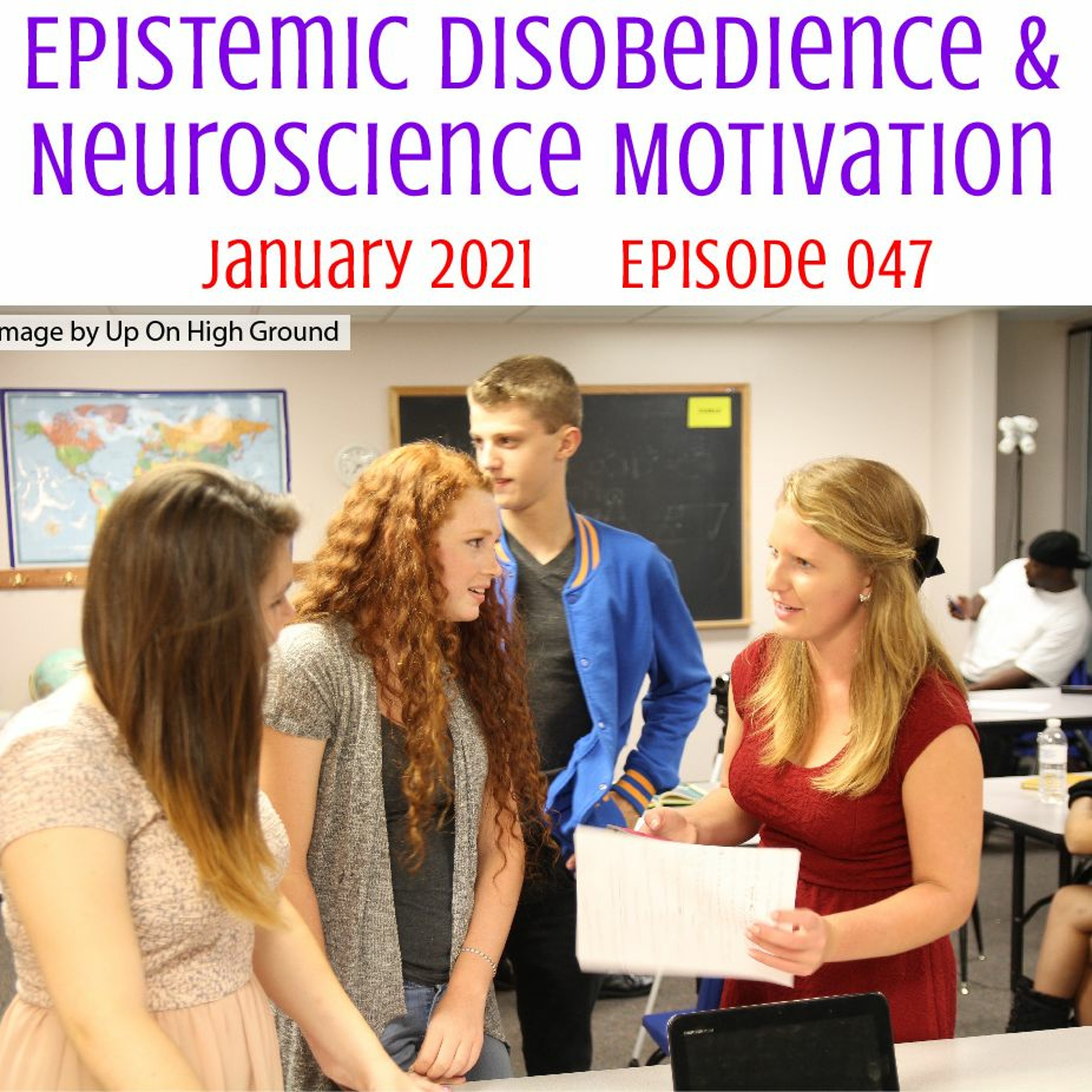 Two Pint PLC047 Epistemic Disobedience & Neuroscience Motivation047 Epistemic Disobedience & Neuroscience Motivation by Laurence Woodruff & Michael Ralph2021-01-0743 min
Two Pint PLC047 Epistemic Disobedience & Neuroscience Motivation047 Epistemic Disobedience & Neuroscience Motivation by Laurence Woodruff & Michael Ralph2021-01-0743 min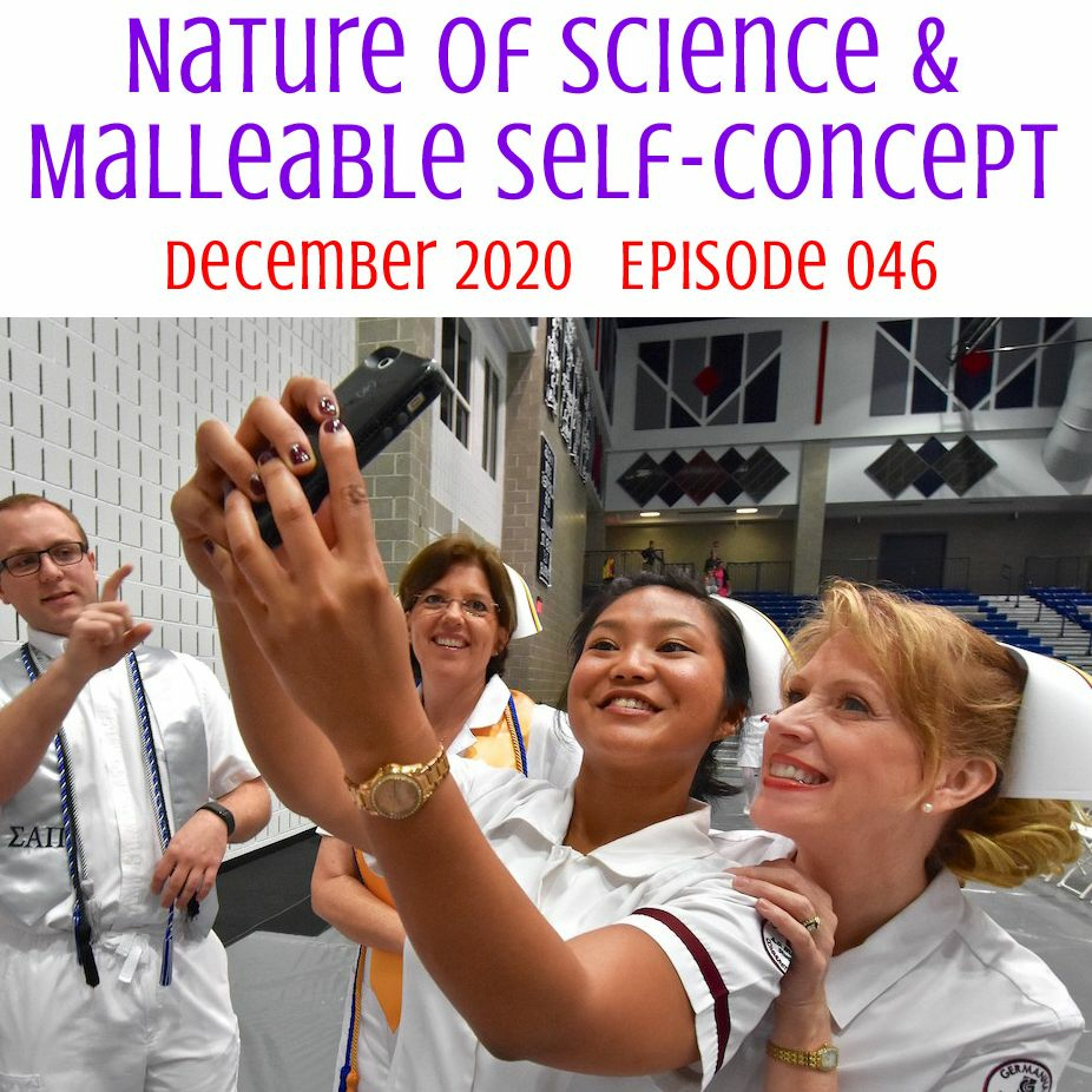 Two Pint PLC046 Nature Of Science & Malleable Self - ConceptScience communication has been turned upside down by the explosion of popularity of social media platforms. We read a reconceptualization of nature-of-science education for the social media age. What is our job as teachers, of any content area, to prepare our students to be responsible consumers of science as citizens?
Later, we turned to the role of a person’s self-concept in shaping how the interpret information and engage in learning. How much of our students’ self-concept can we influence as teachers, and what can we do to help students see themselves as successful learners?2020-12-1343 min
Two Pint PLC046 Nature Of Science & Malleable Self - ConceptScience communication has been turned upside down by the explosion of popularity of social media platforms. We read a reconceptualization of nature-of-science education for the social media age. What is our job as teachers, of any content area, to prepare our students to be responsible consumers of science as citizens?
Later, we turned to the role of a person’s self-concept in shaping how the interpret information and engage in learning. How much of our students’ self-concept can we influence as teachers, and what can we do to help students see themselves as successful learners?2020-12-1343 min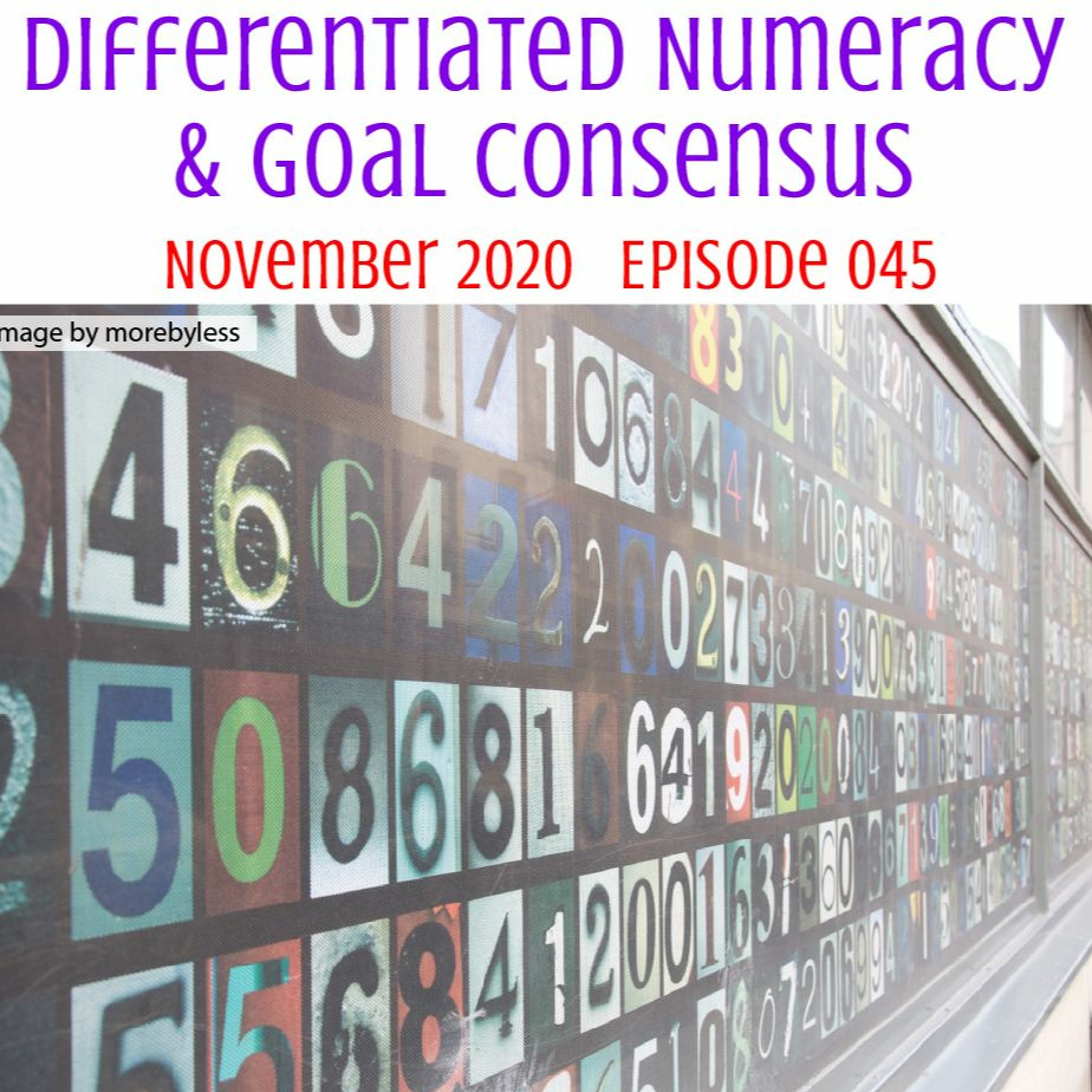 Two Pint PLC045 Differentiated Numeracy & Goal ConsensusThe importance of mathematical reasoning is visible in conversations from pandemics to politics. Sarah Dolence joins us to discuss how a numeracy framework developed for citizens can inform math instruction for students.
Later, we read research connecting instructional choices to student perceptions of classroom goal structures. From tasks to evaluations, are we incentivizing growth?
Finally, Sarah shares her experience teaching to a hybrid classroom of simultaneous in-person and remote students.2020-11-1244 min
Two Pint PLC045 Differentiated Numeracy & Goal ConsensusThe importance of mathematical reasoning is visible in conversations from pandemics to politics. Sarah Dolence joins us to discuss how a numeracy framework developed for citizens can inform math instruction for students.
Later, we read research connecting instructional choices to student perceptions of classroom goal structures. From tasks to evaluations, are we incentivizing growth?
Finally, Sarah shares her experience teaching to a hybrid classroom of simultaneous in-person and remote students.2020-11-1244 min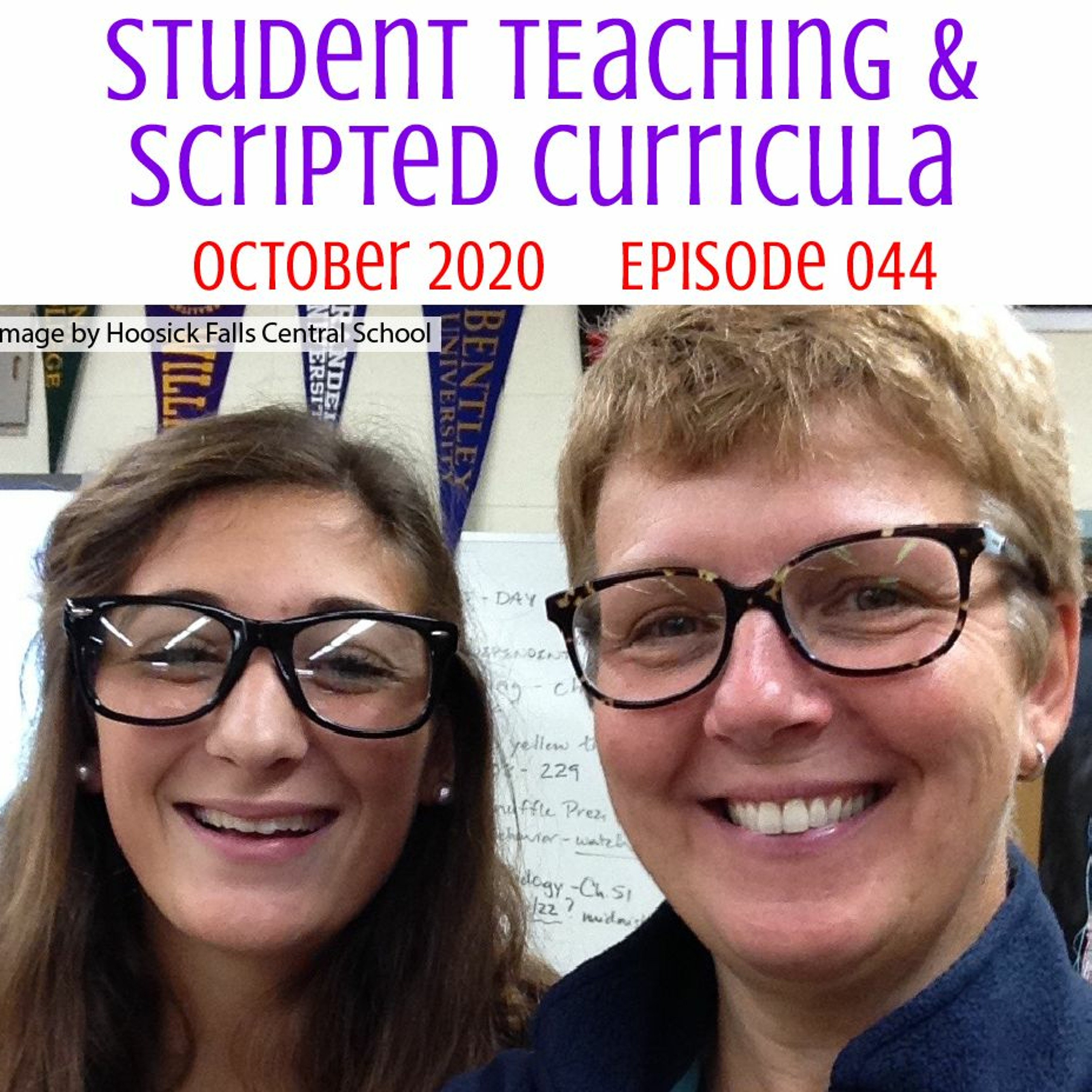 Two Pint PLC044 Student Teaching And Scripted CurriculaThe future of teaching depends on training future educators, but pairing student teachers with effective veterans can be challenging. New research allays some fears from veteran teachers by showing that taking a student teacher does not negatively impact classroom outcomes.
Later, we explore a critique of scripted curricula that shows their inconsistency with democratic values… even at a theoretical level.
Finally, we consider our options to build community in the waiting time before Zoom call starts.2020-10-1243 min
Two Pint PLC044 Student Teaching And Scripted CurriculaThe future of teaching depends on training future educators, but pairing student teachers with effective veterans can be challenging. New research allays some fears from veteran teachers by showing that taking a student teacher does not negatively impact classroom outcomes.
Later, we explore a critique of scripted curricula that shows their inconsistency with democratic values… even at a theoretical level.
Finally, we consider our options to build community in the waiting time before Zoom call starts.2020-10-1243 min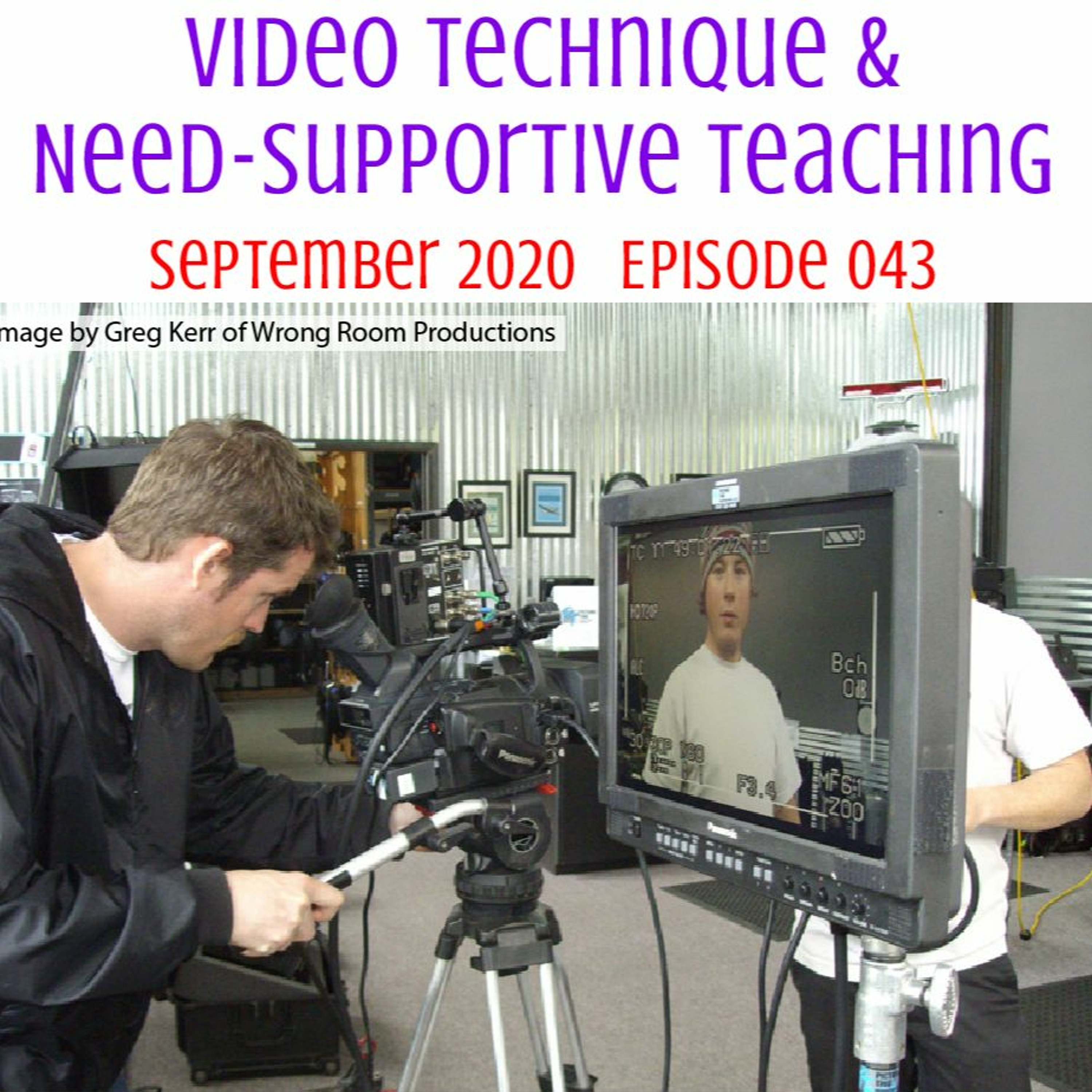 Two Pint PLC043 Video Technique & Need - Supportive TeachingWith many schools beginning the fall in remote or hybrid settings, we’re still thinking about digital teaching. Research on filming techniques shows how your camera and editing choices impact student retention and understanding.
Later, we read about a new model for need-supportive teaching. Three essential elements build an engaging and productive classroom.
Finally, we reflect on the role of teacher judgement in that need-supportive model.2020-09-1344 min
Two Pint PLC043 Video Technique & Need - Supportive TeachingWith many schools beginning the fall in remote or hybrid settings, we’re still thinking about digital teaching. Research on filming techniques shows how your camera and editing choices impact student retention and understanding.
Later, we read about a new model for need-supportive teaching. Three essential elements build an engaging and productive classroom.
Finally, we reflect on the role of teacher judgement in that need-supportive model.2020-09-1344 min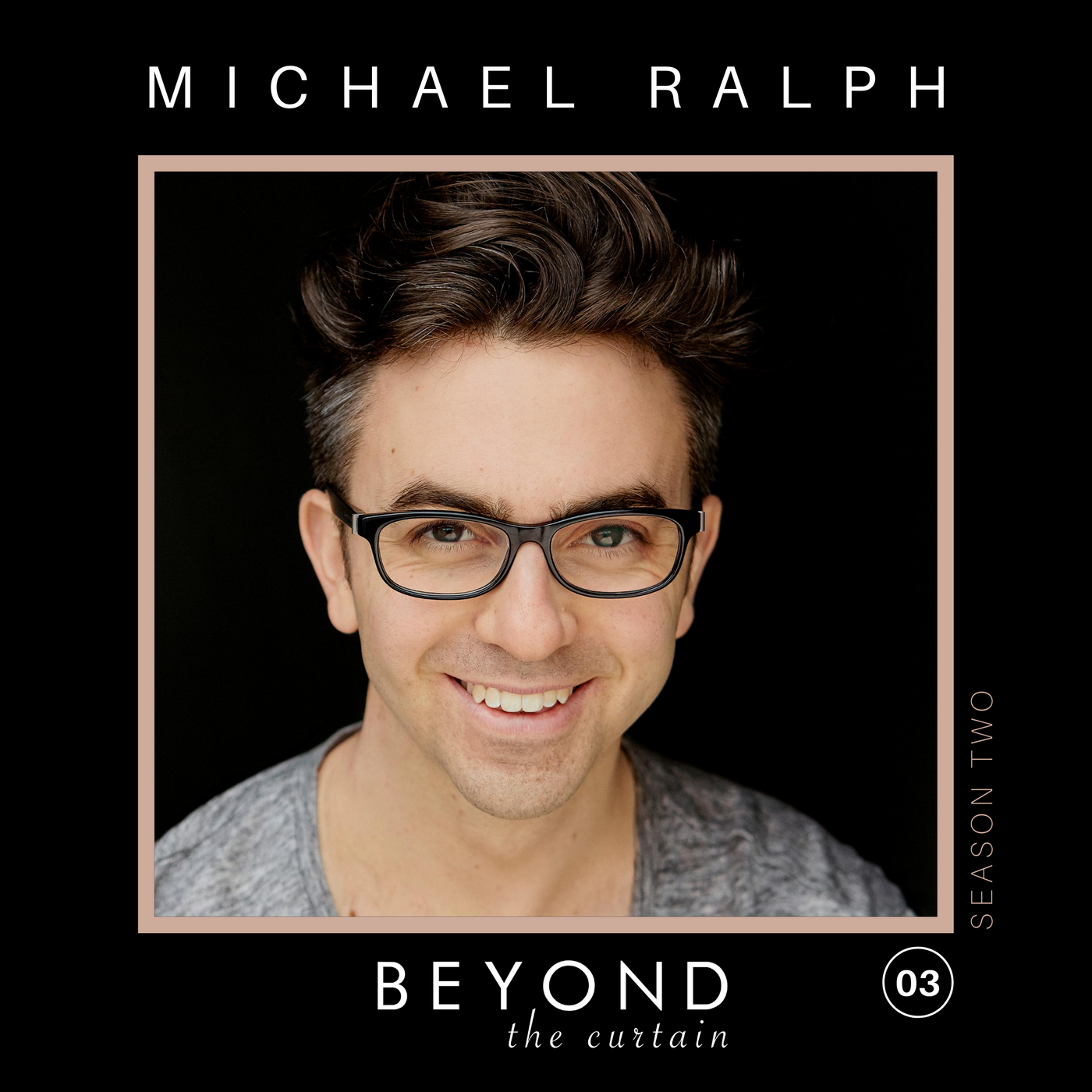 Beyond the CurtainMichael Ralph // From Playing Theatre to Creating Onstage MagicToday on the podcast I bring you the supremely talented, intellectual and somewhat mysterious, Michael Ralph. I say mysterious as I have always thought Mikey is such a private person. It was such a joy to share this special chat with him where he generously shared details about his upbringing and personal experiences.
In this chat we discuss his childhood and upbringing in New Zealand, the climb to success as a Choreographer and Director in Australia, self producing his own work, the highlights and challenges of his career so far, plus loads of advice for budding performers and choreographers!
This...2020-08-2559 min
Beyond the CurtainMichael Ralph // From Playing Theatre to Creating Onstage MagicToday on the podcast I bring you the supremely talented, intellectual and somewhat mysterious, Michael Ralph. I say mysterious as I have always thought Mikey is such a private person. It was such a joy to share this special chat with him where he generously shared details about his upbringing and personal experiences.
In this chat we discuss his childhood and upbringing in New Zealand, the climb to success as a Choreographer and Director in Australia, self producing his own work, the highlights and challenges of his career so far, plus loads of advice for budding performers and choreographers!
This...2020-08-2559 min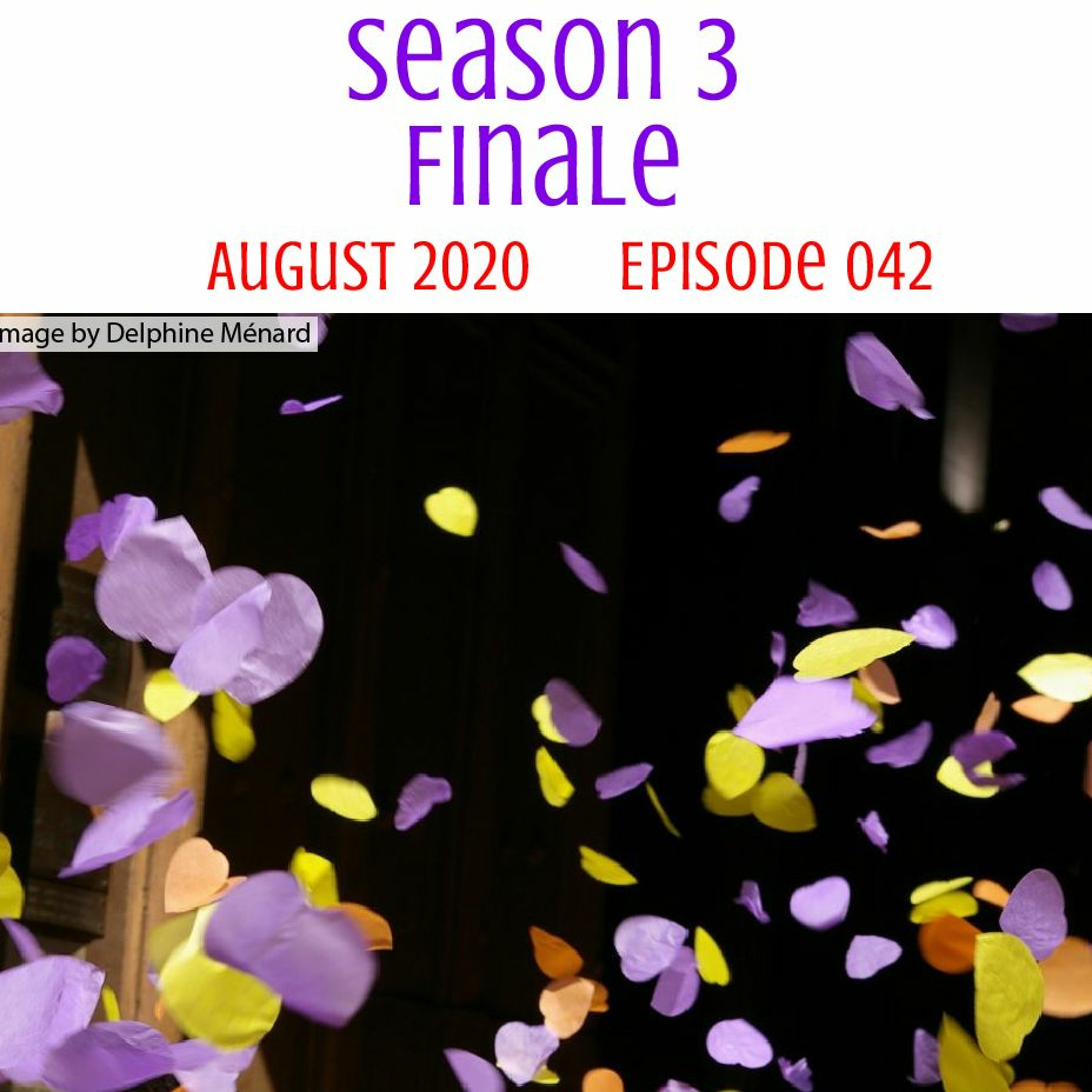 Two Pint PLC042 Season 3 FinaleThis month we’ll have our year in review! We’re looking back at the papers that impacted our thinking and our practice. We’ll also reflect on our personal journey as educators during an academic year unlike any other.2020-08-1244 min
Two Pint PLC042 Season 3 FinaleThis month we’ll have our year in review! We’re looking back at the papers that impacted our thinking and our practice. We’ll also reflect on our personal journey as educators during an academic year unlike any other.2020-08-1244 min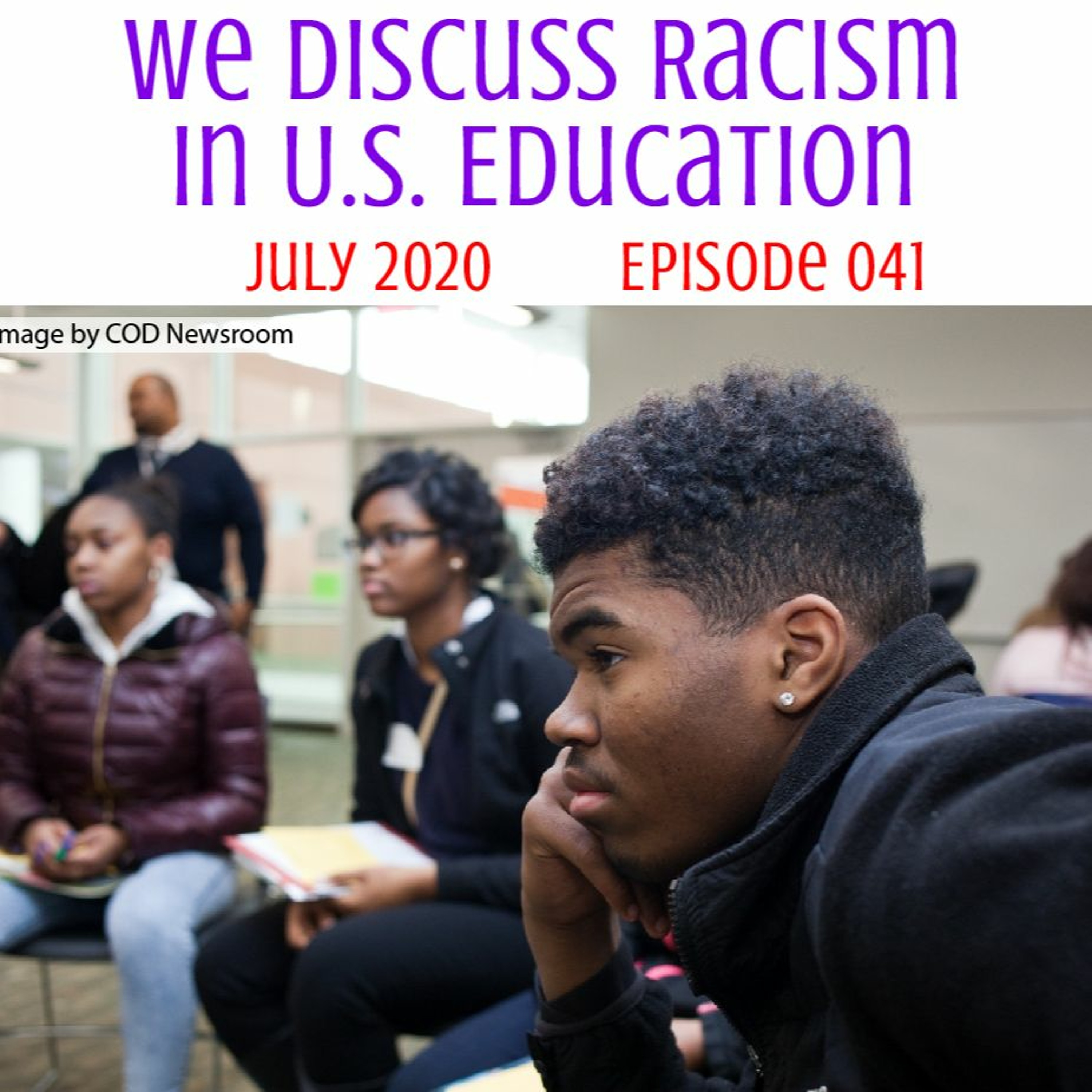 Two Pint PLC041 We Discuss How Racism Impacts StudentsThis month we’re talking about racism in US education.
Our first paper presents the experience of Black men who have been expelled from US schools. Their stories highlight systemic problems that produce a school-to-prison pipeline that we must work to dismantle.
Later, we read about gentrification of New York schools. Ties between whiteness and school resources undermines schools in Black communities. We must break this link and provide equitable funding.2020-07-1244 min
Two Pint PLC041 We Discuss How Racism Impacts StudentsThis month we’re talking about racism in US education.
Our first paper presents the experience of Black men who have been expelled from US schools. Their stories highlight systemic problems that produce a school-to-prison pipeline that we must work to dismantle.
Later, we read about gentrification of New York schools. Ties between whiteness and school resources undermines schools in Black communities. We must break this link and provide equitable funding.2020-07-1244 min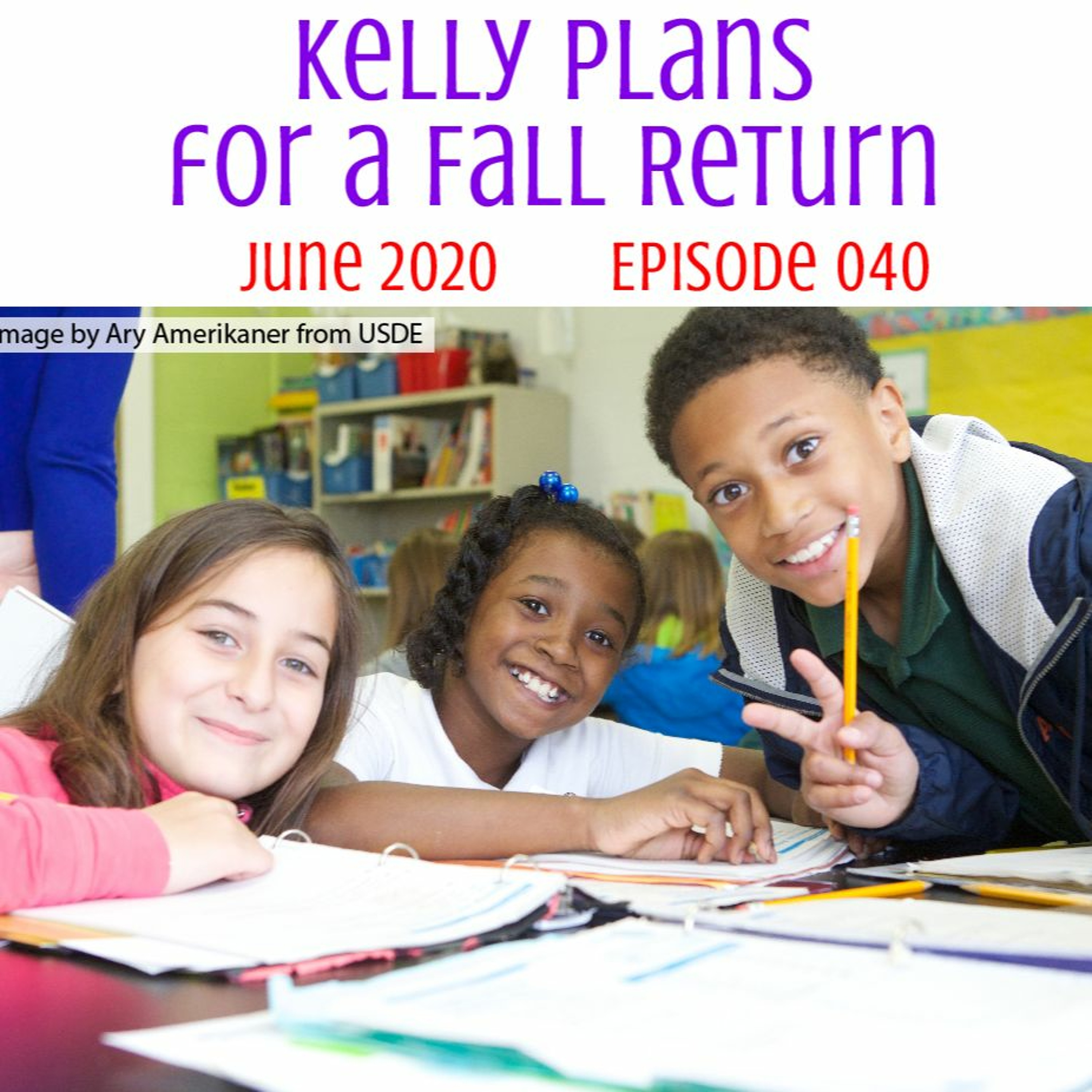 Two Pint PLC040 Kelly Plans For A Fall ReopeningAs our minds turn to plans for the fall, many districts are making “what if” plans for whether and how to return to in-person teaching. Guest host Kelly Kluthe brings guidelines for Missouri schools to consider how teachers can make use of safety recommendations in their classrooms.
Later, we read an article about using critical analysis of online teaching to create humanizing pedagogy. We look at how to approach making inclusive spaces for online learning.2020-06-1244 min
Two Pint PLC040 Kelly Plans For A Fall ReopeningAs our minds turn to plans for the fall, many districts are making “what if” plans for whether and how to return to in-person teaching. Guest host Kelly Kluthe brings guidelines for Missouri schools to consider how teachers can make use of safety recommendations in their classrooms.
Later, we read an article about using critical analysis of online teaching to create humanizing pedagogy. We look at how to approach making inclusive spaces for online learning.2020-06-1244 min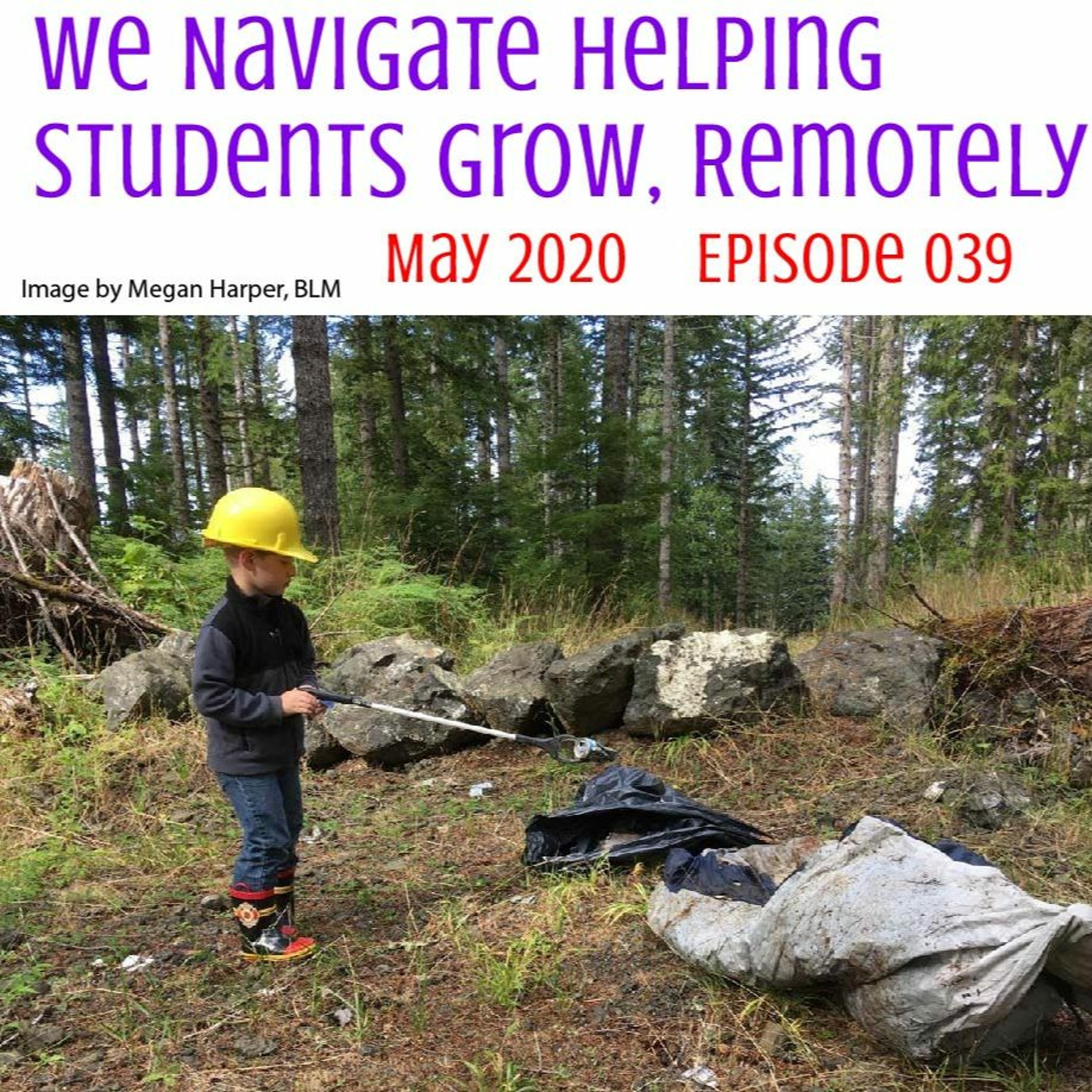 Two Pint PLC039 We Navigate Helping Students Grow, RemotelyOur second month of emergency remote teaching leaves us searching for ways to help our students grow in all the areas we value. We start by reading a paper that identifies connections between socio-emotional constructs, with ways to promote growth in executive function and citizenship together.
Later, we read a program guide to effectively planning remote field trips. Avoid common mistakes and find options for connecting with possible visitors to your remote classroom.
Finally, our Peer Review shares detailed feedback from authors of last month’s paper on award winning online instructors.2020-05-1240 min
Two Pint PLC039 We Navigate Helping Students Grow, RemotelyOur second month of emergency remote teaching leaves us searching for ways to help our students grow in all the areas we value. We start by reading a paper that identifies connections between socio-emotional constructs, with ways to promote growth in executive function and citizenship together.
Later, we read a program guide to effectively planning remote field trips. Avoid common mistakes and find options for connecting with possible visitors to your remote classroom.
Finally, our Peer Review shares detailed feedback from authors of last month’s paper on award winning online instructors.2020-05-1240 min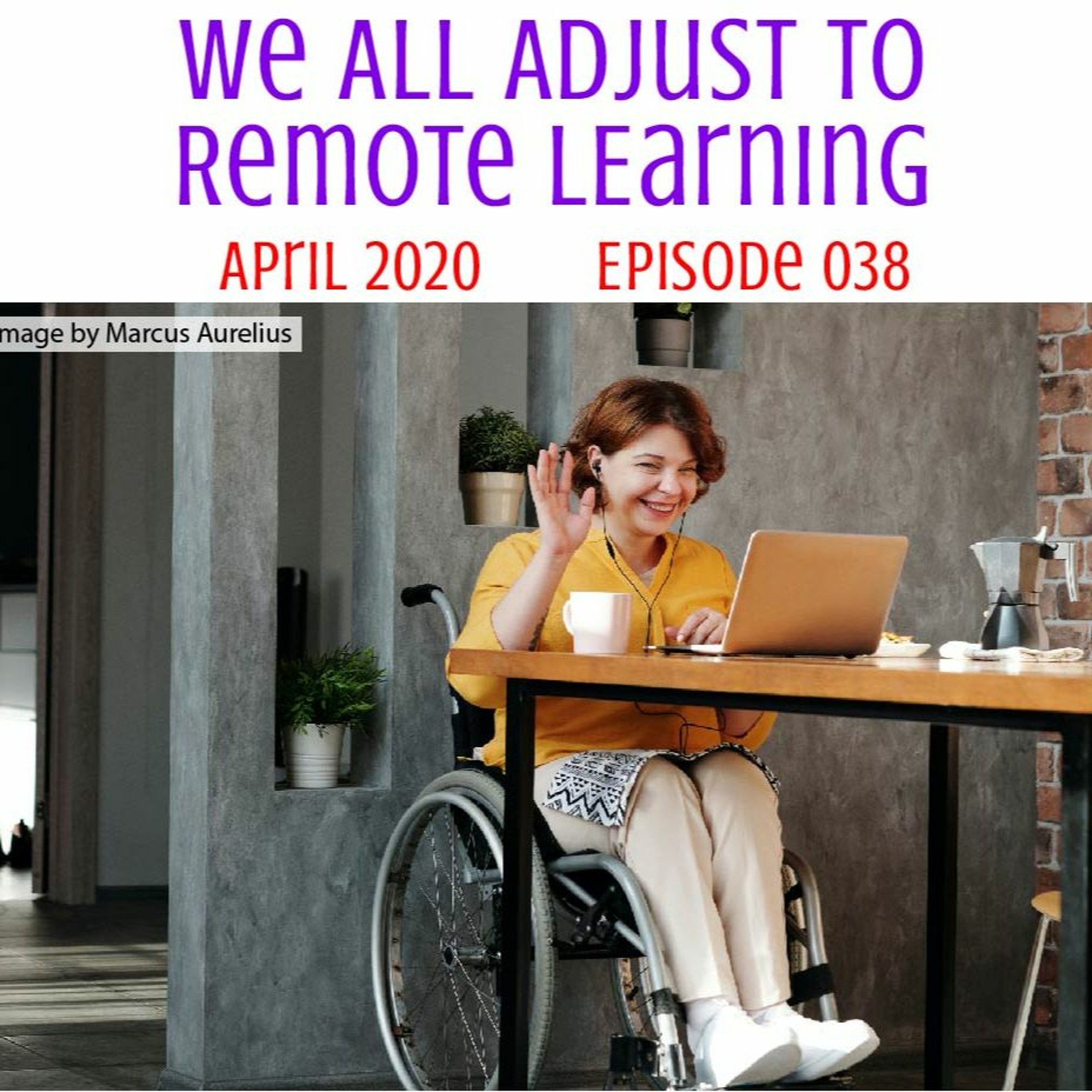 Two Pint PLC038 We All Adjust To Remote LearningLali DeRosier joins us as a guest host for this month’s look at online teaching. The global pandemic of COVID-19 is affecting communities around the world, and many teachers are thrust into remote learning with little warning.
First we read a study on the impact of interactive content and students-controlled challenge level. We look at how teachers can choose content to help their students stay engaged.
Later, we read a qualitative analysis of the stories of award winning online teachers. We find lessons from their experience to guide our own attempts at remote instruction.2020-04-1244 min
Two Pint PLC038 We All Adjust To Remote LearningLali DeRosier joins us as a guest host for this month’s look at online teaching. The global pandemic of COVID-19 is affecting communities around the world, and many teachers are thrust into remote learning with little warning.
First we read a study on the impact of interactive content and students-controlled challenge level. We look at how teachers can choose content to help their students stay engaged.
Later, we read a qualitative analysis of the stories of award winning online teachers. We find lessons from their experience to guide our own attempts at remote instruction.2020-04-1244 min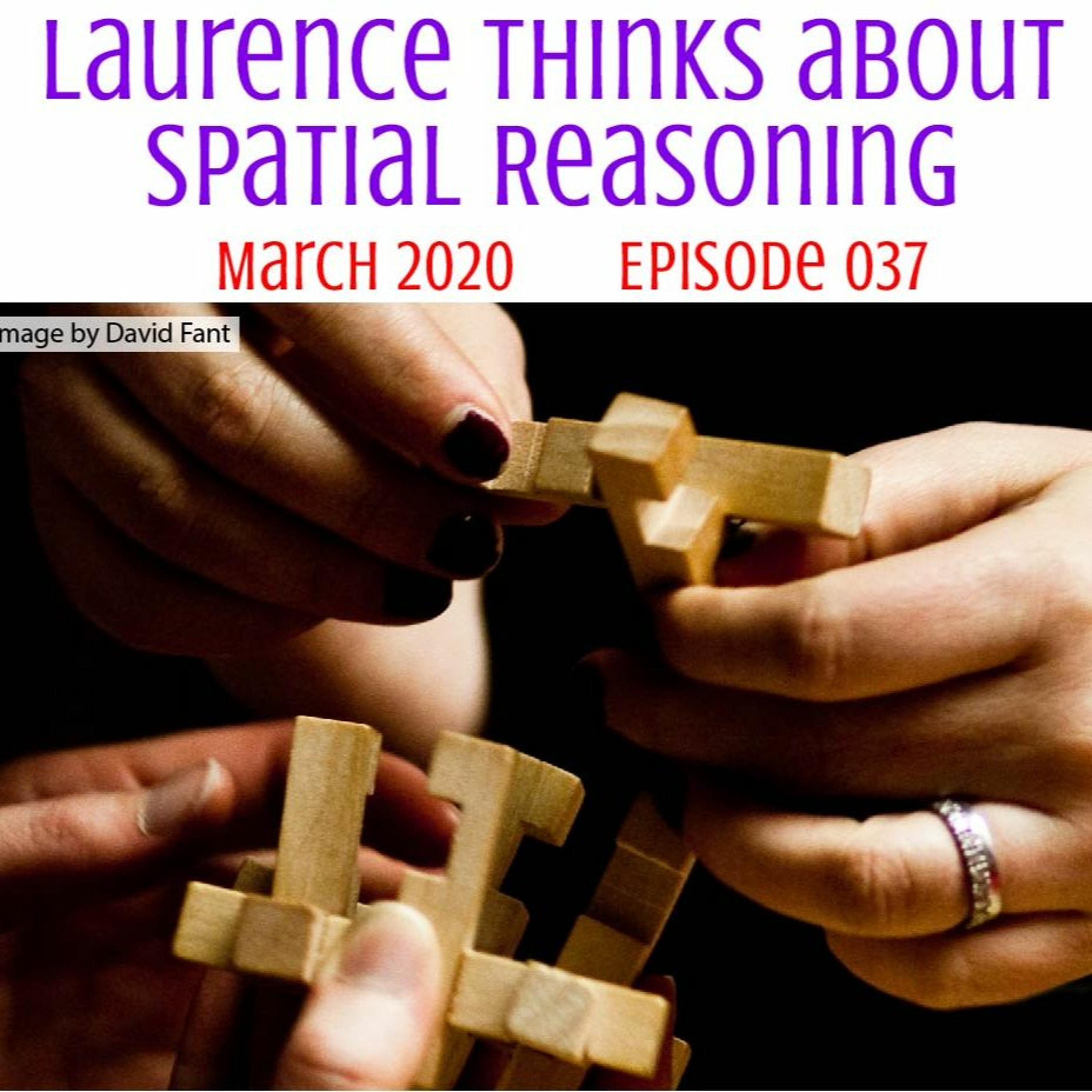 Two Pint PLC037 Laurence Thinks About Spatial ReasoningWe read a longitudinal study examining US gifted systems failing to identify students with spatial aptitude over the past 60 years. We search for the causes and consequences of undervaluing spatial reasoning, and identify classroom practices that support those students in our schools.
Later, we discuss ways to get the benefits of peer observation for teachers when observable colleagues are not readily available.
Finally, in a Mixed Bag we discuss a question from a listener who pushes us to dive into our assumptions about testing and teaching.2020-03-1242 min
Two Pint PLC037 Laurence Thinks About Spatial ReasoningWe read a longitudinal study examining US gifted systems failing to identify students with spatial aptitude over the past 60 years. We search for the causes and consequences of undervaluing spatial reasoning, and identify classroom practices that support those students in our schools.
Later, we discuss ways to get the benefits of peer observation for teachers when observable colleagues are not readily available.
Finally, in a Mixed Bag we discuss a question from a listener who pushes us to dive into our assumptions about testing and teaching.2020-03-1242 min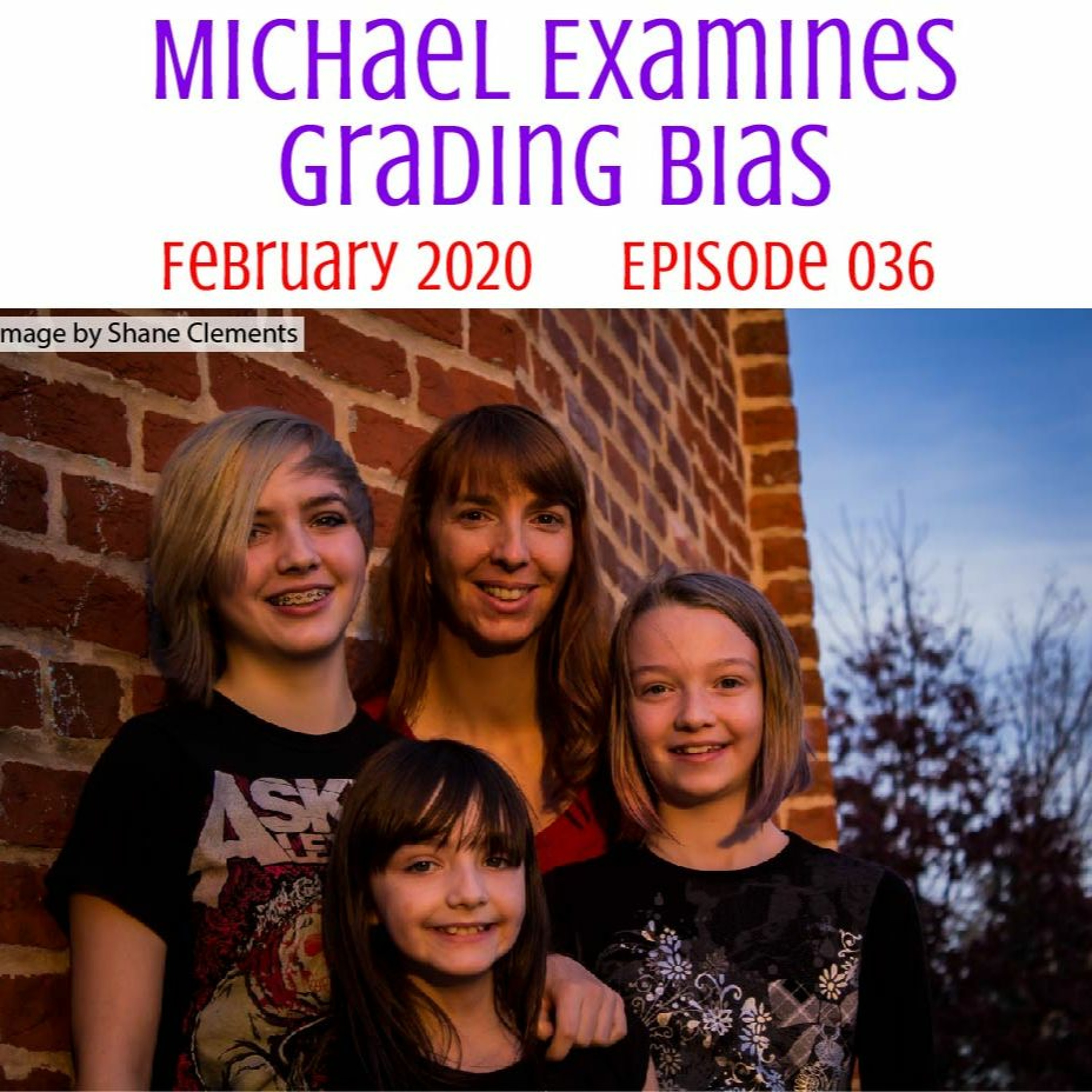 Two Pint PLC036 Michael Examines Weight BiasGrading always occurs in a social context. We’ll examine a study that measured how weight bias manifested when scoring writing samples. Work from overweight students was scored lower in some categories, but teachers believed bias was far less of an issue than their scoring revealed.
Later, we unpack research on the impact of subtle changes in prompting on participant success in a simple logic puzzle. The results show the importance of crafting assignments and assessments with a few essential elements.
Finally, we read commentary from an expert on helping research impact policy.2020-02-1444 min
Two Pint PLC036 Michael Examines Weight BiasGrading always occurs in a social context. We’ll examine a study that measured how weight bias manifested when scoring writing samples. Work from overweight students was scored lower in some categories, but teachers believed bias was far less of an issue than their scoring revealed.
Later, we unpack research on the impact of subtle changes in prompting on participant success in a simple logic puzzle. The results show the importance of crafting assignments and assessments with a few essential elements.
Finally, we read commentary from an expert on helping research impact policy.2020-02-1444 min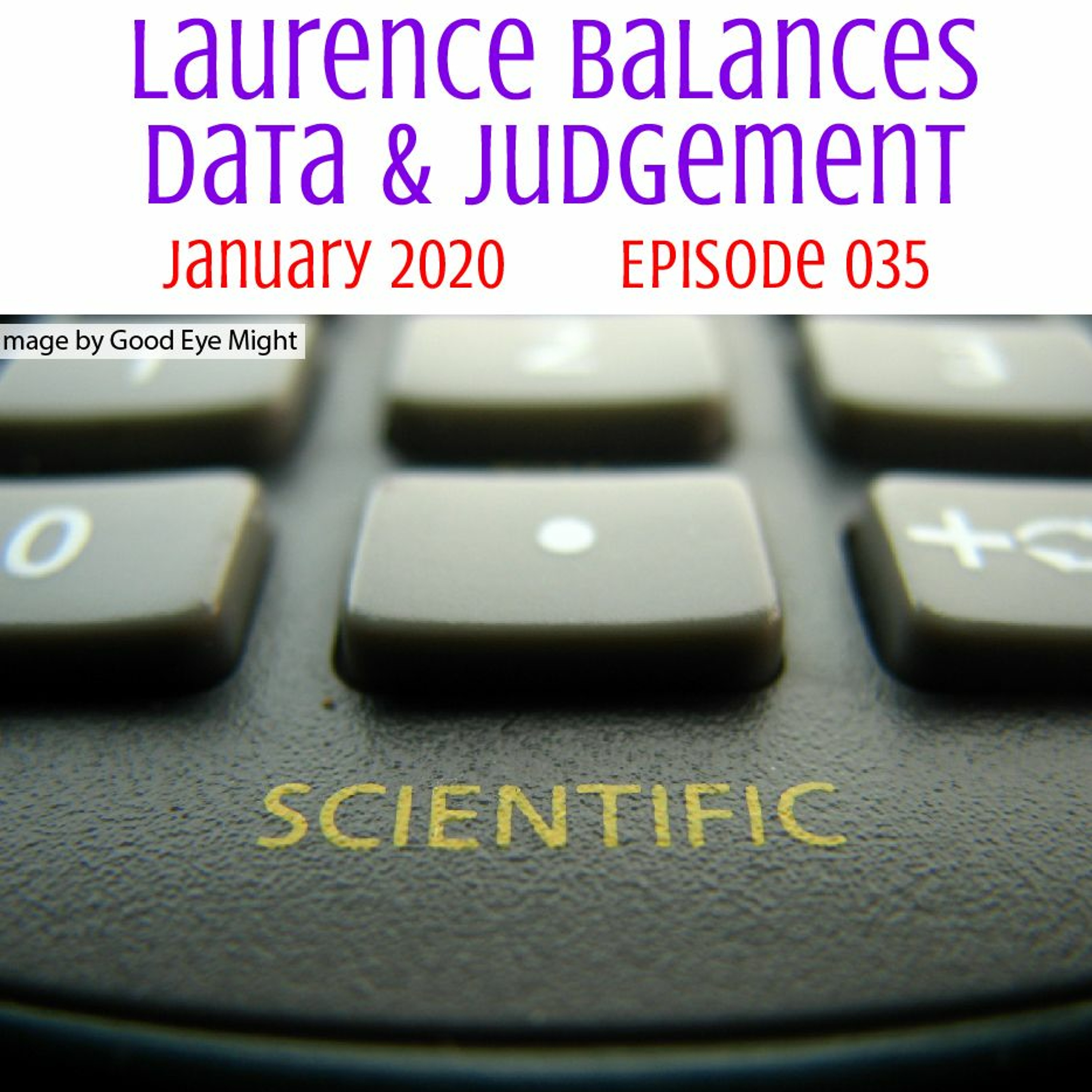 Two Pint PLC035 Laurence Balances Data And JudgementThe push for data-driven instruction can sometimes feel at odds with empowering educators to exercise their professional judgement. We read the story of one Kansas district that attempted to implement a new system for helping students. A push for data and numbers seemed to push out all the other sources of information, undermining their ability to help those students.
Later, we see a nation-wide bump in ADHD diagnoses for the youngest students who start school each year. This bump might be the result of a school age cut-off, rather than anything medical.
Finally, we get some book recommendations and context...2020-01-1244 min
Two Pint PLC035 Laurence Balances Data And JudgementThe push for data-driven instruction can sometimes feel at odds with empowering educators to exercise their professional judgement. We read the story of one Kansas district that attempted to implement a new system for helping students. A push for data and numbers seemed to push out all the other sources of information, undermining their ability to help those students.
Later, we see a nation-wide bump in ADHD diagnoses for the youngest students who start school each year. This bump might be the result of a school age cut-off, rather than anything medical.
Finally, we get some book recommendations and context...2020-01-1244 min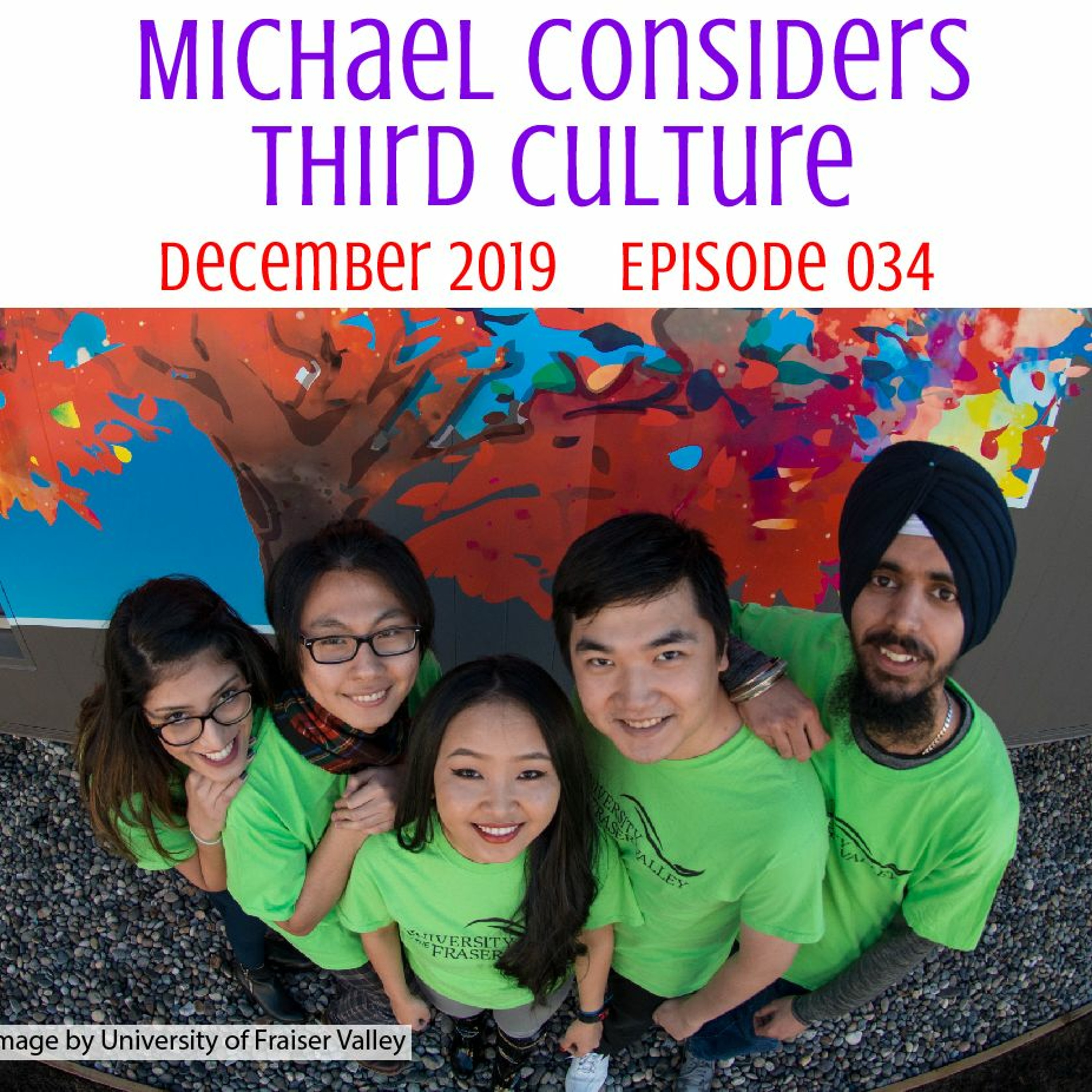 Two Pint PLC034 Michael Considers Third CultureIn our increasingly globalized world, ever more students are growing up immersed in multiple cultures throughout their childhood. These children can become “third culture kids”, young people who identify with a hybrid culture that is distinct from any of the places they’ve lived. We consider how teachers can be sensitive to their experience and supportive in their journey.
Later, we’ll read about Statway - a redesigned program that helps students engage in productive struggle and earn collegiate math credit faster and more consistently than a typical remedial program. We find lessons from their implementation that can be useful in any c...2019-12-1244 min
Two Pint PLC034 Michael Considers Third CultureIn our increasingly globalized world, ever more students are growing up immersed in multiple cultures throughout their childhood. These children can become “third culture kids”, young people who identify with a hybrid culture that is distinct from any of the places they’ve lived. We consider how teachers can be sensitive to their experience and supportive in their journey.
Later, we’ll read about Statway - a redesigned program that helps students engage in productive struggle and earn collegiate math credit faster and more consistently than a typical remedial program. We find lessons from their implementation that can be useful in any c...2019-12-1244 min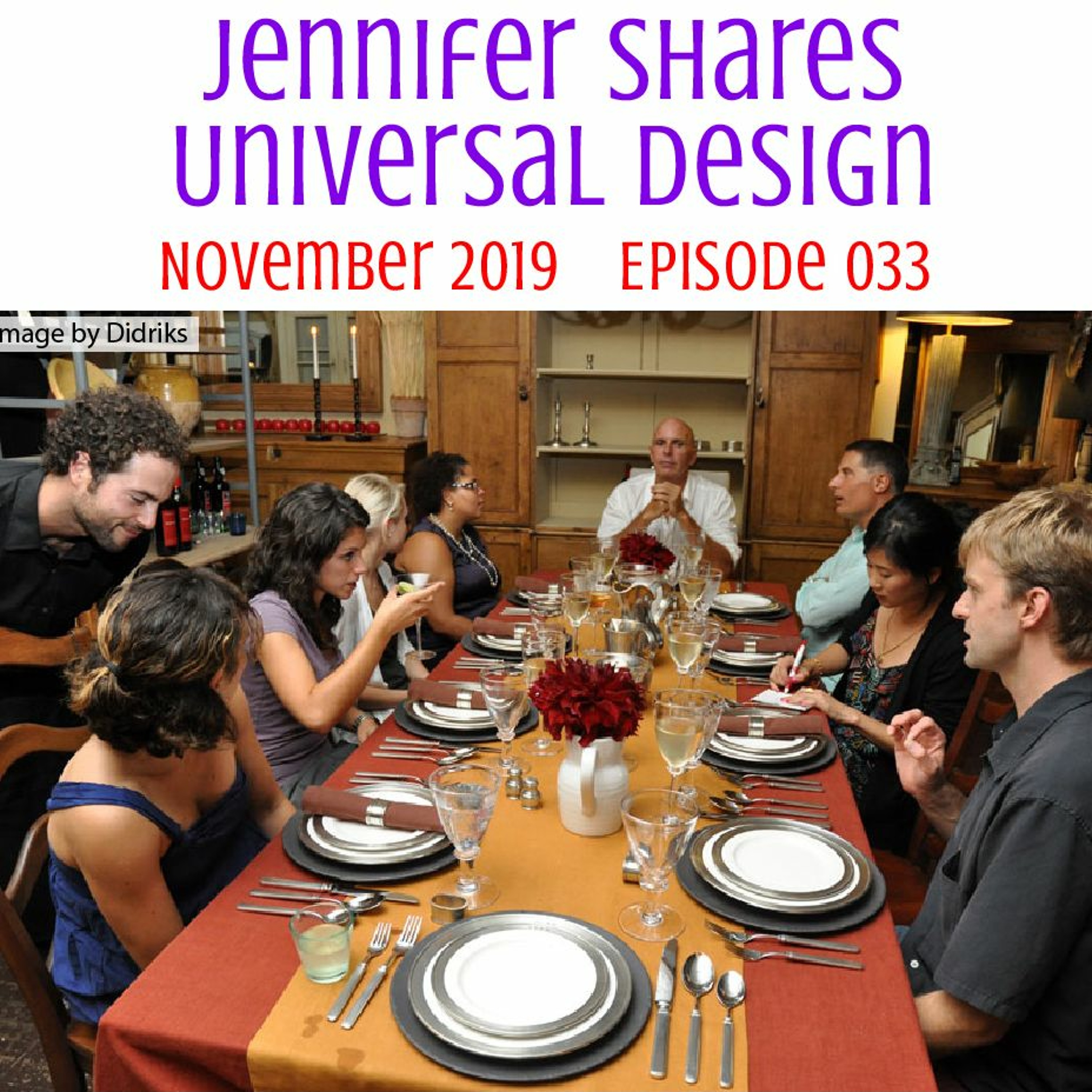 Two Pint PLC033 Jennifer Shares Universal DesignEvery student deserves an equitable opportunity to learn in our classroom. Jennifer Pusateri joins us to share how her work with universal design for learning (UDL) helps remove barriers to learning for students. We re-examine our assumptions for how a classroom must run and find ways to provide options for each learner in our room.
Later, we debate how useful metadata can be for supporting student motivation. A new study suggests we have a new way to measure self-efficacy in mathematics, but how is that different from what we already observe in the classroom?
Finally, our Hot Off the Presses...2019-11-1244 min
Two Pint PLC033 Jennifer Shares Universal DesignEvery student deserves an equitable opportunity to learn in our classroom. Jennifer Pusateri joins us to share how her work with universal design for learning (UDL) helps remove barriers to learning for students. We re-examine our assumptions for how a classroom must run and find ways to provide options for each learner in our room.
Later, we debate how useful metadata can be for supporting student motivation. A new study suggests we have a new way to measure self-efficacy in mathematics, but how is that different from what we already observe in the classroom?
Finally, our Hot Off the Presses...2019-11-1244 min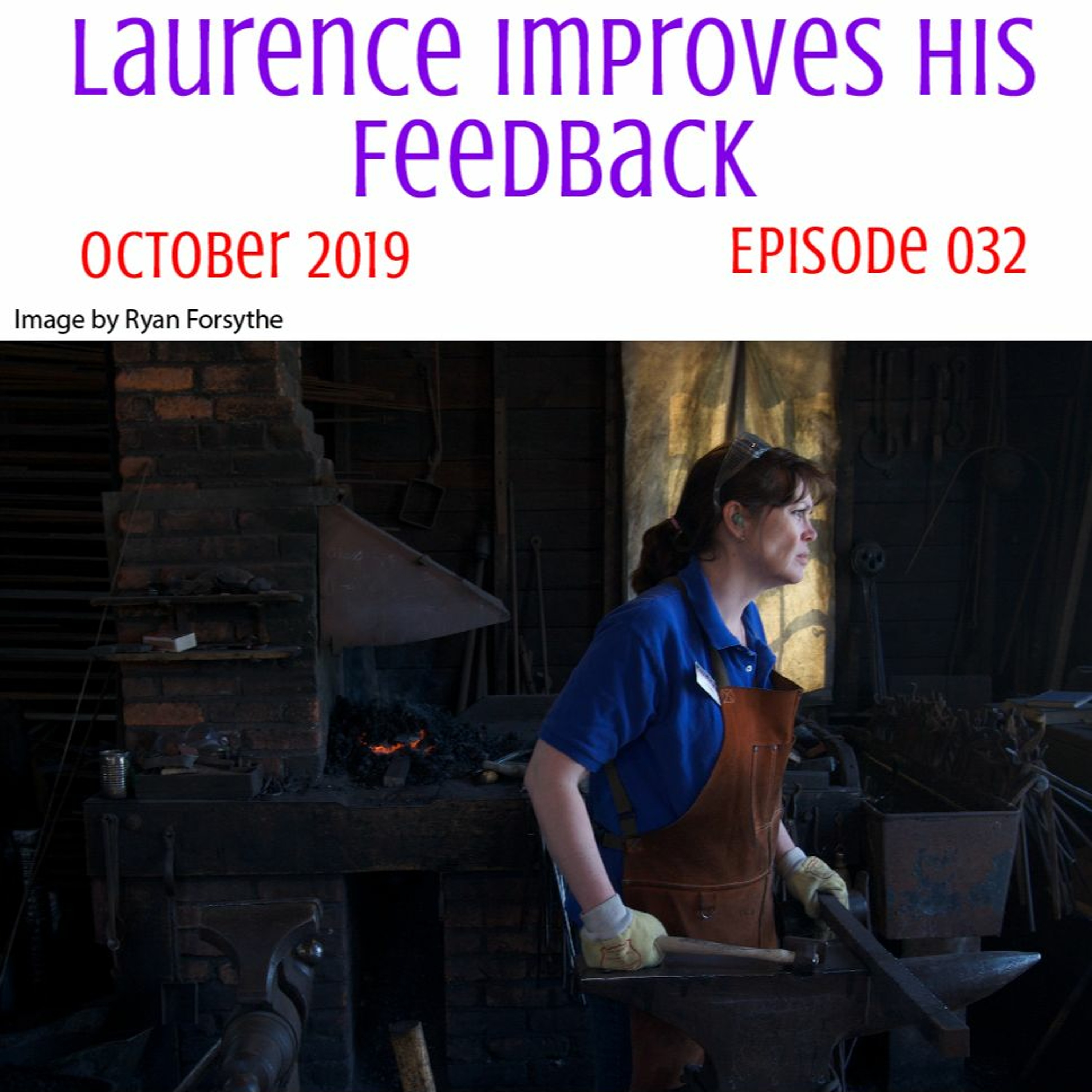 Two Pint PLC032 Laurence Improves His FeedbackResearch on growth mindset took the education world by storm in the 2000’s, prompting excitement and criticism. We read a large scale expansion of the growth mindset research that addresses some of the most common criticisms of past work and provides actionable guidance for classroom teachers.
Later, we look at how different forms of feedback can affect students’ ability to solve math problems on subsequent tests. Timely formative feedback is essential for student growth.
Finally, our Peer Review features a debrief of an email conversation with author Maria Garcia Alvarez. She addresses some of our questions from episode 029, and we find...2019-10-1242 min
Two Pint PLC032 Laurence Improves His FeedbackResearch on growth mindset took the education world by storm in the 2000’s, prompting excitement and criticism. We read a large scale expansion of the growth mindset research that addresses some of the most common criticisms of past work and provides actionable guidance for classroom teachers.
Later, we look at how different forms of feedback can affect students’ ability to solve math problems on subsequent tests. Timely formative feedback is essential for student growth.
Finally, our Peer Review features a debrief of an email conversation with author Maria Garcia Alvarez. She addresses some of our questions from episode 029, and we find...2019-10-1242 min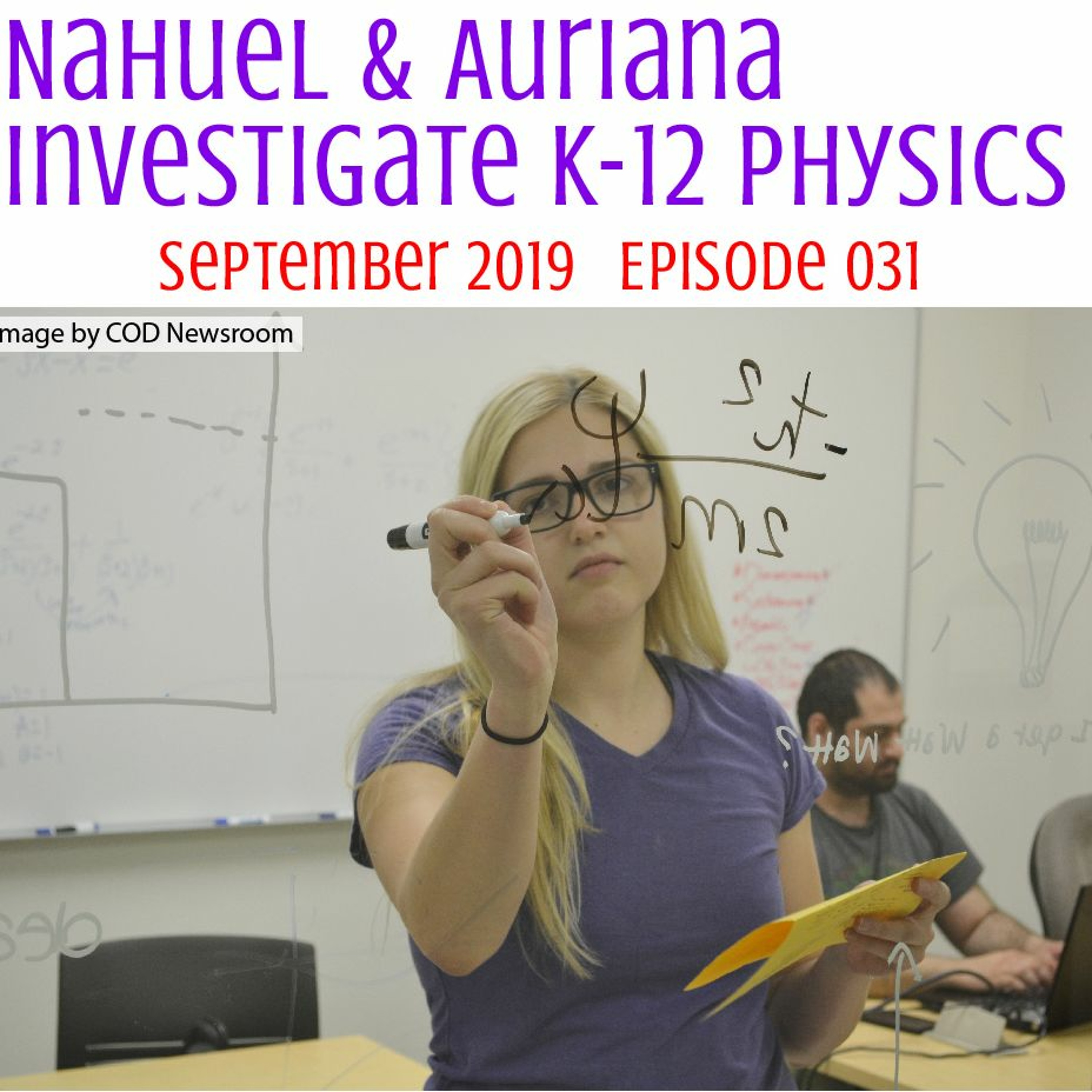 Two Pint PLC031 Nahuel & Auriana Investigate K - 12 PhysicsEven young students can begin to understand abstract topics like quantum mechanics, if given the chance. Nahuel Acosta and Auriana Anderson join us to discuss their research related to delivering guest lessons on quantum mechanics in K-12 classrooms. We learn why teaching quantum mechanics concepts early is useful, what their research revealed about their students' growth, and how the experience affected them as pre-service teachers.
Later, we look at the connections (or lack of connections) between math anxiety and students' approximate number system (ANS). Previous work has suggested that underdeveloped skills in approximation may eventually lead to higher math anxiety...2019-09-1344 min
Two Pint PLC031 Nahuel & Auriana Investigate K - 12 PhysicsEven young students can begin to understand abstract topics like quantum mechanics, if given the chance. Nahuel Acosta and Auriana Anderson join us to discuss their research related to delivering guest lessons on quantum mechanics in K-12 classrooms. We learn why teaching quantum mechanics concepts early is useful, what their research revealed about their students' growth, and how the experience affected them as pre-service teachers.
Later, we look at the connections (or lack of connections) between math anxiety and students' approximate number system (ANS). Previous work has suggested that underdeveloped skills in approximation may eventually lead to higher math anxiety...2019-09-1344 min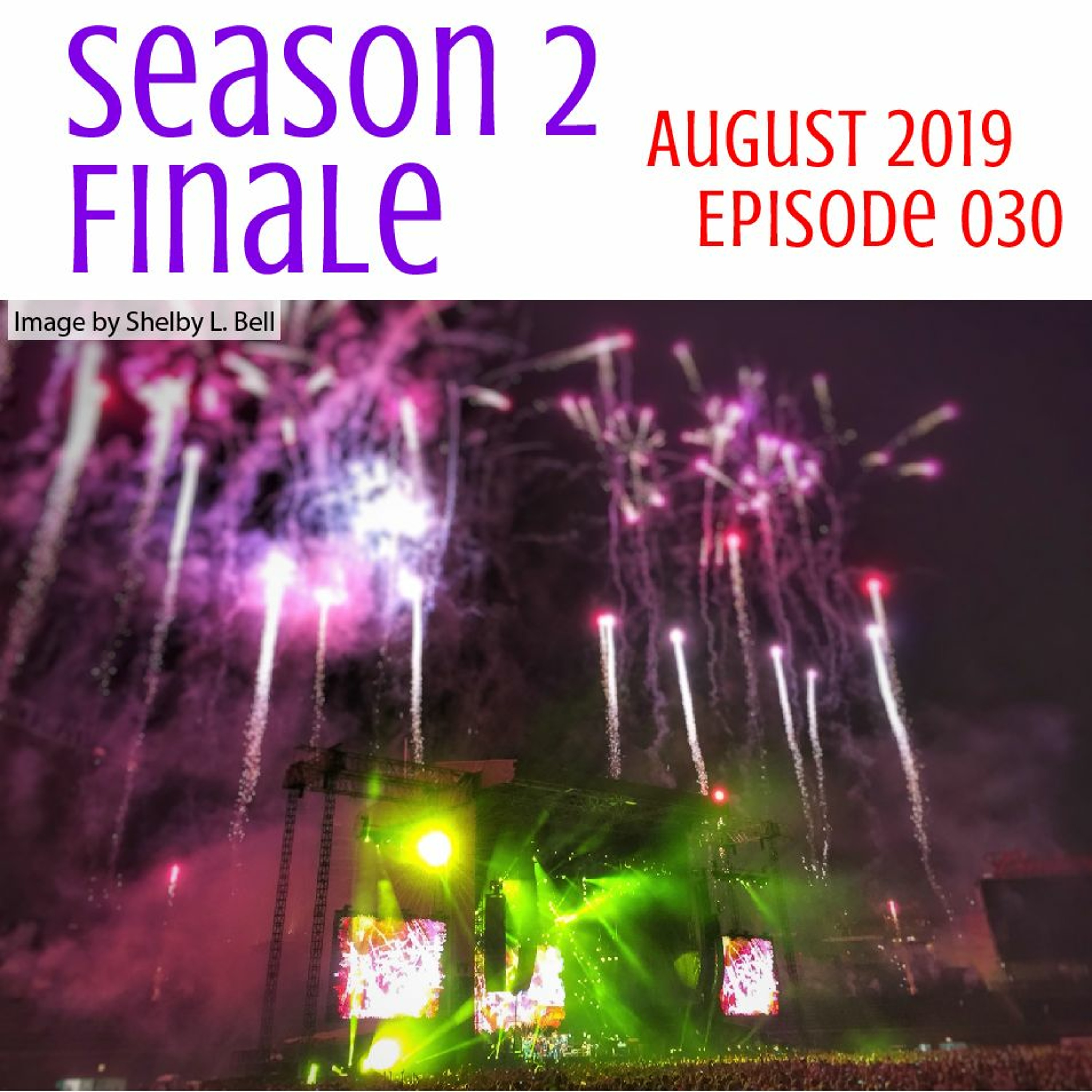 Two Pint PLC030 Season Two FinaleSummer is a time for reflection and renewal of purpose. We pause from our usual analysis of research and news to reflect on the past year. We'll pull back the curtain on how and why we've made some of our show decisions this past year. We'll also wrestle with what we hope to do better next year.2019-08-1343 min
Two Pint PLC030 Season Two FinaleSummer is a time for reflection and renewal of purpose. We pause from our usual analysis of research and news to reflect on the past year. We'll pull back the curtain on how and why we've made some of our show decisions this past year. We'll also wrestle with what we hope to do better next year.2019-08-1343 min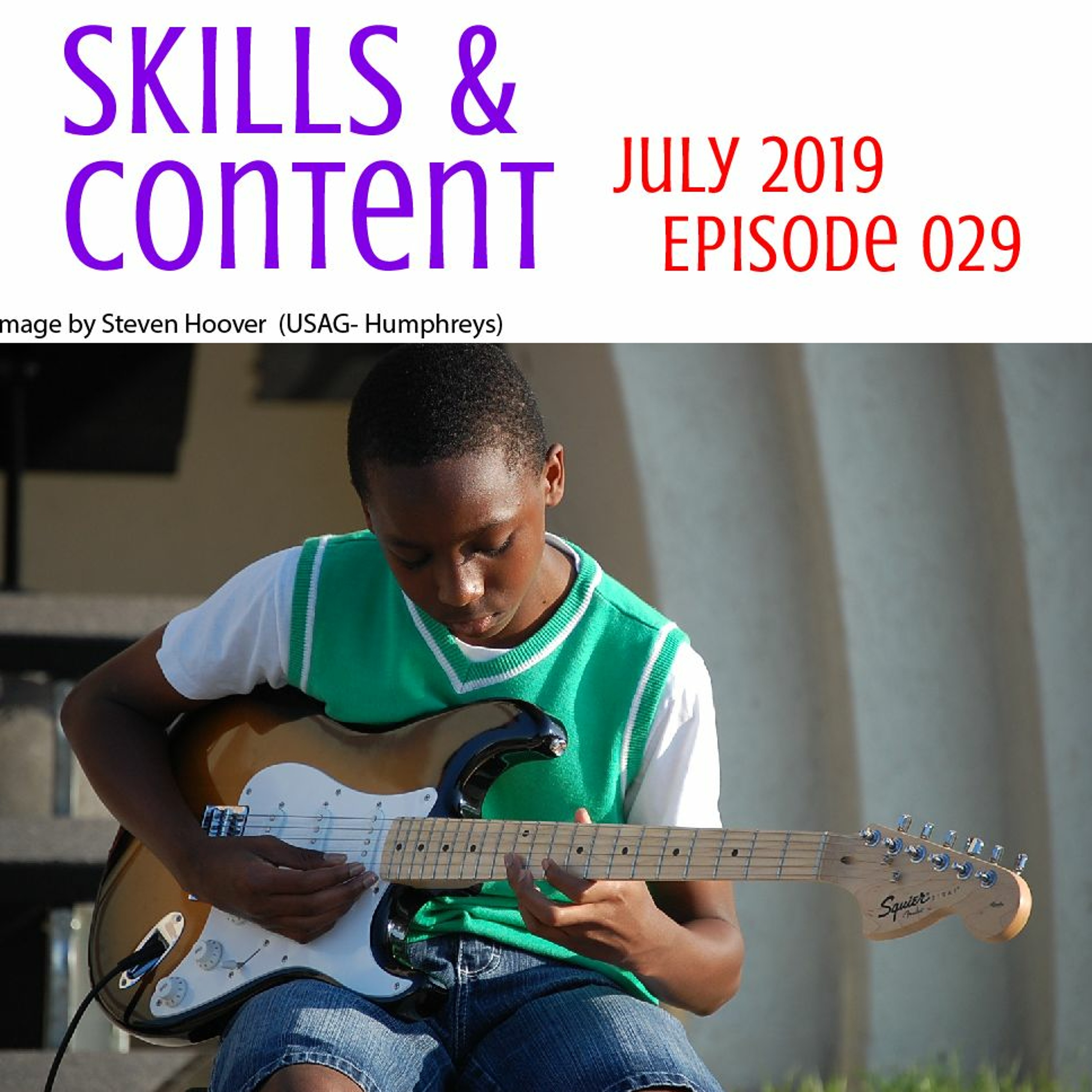 Two Pint PLC029 Skills And ContentWe must balance teaching content knowledge and professional skills. Will Dunn joins as a guest host on an episode dedicated to exploring how we pursue this balance throughout educational practice. We start with a discussion of how we should situate competencies in standards.
Later, we read about the theory of embodied cognition. This theory emphasizes the importance of sensory experience, and we discuss how it impacts what students should see/feel/touch/smell/hear in our classroom.
Finally, Will brings the conversation around to assessment practices. We wrestle with what common assessments should (and shouldn’t) do.
We drink Shake, a...2019-07-1244 min
Two Pint PLC029 Skills And ContentWe must balance teaching content knowledge and professional skills. Will Dunn joins as a guest host on an episode dedicated to exploring how we pursue this balance throughout educational practice. We start with a discussion of how we should situate competencies in standards.
Later, we read about the theory of embodied cognition. This theory emphasizes the importance of sensory experience, and we discuss how it impacts what students should see/feel/touch/smell/hear in our classroom.
Finally, Will brings the conversation around to assessment practices. We wrestle with what common assessments should (and shouldn’t) do.
We drink Shake, a...2019-07-1244 min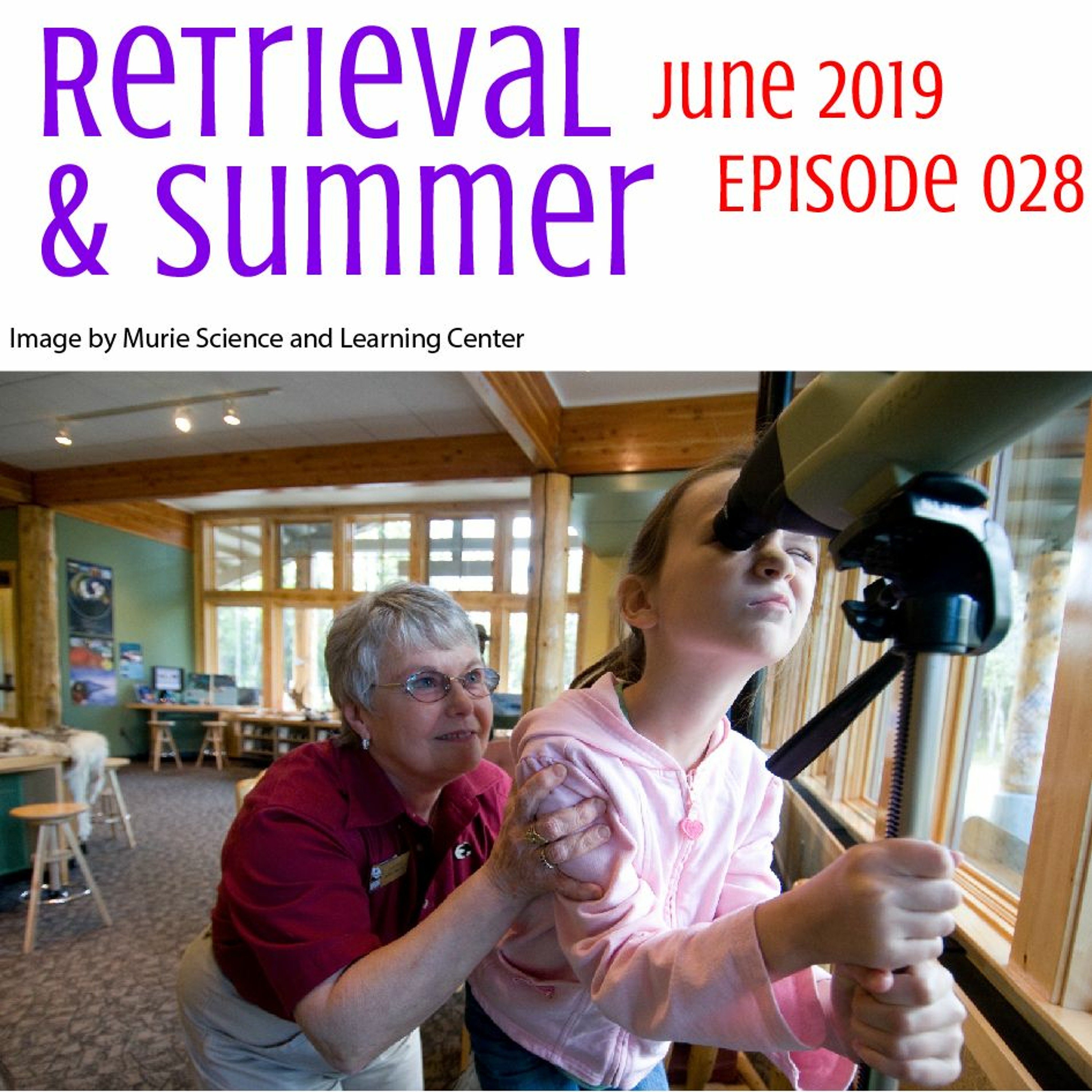 Two Pint PLC028 Retrieval And SummerRetrieval of information is a demanding cognitive process, and teachers must find instructional approaches that improve later retrieval of learned material. We discuss how different student experiences lead to varied success in retrieval, and how it might affect our choices for the experiences we provide in our classroom.
Later, we read an updated analysis of several major standardized tests in the United States. Errors in test administration and analysis led to some mistaken conclusions in the past, and leaves us with some important questions moving forward.
The Peer Review spotlights a listener-shared article on how teachers can avoid misunderstanding student...2019-06-1244 min
Two Pint PLC028 Retrieval And SummerRetrieval of information is a demanding cognitive process, and teachers must find instructional approaches that improve later retrieval of learned material. We discuss how different student experiences lead to varied success in retrieval, and how it might affect our choices for the experiences we provide in our classroom.
Later, we read an updated analysis of several major standardized tests in the United States. Errors in test administration and analysis led to some mistaken conclusions in the past, and leaves us with some important questions moving forward.
The Peer Review spotlights a listener-shared article on how teachers can avoid misunderstanding student...2019-06-1244 min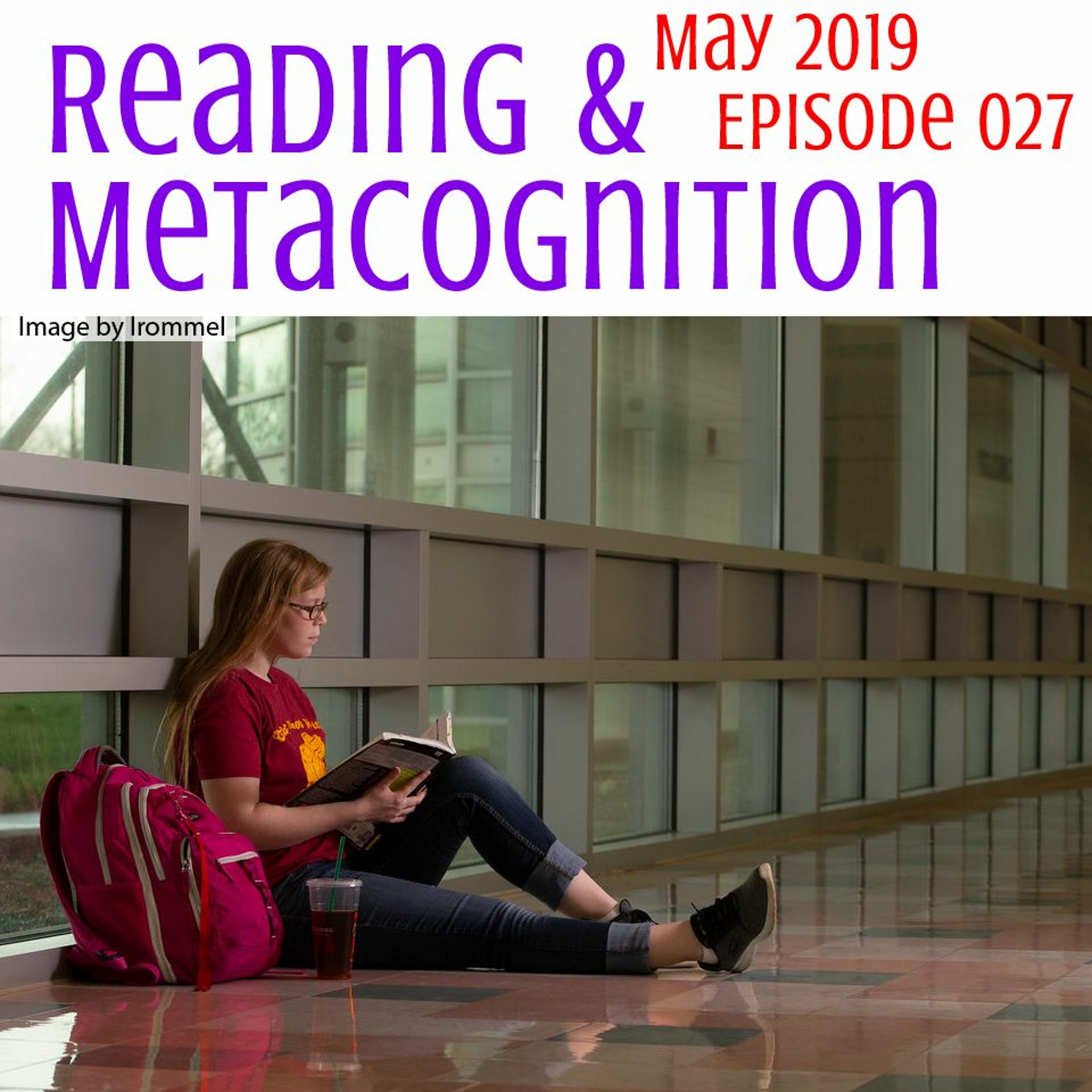 Two Pint PLC027 Reading And MetacognitionOpen Access Educational Resources (OERs) are an emerging alternative to traditional textbooks, but how do new technologies compare to traditional options? Dr. Virginia Clinton joins us to discuss her recent papers “Savings without sacrifice: a case report on open-source textbook adoption” and “Reading from paper compared to screens: A systematic review and meta‐analysis”.
Later, we read a study that examined what kinds of supports teachers in high-achieving classrooms provide for student metacognition. We find ways to get more out of our interactions with students by explicitly supporting how they think about their learning.
We drink Rye on Rye, a barrel-age...2019-05-1244 min
Two Pint PLC027 Reading And MetacognitionOpen Access Educational Resources (OERs) are an emerging alternative to traditional textbooks, but how do new technologies compare to traditional options? Dr. Virginia Clinton joins us to discuss her recent papers “Savings without sacrifice: a case report on open-source textbook adoption” and “Reading from paper compared to screens: A systematic review and meta‐analysis”.
Later, we read a study that examined what kinds of supports teachers in high-achieving classrooms provide for student metacognition. We find ways to get more out of our interactions with students by explicitly supporting how they think about their learning.
We drink Rye on Rye, a barrel-age...2019-05-1244 min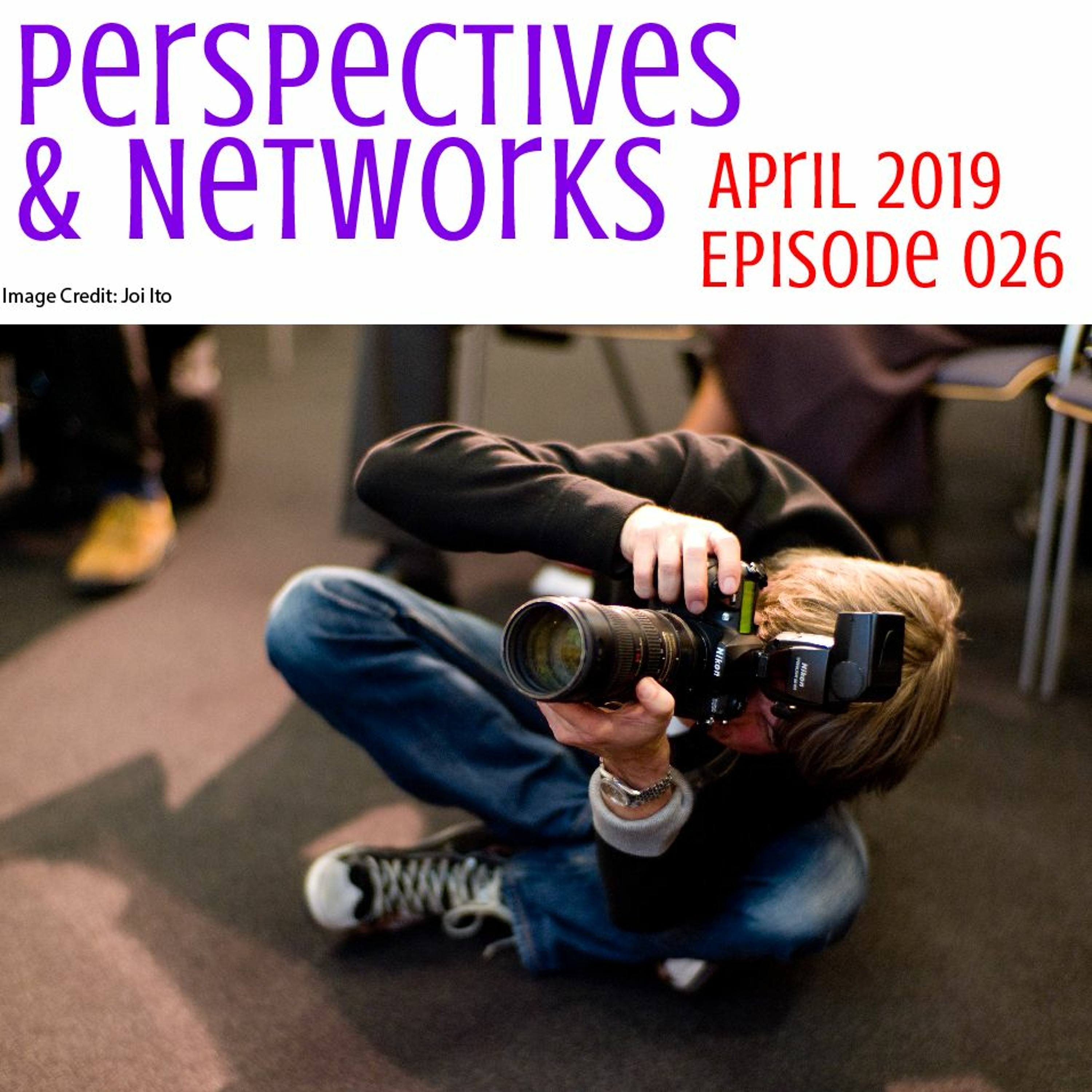 Two Pint PLC26 Perspectives And NetworksProblems in education are often a complex mix of social, cognitive, and historical processes. Dr. Beth Holland, author of a recent Education Week piece we read, joins us to talk about education perspective.
Later, Dr. Holland shares her expertise in studying school networks as we discuss how we can get more from our efforts in working with colleagues.
The Peer Review brings us a paper from our listeners that was a favorite from 2018. We read a brief from 100Kin10 about improving representation of women in STEM.
We drink Revenge of the Dragon, a nitro stout from Martin City Brewing Company...2019-04-1243 min
Two Pint PLC26 Perspectives And NetworksProblems in education are often a complex mix of social, cognitive, and historical processes. Dr. Beth Holland, author of a recent Education Week piece we read, joins us to talk about education perspective.
Later, Dr. Holland shares her expertise in studying school networks as we discuss how we can get more from our efforts in working with colleagues.
The Peer Review brings us a paper from our listeners that was a favorite from 2018. We read a brief from 100Kin10 about improving representation of women in STEM.
We drink Revenge of the Dragon, a nitro stout from Martin City Brewing Company...2019-04-1243 min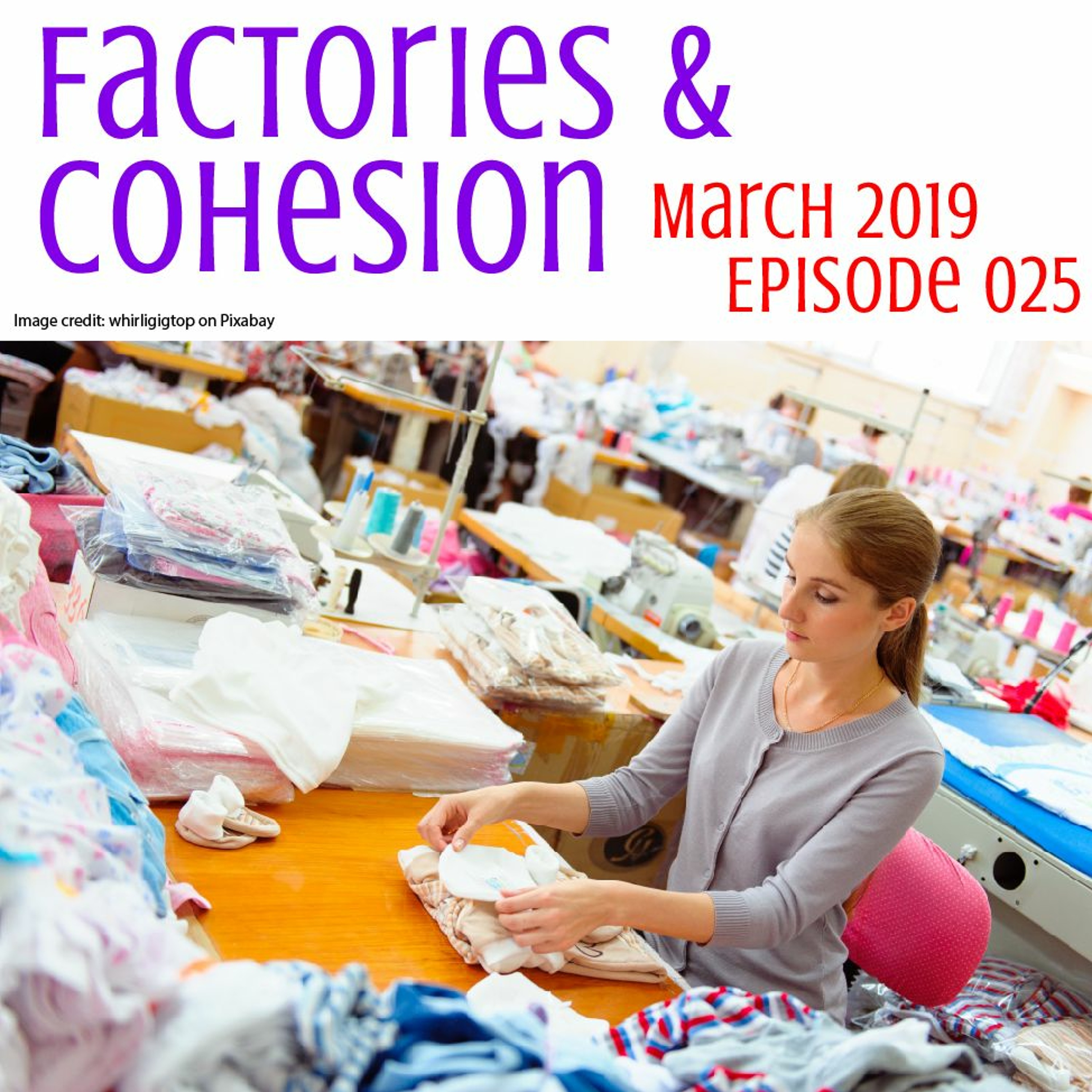 Two Pint PLC025 Factories And CohesionThe notion that “schools are designed like factories” is a pernicious myth in education. Jenn Binis, host of the podcast Ed History 101, joins us to discuss why this narrative is so prevalent and how the myth ends up hurting teachers.
Later, we read a paper on how teachers build social capital in their building. Community cohesion is valuable, but too much can lead to some unintended consequences.
Outtakes returns when a behind-the-scenes discussion takes a turn for personal reflection. We get thoughtful about how we use names professionally.
We drink Death Before Disco, a porter from Left Hand Brewing Co. in L...2019-03-1244 min
Two Pint PLC025 Factories And CohesionThe notion that “schools are designed like factories” is a pernicious myth in education. Jenn Binis, host of the podcast Ed History 101, joins us to discuss why this narrative is so prevalent and how the myth ends up hurting teachers.
Later, we read a paper on how teachers build social capital in their building. Community cohesion is valuable, but too much can lead to some unintended consequences.
Outtakes returns when a behind-the-scenes discussion takes a turn for personal reflection. We get thoughtful about how we use names professionally.
We drink Death Before Disco, a porter from Left Hand Brewing Co. in L...2019-03-1244 min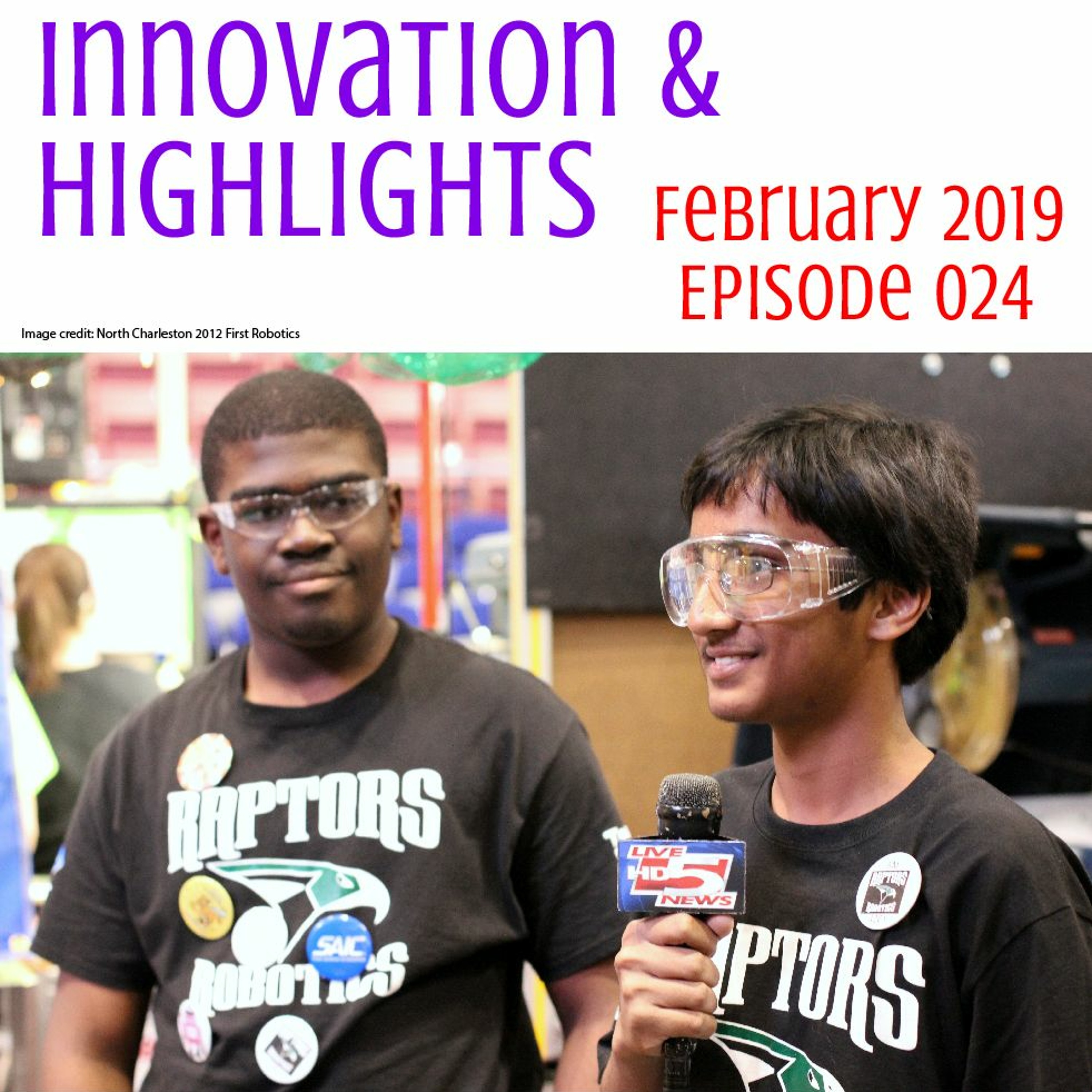 Two Pint PLC024 Innovation And HighlightsGood teaching requires creativity, but how do we create a supportive environment for innovative teaching? We read an article lays out how an innovation commons allows people to innovate, and we discuss how we could build an innovation commons in education.
Later, Youki Terada joins us for an extended Peer Review. Youki has published a round-up of educational research from 2018, and we compare notes on topics like the impact of classroom decoration and complications in the mindset literature.
We drink Plaid Habit, a barrel-aged, double-mashed imperial brown ale from Boulivard Brewing Company in Kansas City, MO.2019-02-1241 min
Two Pint PLC024 Innovation And HighlightsGood teaching requires creativity, but how do we create a supportive environment for innovative teaching? We read an article lays out how an innovation commons allows people to innovate, and we discuss how we could build an innovation commons in education.
Later, Youki Terada joins us for an extended Peer Review. Youki has published a round-up of educational research from 2018, and we compare notes on topics like the impact of classroom decoration and complications in the mindset literature.
We drink Plaid Habit, a barrel-aged, double-mashed imperial brown ale from Boulivard Brewing Company in Kansas City, MO.2019-02-1241 min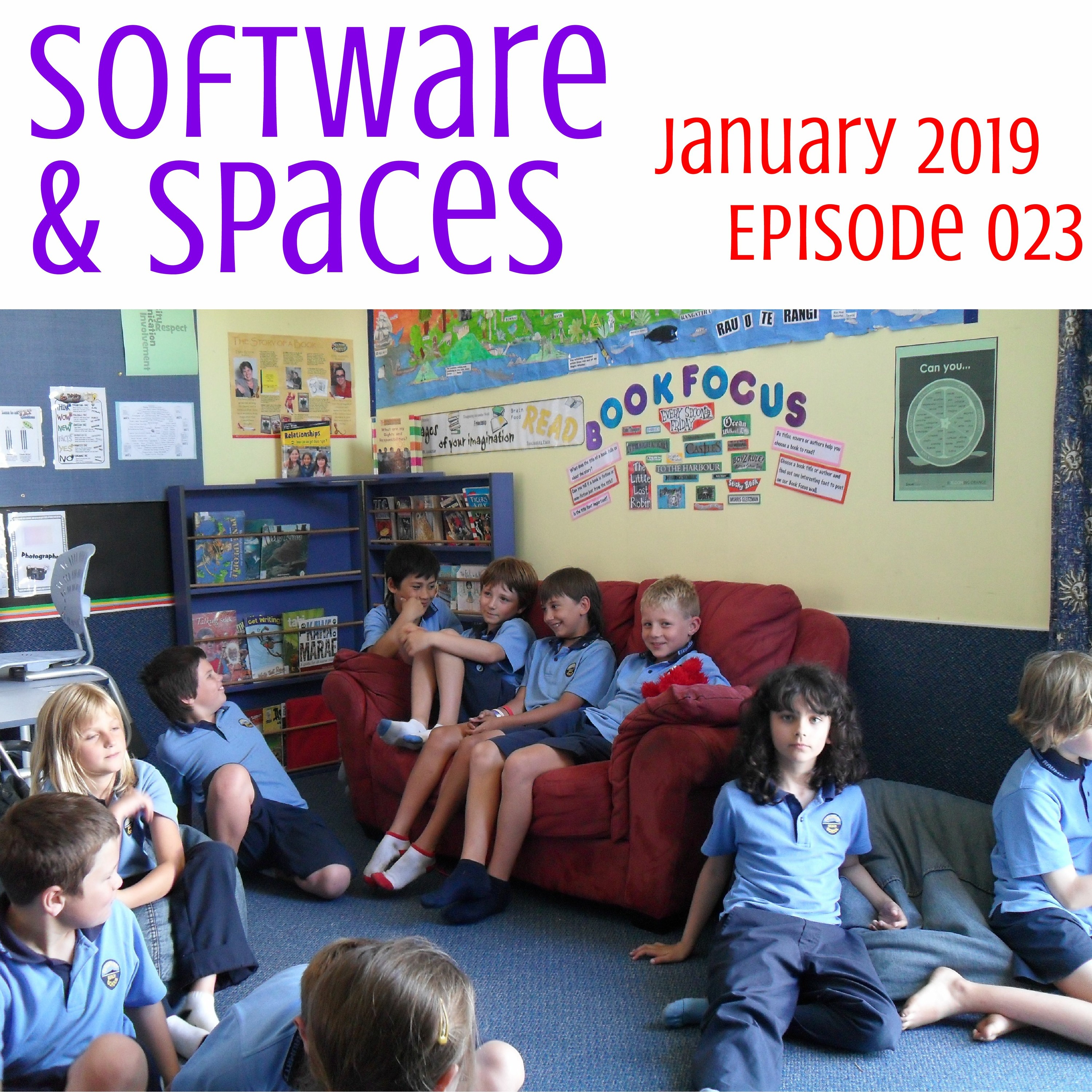 Two Pint PLC023 Software And SpacesAlgorithms that effectively guide instruction is the dream of some people… but the reality of what instructional programs can do right now is something else entirely. Shane Lawrence guest hosts this month as we discuss a recent study on how computer-assisted instruction compared to human teachers.
Later, we look at some urban planning research to find lessons on how we can create better learning spaces in our classrooms and our buildings. We consider the role student work should play, and what decorations do more harm than good.
The Peer Review is a full mail bag, with questions submitted by pre-service te...2019-01-1244 min
Two Pint PLC023 Software And SpacesAlgorithms that effectively guide instruction is the dream of some people… but the reality of what instructional programs can do right now is something else entirely. Shane Lawrence guest hosts this month as we discuss a recent study on how computer-assisted instruction compared to human teachers.
Later, we look at some urban planning research to find lessons on how we can create better learning spaces in our classrooms and our buildings. We consider the role student work should play, and what decorations do more harm than good.
The Peer Review is a full mail bag, with questions submitted by pre-service te...2019-01-1244 min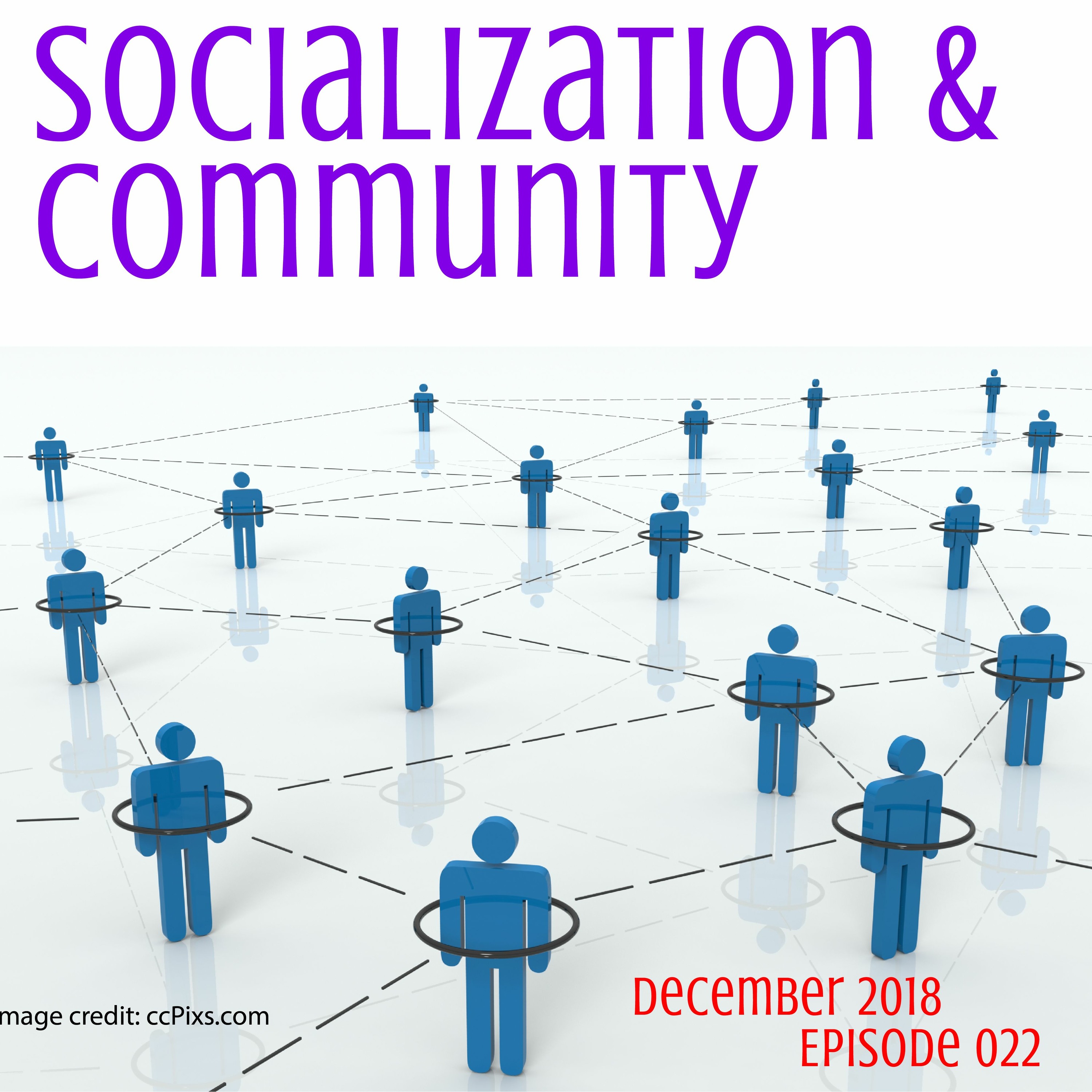 Two Pint PLC022 Socialization And CommunityBuilding culture has a tremendous impact on teacher satisfaction, student engagement, and the daily education experience. This month’s article shows us how teacher stress burdens students, enthusiasm is contagious, and more!
Later, Laurence responds to a listener request with details on how he builds his classroom culture in the first two weeks of school. We also bring back the non-sequitur with a debate on a dramatic claim from Twitter.
The Peer Review welcomes Matthew Moore, an educator with a flipped classroom. He shares how he leverages technology daily while still being mindful of the myth of the digital native.
We...2018-12-1244 min
Two Pint PLC022 Socialization And CommunityBuilding culture has a tremendous impact on teacher satisfaction, student engagement, and the daily education experience. This month’s article shows us how teacher stress burdens students, enthusiasm is contagious, and more!
Later, Laurence responds to a listener request with details on how he builds his classroom culture in the first two weeks of school. We also bring back the non-sequitur with a debate on a dramatic claim from Twitter.
The Peer Review welcomes Matthew Moore, an educator with a flipped classroom. He shares how he leverages technology daily while still being mindful of the myth of the digital native.
We...2018-12-1244 min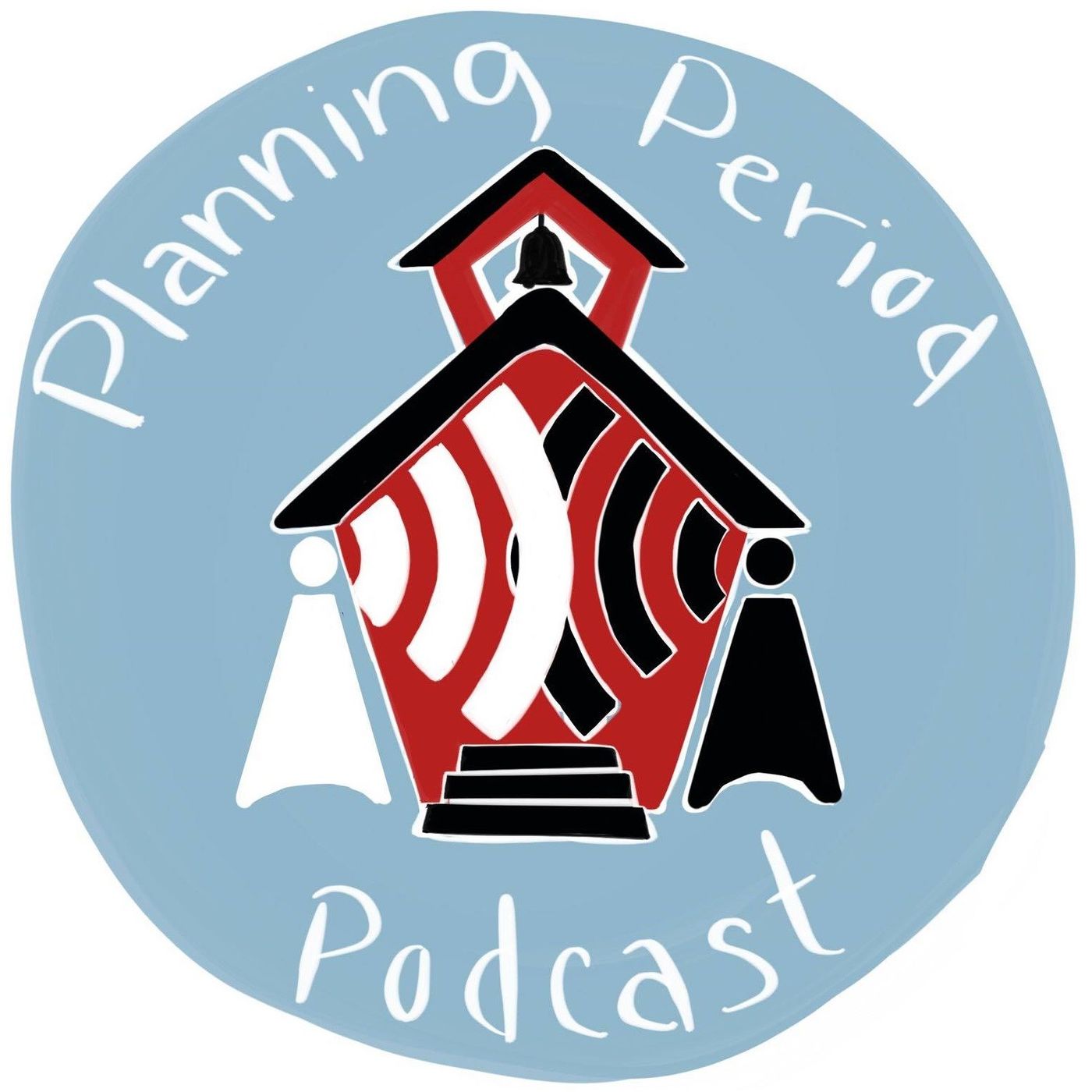 Planning Period PodcastMichael Ralph of the Two Pint PLCHello, and welcome to Episode 70 of the Planning Period Podcast, your #EdBreakroom. I'm your host, Brad Shreffler.This week on the show I am joined by Michael Ralph, a STEM Teacher Trainer within the UKanTeach program at the University of Kansas. Focuses on the scientific process for others to be able to bring that into their own classrooms. He is also the host of the Two Pint PLC podcast, where he and his co-host Laurence Woodruff discuss educational research while drinking a pint of beer (how cool is that?).Michael and I talk about educational research and what...2018-12-0755 min
Planning Period PodcastMichael Ralph of the Two Pint PLCHello, and welcome to Episode 70 of the Planning Period Podcast, your #EdBreakroom. I'm your host, Brad Shreffler.This week on the show I am joined by Michael Ralph, a STEM Teacher Trainer within the UKanTeach program at the University of Kansas. Focuses on the scientific process for others to be able to bring that into their own classrooms. He is also the host of the Two Pint PLC podcast, where he and his co-host Laurence Woodruff discuss educational research while drinking a pint of beer (how cool is that?).Michael and I talk about educational research and what...2018-12-0755 min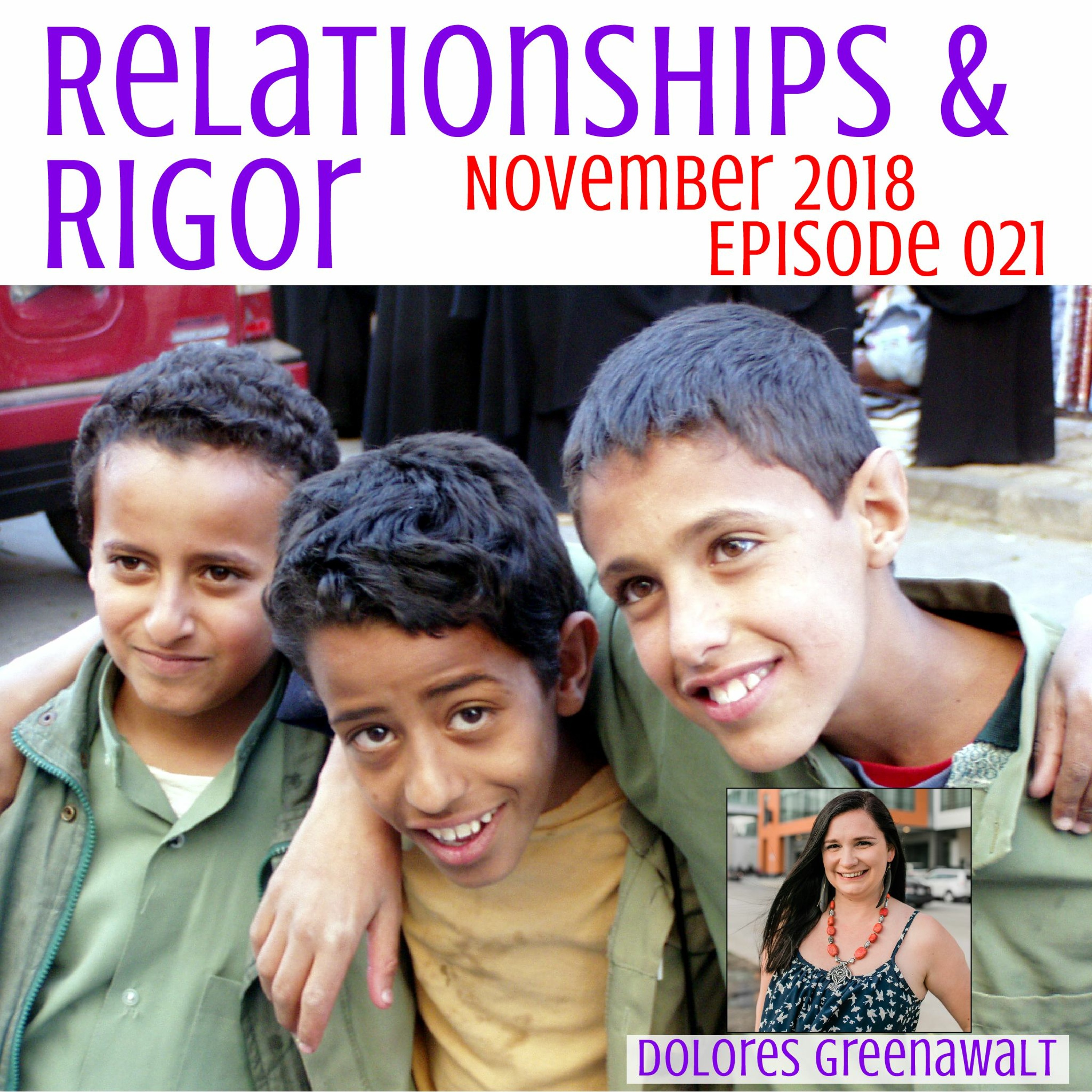 Two Pint PLC021 Relationships And RigorTeachers must build relationships with their students, despite the great breadth in their cultural backgrounds. Dolores Greenawalt, a professor at Caroll University in Wisconsin, joins us to discuss her recent writing on building positive relationships… even when it seems impossible.
Later, we look at research data produced by the non-profit TNTP on the inequity of instructional practice. Their data shows huge differences in the instructional experience of students across race. We consider how TNTP’s recommendations for teaching practice could affect our classrooms.
The Peer Review looks at a popular story on EdWeek about addressing student name pronunciation. What does our...2018-11-1245 min
Two Pint PLC021 Relationships And RigorTeachers must build relationships with their students, despite the great breadth in their cultural backgrounds. Dolores Greenawalt, a professor at Caroll University in Wisconsin, joins us to discuss her recent writing on building positive relationships… even when it seems impossible.
Later, we look at research data produced by the non-profit TNTP on the inequity of instructional practice. Their data shows huge differences in the instructional experience of students across race. We consider how TNTP’s recommendations for teaching practice could affect our classrooms.
The Peer Review looks at a popular story on EdWeek about addressing student name pronunciation. What does our...2018-11-1245 min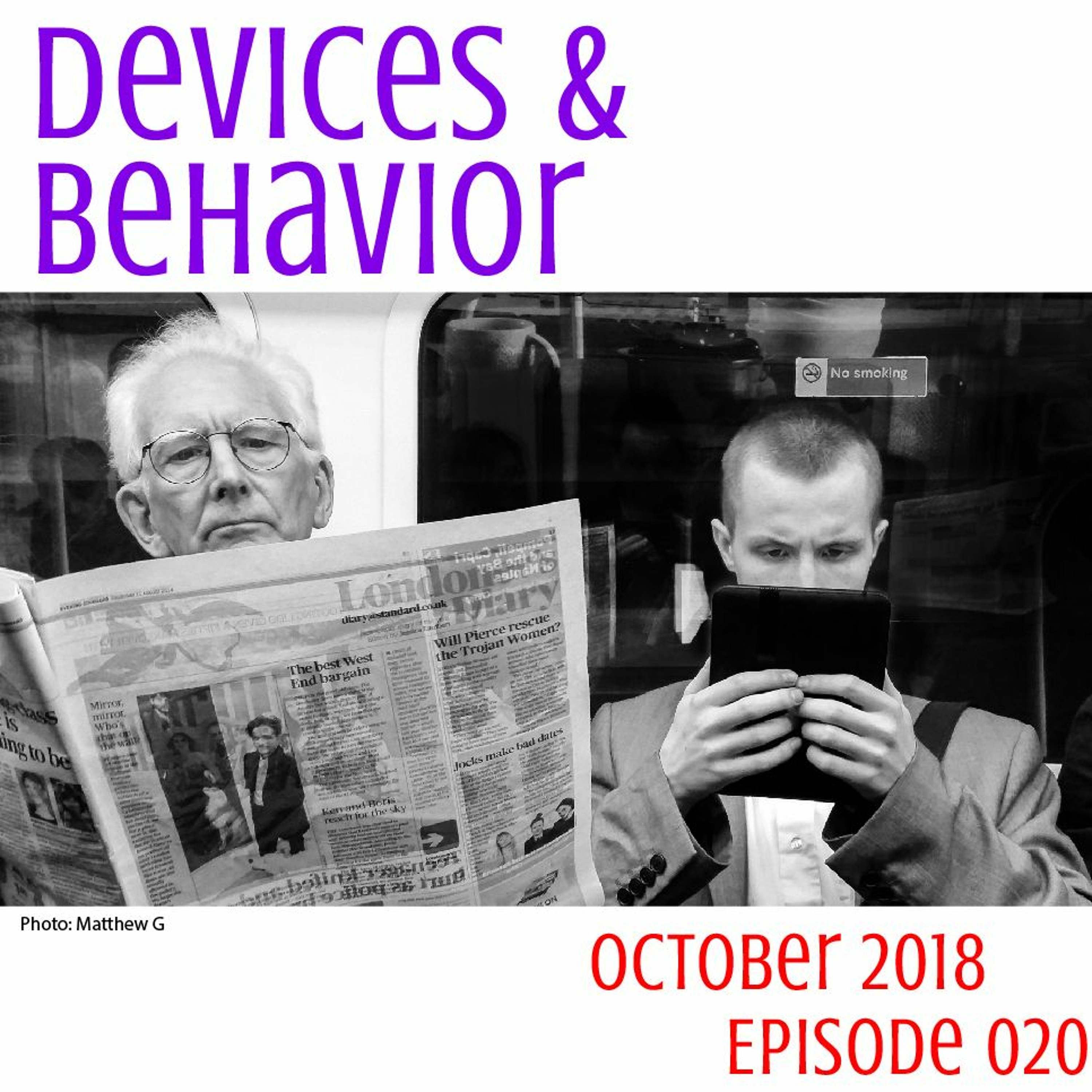 Two Pint PLC020 Devices And BehaviorsTechnology seems to be everywhere, and it is tempting to imagine children grow up with expertise through familiarity. The research paints a vastly different picture, and we discuss one of the top read articles of 2017 that deconstructs the myth of the digital native and the costly habit of multitasking.
Later, we take a look at some of the popular writing on socio-emotional development. It can be difficult to find writing on socio-emotional outcomes (or transferable job skills) that can translate to real classroom impact. We find a few articles, and a peer-reviewed piece, that can lead to implementation of new...2018-10-1344 min
Two Pint PLC020 Devices And BehaviorsTechnology seems to be everywhere, and it is tempting to imagine children grow up with expertise through familiarity. The research paints a vastly different picture, and we discuss one of the top read articles of 2017 that deconstructs the myth of the digital native and the costly habit of multitasking.
Later, we take a look at some of the popular writing on socio-emotional development. It can be difficult to find writing on socio-emotional outcomes (or transferable job skills) that can translate to real classroom impact. We find a few articles, and a peer-reviewed piece, that can lead to implementation of new...2018-10-1344 min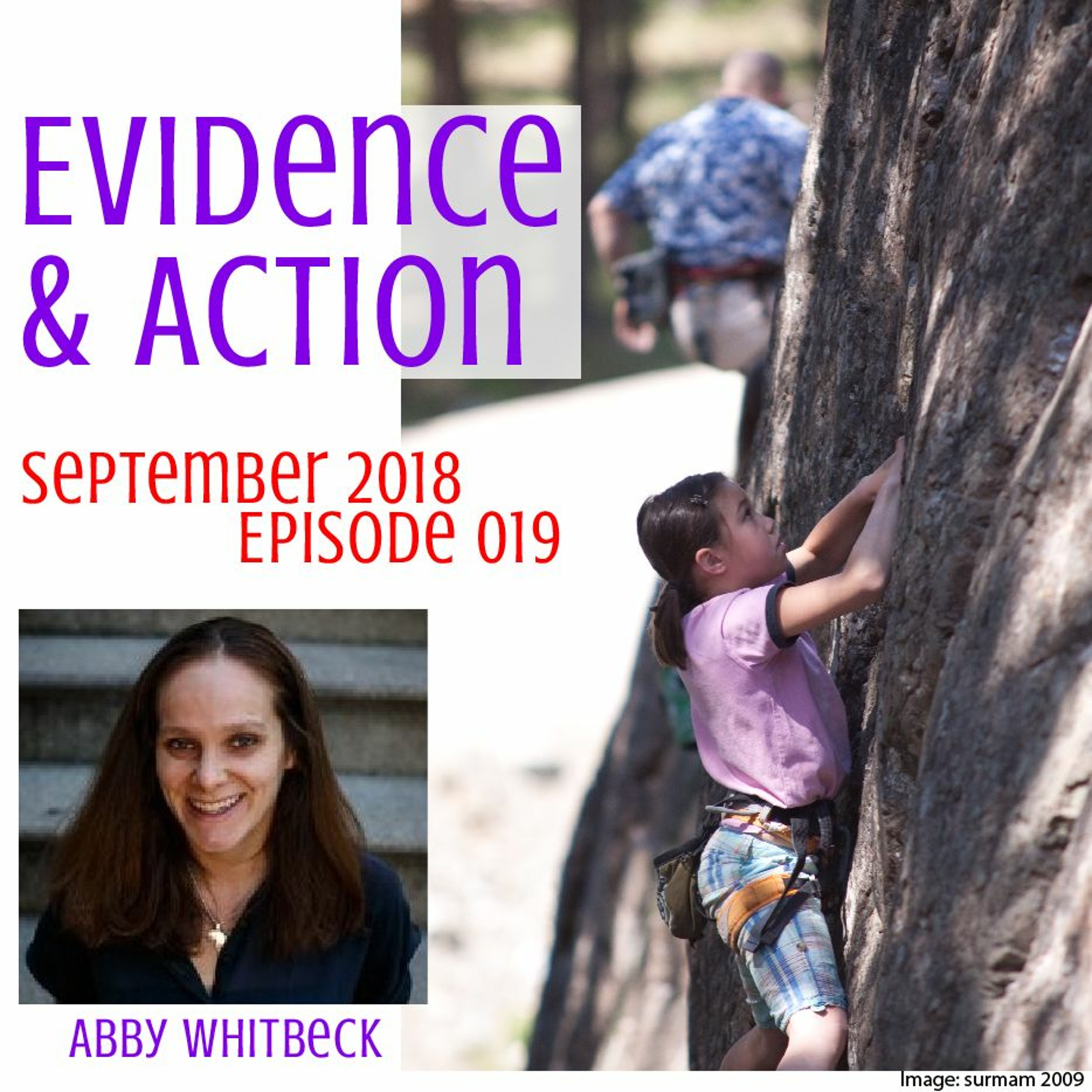 Two Pint PLC019 Evidence And ActionAll students should have access to challenging coursework that lets them grow in their areas of interest. Abby Whitbeck, the Executive Director of AP Strategy and Analytics for the College Board, joins us to talk about how they are using data to create new policies designed to improve representation of all students in Advanced Placement classes.
Later, listeners have recommended Science/Fiction, a blog post from Carol Black. We look at her comments on learning styles, evidence-based instruction, and institutional racism. We have several disagreements with her argument, but find that our common ground is much more important.
Note: A...2018-09-1244 min
Two Pint PLC019 Evidence And ActionAll students should have access to challenging coursework that lets them grow in their areas of interest. Abby Whitbeck, the Executive Director of AP Strategy and Analytics for the College Board, joins us to talk about how they are using data to create new policies designed to improve representation of all students in Advanced Placement classes.
Later, listeners have recommended Science/Fiction, a blog post from Carol Black. We look at her comments on learning styles, evidence-based instruction, and institutional racism. We have several disagreements with her argument, but find that our common ground is much more important.
Note: A...2018-09-1244 min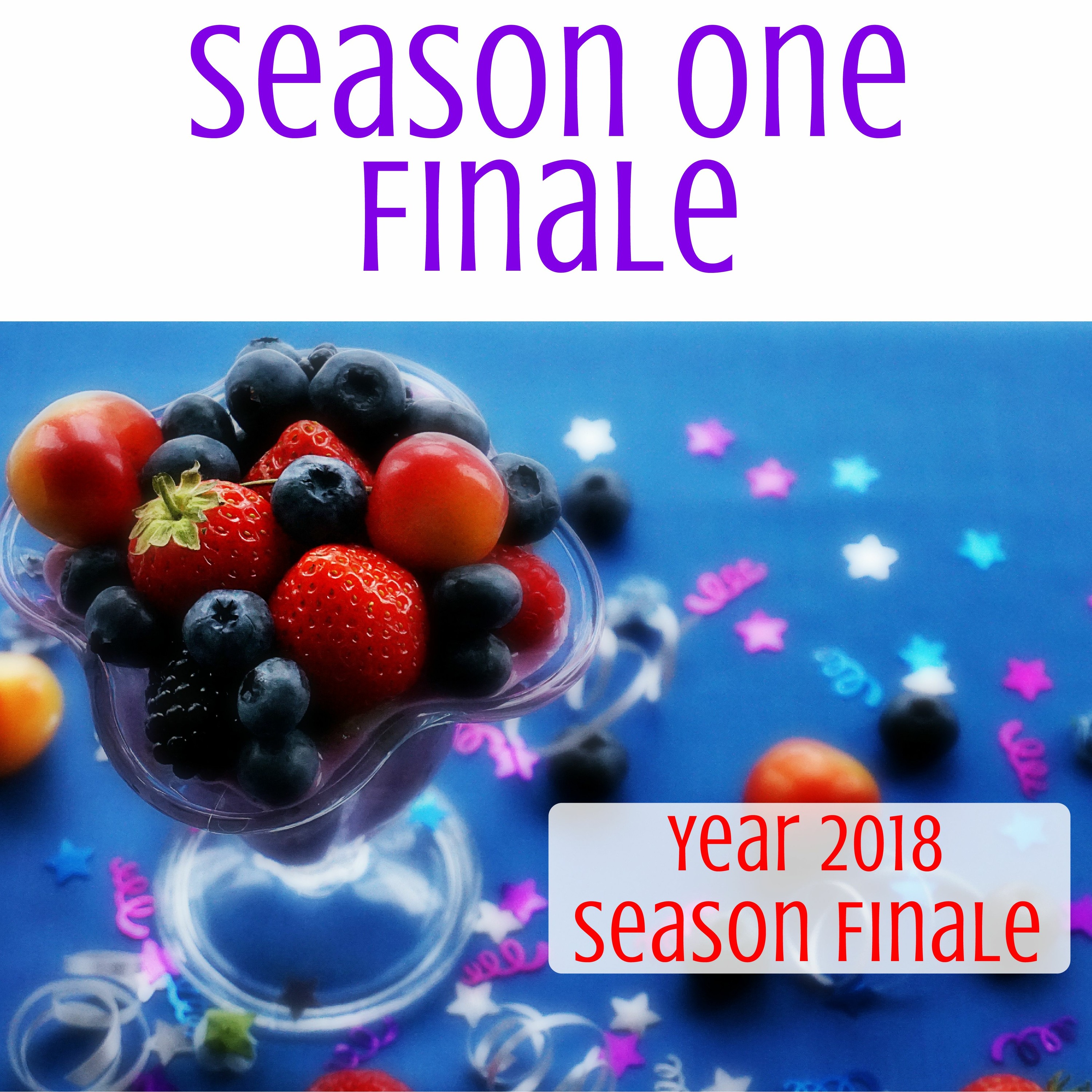 Two Pint PLC0185 Summer Season One FinaleEnjoy a bonus episode that wraps our first season of production. Check in with many of our guests and reflect on our year of learning.2018-08-2744 min
Two Pint PLC0185 Summer Season One FinaleEnjoy a bonus episode that wraps our first season of production. Check in with many of our guests and reflect on our year of learning.2018-08-2744 min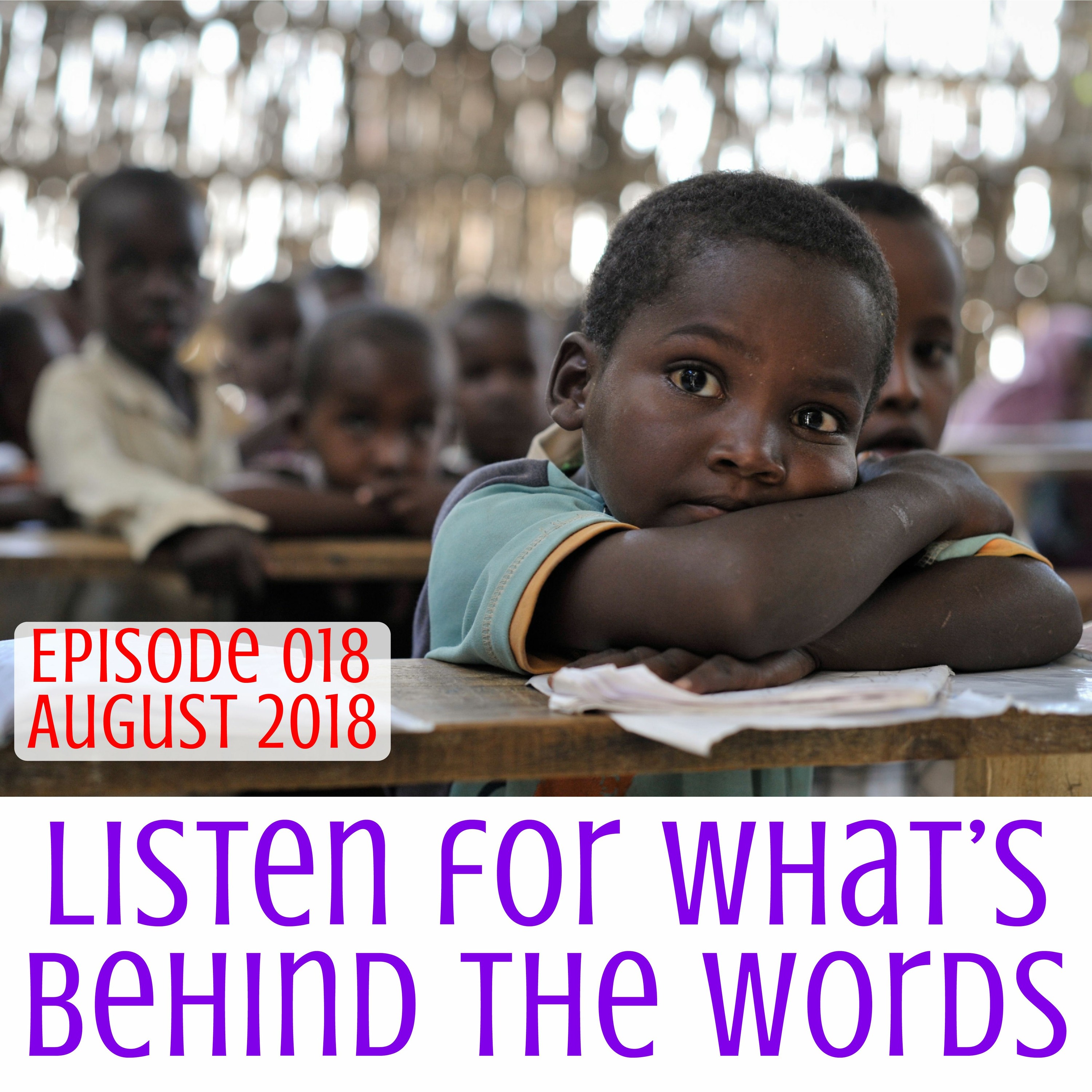 Two Pint PLC018 Listen For What's Behind The WordsResponsive teaching is is an exciting way to highlight student voice, but it comes with its own share of challenges and tensions. Caroline Herbster and Jacob Truett, from FSU Teach at Florida State University, join us to talk about their research with veteran teachers as they work to incorporate responsive practices.
Later, we look to a British study on the effects of classroom consensus on socio-emotional outcomes for students. They find that using better measurement methods provides insight into the benefits of student consensus regarding their autonomy, goals, and evaluation.
In the Peer Review, we share feedback on last month’s...2018-08-1244 min
Two Pint PLC018 Listen For What's Behind The WordsResponsive teaching is is an exciting way to highlight student voice, but it comes with its own share of challenges and tensions. Caroline Herbster and Jacob Truett, from FSU Teach at Florida State University, join us to talk about their research with veteran teachers as they work to incorporate responsive practices.
Later, we look to a British study on the effects of classroom consensus on socio-emotional outcomes for students. They find that using better measurement methods provides insight into the benefits of student consensus regarding their autonomy, goals, and evaluation.
In the Peer Review, we share feedback on last month’s...2018-08-1244 min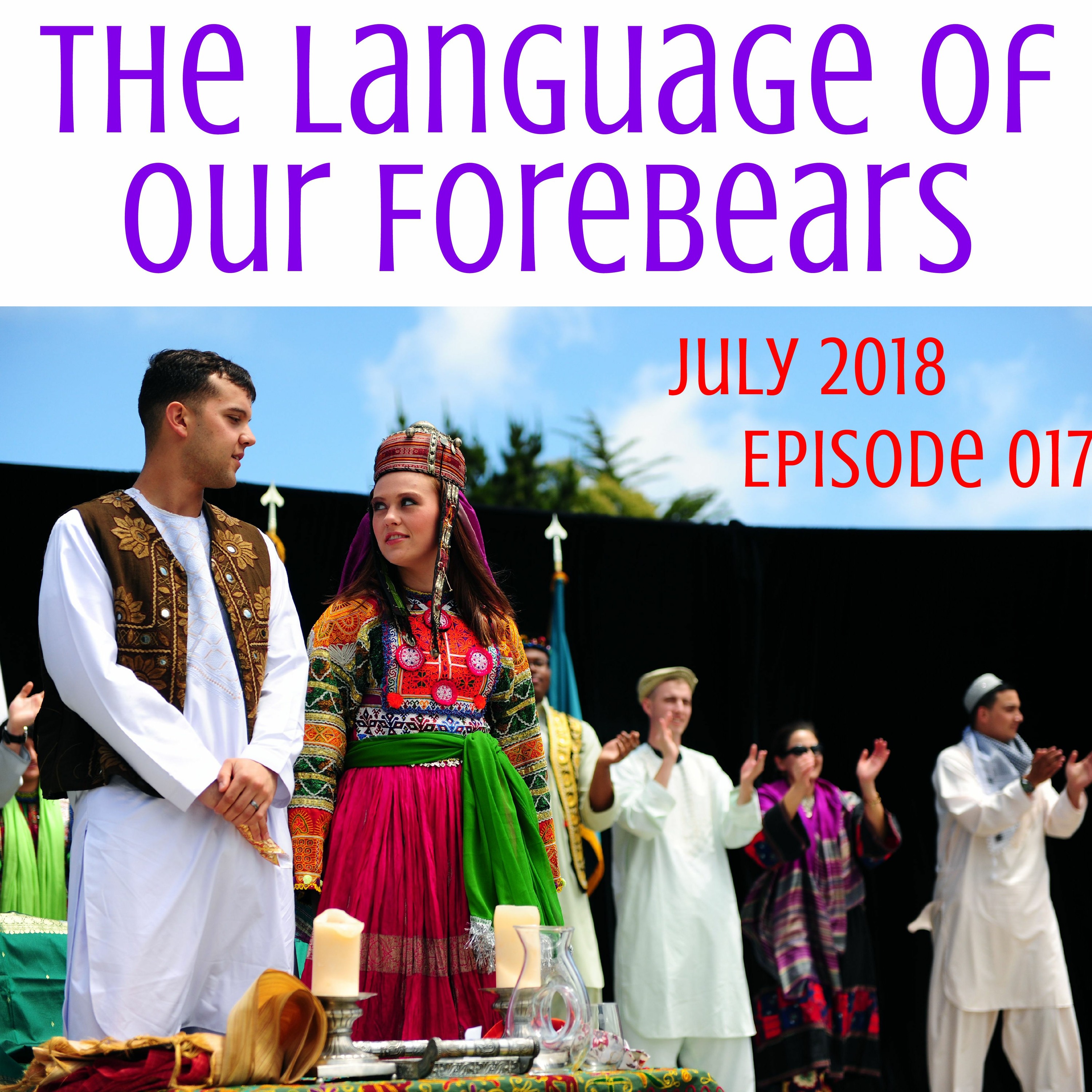 Two Pint PLC017 The Language Of Our ForebearsMultilingual learners are sitting in most classrooms today. How do we support ELL students’ learning in math, science and social studies while they navigate the language and cultural barriers of their emergent bilingualism? We look at some research on how taking responsibility for our own cultural and linguistic perspective as teachers can help.
Later, we discuss another listener recommendation. Sensemaking is an important cognitive process that is subtly distinct from thinking, planning and answering. Understanding the unique process of sensemaking leads to ways we can support it with our students.
Kelly Kluthe joins us for the Peer Review this month to...2018-07-1244 min
Two Pint PLC017 The Language Of Our ForebearsMultilingual learners are sitting in most classrooms today. How do we support ELL students’ learning in math, science and social studies while they navigate the language and cultural barriers of their emergent bilingualism? We look at some research on how taking responsibility for our own cultural and linguistic perspective as teachers can help.
Later, we discuss another listener recommendation. Sensemaking is an important cognitive process that is subtly distinct from thinking, planning and answering. Understanding the unique process of sensemaking leads to ways we can support it with our students.
Kelly Kluthe joins us for the Peer Review this month to...2018-07-1244 min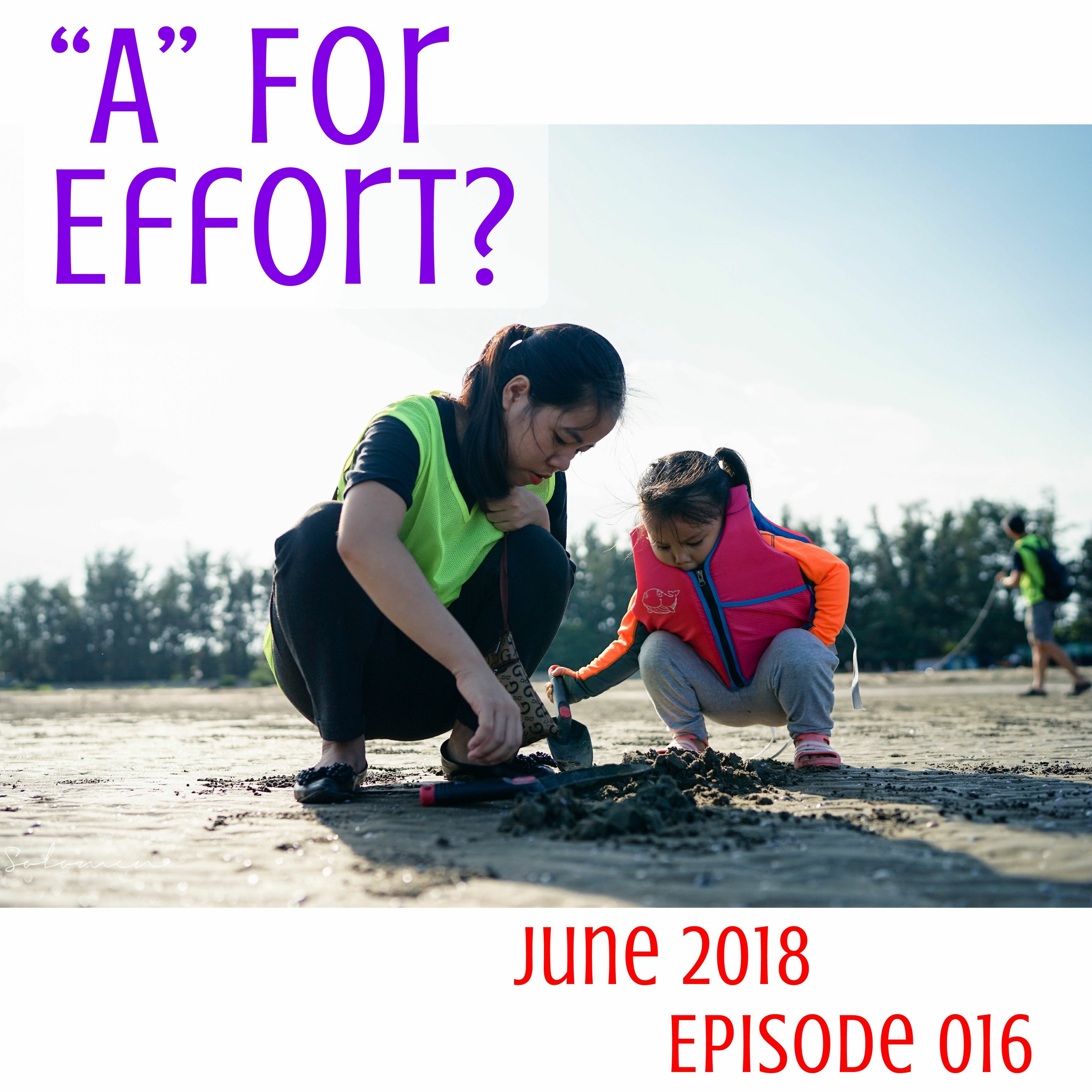 Two Pint PLC016 A For EffortStandards-based grades are an exciting option for making grades more meaningful. We look at some recent writings on how to avoid some of the most common mistakes in our gradebooks, and then consider how standards-based grades can support some of the best practices.
Later, we read some additional work suggested by one of our past authors. Her new work helps us connect our ideas on building student agency with professional development and collegial mentoring. How can we make our collaborations as effective as possible?
Aaron Mathieu joins us for the Peer Review this month to tell us how he approaches...2018-06-1244 min
Two Pint PLC016 A For EffortStandards-based grades are an exciting option for making grades more meaningful. We look at some recent writings on how to avoid some of the most common mistakes in our gradebooks, and then consider how standards-based grades can support some of the best practices.
Later, we read some additional work suggested by one of our past authors. Her new work helps us connect our ideas on building student agency with professional development and collegial mentoring. How can we make our collaborations as effective as possible?
Aaron Mathieu joins us for the Peer Review this month to tell us how he approaches...2018-06-1244 min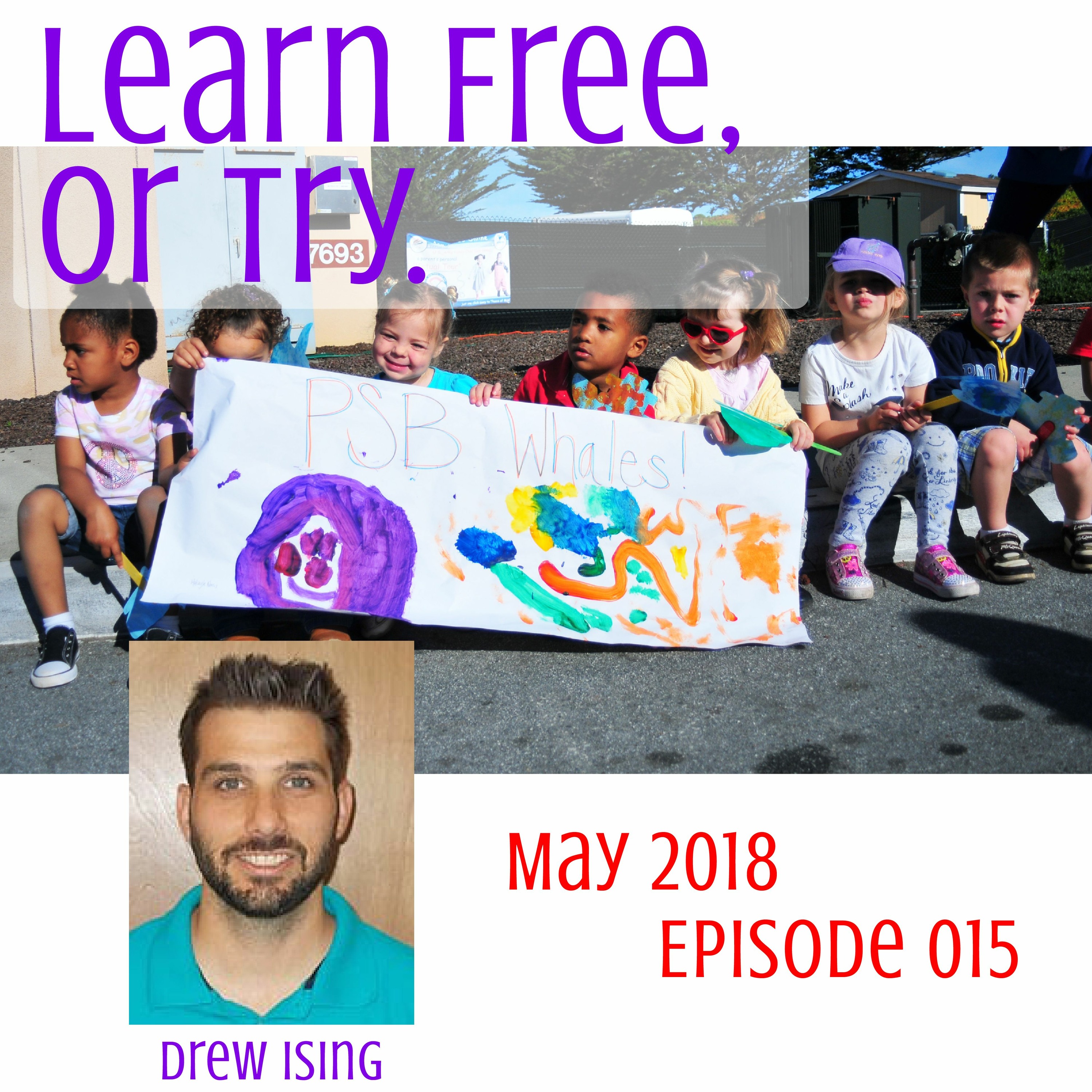 Two Pint PLC015 Learn Free, Or TryStudents should drive their own learning. Drew Ising, another biology teacher from Baldwin High School, joins the PLC to discuss how the NGSS framework calls for letting our students take the lead in our classroom. We must guide students as they build understanding and skill, but how do we deal with misconceptions and incomplete understanding without removing their control over the process?
Later, our listener community has submitted an article on departmental culture. Research suggests that the effects of bad employees are disproportionately large. How do we actively participate in constructing productive department and building culture? Some encouraging research out...2018-05-1244 min
Two Pint PLC015 Learn Free, Or TryStudents should drive their own learning. Drew Ising, another biology teacher from Baldwin High School, joins the PLC to discuss how the NGSS framework calls for letting our students take the lead in our classroom. We must guide students as they build understanding and skill, but how do we deal with misconceptions and incomplete understanding without removing their control over the process?
Later, our listener community has submitted an article on departmental culture. Research suggests that the effects of bad employees are disproportionately large. How do we actively participate in constructing productive department and building culture? Some encouraging research out...2018-05-1244 min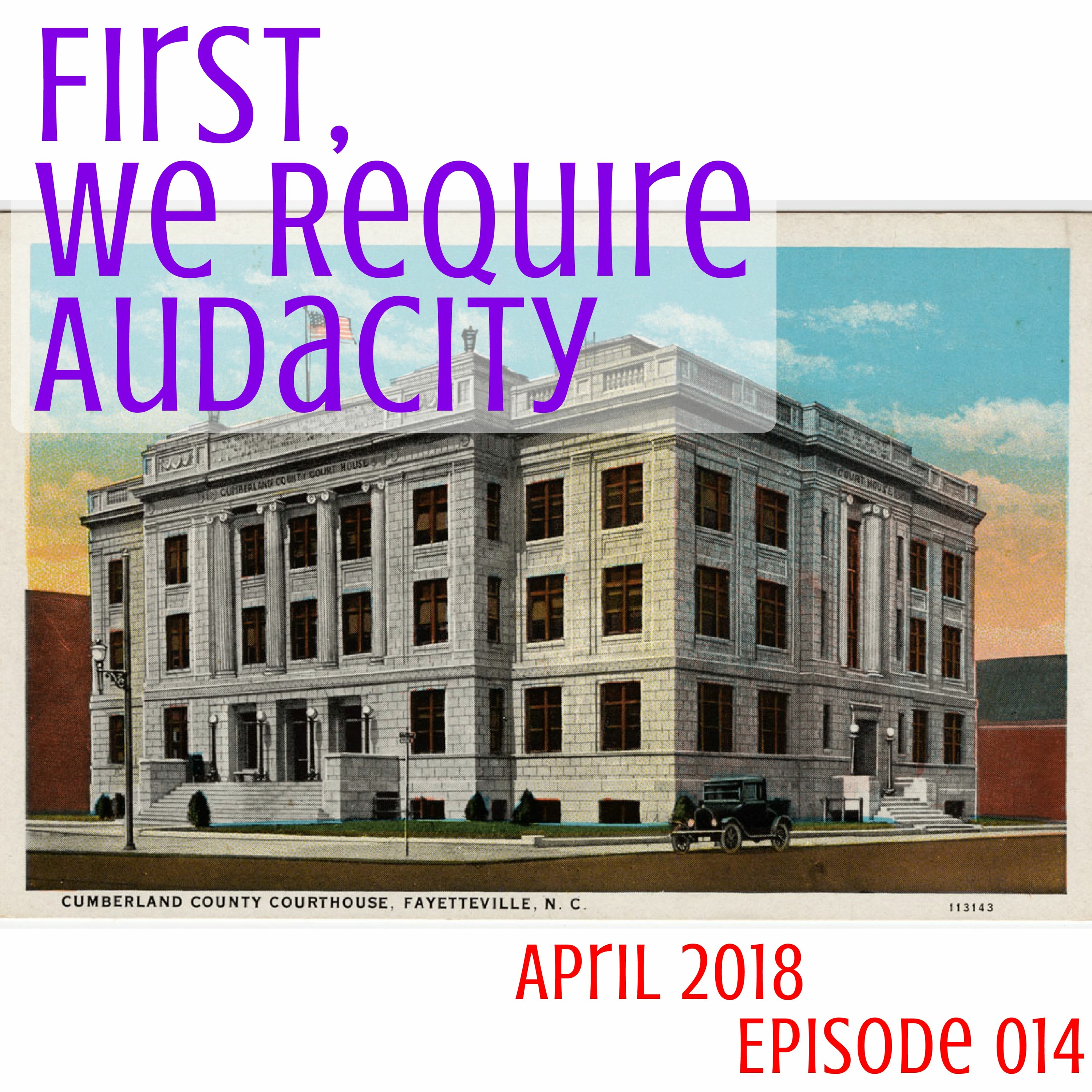 Two Pint PLC014 First, We Require AudacitySocial controversy swirls in the public space. Societal tensions carry into the classroom and affect how students interact with each other and the material. Teachers must have the courage to address contentious topics in their classroom, the wisdom to know where their expertise lies, and the resolution to see their choices through to the end. We examine the writings of Dr. Diana Hess, an expert on the subject of controversy in the classroom, as we try to determine best practice for educators at each grade level.
Later, we return to another article shared with us from the listener community. An...2018-04-1244 min
Two Pint PLC014 First, We Require AudacitySocial controversy swirls in the public space. Societal tensions carry into the classroom and affect how students interact with each other and the material. Teachers must have the courage to address contentious topics in their classroom, the wisdom to know where their expertise lies, and the resolution to see their choices through to the end. We examine the writings of Dr. Diana Hess, an expert on the subject of controversy in the classroom, as we try to determine best practice for educators at each grade level.
Later, we return to another article shared with us from the listener community. An...2018-04-1244 min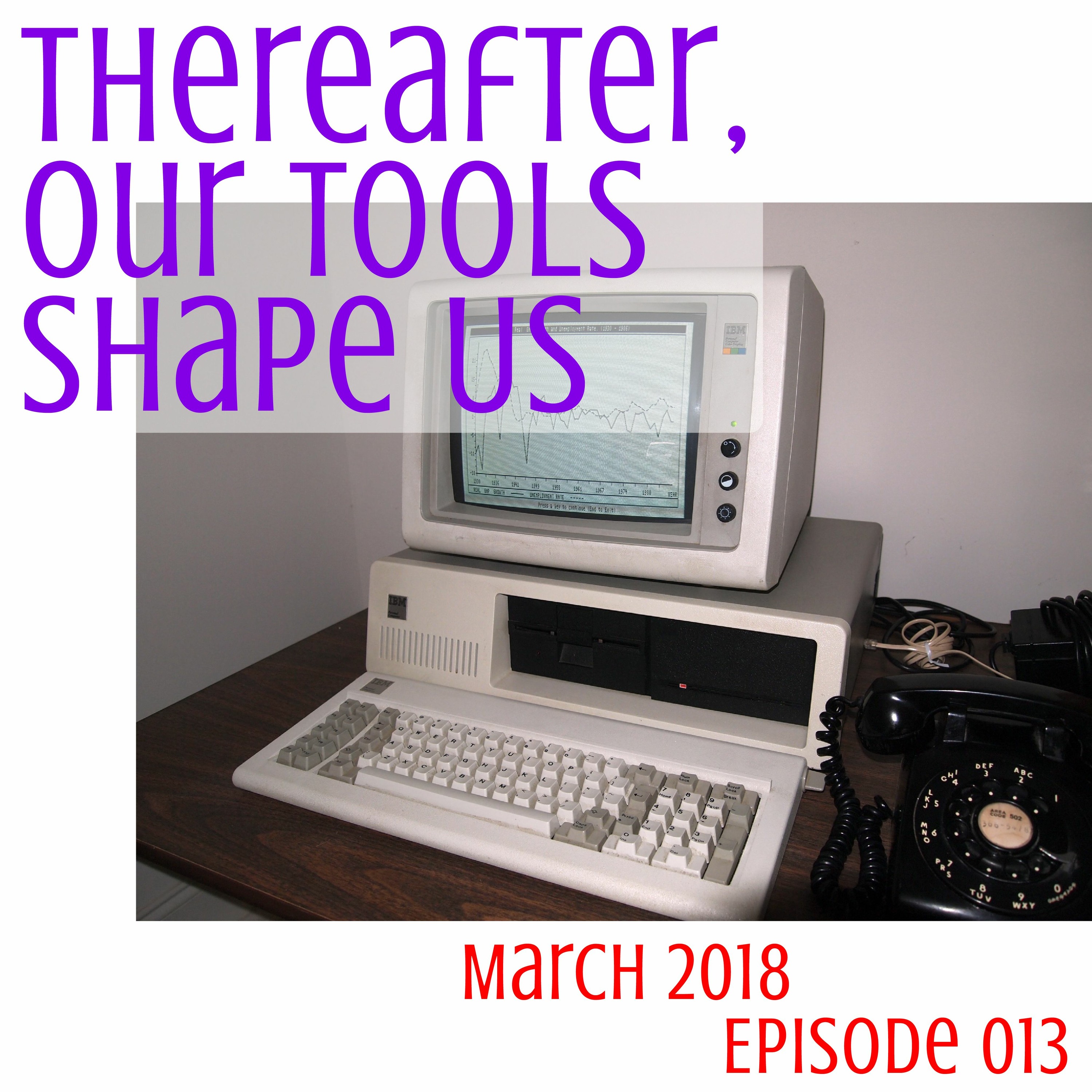 Two Pint PLC013 Thereafter, Our Tools Shape UsOnline education makes learning opportunities available for millions of people who otherwise would have very limited access to teachers, peers, and classrooms. As educators continue to explore all the ways we can use digital learning environments to better reach kids, we must search for ways to make the digital space as responsive and personal as a real teacher in a physical classroom. This month’s paper looks at how providing social cues in a digital setting improves student engagement and understanding.
Later we read a paper provided by the community in comments on episode 011 For Whom Does the Bell Toll. Ho...2018-03-1244 min
Two Pint PLC013 Thereafter, Our Tools Shape UsOnline education makes learning opportunities available for millions of people who otherwise would have very limited access to teachers, peers, and classrooms. As educators continue to explore all the ways we can use digital learning environments to better reach kids, we must search for ways to make the digital space as responsive and personal as a real teacher in a physical classroom. This month’s paper looks at how providing social cues in a digital setting improves student engagement and understanding.
Later we read a paper provided by the community in comments on episode 011 For Whom Does the Bell Toll. Ho...2018-03-1244 min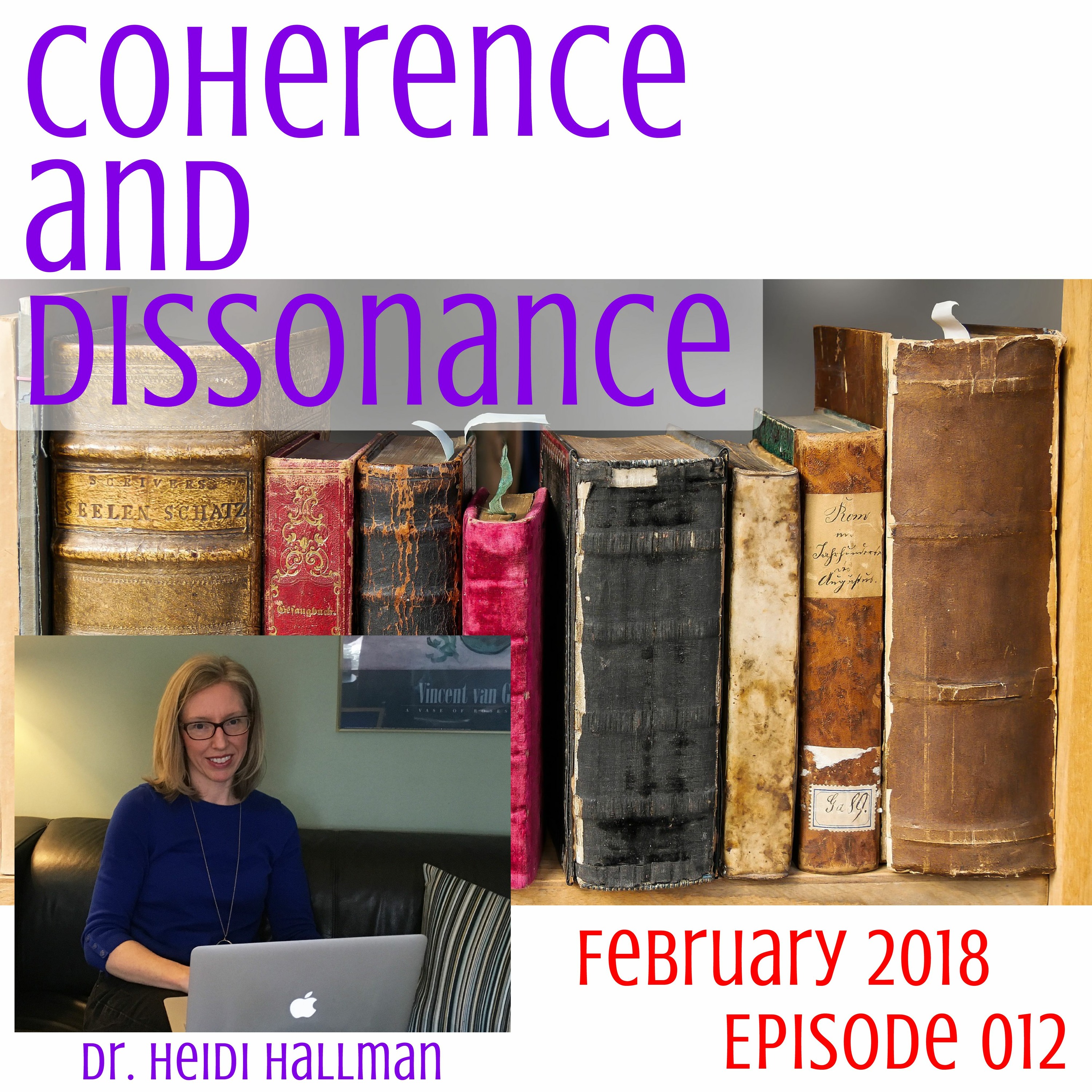 Two Pint PLC012 Coherence And DissonanceDr. Heidi Hallman, associate professor of English education at the University of Kansas and author of Secondary English Teacher Education in the United States: Responding to a Changing Context, joins our PLC this month. Patterns in teacher preparation have changed over the last couple decades. Patterns in how teachers are trained to use standards, leverage technology and support diverse learnings impact how those teachers will participate in their future departments. Later, we’ll look at how research into mastery learning has affected success in surgical training. Differences in practice and assessment method lead to differences in student growth. The nature of...2018-02-1245 min
Two Pint PLC012 Coherence And DissonanceDr. Heidi Hallman, associate professor of English education at the University of Kansas and author of Secondary English Teacher Education in the United States: Responding to a Changing Context, joins our PLC this month. Patterns in teacher preparation have changed over the last couple decades. Patterns in how teachers are trained to use standards, leverage technology and support diverse learnings impact how those teachers will participate in their future departments. Later, we’ll look at how research into mastery learning has affected success in surgical training. Differences in practice and assessment method lead to differences in student growth. The nature of...2018-02-1245 min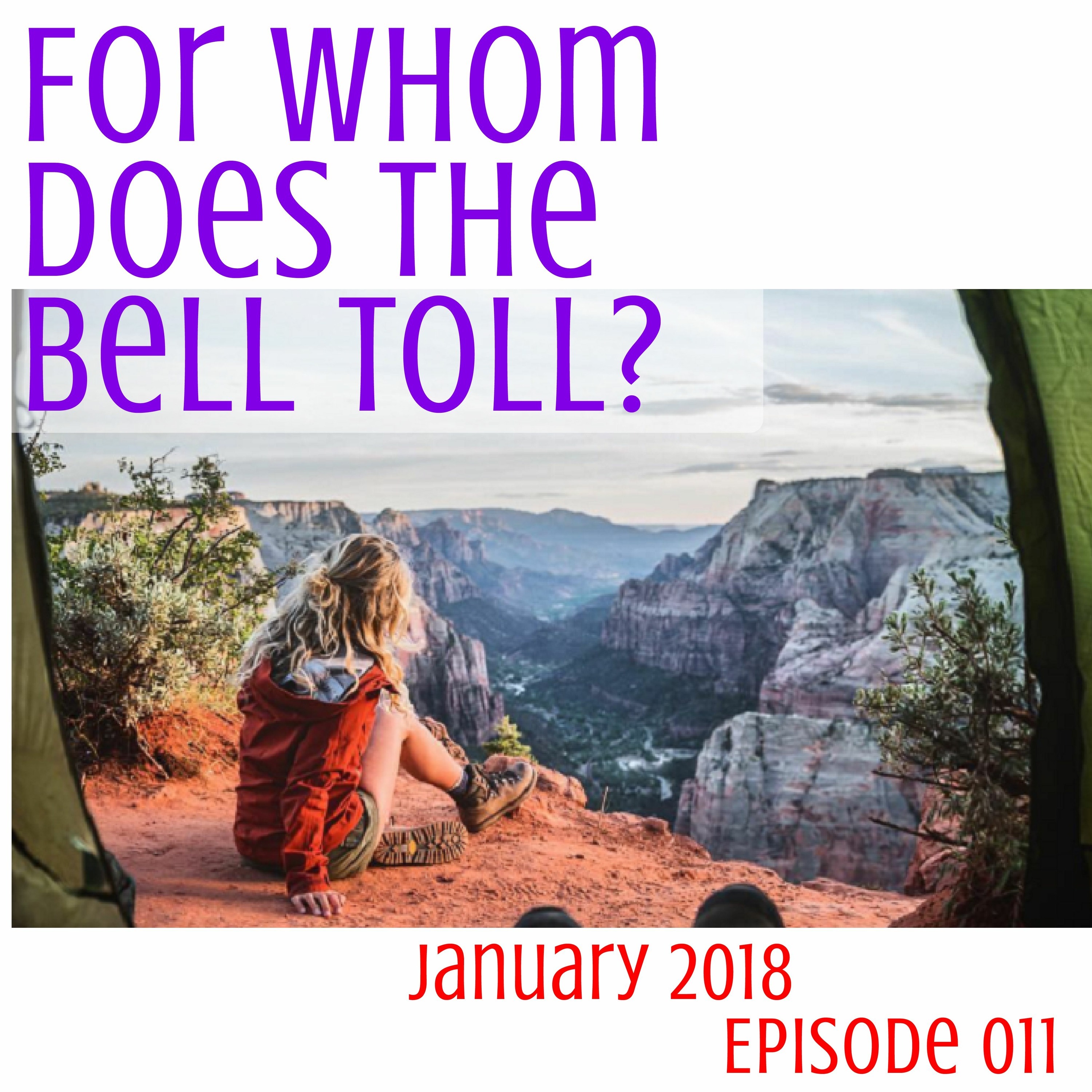 Two Pint PLC011 For Whom Does The Bell TollDifferentiation can be a contentious topic. Most educators want to reach all of their students, but the realities of how they can serve the breadth of needs in a classroom can lead to frustration. We consider the state of the national conversation by looking at a paper from Warwick (Contested Knowledge A Critical review of the Concept of Differentiation in Teaching and Learning). It argues that theoretical perspectives, policies, frameworks and the implementation of ideas relating to the technique have become conflated, because of the contested nature of the term. Later we return to math education by looking at a...2018-01-1145 min
Two Pint PLC011 For Whom Does The Bell TollDifferentiation can be a contentious topic. Most educators want to reach all of their students, but the realities of how they can serve the breadth of needs in a classroom can lead to frustration. We consider the state of the national conversation by looking at a paper from Warwick (Contested Knowledge A Critical review of the Concept of Differentiation in Teaching and Learning). It argues that theoretical perspectives, policies, frameworks and the implementation of ideas relating to the technique have become conflated, because of the contested nature of the term. Later we return to math education by looking at a...2018-01-1145 min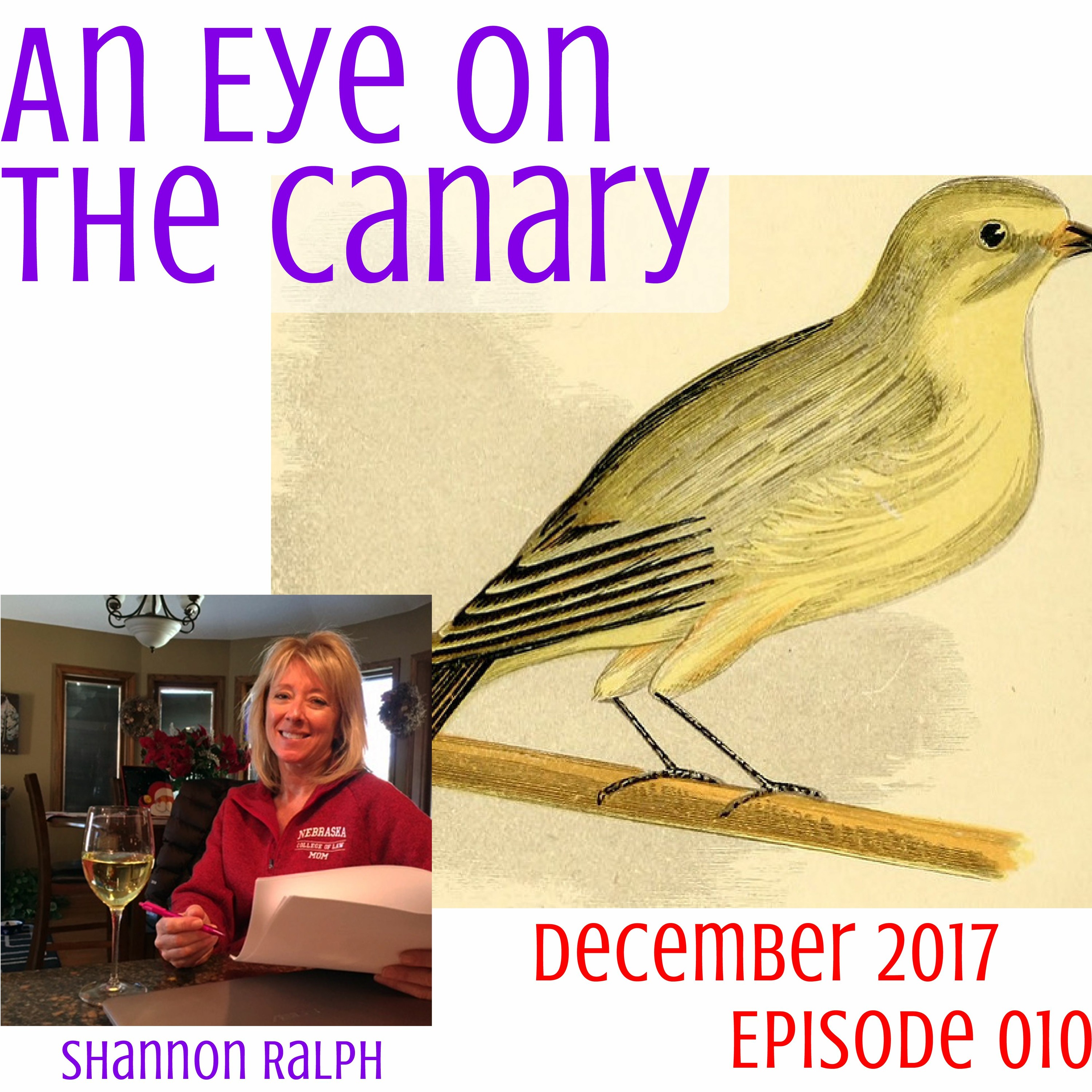 Two Pint PLC010 An Eye On The CanaryShannon Ralph, the 2015 Kansas Teacher of the Year, joins our PLC this month. Data analysis is getting increasing attention in education. Data science can have considerable influence over education, especially in online or blended learning settings. How do teachers find actionability in the data while still meeting the tremendous demand of running a classroom five days a week? We’ll consider comments from the journal Nature (What data and analytics can and do say about effective learning) on the subject. Later the discussion turns to special education and how teachers’ perceptions of support impact their efficacy (If Science Teachers are Posi...2017-12-1144 min
Two Pint PLC010 An Eye On The CanaryShannon Ralph, the 2015 Kansas Teacher of the Year, joins our PLC this month. Data analysis is getting increasing attention in education. Data science can have considerable influence over education, especially in online or blended learning settings. How do teachers find actionability in the data while still meeting the tremendous demand of running a classroom five days a week? We’ll consider comments from the journal Nature (What data and analytics can and do say about effective learning) on the subject. Later the discussion turns to special education and how teachers’ perceptions of support impact their efficacy (If Science Teachers are Posi...2017-12-1144 min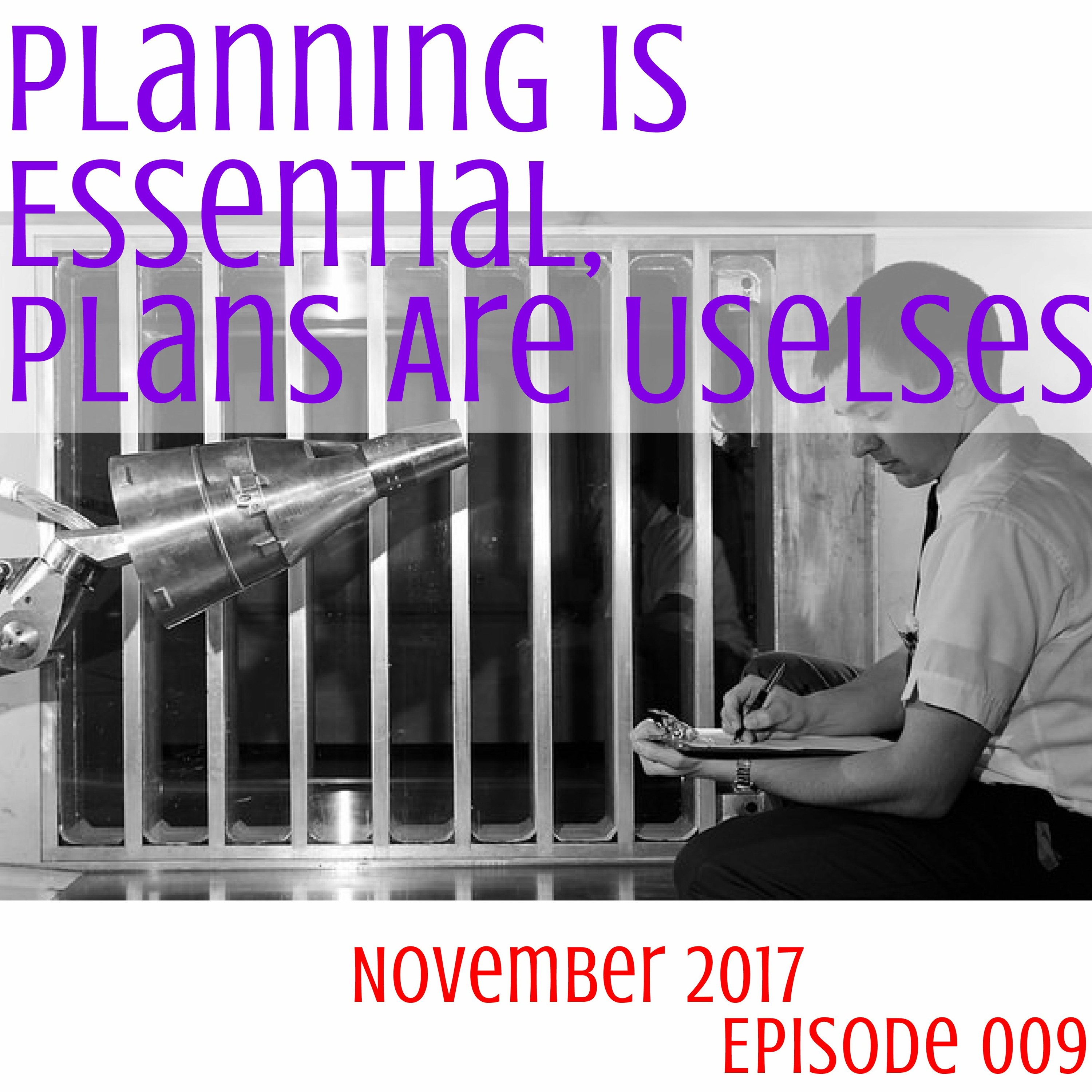 Two Pint PLC009 Planning Is Essential, Plans Are UselessLesson planning and sequencing seem to be ever present problems for teachers and coordinators. Which topics should go where? Who should have control over making those decisions? Curriculum research in an economics course provides some insight into how we should choose our priorities (Transforming the economics curriculum by integrating threshold concepts). As we search for how to create a system for making sequencing decisions we’ll add a second study (Looking for Coherence in Science Curriculum) that suggests not all those questions have a single clear answer. Later we’ll turn to the impact of SES on how students’ brains respon...2017-11-1044 min
Two Pint PLC009 Planning Is Essential, Plans Are UselessLesson planning and sequencing seem to be ever present problems for teachers and coordinators. Which topics should go where? Who should have control over making those decisions? Curriculum research in an economics course provides some insight into how we should choose our priorities (Transforming the economics curriculum by integrating threshold concepts). As we search for how to create a system for making sequencing decisions we’ll add a second study (Looking for Coherence in Science Curriculum) that suggests not all those questions have a single clear answer. Later we’ll turn to the impact of SES on how students’ brains respon...2017-11-1044 min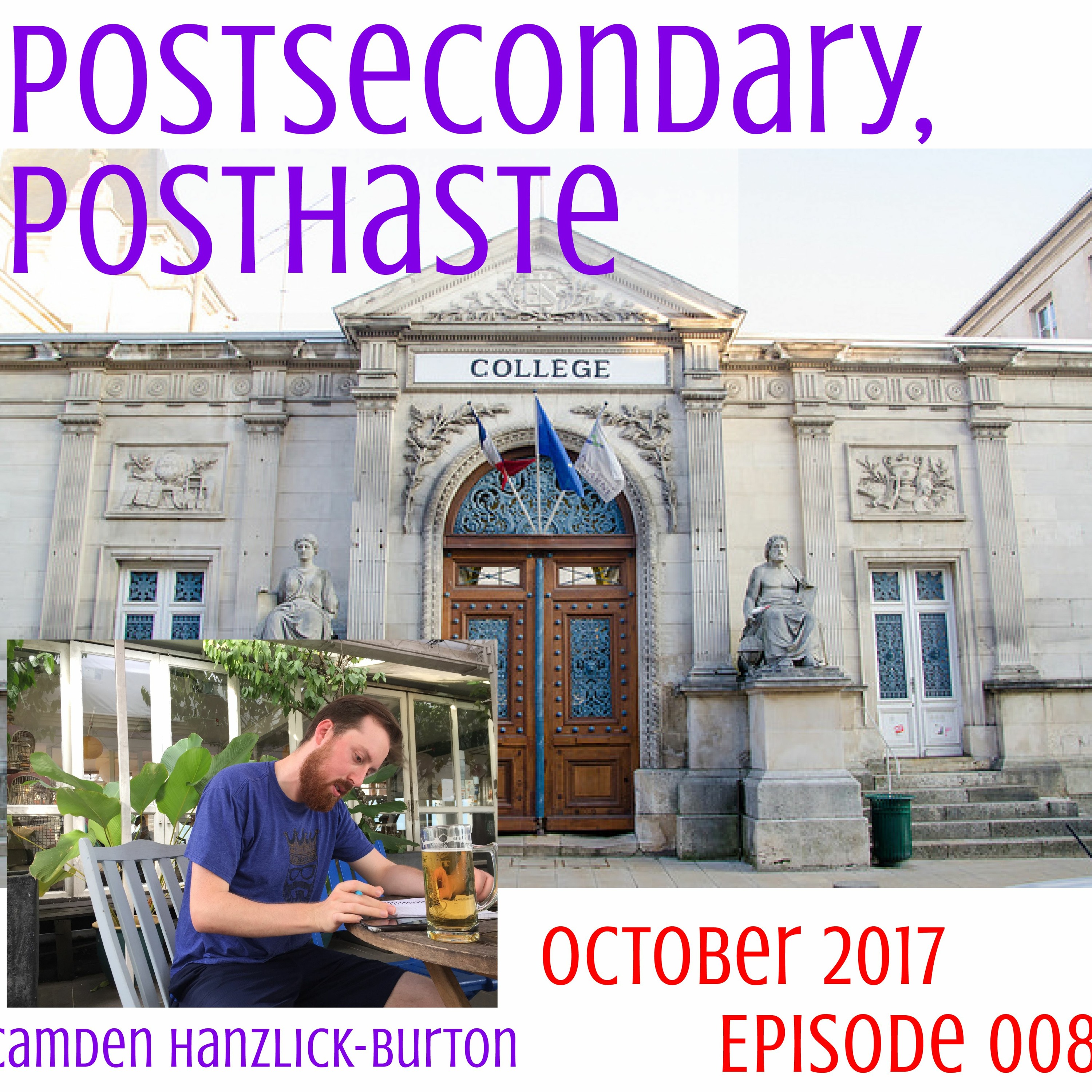 Two Pint PLC008 Postsecondary, PosthasteCamden Hanzlick-Burton joins us from Washington to discuss the effects of high school students earning college credit before they graduate. Washington has Running Start, Kansas has dual enrollment, and many other states have similar programs. Some new and more detailed measures of Running Start outcomes (How Much of a “Running Start” Do Dual Enrollment Programs Provide Students?) indicate there may be some problems with the program and how it is impacting student achievement. Then we turn to elementary education to consider how teacher perceptions of technology shape tablet usage and impact on student learning (Exploring the use of educational technology in p...2017-10-1144 min
Two Pint PLC008 Postsecondary, PosthasteCamden Hanzlick-Burton joins us from Washington to discuss the effects of high school students earning college credit before they graduate. Washington has Running Start, Kansas has dual enrollment, and many other states have similar programs. Some new and more detailed measures of Running Start outcomes (How Much of a “Running Start” Do Dual Enrollment Programs Provide Students?) indicate there may be some problems with the program and how it is impacting student achievement. Then we turn to elementary education to consider how teacher perceptions of technology shape tablet usage and impact on student learning (Exploring the use of educational technology in p...2017-10-1144 min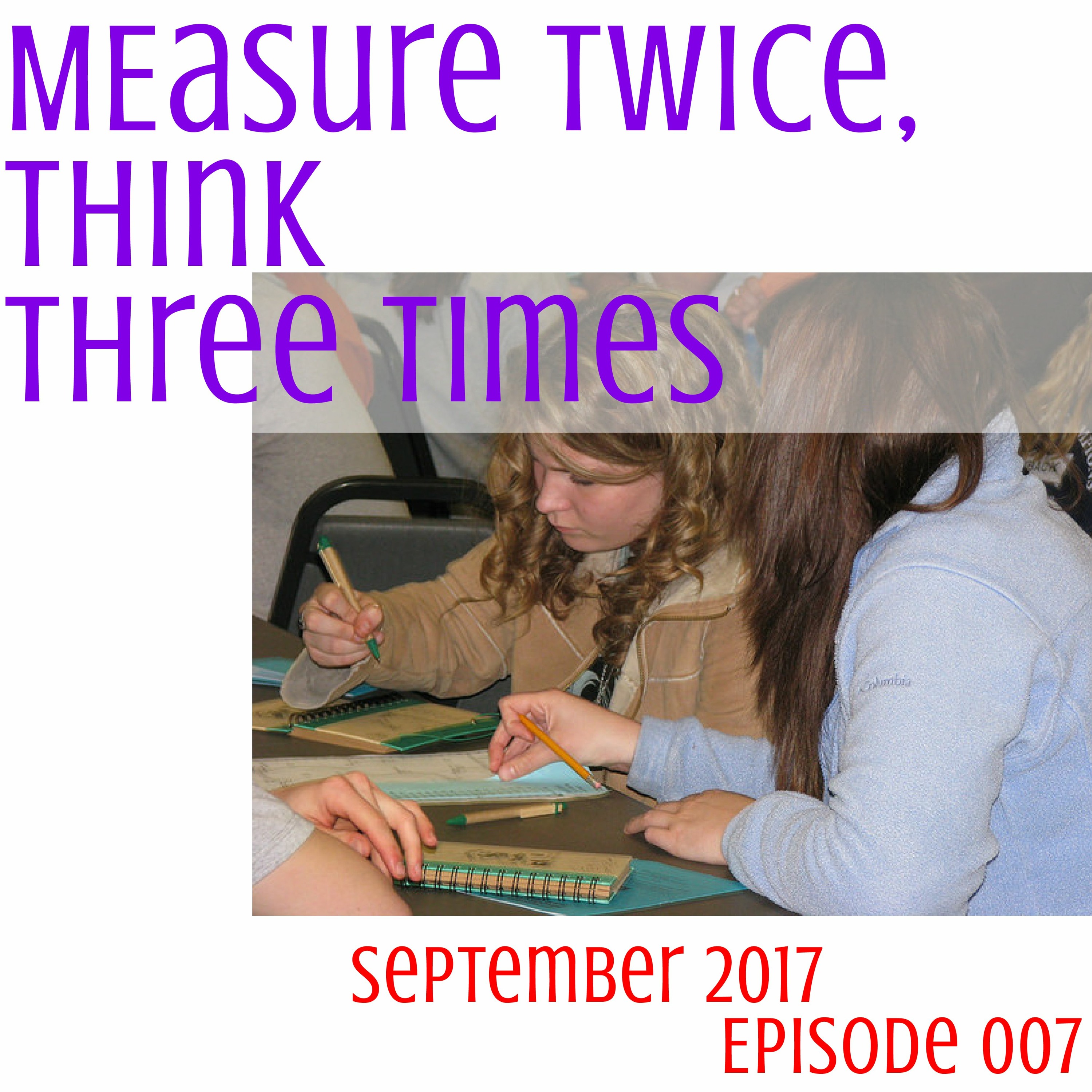 Two Pint PLC007 Measure Twice, Think Three TimesStandardized testing is a major concern for teachers, administrators and parents. The problem is standardized tests don’t always mean what they are supposed to mean: 4 Things We Don’t Know About AP Tests (NPR). Misconceptions about how test scores relate to school quality are driving a growing separation between students of financial means and students from disadvantage. In the end, research indicates that separation is making everyone worse off The Urban-School Stigma (The Atlantic). Later, we consider some research on learning foreign language and how it informs student group formation: Comparing student-selected and teacher-assigned pairs on collaborative writing. We’re dri...2017-09-1244 min
Two Pint PLC007 Measure Twice, Think Three TimesStandardized testing is a major concern for teachers, administrators and parents. The problem is standardized tests don’t always mean what they are supposed to mean: 4 Things We Don’t Know About AP Tests (NPR). Misconceptions about how test scores relate to school quality are driving a growing separation between students of financial means and students from disadvantage. In the end, research indicates that separation is making everyone worse off The Urban-School Stigma (The Atlantic). Later, we consider some research on learning foreign language and how it informs student group formation: Comparing student-selected and teacher-assigned pairs on collaborative writing. We’re dri...2017-09-1244 min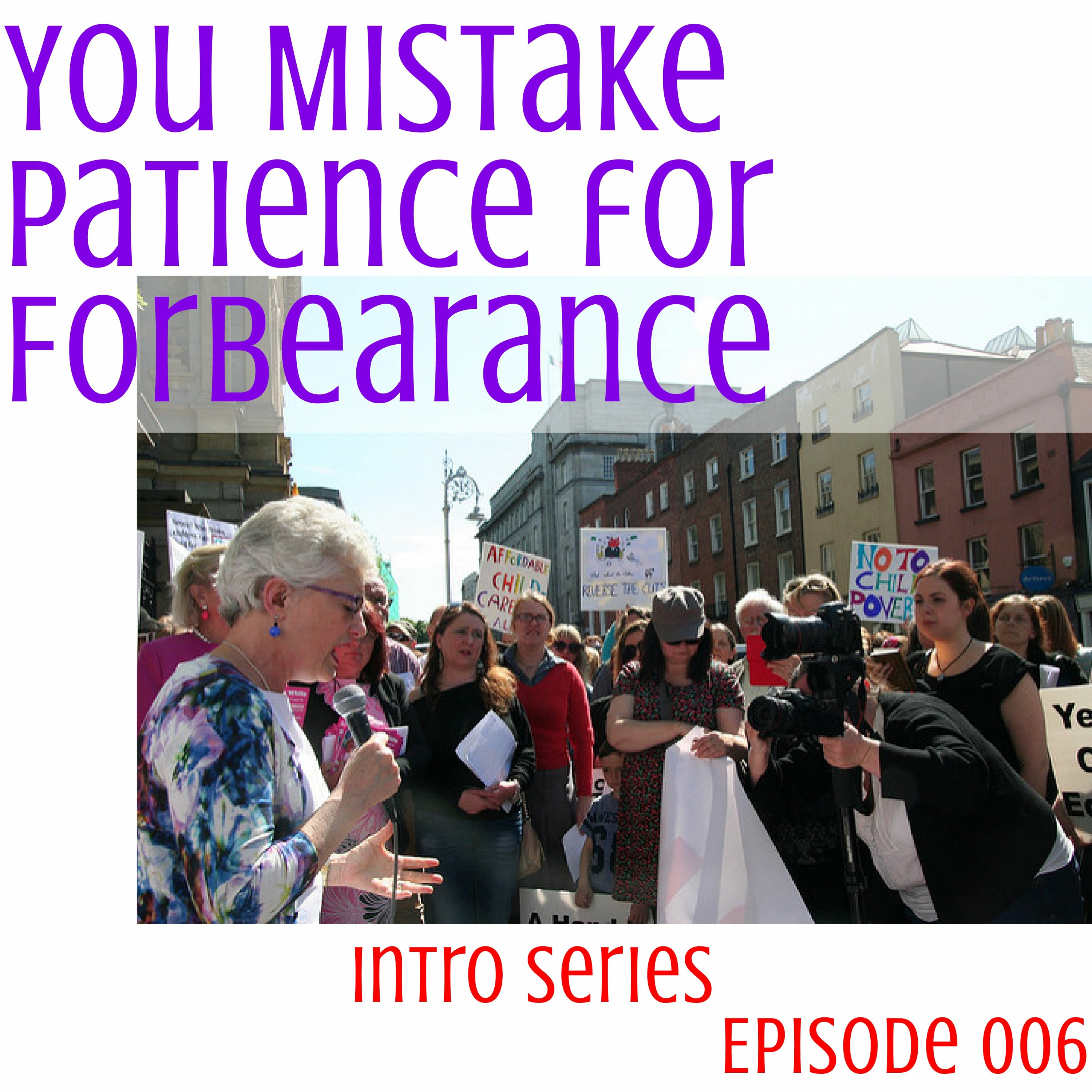 Two Pint PLC006 You Mistake Patience For ForbearanceEducation discussions often focus on how best to serve our students, but as the summer comes to an end we must turn our attention to the realities of our job. Many policies are implemented that are beyond our control and navigating the expectations of the many stakeholders in a student’s education can be exhausting. We’ll consider a number of examples of how external forces are shaping classrooms around the country: New Florida law lets any resident challenge what’s taught in science classes (Washington Post), Marion County reduces homework for elementary school students (WKMG Orlando) and The Silicon Valley...2017-07-2844 min
Two Pint PLC006 You Mistake Patience For ForbearanceEducation discussions often focus on how best to serve our students, but as the summer comes to an end we must turn our attention to the realities of our job. Many policies are implemented that are beyond our control and navigating the expectations of the many stakeholders in a student’s education can be exhausting. We’ll consider a number of examples of how external forces are shaping classrooms around the country: New Florida law lets any resident challenge what’s taught in science classes (Washington Post), Marion County reduces homework for elementary school students (WKMG Orlando) and The Silicon Valley...2017-07-2844 min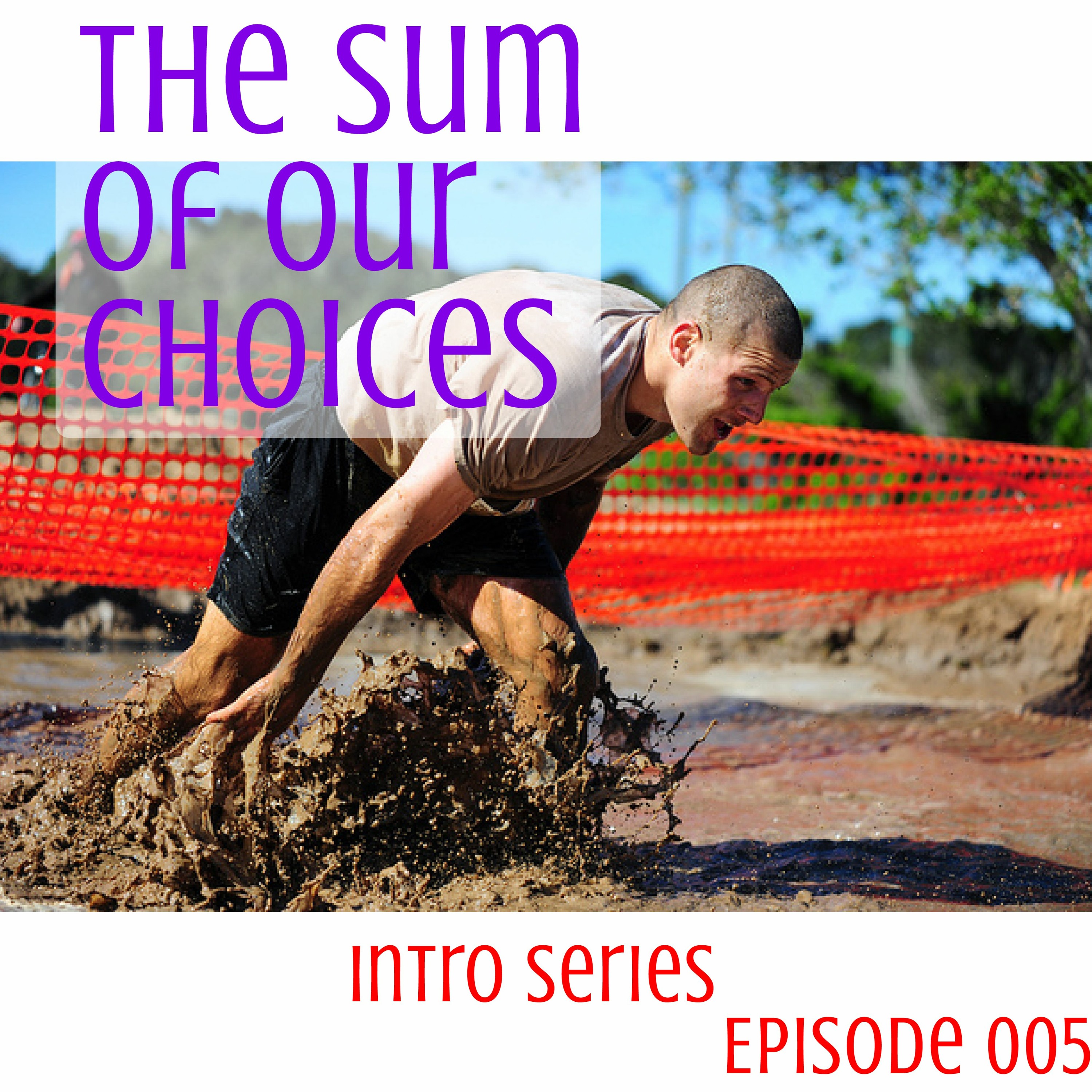 Two Pint PLC005 The Sum Of Our ChoicesEvery teacher can only provide influence and options to students; they are the ones who will make choices for what they do and how they strive (or don’t) to do those things well. We will consider some of the most influential research on how humans make choices for themselves, and then more specifically in the context of education. We’ll consider marshmallows from the 70’s, the more recent elaboration this decade (Rational snacking: young children's decision-making on the marshmallow task is moderated by beliefs about environmental reliability) and even some new work whose ink is barely dry (Waiting for the Se...2017-07-2544 min
Two Pint PLC005 The Sum Of Our ChoicesEvery teacher can only provide influence and options to students; they are the ones who will make choices for what they do and how they strive (or don’t) to do those things well. We will consider some of the most influential research on how humans make choices for themselves, and then more specifically in the context of education. We’ll consider marshmallows from the 70’s, the more recent elaboration this decade (Rational snacking: young children's decision-making on the marshmallow task is moderated by beliefs about environmental reliability) and even some new work whose ink is barely dry (Waiting for the Se...2017-07-2544 min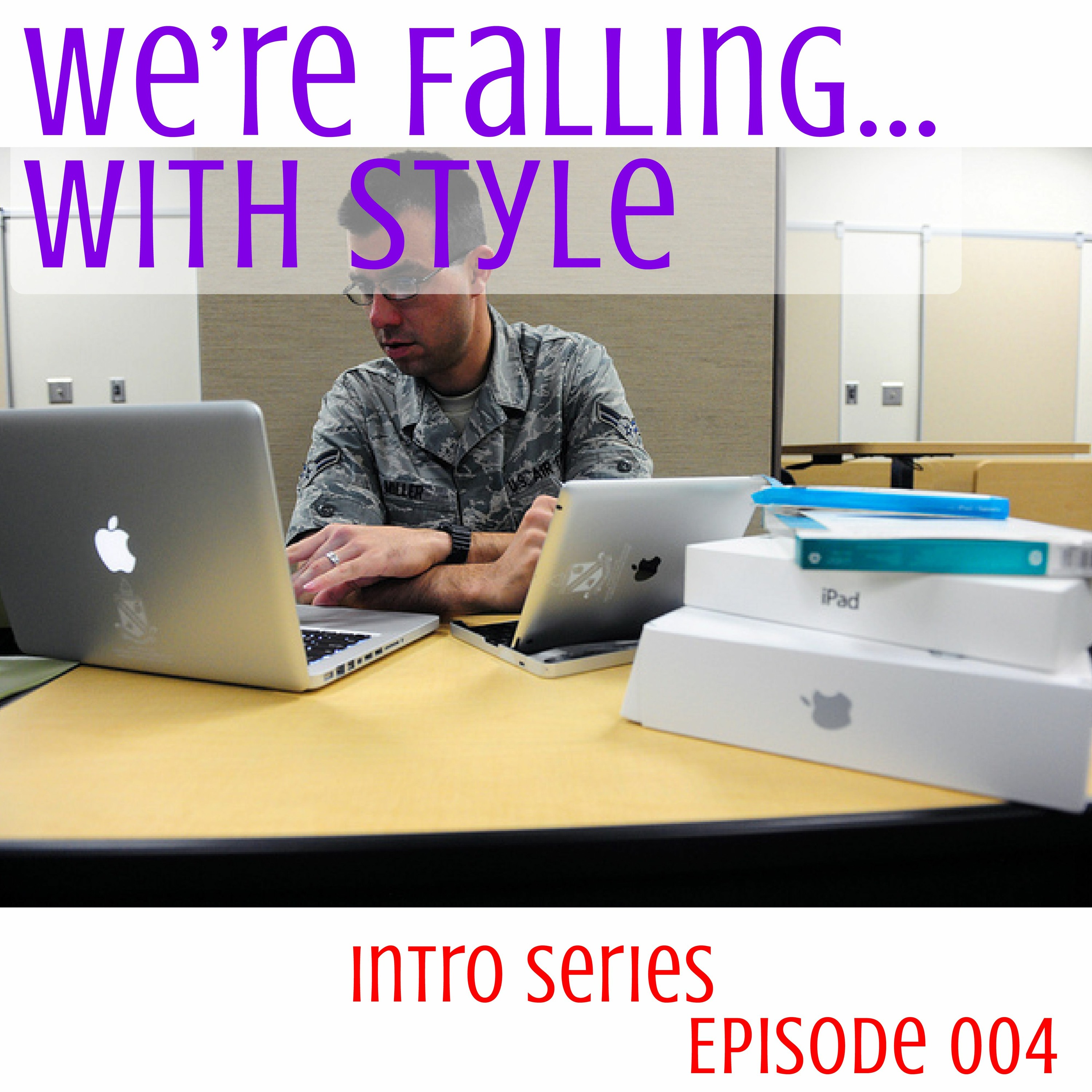 Two Pint PLC004 We're Falling... With StyleThe first group of episodes will establish a foundation of educational philosophy, from which we can move forward. Technology is having a tremendous impact on classrooms around the world. We’re considering what the effects of rapid proliferation of communication innovations may be on student learning. We’ll compare research into how new devices compare to older, more familiar methods with The Reading Brain in the Digital Age: The Science of Paper versus Screens (Scientific American) and A study of print and computer-based reading to measure and compare rates of comprehension and retention. Our debate compares a focus on highest perf...2017-07-2544 min
Two Pint PLC004 We're Falling... With StyleThe first group of episodes will establish a foundation of educational philosophy, from which we can move forward. Technology is having a tremendous impact on classrooms around the world. We’re considering what the effects of rapid proliferation of communication innovations may be on student learning. We’ll compare research into how new devices compare to older, more familiar methods with The Reading Brain in the Digital Age: The Science of Paper versus Screens (Scientific American) and A study of print and computer-based reading to measure and compare rates of comprehension and retention. Our debate compares a focus on highest perf...2017-07-2544 min